The report contains forward-looking statements, identified by words like ‘plans’, ‘expects’, ‘will’, ‘anticipates’, ‘believes’, ‘intends’, ‘projects’, ‘estimates’ and so on. All statements that address expectations or projections about the future, but not limited to the Company’s strategy for growth, product development, market position, expenditures and financial results, are forward-looking statements. Since these are based on certain assumptions and expectations of future events, the Company cannot guarantee that these are accurate or will be realised. The Company’s actual results, performance or achievements could thus differ from those projected in any forward-looking statements. The Company assumes no responsibility to publicly amend, modify or revise any such statements on the basis of subsequent developments, information or events. The Company disclaims any obligation to update these forward-looking statements, except as may be required by law.
The global economy grew at 2.4% in CY 2019, slowing from 3% in CY 2018 amid global trade war, tariff related uncertainties, and Brexit. Chinese growth moderated but held up at 6.1% despite escalation of trade tensions with the United States (US). Amidst trade tensions and Brexit related uncertainty, EU growth also weakened to 1.1%. However, with talks of trade resolution in second half of 2019, Europe started to see some recovery in growth. Brexit, which was a key uncertainty for Europe over the last two years, also saw resolution towards end 2019. The US economy remained relatively strong growing at 2.3%.
Global trade environment remained challenging due to heightened trade tensions. However, negotiations between the US and China since mid-October resulted in Phase One agreement. Partial roll-back of some US tariffs in exchange for Chinese commitments to make additional purchases of US products mark a deescalation of trade tensions.
Oil prices averaged US$61 / bbl in 2019 supported by continued production cuts and supply constraints from Iran and Venezuela. Global oil demand growth declined to 0.8mbpd in 2019, from 1.2 mbpd in 2018. Oil demand growth continued to be led by China, India and other Asian economies.
Global demand for ethylene increased by 4% y-o-y to 167 MMT in 2019. However, capacity addition across key petrochemical products significantly outpaced demand growth, pushing down prices and margins to multi-year low for these products.
Global growth outlook has changed since the outbreak of COVID-19. There has been coordinated global monetary policy easing and fiscal support from governments. These policy support measures would act as cushions offsetting weakness in growth to some extent . However, global economic activity is likely to contract in 2020 and global growth environment will remain challenging in the short term.
The Indian economy grew by 4.2% in FY 2019-20 still remaining one of the fastest growing major economies in the world. Industrial activity remained healthy in the beginning of the year, but saw some weakness later. Auto sales suffered due to weak credit conditions, demand softness, and change in regulatory norms. However, services credit averaged at a healthy 10% y-o-y growth even as credit growth deteriorated. Despite weak trade environment amid increasing protectionism, services exports remained resilient at about 8%. On the rural side, with food prices firming up, demand saw some recovery with three-wheeler sales returning to positive growth in December quarter (+8% y-o-y), but reversed the recovery in 4Q.
India’s oil demand remained flat in FY 2019-20 as compared to the previous year, with consumption-led demand growth in gasoline (+6.2% y-o-y) and LPG (+6% y-oy). ATF growth (-3.5% y-o-y) was subdued as air traffic growth remained soft, while diesel demand (-1% y-o-y) was impacted by weaker economic growth. Domestic demand growth for petrochemical products was healthy with polymer and polyester demand growing by 4% and 9.0% respectively.
Thrust on policy initiatives continued. FY 2019-20 saw consolidation of Public Sector Banks, which should strengthen the banking sector. Non-performing loans in the banking sector have come down to 9.3% from >10% before FY 2019-20. Resolution under the Insolvency and Bankruptcy Code (IBC) is bringing procedural predictability with higher recovery rates (43% in 2019 vs 14% in 2017). With continued policy initiatives, India further continued its climb in the Ease of Doing Business rankings, climbing up 14 places to reach the 63rd rank. India is the only major country to have moved up by 67 places in just 4 years. FY 2019-20 also saw corporate tax cut being announced, further easing business environment. Government also announced significant rebates for new manufacturing units to attract global supply chains. Outbreak of COVID-19 would make growth environment challenging in first half of FY 2020-21 but liquidity measures announced by the government should help provide support.
Domestic data usage and use of digital platforms continue to gain traction in India. Reliance Jio has become the second largest single-country operator in the world. The extra-ordinary circumstances unfolding in 2020 has underscored the need for strong data networks. Increasingly, digital platforms have become critical for home, business and school connectivity. Digital transactions also continue to accelerate with UPI payments reaching 10% of GDP from just 0.7% of GDP in FY 2017-18, while credit card growth continued to be strong at 24% y-o-y. Similarly, personal credit remained strong at about 17% y-o-y reflective of the underlying consumption demand. While continuing to grow its organised retail platform, Reliance Retail is working to integrate producers/ manufacturers, supply chain, small merchants and consumers in a seamless digital ecosystem that will benefit all elements of the retail chain.
Reliance executed on the next phase of its growth journey in FY 2019-20, forging transformative partnerships across businesses. In the Energy businesses, Reliance is working to complete the contours of a defining strategic partnership with Saudi Aramco (Aramco). Reliance and Aramco share a common outlook and vision on the evolution of the business in the future with emphasis on higher oil-tochemicals conversion. The partnership gives the refineries access to a wide portfolio of value accretive crude grades and enhanced feedstock security. In the fuel retail business, Reliance and British Petroleum (BP) formed a new joint venture to grow the retail service station network and aviation fuels business across India.
In Digital Services, Reliance is working with Microsoft to enhance adoption of leading technologies like data analytics, AI, cognitive services, blockchain, Internet of Things, and edge computing among small and medium enterprises. Microsoft Azure cloud platform and Technology stack along with Jio’s connectivity infrastructure provide Indian enterprises world-class technology solutions to enhance competitiveness.
Recognising the pivotal role of Jio in India’s digital transformation, Facebook has taken an equity stake in Jio Platforms. The strategic focus of the partnership is India’s micro, small and medium businesses, farmers, small merchants and small and medium enterprises in the informal sector. Additionally, the partnership seeks to empower people seeking various digital services.
Concurrent with the investment, Jio Platforms, Reliance Retail and WhatsApp also entered into a commercial partnership agreement to further accelerate Reliance Retail’s Digital Commerce business on the JioMart platform using WhatsApp and to support small businesses on WhatsApp.
In the current financial year, Reliance completed its first Rights Issue in 3 decades. It was the largest Rights Offering by a non-financial company globally in the last 10-years and enabled participation of all shareholders in growth businesses of Reliance. The Rights offering received an overwhelming response, despite the challenges presented by the lockdown. Overall subscription for the issue was at 1.6x, representing a capital commitment of $11.2bn and public subscription was 1.22x
Through the Covid-19 crisis, Reliance operated its O2C facilities at near 100% by shifting products to export markets to sustain operating rates. Scale economics along with strong competitive cost positions across the chain helped Reliance sustain positive contribution through this unprecedented phase.

The partnership between Jio and Facebook will empower farmers and small & medium businesses/enterprises/ merchants with various digital services.
Apart from ensuring safety and well-being of employees through the pandemic, Reliance significantly stepped up support to the Community. The Covid-19 response included use of facilities for production of grades and equipment used in medical applications, steps to support state medical infrastructure and contributions to social efforts in helping marginalized communities and migrant workers.
Reliance is geared to provide products and services needed by Indian consumers as the economy emerges from the lock-down.








Robust performance for the year reflects benefits of our integrated Oil to Chemicals (O2C) value chain and the rapid scale-up of our consumer businesses. For the year, our O2C businesses reported resilient performance despite unprecedented macro challenges. Our O2C business has inherent strengths due to feedstock flexibility and cost competitive positions across products. The cost economics also benefitted from the high operating rates we were able to maintain by leveraging our robust product placement capabilities. Our O2C business, with new partnerships, is well poised to pursue growth and sustainable value creation in the coming years.
Our consumer and technology led businesses continue to be guided by our obsession to provide the best value to our customers. Reliance Retail delivered robust performance with record revenues and EBITDA for the year. Our digital services business is recognised for having the nation’s widest 4G wireless network. Jio has continued on its unprecedented growth journey receiving overwhelming customer response for best-in-class mobile connectivity services. On combined basis, retail and digital services business EBITDA has increased by 49% compared to previous year.
We are steadfast in our commitment to capital discipline and financial strength. We remain focused on operating excellence, executing our growth projects, improving returns on assets and shareholder value enhancement.

US$1 = `75.665 (Exchange rate as on 31.03.2020)
*Excluding Exceptional Item
Reliance achieved consolidated revenue of `6,59,205 crore (US$87.1 billion), an increase of 5.4%, as compared to `6,25,212 crore in the previous year. Increase in revenue was primarily on account of higher revenue from Consumer Business. Reliance’s consolidated revenue was boosted by robust growth in retail and digital services business, which recorded an increase of 24.8% and 40.7% in revenue, respectively as compared to the previous year. Revenues for the Refining and Petrochemical business declined in line with fall in average oil and product prices for the year.
Consolidated EBITDA for the year increased by 10.4% on a y-o-y basis to `102,280 crore as compared to `92,656 crore in the previous year. Consolidated EBITDA nearly doubled in the last five years. Profit After Tax (excluding exceptional items) was higher by 11.3% at `44,324 crore (US$5.9 Billion) as against `39,837 crore in the previous year.
Retail - Reliance Retail continues to grow in scale, driven by new store expansion across the geography, improving store throughput and favourable product mix. Operating leverage is resulting in release of strong operating cash flows to continue making requisite investments for securing future readiness and delivering profitable growth. The business continues to improve customer experience across all store concepts and focuses on providing unmatched value proposition, which has resulted in robust growth in footfalls and operating metrics. Roll-out of the Digital Commerce initiative will open up further growth opportunities for the organised retail business, leveraging the best of our consumer and digital platforms.
Organised Retail revenues grew by 24.8% y-o-y to ` 1,62,936 crore. Segment EBITDA for FY 2019-20 grew by 55.7% y-o-y to ` 9,654 crore. EBITDA margins improved 130 bps to 6.6% boosting operating profitability. Reliance Retail further consolidated its leadership position and is India’s largest, most profitable and fastest growing retailer.
Digital Services - Reliance Jio has been the key catalyst in creating the broadband data market in India. It is now the #1 ranked mobile telecom operator in the country by both Adjusted Gross Revenue (AGR) and subscribers. Building on this success, Jio is rolling out its state-of-the-art wireline services across Homes and Enterprises. All this will help lay a strong foundation for offering platform based digital services. To further facilitate this from the perspective of business organisation, Jio has consolidated all its technology capabilities, investments and connectivity business into a single holding company called Jio Platforms Limited.
The business recorded revenues of ` 68,462 crore, as against ` 48,660 crore in previous year, with year-end subscribers base at 387.5 million. Reliance Jio reported strong financial performance for the year. Segment EBITDA was at `22,517 crore for the year, as against `15,341 crore in previous year
The fallout of the global pandemic impacted commodity markets and prices in the last quarter of FY 2019-20. Despite the challenging industry conditions, Oil to Chemicals (O2C) business delivered a resilient performance.
Refining and Marketing – Revenue (including inter segment transfers) decreased by 1.6% y-o-y to ` 3,87,522 crore (US$51.2 billion). Segment EBITDA decreased by 6.1% to `24,461 crore (US$3.2 billion). The impact in revenue was because of lower price realisation in domestic and export markets due to fall in crude prices. GRM for FY 2019-20 stood at US$8.9/ bbl, outperforming Singapore complex margins by US$5.7/bbl.
Petrochemicals – Revenue (including inter segment transfers) decreased by 15.6% y-o-y to ` 1,45,264 crore (US$19.2 billion), primarily due to lower price realisations with weaker demand in well-supplied market. Segment EBITDA decreased by 18.3% to `30,933 crore (US$4.1 billion) due to lower margins in key products - Paraxylene, MEG, PET, Polypropylene and Polyethylene.
Oil and Gas – Revenues decreased by 35.8% y-o-y to ` 3,211 crore. Volumes from domestic upstream fields and US shale were lower on account of natural decline and slowdown in development activity. Segment EBITDA was at `353 crore as against `1,642 crore in the previous year. For the year, domestic production (RIL share) was at 38.8 BCFe, down 34.1% y-o-y and US Shale production (RIL Share) was 80.4 BCFe, down 14.9% y-o-y basis.
Other Income was at ` 13,956 crore (US$1.8 billion) as against ` 8,386 crore in the previous year, primarily on account of interest income.
Finance Cost was at ` 22,027 crore (US$2.9 billion) as against ` 16,495 crore in the previous year. The increase was primarily on account of higher loan balances, currency depreciation and lower interest capitalisation on account of commissioning of digital projects.
Depreciation (including depletion and amortisation) was higher by 6.1% to ` 22,203 crore (US$2.9 billion) as compared to ` 20,934 crore in the previous year. Increase in depreciation was primarily on account of capitalisation of Gasification and digital services projects.
Basic Earnings Per Share (EPS) for the year ended March 31, 2020 (before exceptional items) was at ` 70.66 as against ` 66.82 in previous year. Basic Earning Per Share for the year ended March 31, 2020 (after exceptional item) was at ` 63.49 as against ` 66.82 in previous year.
The Board of Directors of the Company has recommended dividend of ` 6.5/- per fully paid up equity share of ` 10/- each.
Reliance’s fixed assets (excluding goodwill) stood at ` 6,31,505 crore (US$83.5 billion) as on March 31, 2020. This includes RIL Standalone’s fixed assets of ` 3,34,436 crore and balance of ` 2,97,069 crore in its subsidiaries mainly Reliance Jio, Reliance Holding USA and Reliance Retail.
Capital Expenditure for the year ended March 31, 2020 was ` 77,444 crore (US$10.2 billion), including exchange rate difference. Capital expenditure was principally on account of the digital services business, projects in the petrochemicals and refining business and in the organised retail business.
Reliance’s Gross Debt was at ` 3,36,294 crore (US$44.4 billion). This includes standalone gross debt of ` 2,62,345 crore and balance in key subsidiaries, including Reliance Holding USA (` 36,254 crore), Reliance Jio (` 23,242 crore), Reliance Retail Group (` 4,618 crore), Independent Media Trust Group (` 3,265 crore), Reliance Sibur Elastomers Pvt Ltd (` 2,478 crore) and Hathway Cable and Datacom Limited (` 1,975 crore).
Cash and Marketable Securities were at ` 1,75,259 crore (US$23.2 billion) resulting in net debt at ` 1,61,035 crore (US$21.2 billion).
RIL’s standalone Revenue for FY 2019-20 was ` 3,65,202 crore (US$48.3 billion), a decrease of 9.06% on y-o-y basis. Profit after tax was at ` 30,903 crore (US$4.1 billion) a decrease of 13.2% against ` 35,163 crore in the previous year. Basic EPS on standalone basis (before exceptional item) for the year was ` 55.45 as against ` 55.48 in the previous year. Basic EPS on standalone basis (after exceptional item) for the year was ` 48.75 as against ` 55.48 in the previous year.
To be the most admired and successful organised retail company in India that enhances the quality of life of every Indian
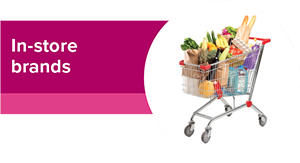
Consumer Electronics
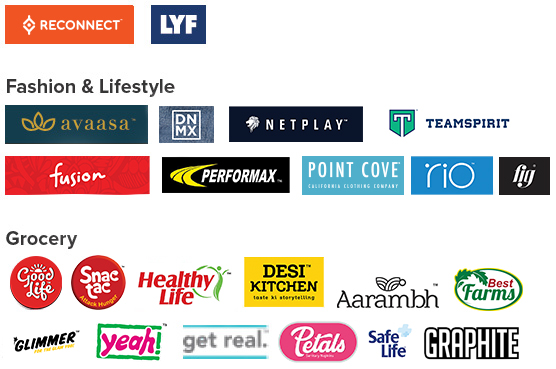

Consumer Electronics
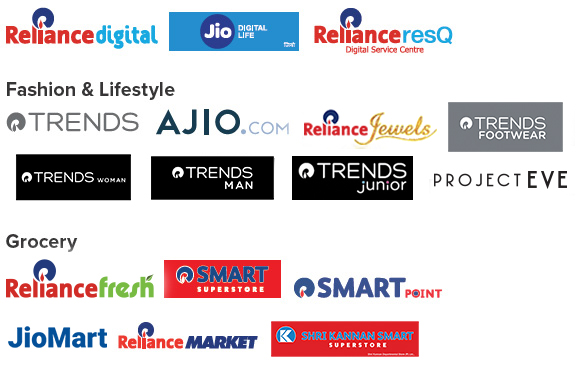

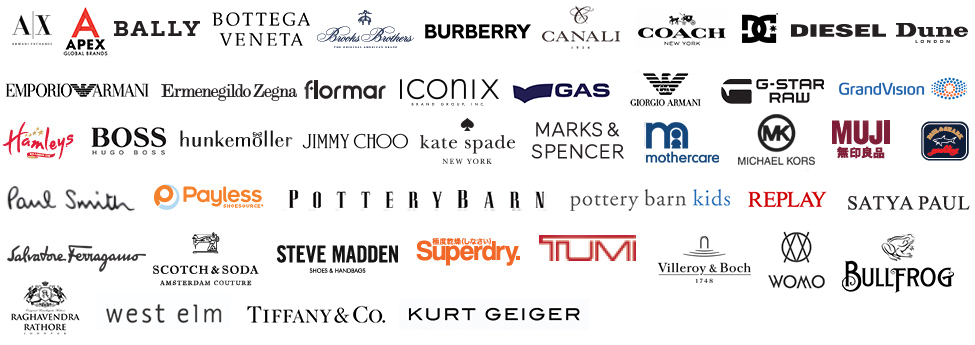


















FY 2019-20 has been a growth year for Reliance Retail with all consumption baskets consistently delivering on business strategy. Current positioning of the business and the business momentum is highlighted in the following points:
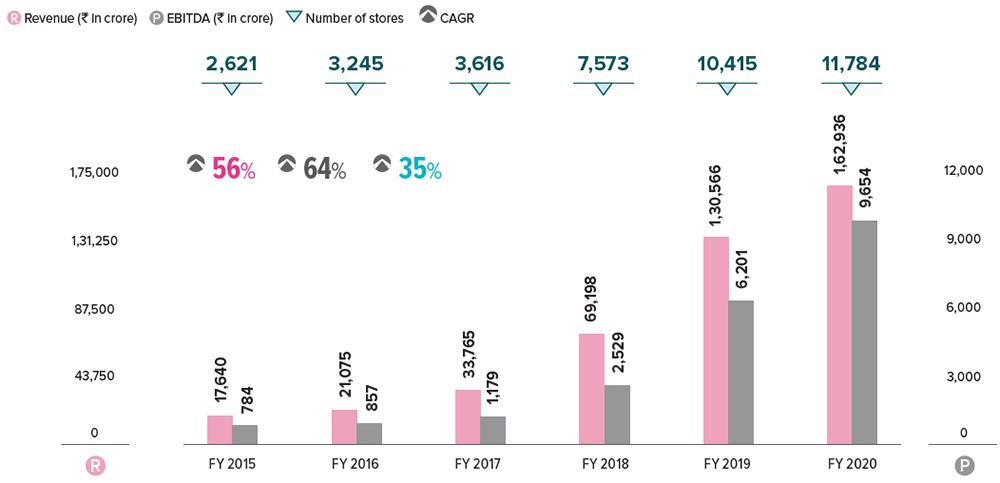
Reliance Retail’s meticulous planning, frugal approach, large scale and rapid execution has been the major driver of robust growth with capital efficiency y-o-y. The year has seen launch of over 1,500 stores across concepts demonstrating Reliance Retail’s superior execution skills. SMART Point, a neighborhood store concept took less than 45 days from design conceptualisation to launch during which 18 stores were opened across Thane, Navi Mumbai and Kalyan in Maharashtra.
Reliance Retail has the largest customer franchise of over 125 million registered customers who patronise all its diverse store concepts. Reliance Retail serves millions of customers every week who visit the stores and make them an important part of their shopping mission.
Reliance Retail’s store concepts span across all major consumption baskets which accounts for over 80% of consumption needs of Indian households. This enables Reliance Retail to touch and improve the lives of its consumers across diverse needs.
Reliance Retail’s integrated value chain ensures seamless distribution across demand markets through supply chain efficiencies. Reliance Retail’s farm to fork model with interventions at the farm level to procure fresh fruits and vegetables every day from farmers; fiber to wardrobe model for fashion & lifestyle, design to install and after sales service model in consumer electronics are fully integrated value chains which ensures direct control over product quality with sourcing benefits and stronger consumer value proposition.
Reliance Retail continues to penetrate further into smaller towns through new store expansion across all store concepts. Reliance Retail stores enjoy first mover advantage in a large number of markets which remain underserved by organised retail.
Reliance Retail operates the largest portfolio of esteemed international partner brands.
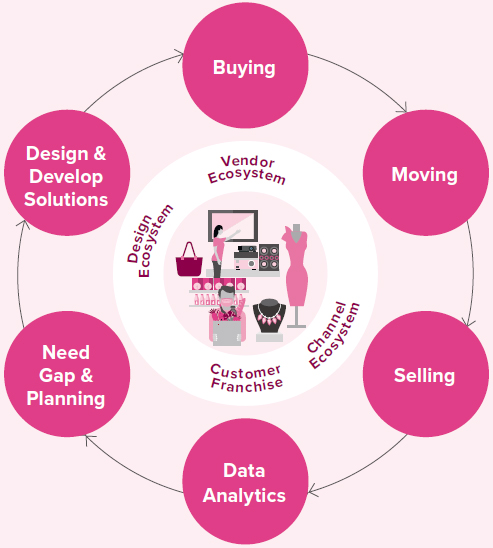
Buying
Vendor Ecosystem
Comprehensive network
of vendors from farmers to
large enterprises
Channel Ecosystem
Comprehensive network
of vendors from farmers to
large enterprises
Moving
Efficient and seamless supply:
Selling
Providing anytime, anywhere,
shopping experience through
stores, e-com, connected kiosks
and catalogue sales; after
sales service through resQ and
dedicated customer care
Data Analytics
Serving individuals, kiranas,
hotels, restaurants, caterers and
B2B customers; engagement
through loyalty programme,
enriching shopping experience
through consumer insights
Design & Develop
Solutions
Combination of inhouse and
external design support for
product development
Leveraging technology backbone across entire value chain and integrated IT systems
Inhouse engineering, procurement and construction team supporting rapid expansion
People - microservices organisation with defined roles and responsibilities
India’s retail market is estimated at US$822 billion in FY 2019-20 and is expected to grow at a CAGR of 10% over next 5 years to reach US$1,315 billion by FY 2024-25. The penetration of organised retail market is estimated at 11% in FY 2018-19 and is expected to grow to 17% by FY 2024-25E. The organised retail market is estimated at US$89 billion in FY 2018-19 and is expected to grow at a CAGR of 21% over next 5 years to reach US$230 billion by FY 2024-25E.
Reliance Retail is India’s largest and most successful retailer. In just 14 years of launch, Reliance Retail has accomplished a feat which no other retailer has achieved. Reliance Retail touches every aspect of its consumers’ life from morning to evening, food to fashion, items of necessities to luxuries of life, cities to towns, online to offline and much more, enabling the ease of living for every Indian. Reliance Retail is not only India’s foremost retailer, but it has emerged as the fastest growing retailer in the world and features among the top 100 retailers globally1.
Reliance Retail has established its business across five key consumption baskets of: a) Consumer Electronics, b) Fashion & Lifestyle, c) Grocery, d) Petro Retail and e) Connectivity with deep business moats. The dimensions of the business span across 11,784 physical retail stores across 7,000+ towns and cities, direct to consumer, Digital commerce channels and B2B channels serving millions of Indian consumers across underserved markets. The adjacent table sets out the spread of Reliance Retail’s business.
1Deloitte Global Powers of Retailing 2020


* includes stores of partner brands under joint ventures
CONSUMER ELECTRONICS
The Consumer Electronics market is
estimated at US$53 billion in
FY 2019-20 and is expected to grow at a
CAGR of 11% over next 5 years to reach
US$91 billion by FY 2024-25. The organised
Consumer Electronics market is estimated
at US$18.2 billion in FY 2019-20 with a
penetration of 34%.
Reliance Retail is India’s largest Consumer Electronics retailer with an extensive physical store network. The key proposition of Reliance Retail’s store concepts is centered around ‘Service’, ‘Solution’ and ‘Consumer Experience’. Reliance Digital is an experiential store concept where consumers can touch, feel, use and experience the products. Reliance Digital takes care of entire lifecycle needs of a consumer right from identifying the need gap, narrowing down the solution, suggesting product choices, to pre and post installation support to the customers through its service arm resQ.
Reliance Digital is India’s largest big box retail chain offering wide range of products across all key categories of mobiles, computing, household appliances such as televisions, washing machines, air conditioners, coolers, refrigerators, cameras, speakers, and many more.
Reliance Digital offers exclusive value for money products under its own brands ‘Reconnect’, ‘Jio Phone’ and ‘LYF’, exclusive brands ‘BPL’, ‘Sharp’ and ‘Kelvinator’ under long term collaboration arrangements and SKUs from all the leading Consumer Electronics brands. The core business model of Reliance Digital is to offer latest, exclusive and sophisticated products to consumers, in an all under one roof experiential store environment, at attractive price points and leverage its supply chain, partnerships with leading Consumer Electronics brand partners and financing partners to offer a win-win proposition for all.
resQ is India’s only ISO 9001 certified electronics service brand. With 171 service centers, resQ provides multi-brand, multiproduct service including installation, repairs, maintenance and comprehensive resQ care plans to consumers thereby providing a one stop solution to consumers.
Jio Stores offers connectivity and mobility solutions to consumers with over 8,100 stores across 7,000+ towns and cities. Jio Stores act as an interface offering Reliance Digital’s catalogue of offerings, through a ‘phygital’ experience to consumers. Close to 10% of Jio store’s revenues come through catalogue sales.
A glimpse of how Reliance Retail approaches consumer electronics consumption baskets is outlined in the below infographic:
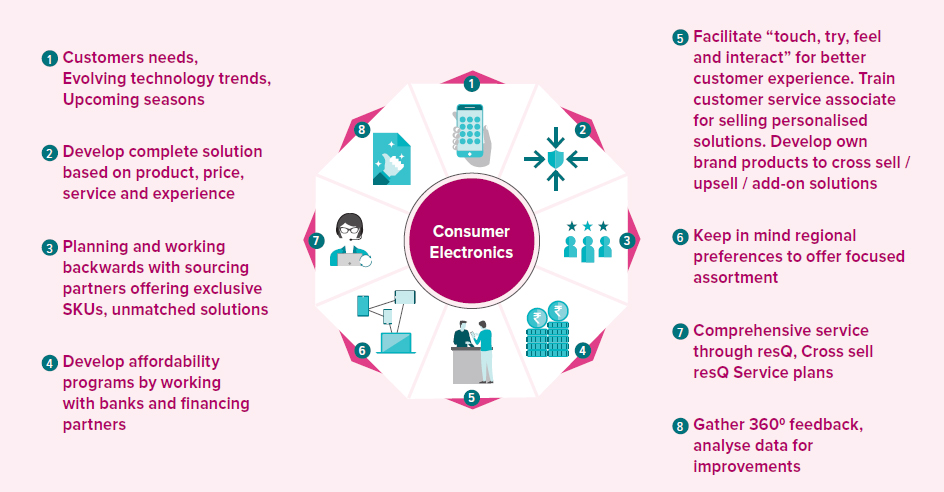
FASHION & LIFESTYLE
The Fashion & Lifestyle market is estimated at US$139 billion in FY 2019-20 and is expected to grow at a CAGR of 11% over next 5 years
to reach US$233 billion by FY 2024-25. The organised Fashion & Lifestyle market is estimated at US$40 billion in FY 2019-20 with a
penetration of 29%.
Reliance Retail is the largest fashion & lifestyle retailer in India with offerings across all income segments covering value, mainstream, premium, affordable luxury and luxury. Reliance Retail manages end to end value chain across apparel, footwear, accessories, toys and much more through bouquet of store concepts. A glimpse of how Reliance Retail approaches fashion & lifestyle business is outlined in the below infographic
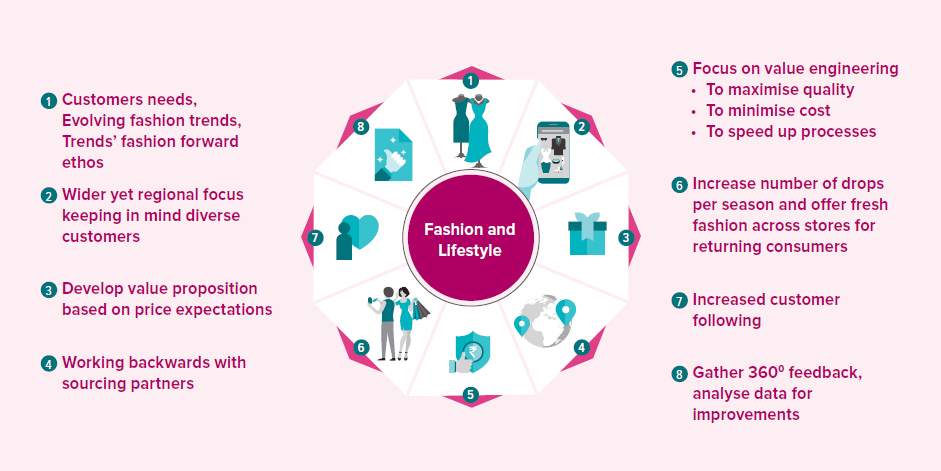
Trends is the flagship store concept of Reliance Retail democratising fashion for millions of Indian consumers. Acceptance of Trends concept by its consumers has further helped it to nurture engaging store concepts of Trends Woman, Trends Man, Trends Junior and Trends Footwear. Together, Trends is India’s largest fashion retail chain operating over 1,400 stores.
Trends predominantly sells own brand products, which constitute over 70% of its sales. The core business model of Trends is dogged upon providing best and latest of fashion trends to consumers at compelling price points backed by an integrated value chain that ensures high quality products with optimisation from sourcing till delivery of products to consumers. This approach ensures early break-even for most Trends stores and contribute to the overall profitability of the business. At the same time, a curated blend of select third-party brand offerings add to the choices and comparison for the consumers.
Trends has developed a robust portfolio of over 20 own brands such as Avaasa, DNMX, Netplay, Performax, Teamspirit, etc. to cater to diverse tastes and preferences of customers. Today, many of these brands have an annual turnover of over ` 500 crore making them comparable to many national and international brands operating in the market.
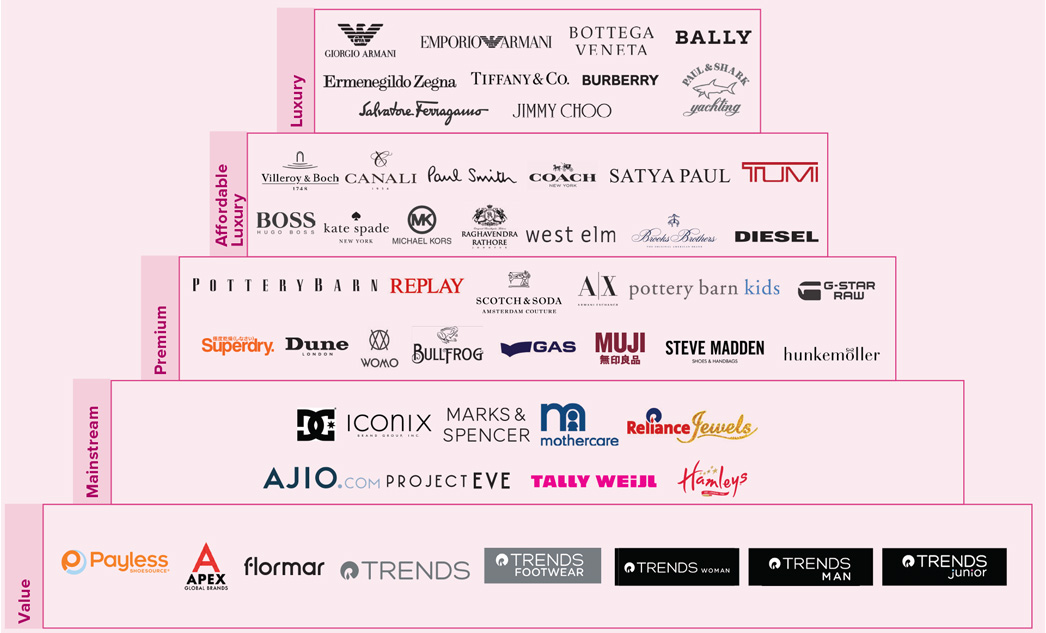
Under the Trends umbrella, Reliance Retail operates Trends Small Town, which is a smaller sized store measuring about 5,000 sq. ft. on an average, offering focused range of products for dressing needs of entire family. The store concept is addressed to Tier III and Tier IV towns, where larger sized quality real estate may be either difficult to find or may be inefficient to operate. Trends Small Town concept has been well received by its customers and has scaled up to 240 stores across 200+ towns in a short time.
Trends Footwear is a family footwear store concept offering affordable and fashionable footwear for everyday needs. The stores offer a range of value for money merchandise under own brands and a wide variety of footwear and accessories across all leading footwear brands.
In addition, Trends operates three apparel store concepts: Trends Woman, Trends Man and Trends Junior. These are destination stores for women, men and kids (aged 0-14 years) respectively and offers apparel, footwear & accessories in differentiated store environment.
Project Eve is an experiential women’s only store concept positioned in the mid to premium segment. The store offers apparel, beauty & cosmetics, accessories, footwear, in-store salon and a café, all under one roof to address entire wardrobe needs of a woman.
The Jewellery market is estimated at US$65 billion in FY 2019-20 and is expected to grow at a CAGR of 11% over next 5 years to reach US$111 billion by FY 2024-25. The organised Jewellery market is estimated at US$20 billion in FY 2019-20 with a penetration of 31%. Crafted on the pillars of purity, trust, transparency and quality, Reliance Jewels is a chain of premium jewellery stores present across 60+ towns and cities offering wide variety of fine jewellery collections.
To cater to the needs of India’s millennials to Generation-Z, Reliance Retail has created a curated fashion platform AJIO. It offers over 2,50,000 styles of curated collections across own brand and 1,400+ national and international brands. AJIO provides seamless shopping experience to customers through e-com website, mobile app, physical outlets inside Trends, and endless aisle kiosks.
Reliance Retail operates over 650 stores across a portfolio of 46 revered exclusive international partner brands. It has set up, built and ‘glocalised’ international brands such as Armani, Diesel, Brooks Brothers, Marks & Spencer, Muji, Mothercare and many more.
GROCERY
The Food & Grocery market is estimated
at US$545 billion in FY 2019-20 and is
expected to grow at a CAGR of 9% over
next 5 years to reach US$850 billion by
FY 2024-25. The organised food and
grocery market is estimated at US$21 billion
in FY 2019-20 with a penetration of 3.7%.
Reliance Retail is the largest grocery retailer in India with a presence of 797 stores across 180+ towns and cities. Reliance Retail endeavors to bring extensive selection of fresh produce, items of daily use and general merchandise in a modern setting and at an attractive value proposition. In order to achieve this, Reliance Retail operates four engaging store concepts viz. Reliance Fresh, Reliance SMART, SMART Point and Reliance Market, delivering benefits of modern shopping experience to consumers.
Reliance Fresh is the neighbourhood store offering daily needs and essential items across fresh foods, staples, FMCG, home and personal care and much more with a focus on offering convenience, quality produce and ensuring availability.
Reliance SMART is a destination store concept offering wide variety of products across fresh foods, staples, FMCG, home and personal care, beauty & cosmetics, value apparel & footwear, general merchandise and much more in an all under one roof setting.
SMART Point, a smaller avatar of SMART store, is a one stop multi-purpose store concept housed in residential neighborhoods offering SMART’s price promise across all grocery needs, pharmacy and assisted Digital commerce.
Reliance Market is the wholesale cash and carry store concept serving households, kiranas, hotel, restaurants and catering (HORECA), institutions and B2B member partners. Reliance Market is the largest cash and carry chain operating over 52 stores across 46 cities.
Reliance Retail has developed wide range of own brand products across various categories such as staples, food FMCG, home & personal care and general merchandise. Best Farms, Good Life, Masti Oye, Kaffe, Enzo, Mopz, Expelz, Home One, Graphite, RelGlow, among others are some of the brands that have been well received by consumers.
The inherent strength of Reliance Retail’s grocery business model arises from its farm-to-fork grocery value chain. Reliance Retail has directly partnered with tens of thousands of farmers and small vendors which ensures that quality produce is made available at its stores through ground level interventions, supply chain efficiencies, lower wastages compared with traditional trade channels, and an agile movement of produce to consumers, thereby ensuring shared prosperity.
A glimpse of how Reliance Retail approaches grocery business is outlined in the below infographic:
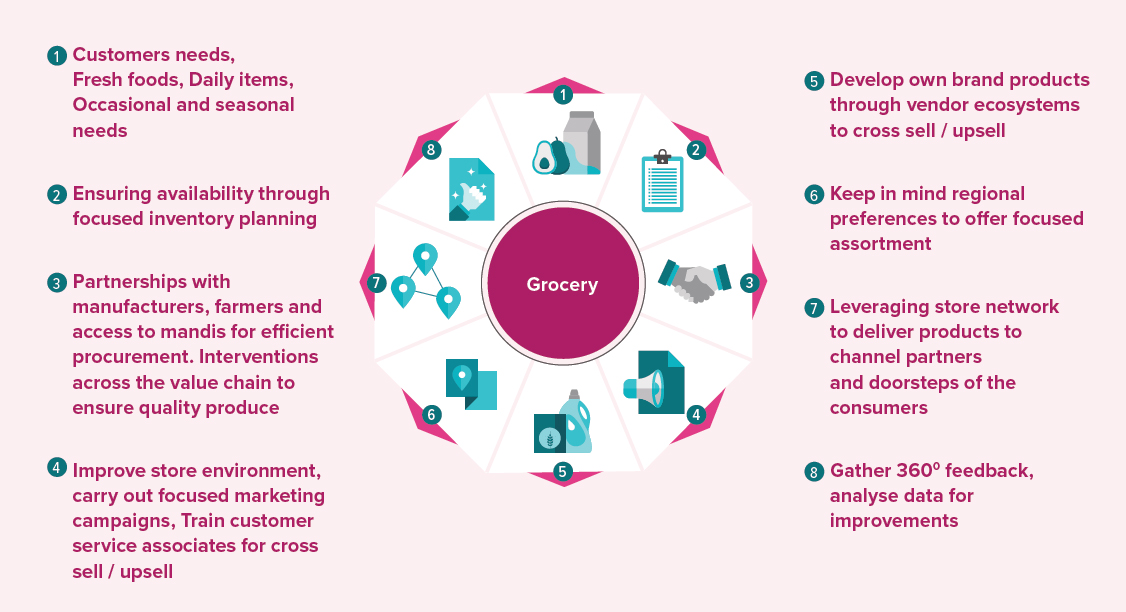
PETRO RETAIL
Reliance Retail is a leading private sector
petro retail operator with 519 owned Petro
Retail outlets. These outlets are spread
across India with a focus on serving
highway corridors between major cities.
Reliance Petro Retail outlets yield significantly higher volumes than industry average led by efficient processes, technology backbone and well-trained employees. The petro outlets offers diesel, petrol and LPG to its customers with a focus to serve high quality fuels.
CONNECTIVITY
Reliance Retail works as the Master
Distributor for Jio connectivity services. The
distribution network comprises over 8,100
Jio stores and vast network of retailers
across the country for new customer
acquisition and recharges.
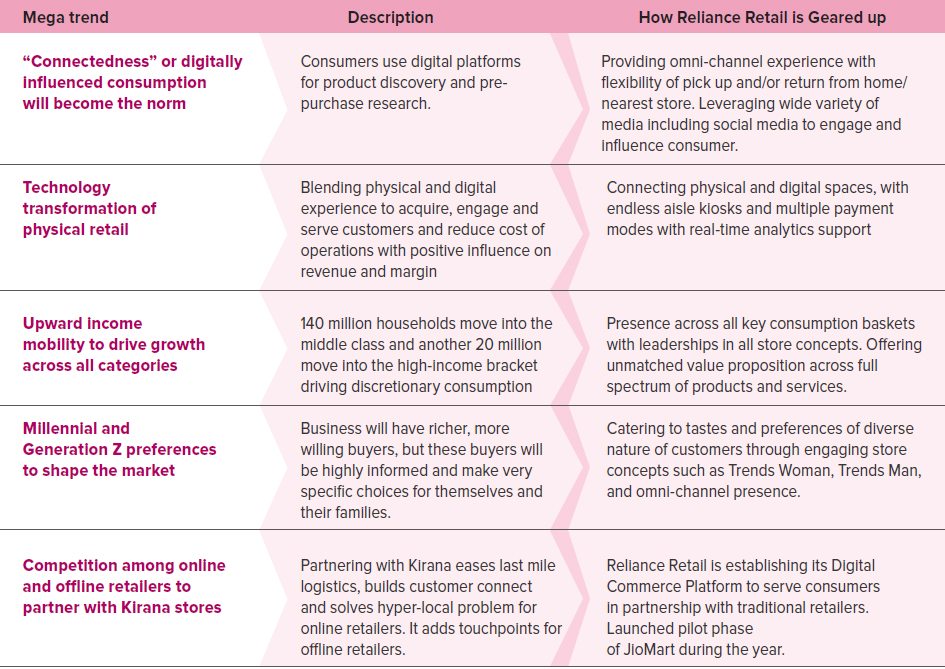

* EBITDA margin is on net revenue
Reliance Retail achieved a turnover of ` 1,62,936 crore in FY 2019-20, registering a growth of 24.8% y-o-y. EBITDA margin improves to 6.6% vs 5.3% last year. The business delivered an EBIT of ` 8,263 crore in FY 2019-20, registering a growth of 49% y-o-y.
Reliance Retail operated 11,784 retail stores in over 7,000 towns and cities covering an area of 28.7 million sq. ft. as on 31st March 2020. Reliance Retail operated 519 petro retail outlets as on 31st March 2020.
Reliance Retail demonstrated yet another year of highest ever revenue, EBITDA and margin expansion despite challenging market environment, slowing consumer demand, and COVID-19 disruption towards the end of the year. This robust business performance is backed by consistent strategy, sharp operational execution and a customer centric approach.
REVENUE
Business performance has been broad
based with growth delivered across all
categories. The revenue growth continues
to be built around a balanced mix of healthy
like for like sales from existing stores,
bolstered by new customers acquired
from a rapid expansion of stores across
consumption baskets and geographies.
The gains of modern retail are being
brought to the real ‘Bharat’ as more than
2/3rd of stores are operated in Tier II, Tier III
and Tier IV towns.
Business model is witnessing the benefits of operational efficiencies with margin growth outpacing the exponential revenue growth. The margins continue to improve across all consumption baskets backed by improving store productivity, favorable product portfolio mix, sourcing benefits and operational efficiencies. Further, initiatives centered around process improvements, use of technology and training are helping optimise costs and enhance store throughput resulting in margin improvement.
(` in crore)
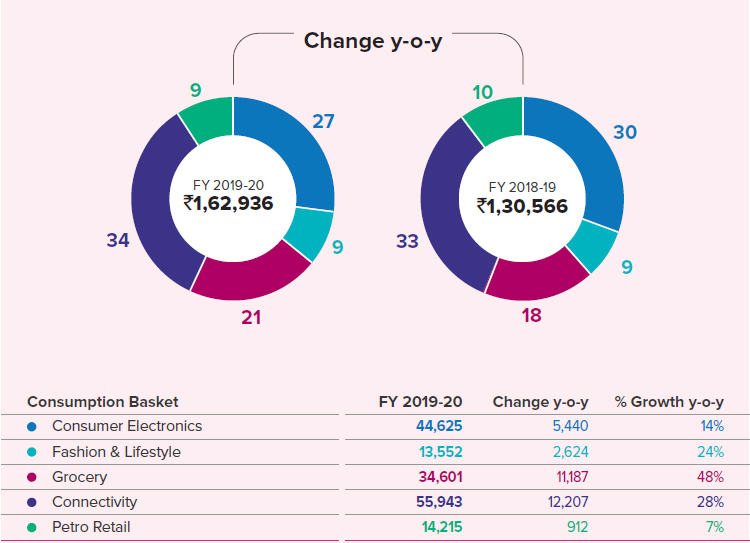
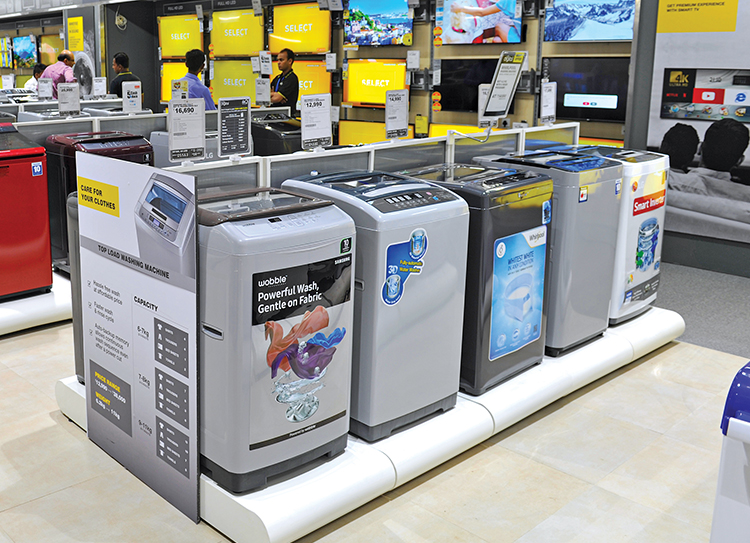
Reliance Digital
As the business is scaling up further, benefits of operating leverage are providing significant headroom for the business to continue making requisite investments to secure its future readiness, whilst delivering profitable growth alongside. Expansion of the business in Tier 3 / Tier 4 markets and early break even witnessed in these markets reflect this feat.
In Consumer Electronics, the business continued to pursue physical store expansion and opened 605 stores during FY 2019-20. Reliance Digital continues to march ahead of its competition and crossed a milestone of 400 stores. Business registered robust growth which was driven by focused strategy, marketing campaigns, superior customer experience, exclusive product SKUs, partnerships with leading financial institutions for consumer financing, strong festive season footfalls and big days performance.
Reliance Retail entered into a long-term exclusive brand licensing arrangement with Kelvinator and BPL. The arrangement grants Reliance Retail an exclusive manufacturing, marketing and distribution right in India for a range of products covering consumer electronics, durables and accessories.
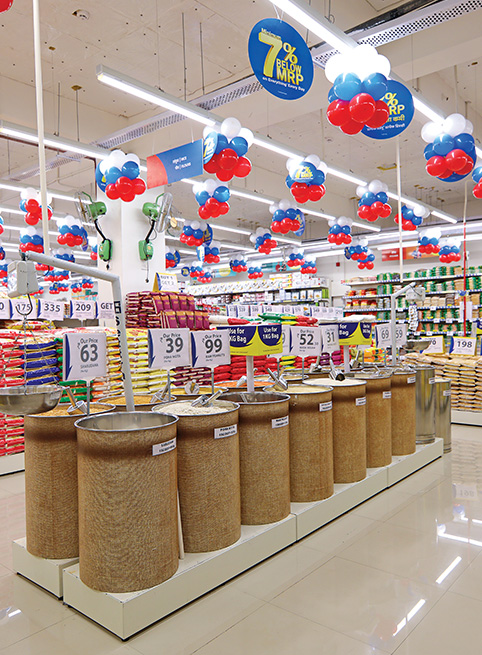
SMART Superstore
In Fashion and Lifestyle, Trends continues to carry out fastest store expansion among fashion retailers in India and opened over 500 stores during FY 2019-20. Overall, the Fashion & Lifestyle business crossed 2,000 store mark.
AJIO continues to witness superlative growth across all operating parameters viz. web visits, assortment listing, browsing time, number orders, among others. The business continues to strengthen its O2O (offline-to-online) capabilities through in-store couponing, endless aisle kiosks across 841 Trends and extension stores, direct deliveries from 350 Trends and 70 Trends Footwear stores.
Reliance Brands acquired the iconic British Toy retailer Hamleys. With over 250 years’ history, Hamleys is oldest toy retailer in the world, bringing smiles and laughter to children all over the world. During the year, Reliance Brands announced a JV with Tiffany & Co, American luxury jeweller and specialty retailer, JV with WOMO | Bullfrog, the premium Italian men’s cosmetics brand and exclusive partnerships with British Footwear and Handbags brand Kurt Geiger.
The market for traditional jewellery retailers faced headwinds during the year, whereas customer centric modern trade retailers witnessed growing demand. Business believes this movement to be a secular trend. To capitalise on this market opportunity, Reliance Jewels nearly doubled its reach from 143 stores to 241 stores.
In Grocery, the business accelerated the pace of expansion with 98 SMART stores launches during the year, taking total SMART store count to over 250 stores. Almost half of the SMART stores are in Tier II and smaller towns and have shown equally robust customer traction and sales throughput as the stores in metro cities.
A new store concept SMART Point was executed in a record 45 days’ time from concept ideation to launch. The business continues to strengthen merchandising capabilities through stronger ties with vendor partners – exclusive product launches, exclusive pack sizes and consistency in supplies. Reliance Retail has also been a growth catalyst for many regional brands in developing innovative products, packaging designs and in expanding their markets.
Reliance Retail is now embarking on a journey to transform traditional retail through its JioMart Digital Commerce Platform. The roadmap to this journey requires Reliance Retail to establish a complex yet robust physical and digital pan-India infrastructure and neatly weave this network to a smooth, sound and responsive operating system, which will enable Reliance Retail to serve consumers in partnership with traditional retailers.
Reliance Retail has commenced taking strides towards this with the launch of pilot phase of JioMart in select cities. It provides omni-channel experience to consumers who can place orders through alternative ways including Whatsapp which will be served by merchant partners. It is aimed at changing the entire customer journey in ways that even consumers who are not comfortable with digital channels become comfortable with JioMart. JioMart acts as a centralised procurement and delivery platform between manufacturers and merchant partners. JioMart enables digitisation of merchants through Jio PoS at the backend and JioMart app at the frontend. As for the pilot, Reliance Retail has commenced onboarding merchant partners in a limited geography.
Reliance Retail will continue to invest in expanding the existing store network and enhance core capabilities including omni-channel solutions, innovative store concepts, enhancing store environment for providing immersive customer experience, leveraging customer insights through use of sophisticated technology and much more to consolidate its market leadership across all consumption baskets and store concepts.
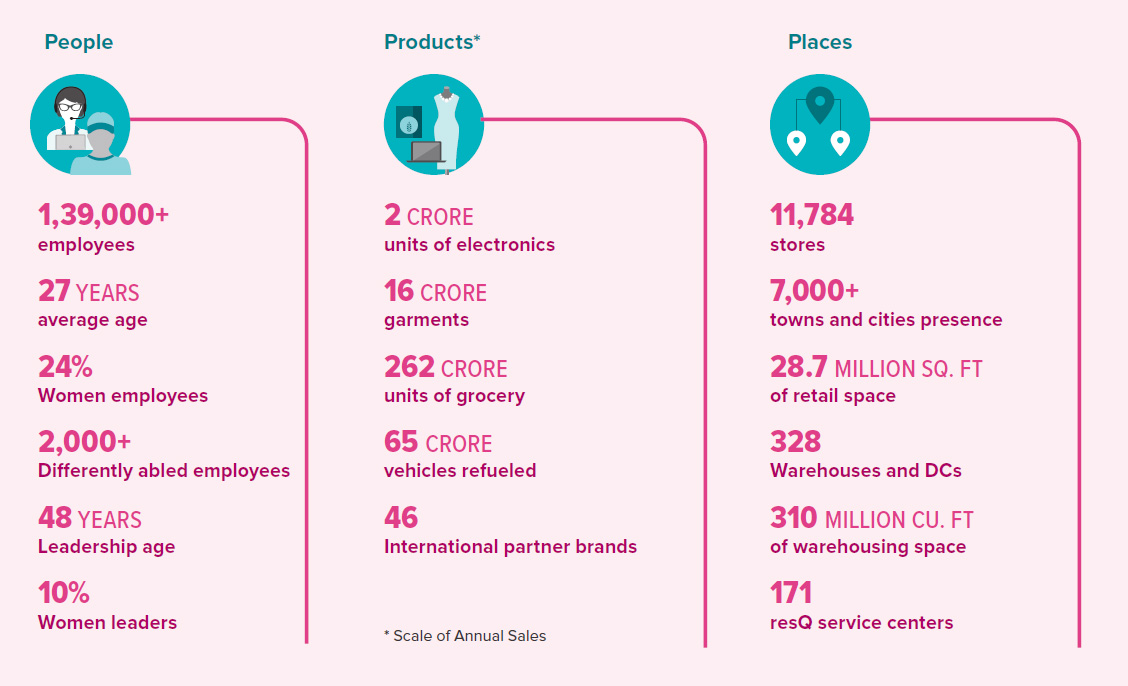
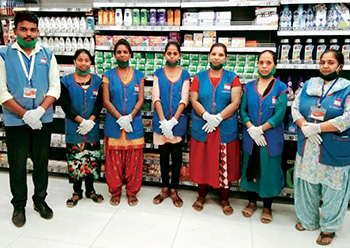
Reliance Retail promptly addressed many of the challenges posed by COVID-19 disruptions through numerous initiatives and actions. It ensured security of its employees through daily monitoring of diagnostic symptoms, assistance to employees in case of medical emergencies, early disbursement of salaries, protective gear for on-ground staff, recognition of heroes for their exceptional service through newsletters and much more. Business ensured that more than 98% of the grocery stores were operational, sufficiently stocked with essentials and re-aligned store layouts for quick service. It increased capacity for home delivery, enabled “buy online pick up in store” to prevent crowding at stores, introduced “combos” to reduce shopping time and launched bulk ordering for residential societies. Business ensured supplies across the entire ecosystem and delivered essentials to various state governments, and NGOs for welfare initiatives in partnership with Reliance Foundation.
As much as COVID-19 was a disruption, the business also viewed it as an opportunity to strengthen its partnership with kirana ecosystem. During the lockdown JioMart provided uninterrupted services to kiranas across Navi Mumbai, Thane and Kalyan and witnessed order flow increase of 4x times of pre-lockdown period. JioMart also commenced WhatsApp ordering for consumers through its partnership with Facebook.
Reliance Retail is rewiring parts of its business and future readying it for a post COVID-19 world through various measures. It is enhancing safety and hygiene standards and workplace practices for offices, stores and operations. Business is re-imagining the store in a post COVID-19 world and reworking its interactions with customers when they come back, how they come back, their shopping journey, checkout and so on. Taking a 3600 view of the customers, business is strengthening digital commerce and omni-channel capabilities, bolstering its supply chain / fulfillment capacity to handle 10x home delivery. The lockdown has provided valuable learnings for JioMart’s business model and yielded encouraging progress. This will enable accelerated roll-out of JioMart Digital Commerce. Business is further building a strong own brand portfolio in apparel and grocery in keeping with emerging consumer trends.
Reliance SMART connects the customers with the under-privileged by collecting donations from customers and donating the same to NGOs. The platform aids busy customers who want to help the under-privileged by connecting them with the under-privileged.
These NGOs cater to senior citizens, orphans, destitute and differently-abled. The store staff have established cordial relationship with these institutions by visiting these NGOs on a monthly basis to donate and also inviting them for the store visits.
The Store Operations team identify and connect with NGOs to carry out donation activities in their premises.
A monthly budget has been set for each SMART store to conduct the donation activity for the NGOs.
A collection bin has been installed in SMART stores in which customers donate items and it also has a money Donation box where customers can voluntarily contribute Re.1 or more. Stores also buy items from their community budget and add to the customers’ donations.
Stores then segregate and pack the donation items before visiting the NGO.
Stores share donation details and pictures of the activity during NGO visit on monthly basis.
More than 100 NGOs have collaborated with Reliance SMART Stores covering all major cities of India. Every month Reliance SMART touches lives of over 1 lakh underprivileged people. On an average, 15,000 kg. worth of non-perishable food items, clothes, personal and homecare items, sweets and stationary items are donated on monthly basis.
Serving and caring the society as a responsible corporate citizen by contributing to improve the living conditions of the less fortunate. Establishing Reliance Retail Stores as community Stores, a focal point, where people can feel their connection with the underprivileged. Spreading happiness and love among orphans, differently abled and senior citizens.
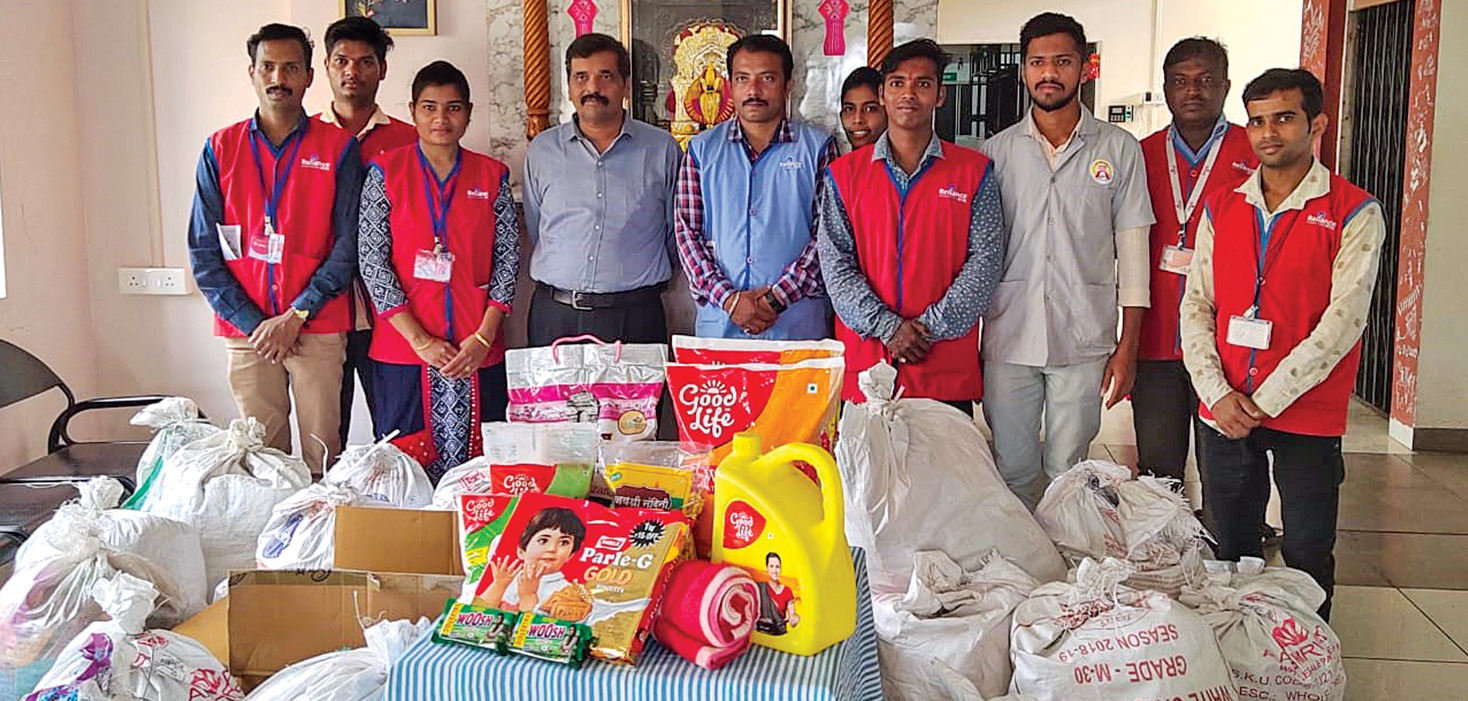
Reliance Retail is home to almost one lakh employees with diverse socio-economic and educational backgrounds. Reliance Retail provides employment and development opportunities to a wide strata of population ranging from unskilled workforce to people with doctoral degrees.
Under the National Apprenticeship Promotion Scheme (NAPS), unskilled workforce work with Reliance Retail as apprentices in a year-long program. Another initiative named Source-Train- Hire, is run in partnership with Reliance Foundation, through which Reliance Retail trains unemployed youth across nation with the aim of imparting their skills to help them move up the social ladder through gainful employment.
Reliance Retail helps the employees with financial assistance schemes for higher education. Through the BBA in Retail program, Reliance Retail helps them become graduates. Reliance Retail also provides the opportunity to earn “Recognition of Prior Learning” RPL Certificate under PMKVY scheme.
Under the “Step-Up” program, store and warehouse people get an opportunity to be trained and grow towards more complex roles.
Reliance Retail also recognises that there is a huge opportunity to provide upwards social mobility to people with disabilities who constitute 2.2% of Indian population. Through the efforts of making Reliance Retail a great and welcoming place to work for people with disabilities, more than 2,000 PWDs are part of Reliance Retail family.
Carrying forward the vision of the Chairman of creating an ease of living for every Indian, Reliance Retail is leaving no stone unturned. Reliance Retail’s commitment to “bettering the lives” has led to the initiative of bringing millions of farmers, small scale producers and merchants to the forefront of the retail revolution by partnering with them for growth.
Reliance Retail is committed to creating one of the world’s most people-friendly, performance-driven, and process-efficient learning organisation, where the best and the brightest work together to create a responsive, respectful and delightful work environment. This has impacted the lives of millions of people by improving their living standards to a great extent.
Unforeseen situations, language barriers and disabilities would never diminish the spark in the eyes of the employees. They are committed to exhibit the core values of Reliance Retail at all times. Be it providing exceptional shopping experience or helping the needy and elderly, Reliance Retail’s employees go an extra mile to create an impact in our customer’s buying decision to a great extent. There have been bounteous instances wherein the customers have appreciated the quality of hard work our employees have put in for the following areas:
The seed of Reliance Retail was sown with a vision of building the most admired & successful organised retail company in India that enhances the quality of life of every Indian.
The journey that started 14 years ago has manifested into a remarkable and robust business that we all are proud of.
Reliance Retail’s operating model is based on customer centricity, while leveraging common centers of excellence in technology, business processes and supply chain. In an endeavor to serve customers across geographies, segments and consumption occasions, Reliance Retail has built and refined multiple store concepts with a focus to serve diverse needs of its customers.
Reliance Retail has consistently endeavoured to provide best store experience, unmatched value proposition and seamless anytime, anywhere shopping experience, through omni-channel initiatives. This strategy has resulted in strong operating performance, broad-based growth and leadership across consumption baskets.
Reliance Retail engages with its value chain partners and bring out disruptive gains for all stakeholders.
In the grocery consumption basket, linkages with the farm have brought about transformational changes in the quality of life of farmers, also enhancing the quality of produce, reducing wastage by shortening the time to move fresh produce and reducing intermediaries in the value chain, thereby benefiting all. Modern grocery retail has evolved in India and so has the consumers. To remain relevant to weekly and monthly shopping missions of a household, Reliance Retails grocery stores have successfully maintained a fine balance of serving local tastes by offering small brands, as well as national and international brands. Similar interventions in fashion & lifestyle and consumer electronics consumption baskets have also brought about lasting gains to all value chain partners and have benefited consumers.
With an undistracted focus and commitment to better the Indian retail landscape, Reliance Retail has emerged as a leader in not only in Indian market context but also global arena. Reliance Retail has featured amongst the fastest growing retailers in the list of “Global Powers of Retailing” published by Deloitte for 3 consecutive years based on FY2016-17, FY2017-18 and FY2018-19 financial numbers. Reliance Retail has currently featured at #1 position amongst the fastest growing retailers in the world, a feat that makes India proud.
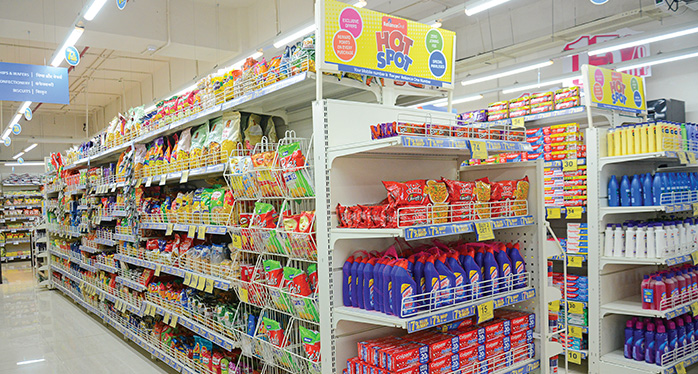
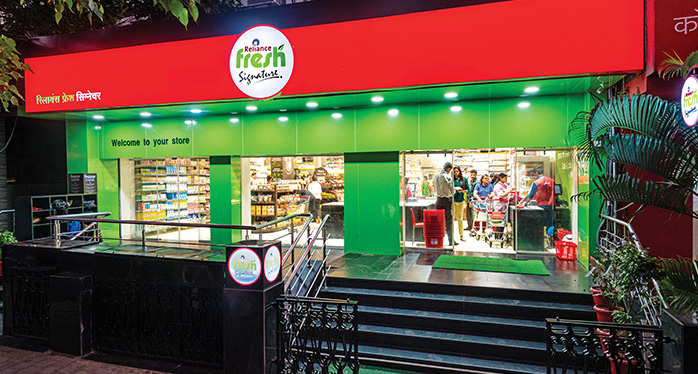
To connect everyone and everything, everywhere – always at the highest quality and the most affordable price. Jio’s vision is to transform India with the power of digital revolution

MyJio
Manage your Jio account

Jio Call
VoLTE and rich
communication on all phones

Jio Store
Install and manage your
apps on Jio devices

Jio Motive
Make your car Wi-Fi enabled,
check real-time location and
status, emergency contacts

JioTV
Live and catch-up
TV on the move

JioCinema
Entertainment at
your fingertips

JioSaavn
Music for you.
Anytime, Anywhere

JioGames
Bringing games to
everyone’s life

JioHealthHub
Your digital health vault

JioNews
Complete package for
digital news and magazines

JioTV+
Aggregating video
content across OTT apps

JioAds
Cross-device marketing
technology platform

JioCloud
Store and access your
files from anywhere

JioNet
Gateway to India’s
largest Wi-Fi network

JioBrowser
Fast, safe and
lightweight Indian browser

JioHome and JioSmartLiving
To control IoT devices,
access media
content, customised
home automation
and surveillance

JioChat
Free chat, SMS, voice
and video calls

JioSecurity
Protect your phone,
secure your data

JioSmartSecurity
Security camera application
which lets you connect and
view multiple cameras

JioPOS Lite
JioPOS Lite
Peer to peer mobile recharging
on a commission basis

Tesseract
Democratising mixed
reality

JioMoney and
Jio Payments Bank
Experience cash-free living

JioSwitch
Secure file
transfer and share

JioGST
GST service provider

JioMart
Online to Offline (O2O)
commerce platform

Embibe
Education platform
























Jio continues to drive the digital revolution in India with 387.5 million subscribers becoming a part of the Jio ecosystem as of March 31, 2020. Jio was built on the core thesis of the transformative power of data with connectivity as an enabler. It has delivered the fastest at scale connectivity user onboarding and is now layering on a robust digital services ecosystem of apps while leveraging its deep technology capabilities.
As a first step towards creating the digital services ecosystem in the country, Reliance Jio has been the key catalyst in creating the broadband data market in India. It is now the #1 ranked mobile telecom operator in the country by both Adjusted Gross Revenue (AGR) and subscribers.
To further facilitate this from the perspective of a business organisation, Jio has consolidated all its technology capabilities, investments and connectivity businesses into a single-holding company called Jio Platforms Limited.
Jio remains committed to creating the world’s premier digital society in India. This will be built on the transformative power of data, where connectivity becomes the enabler for digital platforms, improving lives of every citizen of the country.
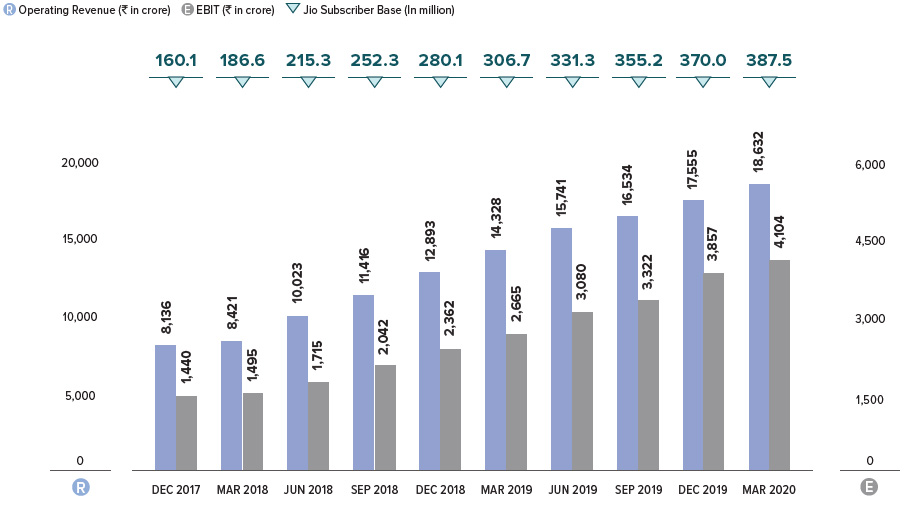
Jio remains committed to its vision of connecting everyone and everything, everywhere – always at the highest quality and the most affordable price.
Coverage
Coverage refers to
anytime, anywhere mobile
broadband access. Jio’s
4G coverage at present is
greater than 2G coverage
in India with close to 99%
population coverage. This
coverage is backed by
pan-India 4G spectrum
across three bands and
the best fiber and tower
infrastructure in the
country, providing the best
network experience and
farthest reach.
Data
Average per capita
data consumption on
Jio’s networks is
11+ GB per month
with potential upside
from new use cases
coming up every day.
Quality
Jio offers services on an
all-IP, LTE network with
best-in-class customer
service, easy app-based
customer interaction for
query resolution and
recharges, and AI-based
bots to provide seamless
onboarding and
service experience.
Affordability
Affordable and simple
pricing plans have been
the key to the large-scale
adoption of Jio services.
Jio has been able to
offer these on the back
of superior technologybased
operating
efficiencies, enabling it
to offer services at the
most affordable price.
Agility
Jio’s adoption of an
agile model while
developing its systems
has supported its ability
to scale and adapt in an
orderly manner.
TOTAL SOLUTIONS FOR
ECOSYSTEMS
Jio is creating a massive digital ecosystem
for a billion Indians with domain expertise
across business verticals in the platform
company. The platform company will not
just provide world-class fixed-mobile
converged connectivity, but also digital
solutions across business verticals and
the customer life cycle. Jio has taken the
ecosystem approach to bring together
its pan-India network and distribution
presence with deep technology expertise
to benefit consumers, merchants/Small and
Medium Businesses (SMBs) and enterprises.
Jio’s services span across connectivity and cloud, media, digital commerce, financial services, gaming, education, healthcare, agriculture, Government to Citizen (G2C), smart cities and manufacturing.
DIGITAL PLATFORMS
Jio has created strong internal
capabilities across the following key
digital technologies:
Infrastructure as a Service (IaaS), Platform as a Service (PaaS), Big Data, Augmented Reality/Virtual Reality (AR/VR), Internet of Things (IoT), Blockchain, Artificial Intelligence (AI), Machine Learning (ML), edge computing, speech/natural language, super computing, computer vision, robotics and drones.
These capabilities will power the creation of reimagined solutions for various ecosystems.
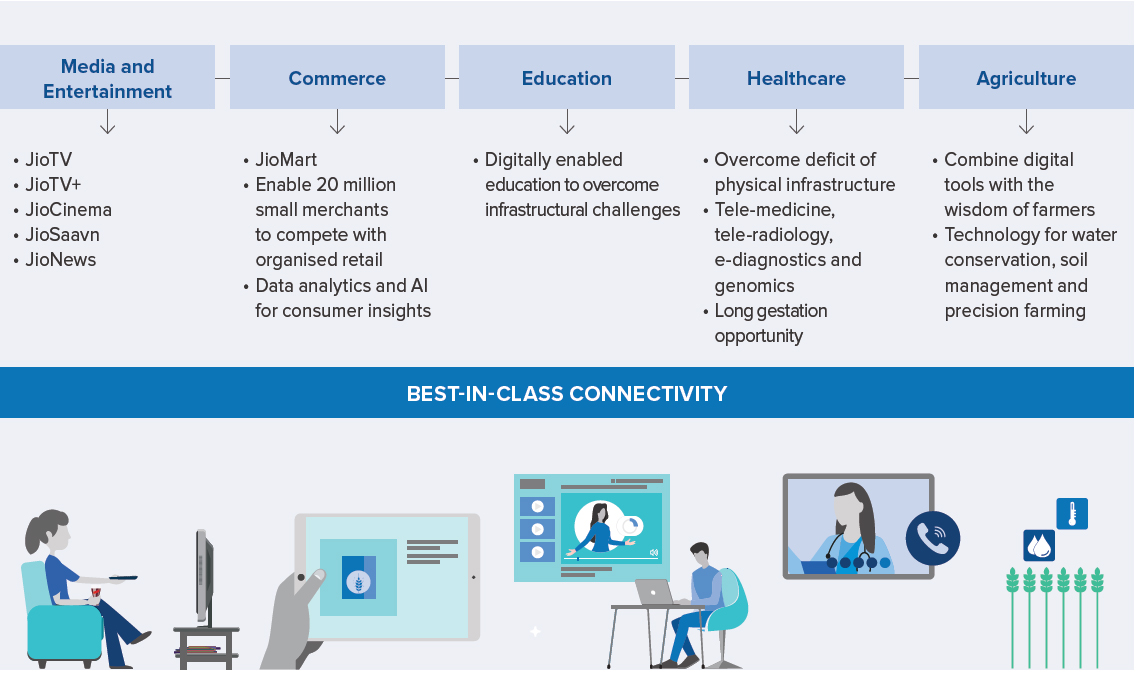
ADOPTION OF DIGITAL SERVICES
India now has over 650 million mobile
broadband subscribers driven by
large-scale launch of 4G-LTE network
across the country by Jio and other
mobile operators. Deeper rollout of 4G-LTE networks has also led to a steady
increase in mobile internet penetration
across rural areas to 28%. India has seen
a meaningful transition from 2G/3G to 4G
and existing 350 million feature phone
users are expected to follow suit with
affordable smartphones and seamless
availability of mobile data networks over the
next few years.
EXPONENTIAL GROWTH IN
DATA USAGE
Increasing adoption of broadband services
has led to a 50% y-o-y growth in wireless
data usage across the country over
FY 2018-19. Increasing availability of
devices, improving network penetration,
higher affordability for data services
and emerging new use cases are likely
to sustain this exponential growth
in data demand.
Jio with affordable data plans has been the primary driver of data boom in India over the past three years. Prior to the launch of Jio services, the total mobile data traffic across all networks in India was 0.2 Exabytes per month. At present, Jio network alone carries over 4.5 Exabytes per month, with the industry data traffic of more than 7.5 Exabytes per month (this was 6.9 Exabytes at the end of CY 2019).
As per data in the Ericsson Mobility Report 2019, mobile data in India is expected to grow 3X during CY 2019-25E, with mobile broadband subscriptions expected to double during the same period. The government’s endeavour to roll out nextgeneration data network in the remotest corner of the country for all citizens would accelerate this transition towards a digital society.
(Exabytes)
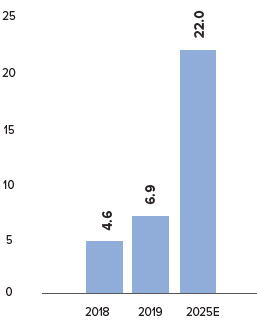
Source: Ericsson Mobility Report
REGULATORY DEVELOPMENTS
Among the key regulatory developments
with respect to the digital services business,
was TRAI’s decision to push back the
transition to Bill and Keep (BAK) regime by
12 months. The Interconnect Usage Charge
(IUC) would now be reduced to zero with
effect from January 1, 2021. Accordingly, Jio
introduced a charge of 6 paise/minute on
all off-net outgoing voice minutes to pass
through the impact of change in regulatory
stance on IUC in October 2019. This has
led to a significant improvement in voice
traffic mix as misusers of free voice services have left the network and Jio is now a net
receiver of IUC.
(%)
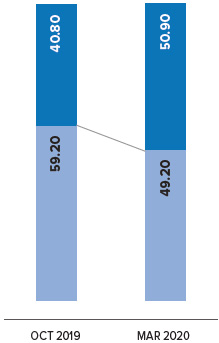
(Million)
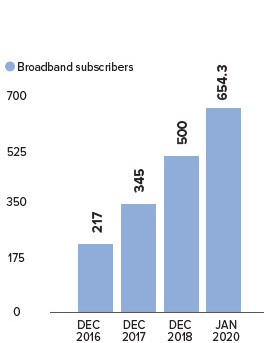
Source: TRAI
Jio continues to believe that transition to the BAK regime will hasten the adoption of more efficient technologies like VoLTE, which has a negligible cost for carrying and servicing essential voice services.
During the year, TRAI has also initiated consultation process on feasibility of establishing a floor price for mobility services in the country. Market dynamics have improved in the recent past, as reflected by tariff hikes effective December, 2019 wherein all the operators revised their tariff plans upwards by up to 40%. As a responsible corporate citizen, Jio would continue to actively engage with the regulator and industry stakeholders to drive growth for all.
In addition, the Honorable Supreme Court of India had, in its verdict related to the pending AGR matter, directed operators to pay the outstanding dues before January 24, 2020. In compliance with this judgement, Jio had self-assessed AGR related levy and deposited `195 crore with the Department of Telecom within the stipulated timeframe.
The government has also expressed its intentions of conducting the next round of spectrum auctions during the fiscal year 2020-21. Jio with its 5G-ready network and extensive fiber assets, would play a key role in the development of the 5G ecosystem in India, based on market dynamics.
WIRELINE NETWORKS
With sub-optimal wireline infrastructure
and a meagre 7% penetration in terms
of households, India has for long, been
a laggard in fixed broadband services.
Fiber penetration in low single digits is
significantly lower than global benchmarks.
Jio is approaching Fiber to the Home
(FTTH) services as a huge greenfield
opportunity to potentially connect 50
million homes and 15 million enterprises
with high-speed fiber across 1,600 cities.
Jio’s extensive intracity fiber network, last-mile execution, seamless customer experience along with attractive bundling of digital content and smart home IoT solutions would be key differentiators. Jio had connected approximately one million homes with JioFiber services until March 2020.

DATA PROTECTION
Jio believes that customers are true owners
of their data and without their consent, no
data should be collected, processed or
used by any corporate entity. Also, Jio has
been an active supporter of local storage of
critical and sensitive customer data in the
interest of national security and protection
of customer privacy. Data localisation is also
expected to drive investment and create
employment in the country.
The regulatory framework through the Personal Data Protection Bill, 2019 is currently being finalised by the Government of India to ensure adequate measures are taken by corporates with respect to data protection. Reliance with more than 500 million customers across consumer businesses and one of the largest data lakes across corporates in India would abide by the law in letter and spirit.
DIGITAL SERVICES FOR ALL
Government of India has undertaken the
project BharatNet which is the world’s
largest rural broadband project to provide
broadband connectivity to all 2,50,000
Gram Panchayats covering 6,25,000
villages. Jio has in its own way tried to
boost the ‘Digital India’ initiative by covering
99% of population with an all-IP 4G-LTE
network. Jio with the widest 4G coverage
is the only provider of mobile data services
to almost 250 million citizens of the
country would play a pivotal role in digital
inclusion in India.
India is the second-largest smartphone market in the world after China, with approximately 450 million unique smartphone users. Notwithstanding, smartphone penetration has been low, constrained by availability of good quality affordable devices for the lowest economic strata.
Over the past two years, JioPhone (marketed by Reliance Retail) has successfully transitioned over 100 million erstwhile feature phone users to 4G network. The 'JioPhone Diwali' offer introduced in October 2019 has been very successful in accelerating data adoption as subscribers have seen enormous value in the affordable bundle of device and digital services. Despite this, rural India remains an underpenetrated market and presents a huge opportunity for digitisation, with rural broadband penetration at 28%.
Jio believes that the availability of digital services at affordable price points would drive adoption of Internet-based services by all and give the right tools in the hands of young Indian entrepreneurs to drive revolutionary growth.
In tandem with RIL’s response to its call-ofduty to be at the service of the nation 24x7 in the collective fight against COVID-19, Jio has remained committed to serve a billion Indians, provide seamless connectivity in this time of distress and help India fight COVID-19 through the use of technology.
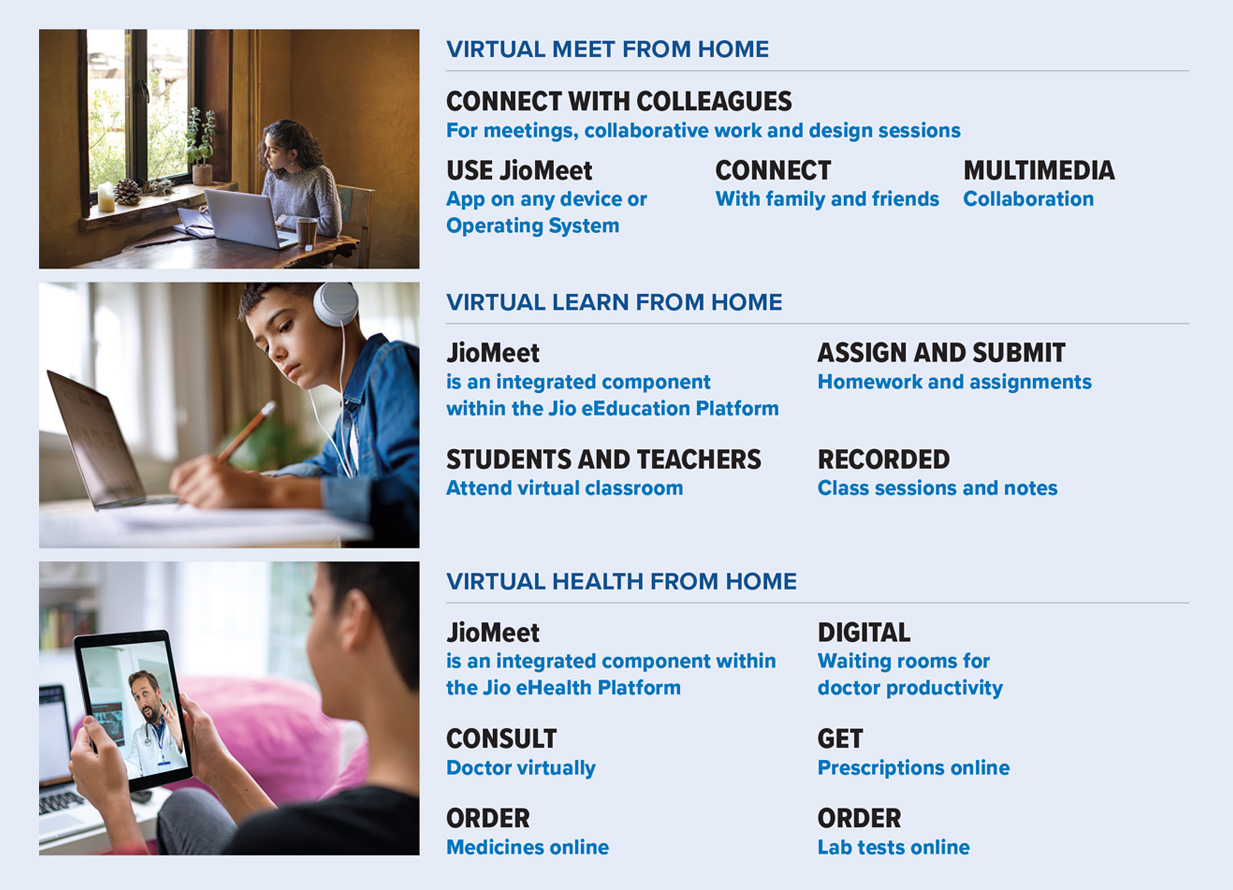
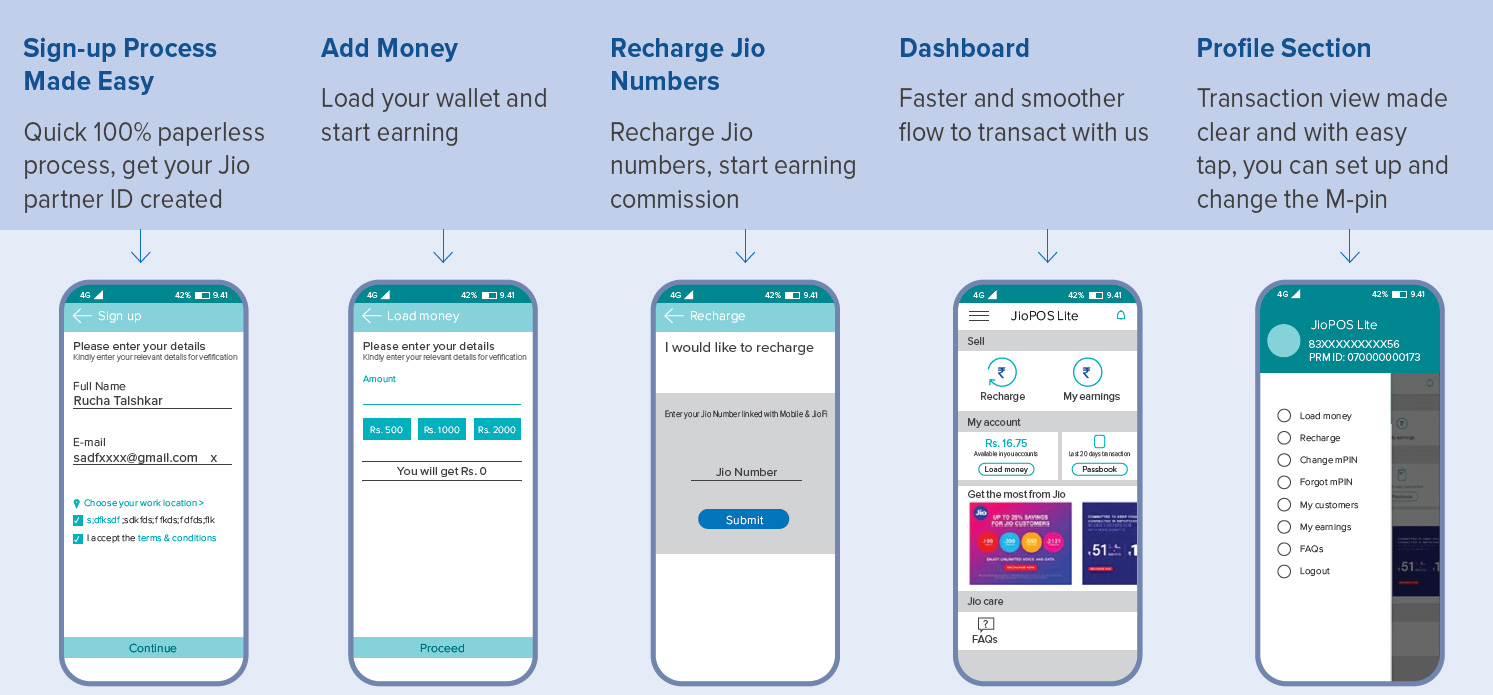
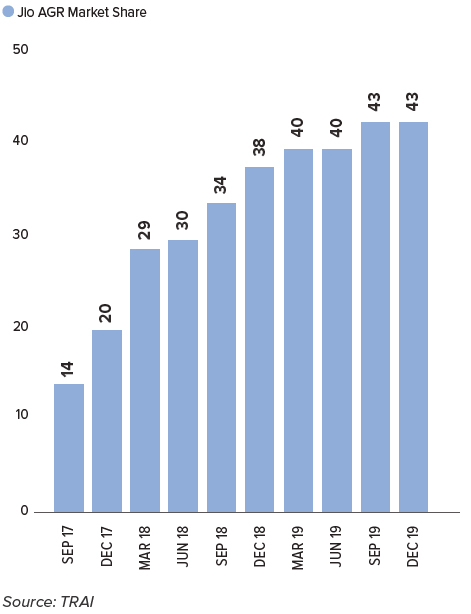
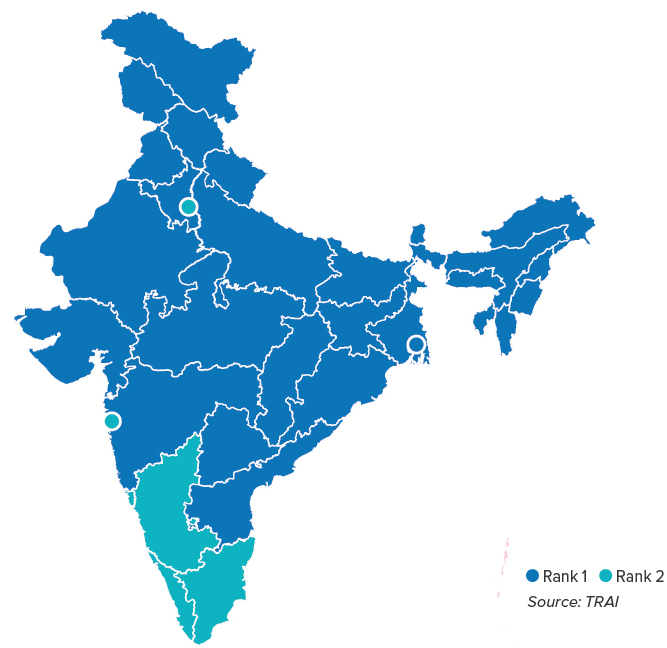
Jio has made investments in excess of US$50 billion since inception to create the largest and most advanced digital and connectivity ecosystem in India, with a rich bouquet of successful apps and platforms. New growth areas in Narrow- Band (NB) IoT, IaaS/ PaaS, mixed reality, gaming, education, healthcare, agriculture and manufacturing have been identified. This has created a portfolio of world-class, legacy-free and future-proof digital assets.
As a part of restructuring of the digital businesses that Jio undertook during the year, a single platform company named Jio Platforms Limited has been created. This has been done to bring together digital assets of Reliance spanning across connectivity and technology investments under a single wholly-owned subsidiary. This has created not just an ability to leverage the subscriber base to create the world’s best and most relevant platforms, but also create a debt-free and financially strong holding company that could pursue growth opportunities and be attractive for strategic investments and partnerships.
PARTNERSHIPS WITH GLOBAL
TECHNOLOGY LEADERS
Jio’s success in building technology,
specifically for India and its ability to
proliferate across the country has attracted
global technology leaders – Facebook and
Microsoft—to forge partnerships with it.
Facebook – In April 2020, RIL, Jio Platforms Limited and Facebook Inc. announced the signing of binding agreements for an investment of `43,574 crore by Facebook into Jio Platforms. This investment by Facebook valued Jio Platforms at `4.6 lakh crore pre-money Enterprise Value. Facebook’s investment translated into a 9.99% equity stake in Jio Platforms on a fully diluted basis.
This partnership is aimed at accelerating India’s all-round development, fulfilling the needs of Indians and Indian economy. The joint focus will be India’s 60 million micro, small and medium businesses, 120 million farmers, 30 million small merchants and millions of SMEs in the informal sector, in addition to empowering people seeking various digital services.
Concurrent with the investment, Jio Platforms, Reliance Retail Limited and WhatsApp also entered into a commercial partnership agreement to further accelerate Reliance Retail’s Digital Commerce business on the JioMart platform using WhatsApp and to support small businesses on WhatsApp. The companies will work closely to ensure that consumers are able to access the nearest kiranas who can provide products and services to their homes by transacting seamlessly with JioMart using WhatsApp.
Microsoft – In August 2019, Jio and Microsoft Corp. embarked on a unique, comprehensive, long-term strategic relationship aimed at accelerating the digital transformation of the Indian economy and society. This 10-year commitment combines the world-class capabilities of both companies to offer a detailed set of solutions comprising connectivity, computing, storage solutions, and other technology services and applications essential for Indian businesses. It will span the broad Reliance Industries ecosystem including its existing and new businesses.
The aim of the partnership is to enhance the adoption of leading technologies such as data analytics, AI, cognitive services, Blockchain, IoT, and edge computing among SMEs to make them ready to compete and grow, while helping accelerate technology-led GDP growth in India and driving adoption of next-gen technology solutions at scale.
Specifically, Jio’s connectivity infrastructure will promote the adoption of the Microsoft Azure cloud platform and technology stack to its enterprise customers. In addition, Jio will leverage the Microsoft Azure cloud platform to develop innovative cloud solutions focused on the needs of Indian businesses. Jio will also set up data centres in locations across India, consisting of next-generation compute, storage and networking capabilities, and Microsoft will deploy its Azure platform in these data centres to support Jio’s offerings. The initial two data centres, which can house IT equipment consuming up to 7.5 MW of power, are being set up in the states of Gujarat and Maharashtra. These are targeted to be fully operational in CY 2020.
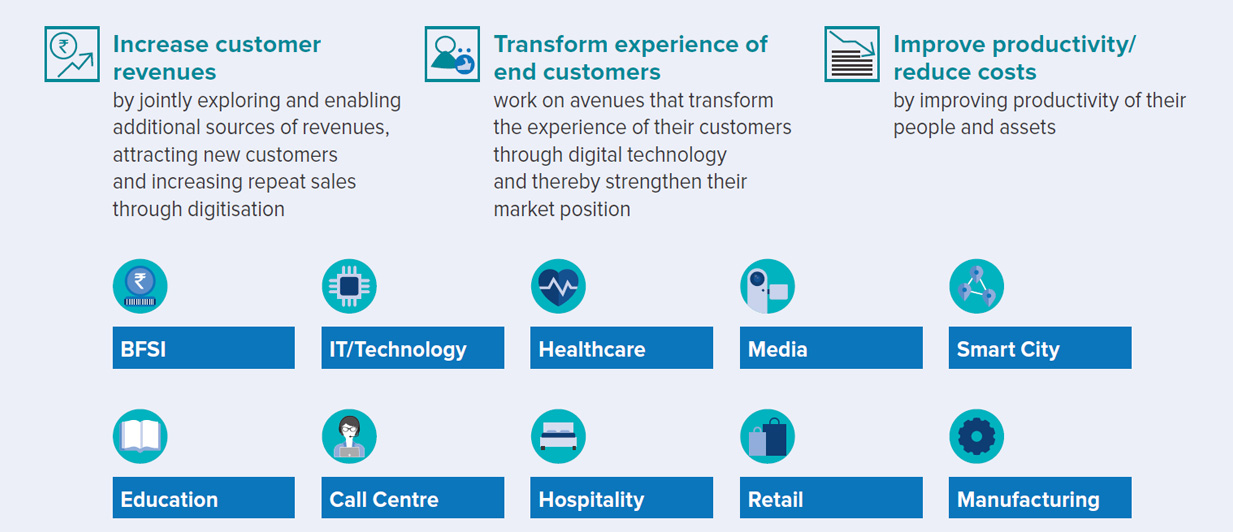
NETWORK BUILT FOR A BILLION
INDIANS, WITH WORLD-CLASS
NETWORK ARCHITECTURE
Jio’s all-IP data network is built on the
4G-LTE technology. The network built as
a mobile video network carries more than
4 Exabytes of data monthly and is future
ready to transition to 5G and beyond.
Network capacity too is being augmented
by adding incremental sites, Wi-Fi access
points, small cells and expanding fiber
backhaul. To further improve the network
experience, advanced features such as
Software Defined Networking (SDN) and
Network Function Virtualisation (NFV) have
been incorporated, along with significant inhouse
data centre capacity and investments
into Content Distribution Network (CDN).
Even with 387.5 million subscribers having per capita voice usage of 771 minutes per month and data usage of 11.3 GB per month, data speed remains the highest while network latency and call drop rates remain the lowest among all networks across the country. The entire scale-up of Jio has come alongside sustained network performance underlining its quality and capacity.
PROGRESS ON TOWER AND
FIBER INVIT
Jio’s passive infrastructure, which
includes 1,75,000 towers and 1.1 million
route kilometers for fiber in full scope,
has already been transferred through a
Scheme as of March 31, 2019, held through
two separate Infrastructure Investment
Trusts (InvIT). During the year, Reliance
has signed a binding agreement with
Brookfield Infrastructure Partners LP and its institutional partners for investment
in the units to be issued by the Tower
InvIT. Brookfield and affiliates will invest
`25,215 crore in Tower InvIT. Discussions
with potential investors for Fiber InvIT
are in progress.
FIXED MOBILE CONVERGENCE
In the next phase of the connectivity
rollout, Jio will offer state-of-the-art wireline
services across FTTH and Enterprises.
The core and aggregation layers of the
Jio network have been converged and
5G-ready from the time of inception. This
will allow Jio to offer services across the
fixed mobile connectivity layers, leading
to not just enhanced experience but also
efficient pricing.
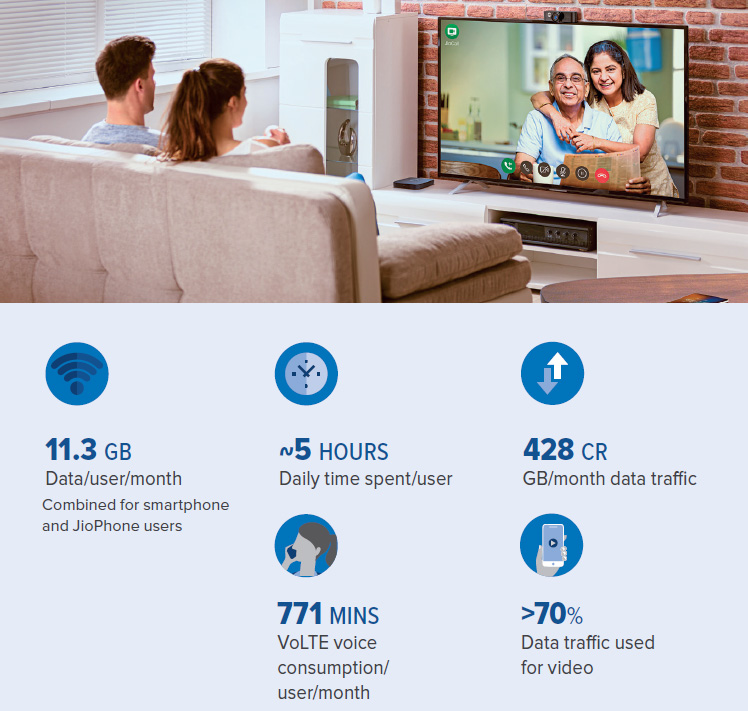
LIBERALISED SPECTRUM ACROSS
THREE BANDS
The strength of Jio network is in the fact
that the entire 1,108 MHz of pan-India
spectrum holding across the three bands
(800 MHz, 1800 MHz and 2300 MHz) is
deployed towards 4G-LTE. Each of the sites
on the network radiates all three bands. The
average life of the spectrum is 13 years with
all spectrum liberalised, which can be used
to roll out any future technology.
PIONEERING VOICE
TECHNOLOGIES AT SCALE – FROM
VOLTE TO VOWI-FI
Jio is the first network globally to roll out
VoLTE at scale. In fact, Jio is the largest
VoLTE network carrying 9 billion minutes
per day. To further improve customer
experience, Jio also launched nationwide
voice and video over Wi-Fi services. With
this, customers can use any Wi-Fi network
for Jio Wi-Fi calling. The voice and video
calls seamlessly switch over between
VoLTE and Wi-Fi to provide an enhanced
voice/video-calling experience.
UNDERSEA CABLE FOR DIGITAL
CONNECTIVITY
Jio has been actively creating a multi terabit
capacity international fiber network. Jio,
with its partners, is a part of two undersea
cable network consortiums:
DISTRIBUTION ACROSS EVERY NOOK AND CORNER OF THE COUNTRY Reliance Retail works as the Master Distributor for Jio connectivity services Jio has a pan-India distribution channel with over 1 million retailers for customer acquisition and selling recharges ensuring every Indian home is within 20 kms of a Jio Point. In addition to this, services are also sold through the MyJio application, the best-in-class full-service (prepaid and post-paid payments, loyalty coupons, troubleshooting, addition or deletion of services) self-care application. MyJio’s success is evident from a large portion of smartphone and JioFiber customers recharging and selecting their subscription plans through the application.
INNOVATION ACROSS NETWORKS
AND PLATFORMS
Right since its inception, Jio has strived
to lead innovation in India across network
technology, platforms and consumer
services. Till date, Jio has filed 134
patents for the pioneering initiatives it
has undertaken, of which 29 have been
granted. In FY 2019-20 alone, Jio filed for 31
patents and was granted 10. These patents
span across devices, network, cloud, digital
media, branding and customer experience.
Jio’s patents cover areas of cutting-edge
technology, including IoT, 5G, video bots,
Blockchain, NFV and Evolved Multimedia
Broadcast Multicast Services (eMBMS).
SUITE OF DIGITAL APPS
Jio has taken a practical approach to
technology and a platform approach to
bring networks, technology, services and
experience under a single umbrella. This has made the time to market for Jio’s
solutions the lowest across any technology
firms, allowing it to be nimbler and more
responsive to customer and market needs.
Across technologies and customer needs,
Jio endeavours to create scalable and
globally exportable platforms.
Jio network’s ability to seamlessly carry multimedia content has allowed it to enrich customer experience through a rich suite of applications and tools that encompass entertainment, news, information, commerce and self-service. Jio’s rich suite of digital applications have won multiple accolades and continue to have the bestin- class customer engagement metrics in their respective categories. These include JioTV (680+ channels of live and catch-up TV, across 15 languages and 10 genres), JioCinema (video on demand, 10,000+ movies, 1,20,000+ episodes, 60,000+ music videos), JioMoney, JioNews (190+ live channels, 800+ magazines, 10+ languages, JioSaavn (India #1 OTT music app with 55+ million tracks across 16 languages, unique Artist Originals Programme), JioChat, JioHealthHub, among others. MyJio app with digital self-service and e-care capability is a cornerstone of Jio’s digital proposition for its customers. Jio has done deep integration of JioSaavn, JioCinema and JioCloud, among others, into MyJio to provide a single-window access to all apps. Digital services to the customer would expand from the current media and entertainment to also include education, commerce, healthcare, agriculture and e-governance.
INVESTMENTS IN NEXTGENERATION
TECHNOLOGY
CAPABILITIES
With technology capability in its core DNA,
Jio has invested in technologies ranging
across Big Data, Blockchain, Mixed Reality,
edge compute, IoT, computer vision, secure
identity, AI/ML, super compute, robotics
and IaaS/PaaS. Some of these are already
integrated and find use cases in the
existing offerings, while others would drive
launch of Jio’s next set of digital offerings
to the consumers.
India has a rich and fast-growing ecosystem of entrepreneurs who are using technology to solve customer problems across the strata of population. Reliance is playing an important role in developing this ecosystem through investments and collaboration. Over the course of time, Reliance has invested in companies such as Embibe (AI-based education platform), Karexpert (digital healthcare platform), Tesseract (AR/ VR capabilities), Reverie (AI for speech and language recognition), SankhyaSutra (computing, analytics and simulation tools), Netradyne (AI-based fleet management), Easygov (G2C solutions), Haptik (AI/ML for speech and language recognition), Saavn (online music platform), NewJ (content curator), Radisys (digital initiative for communications and networks) and Asteria (drone technology).
These investments, along with Reliance’s inhouse developed technology capabilities, will be a part of Jio Platforms Limited and have been carefully selected to fit into the Reliance digital ecosystem to enhance and keep its offering across mobility, homes and enterprises future ready.
Digital services reported another year of strong revenue and EBITDA growth driven by continued momentum in wireless subscriber addition. Customer engagement on Jio network also remained healthy across data and voice services, with video accounting for 70% of data usage. Net subscriber addition of 81 million in FY 2019-20 was well ahead of the industry peers. Revenue of `68,462 crore for FY 2019-20 on a year-ending subscriber base of 387.5 million and EBIT margin of 21% underlines the best-in-class execution capability of the digital services team.

Jio continues to transform the Indian telecom industry with key performance indicators as follows:
Jio envisages a significant opportunity in building a digital society for the citizens of the country, which besides catalysing the productivity and overall economic growth would also generate adequate shareholder returns over the next several decades. Key pillars of building this digital society would be; i) best-in-class wireless and wireline data network for all at the most affordable prices, ii) digital platforms for Media & Entertainment (M&E), commerce, education, financial services, health, government services, agriculture and more, iii) next-generation technologies such as Blockchain, AI, IoT and Mixed Reality.
Over the next few years, Jio would focus on creating a robust wireline network across the country, offering high-speed connectivity and a bouquet of digital services to every home and enterprise. Jio is geared up to touch the lives of over a billion Indians through its wireless as well as wireline offerings.
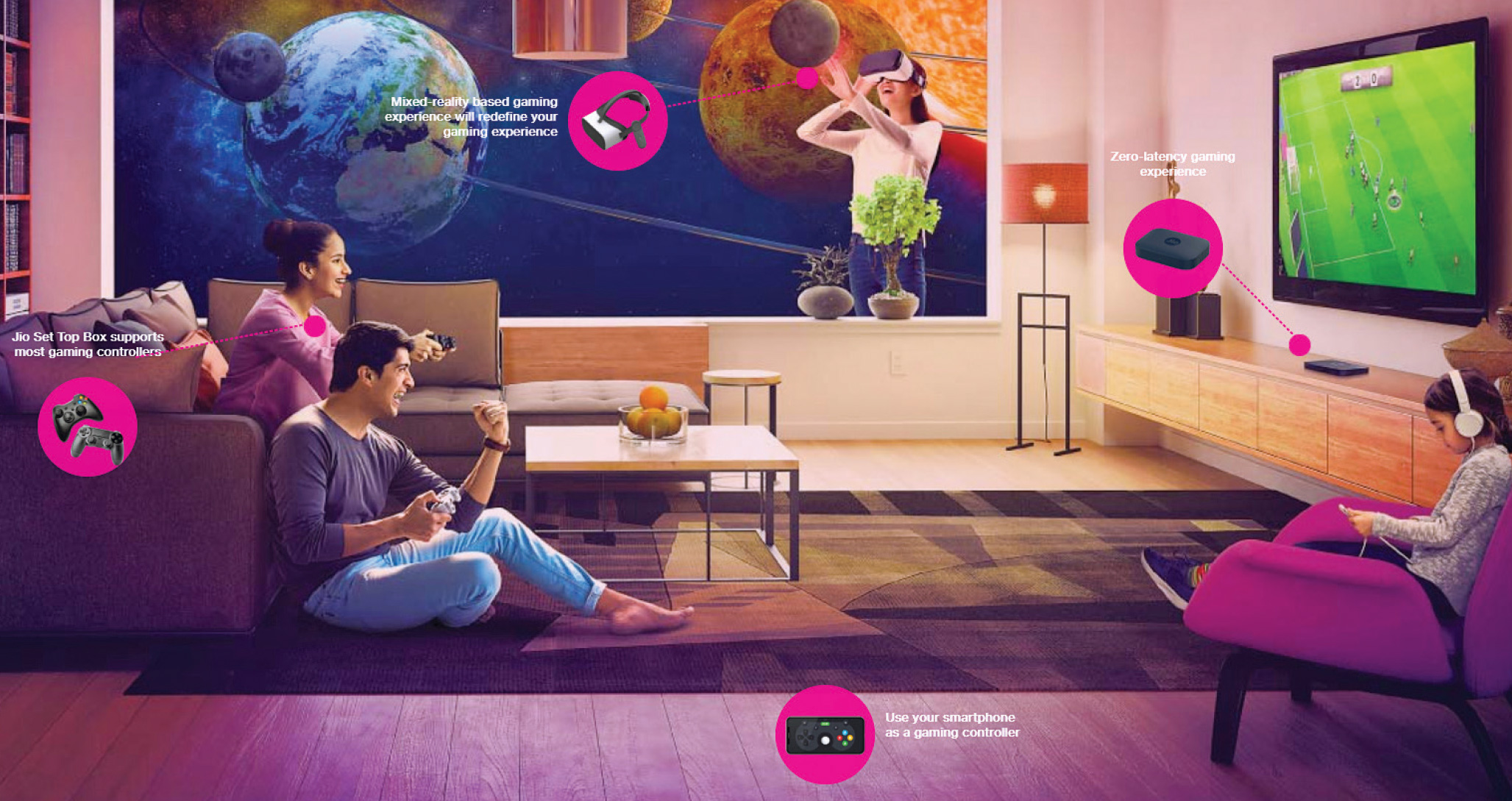
Endless possibilities with JioFiber connectivity
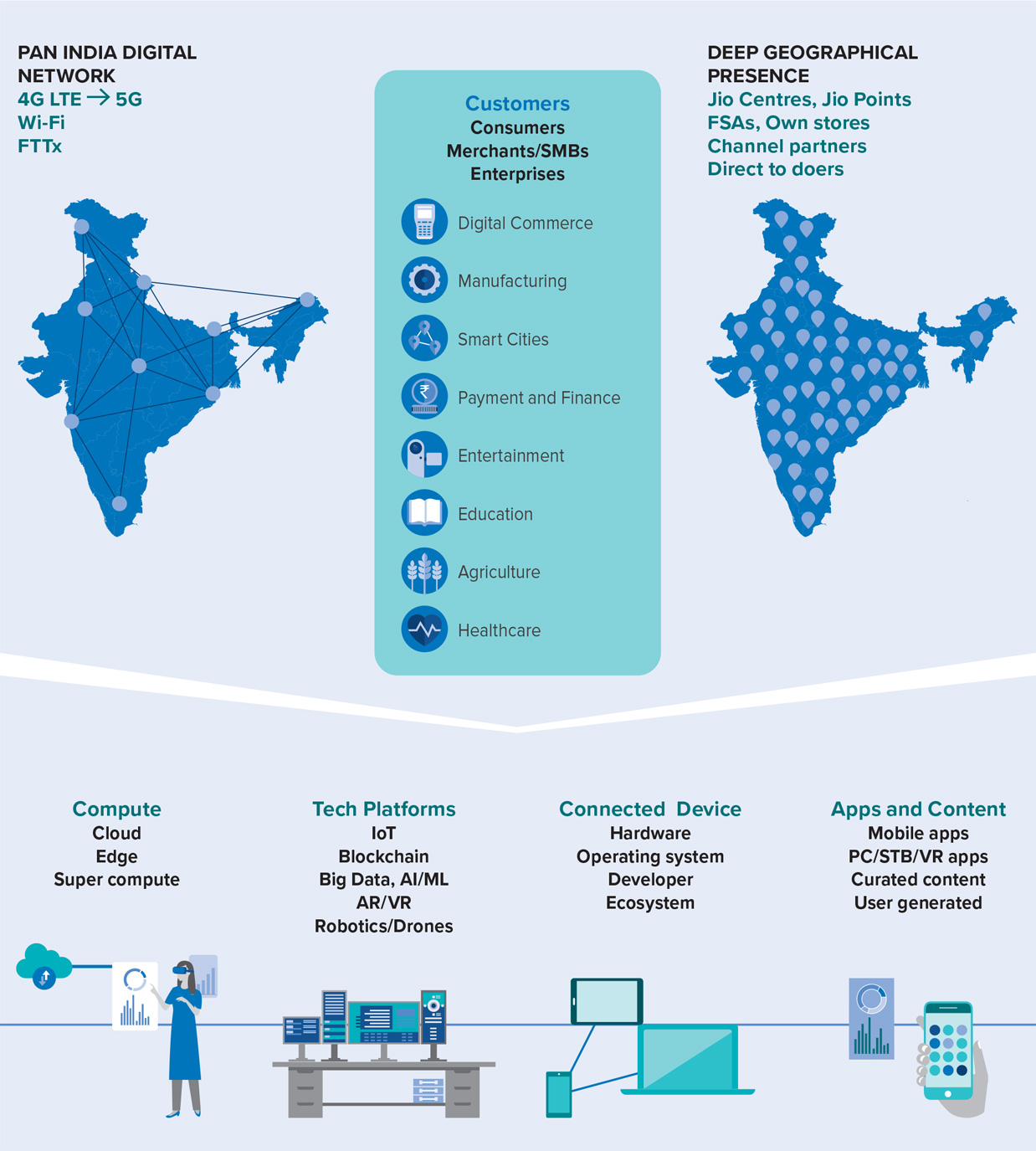
JioPhone is one of a kind product that combines the affordability and ease of use of a feature phone with the functionalities of a smartphone for first-time mobile Internet users.
Over 100 million Internet-deprived feature phone users are brought onto the mobile broadband platform.
An affordable 4G-enabled handset for the large feature phone user base in India, to make the transition towards using Internet and digital media over mobility network. Critical in bridging the digital divide in the country.
Reliance Jio has been at the forefront in supporting its users during the COVID-19 pandemic.
a) Additional calling and
data benefits
Jio offered double data benefits across its data voucher recharges, bundled voice minutes in the data vouchers, additional 100 voice minutes and 100 SMS to JioPhone users, access to incoming services despite expiry of validity of existing packs.
Assured connectivity in times of a national crisis.
Enabling continuity of services for every Jio subscriber.
b) Digital recharge awareness campaign/ recharge partner initiative
Jio educated users on benefits and ease of doing digital recharge. It was among the first telecom operators to introduce ATM recharge facility across all leading banks’ ATMs. Jio launched the app, JioPOS Lite, a virtual recharge store that allows peer-topeer recharges on a commission basis.
Promotion of digital recharges through multiple channels.
Introducing innovative methods of recharge to substitute traditional physical channels.
a) Healthcare at home
Real-time medical consultation, and communication of patient updates in real-time through connections to electronic health records, business and office apps.
Enabling Indian citizens to stay safe, allowing for remote care and prevention of unnecessary pressure on the medical system.
b) Work from home and learn from home
Combining digital capabilities with Microsoft Teams, the unified communication and collaboration hub for teamwork, providing a communications hub for all lessons in a school year, with free storage available for individuals and teams, and launch of Jio’s own platform, JioMeet.
Remote audio and video meetings, meeting recording, collaborative conversations, screen sharing and file sharing, unlimited messaging, scheduling, chat and search app capabilities; enabling students and teachers to go beyond video calling to scheduling classroom sessions, document and screen sharing and informal chat channels for real-time doubt clarification.
Ensured a one-stop solution for all communication needs and enabled remote working, remote learning and remote engagement.
Network18 aims to be a channel-agnostic provider of top-drawer content, across genres, regions and languages. We aim to be India’s top media house with unparalleled reach, and touch the lives of Indians across geographies and genres.
Diverse content, impactful brands
Network18 boasts of 56 channels in India spanning news and entertainment and an additional 16 international channels

Touching hearts everywhere, everytime, across devices

Marquee properties that enlighten millions

Class-leading specialised print magazines

Pioneering, ubiquitous platform

Fresh subjects and an enviable success rate
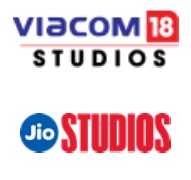
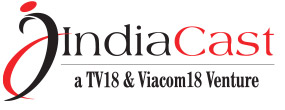




Network18 Media and Investments is one of India’s most diversified Media & Entertainment conglomerates. Its uniqueness lies in the cross-section of its media properties and an innate ability to create and nurture brands that resonate with viewers across geographies and demographics. As it grows in size, stature and significance, its news and entertainment arms are constantly at the cutting edge of innovation. Network18’s forays into subscription models through its flagship digital properties are aimed at embracing change and accelerating growth as it continues to invest towards becoming an industry leader.
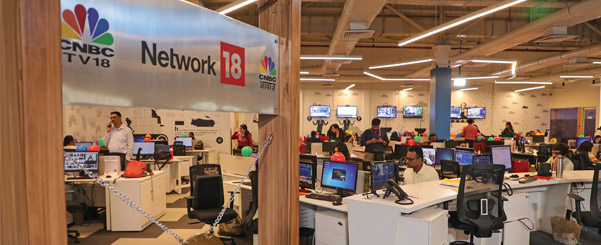
Network18 commissioned India’s largest integrated digital newsroom at Mumbai

Reach

Viewership

Diversity

Channel-agnostic approach
Network18 strives to be channel-agnostic to ensure its content reaches seamlessly to consumers through their platform of choice.

Reach for impact
Network18 is future-ready with its relentless focus on the identified axes of growth: regional content and digital delivery. This twopronged approach enables the Company to reach its audiences regardless of geography, language or demography

Thought leadership
Network18 is steered by a professional and experienced team that helps it to consistently strive to host thought leadership on-air, online and on-ground.

Network synergy
Network18’s spread of properties facilitates cross-promotion and cross-pollination of content and expertise across its network, enabling enhanced advertising and subscription revenue generation.

Strategic collaborations
Network18 has a track record of building successful strategic alliances with international media companies such as Viacom in entertainment, CNN in English general news and CNBC in business news, A+E Networks in factual entertainment and Forbes in the business magazine genre.

Brand excellence
At Network18, the focus is on driving the highest standards of creative excellence by fostering a culture of innovation to build new content formats across platforms, thereby creating strong brands across diverse media.
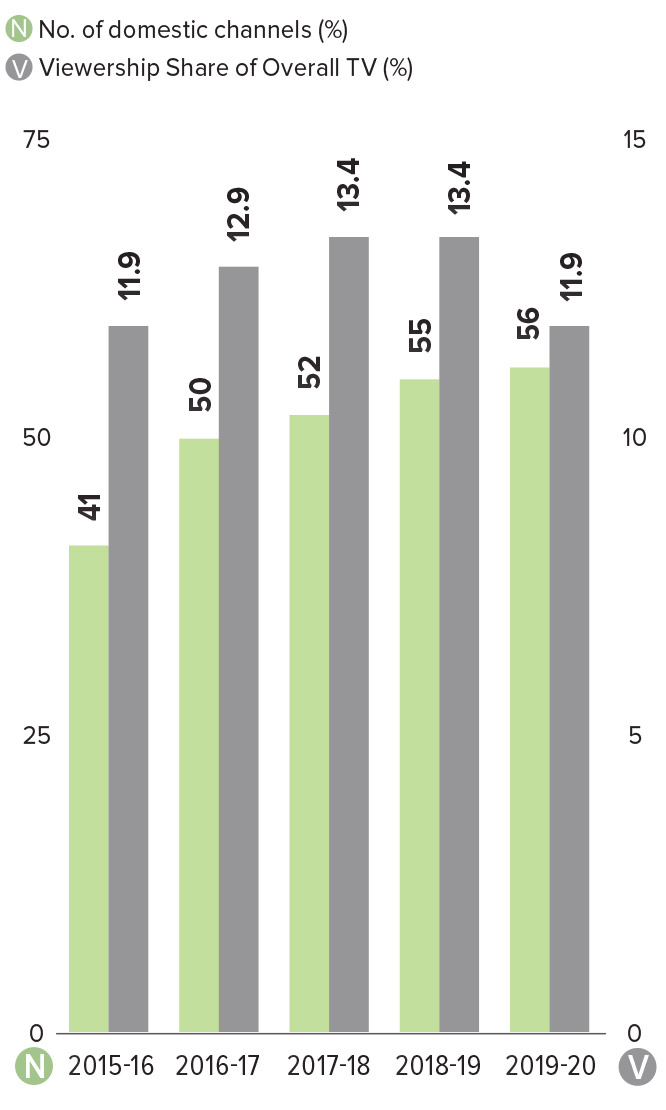
Network18 is spread across content creation and distribution, thereby delivering the best of Indian and global content and brands to discerning audiences across India’s vast demographic diversity. Network18 and its affiliates across the media, telecom and cable/ broadband value chain are stitching together a compelling value proposition for its viewers in a pipe-agnostic manner. Synergies in content creation and efficiency in distribution serve to amplify the reach of Network18’s brands, delivering impactful ideas and immersive imagery in class-leading packaging.
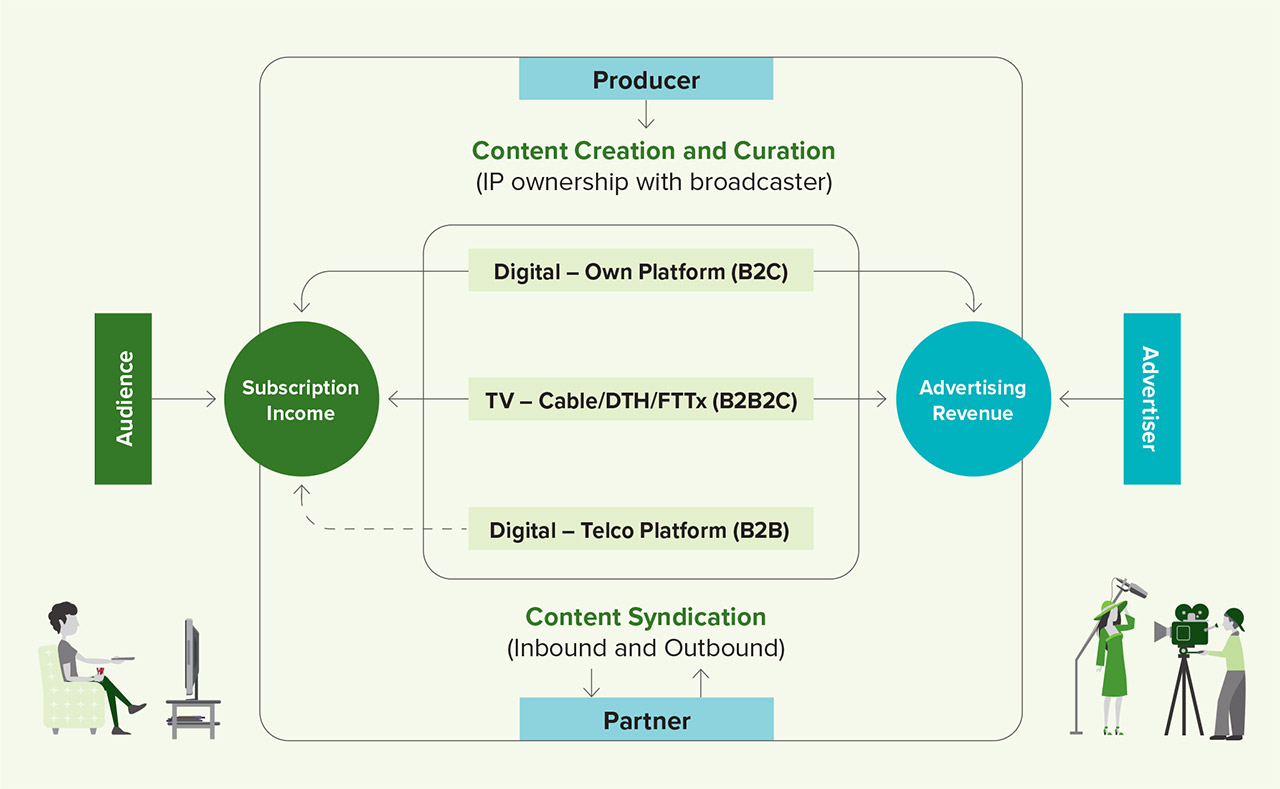
The Indian media and entertainment sector grew at a modest 9% in CY 2019, compared to the normal double-digit growth witnessed in the recent past as per EY-FICCI media & entertainment 2020 report. This was led by a weaker macroeconomic scenario (CY 2019 GDP growth decelerated to 5.8%) dragging advertising revenue, even as a pivot towards B2C/B2B2C models of outreach and monetisation boosted subscription revenue, offering some respite. The industry has scaled up to `1.82 trillion, with TV being the largest contributor (43.2%) followed by Print. TV grew just 6% led by the TRAI New Tariff Order (NTO) impact, and Print continues to see a slow but largely secular decline, while Digital (+31% y-o-y growth) has driven growth for the overall sector. Digital has rapidly gained scale (>12% of the media and entertainment pie in CY 2019, slated to outpace Print by CY 2022); and remained resilient led by the promise of targeted advertising and exponential subscription growth.
Growth projections for the sector are at risk considering the impact of COVID-19 pandemic on the macro-environment, which directly and indirectly affects advertising. With economic activity faltering amidst a country-wide lockdown, advertising may remain suppressed for much of H1 FY 2020-21. Policy interventions for protecting the affected, fiscal stimulus for kick-starting economic activity and monetary easing to infuse liquidity are expected to drive H2 towards normalcy. However, the severity of the pandemic and pace of its containment remain a key monitorable. Nevertheless, with robust media consumption underpinned by demographic trends and improving content availability as well as access-economics, this key sector of the Indian economy is expected to bounce back along with the macro-environment in due course.
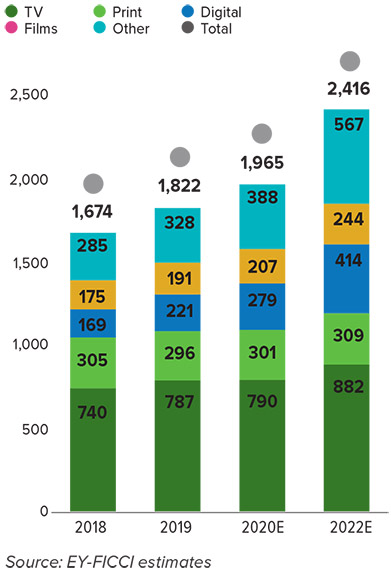
The unbundling of existing bouquets resulted in creation of customised language bouquets as well as segmentation of the market by price. The order enabled choice for the consumer, which resulted in an obvious drop in reach of certain channels versus the previous regime. Channels that were not opted for by consumers faced erosion in not just subscription but also ad-revenue. A B2C regime resulted in a reset in pricing, and strong channel bouquets gained as a result. The EY FICCI report estimates that end-customer prices grew by over 25% on average to cross `225 net of taxes. Broadcaster yields, (i.e share of consumer spend that flows to the broadcaster) improved in general, led by non-discriminatory pricing and a clampdown on carriage fees.
All the major broadcasters shifted their FTA channels out of DD Freedish post the implementation of NTO to avoid concerns around arbitrage of value, and converted them to Pay. This has impacted viewership (and consequently ad-monetisation) for those channels very sharply, as DD Freedish used to contribute 60-90% viewership. All top 4 broadcasters have faced a drop of 2-5% viewership share and consequent revenues, while the smaller broadcasters that have purely FTA channels gained as a result.
The first half of the fiscal had multiple major sporting events (IPL, Cricket and Football World Cups), which saw viewership and ad-spends gravitating towards the highly concentrated sports genre, and away from the broad-based general entertainment genre. The national elections in May 2019 also boosted ad-spends on news channels during that period, and government/ political ad-spends contracted sharply post the same. A relatively benign festive season was the result of absence of some major advertisers in sectors such as Auto, Handsets, Telcos, among others from the roster. As economic activity further slowed towards the second half and the COVID-19 pandemic surfaced in Q4, a consequent sharp fall in advertising continued to impact broadcasters’ ad-revenues.
Weak macro-economic trends dragged down consumer spends and depressed broader corporate appetite for above-theline marketing activity (TV ad volumes fell 4% y-o-y in 2019, and a number of advertisers fell similarly). In a tepid adenvironment, advertisers pivoted spends towards targeted genres and platforms to improve Return on Investment (ROI). Further, a rapid growth in sports, vernacular and digital content consumption and measurement drove up their shares in the consumption pie. As a result, while national GEC ad - revenue faced headwinds, sports channels, regional TV channels and Digital gained handsomely.
Overall viewership on TV remained stable in 2019, indicating that TV still has a long road ahead of itself in the country. Though H2-2019 witnessed a 5% drop, Indians still spend 3 hrs 42 mins watching TV everyday on an average. However, Digital is growing at a fast clip alongside, with different consumer cohorts emerging based on price-point as well as use-case. Time spent on entertainment apps increased 58% in 2019 and sessions on entertainment apps increased 10%, as per App Annie data.
Advertisers have gained comfort with the Digital medium and raised their share of spends on Digital across the board. Share of non-English language content consumption has risen to 93% (37% in non-Hindi), which has resulted in 65%+ ads being in regional languages. Share of programmatic advertising and native advertising continues to jump.
D2C Subscription models proliferated through sachet pricing, though monetisation was still small.
By comparison, 260 million consumers accessed video content through Telco bundles, EY-FICCI estimates.
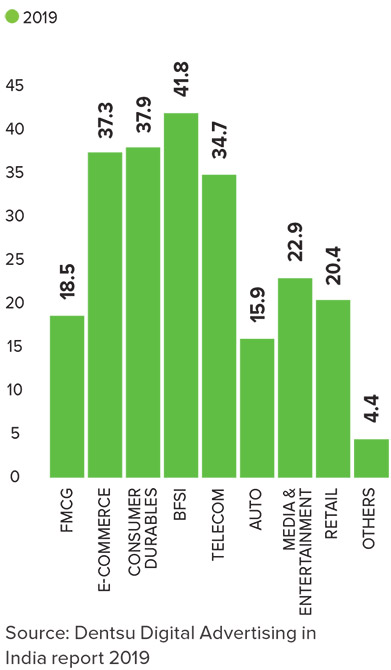
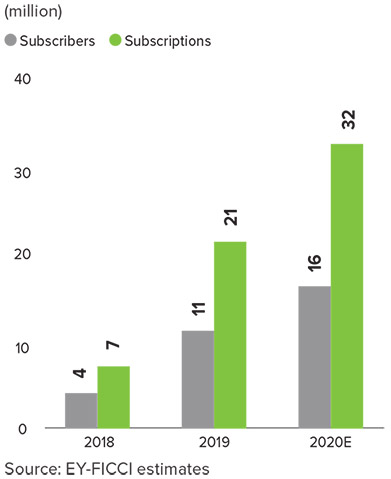
Amidst rising competition from local as well as global players, some platforms (Viu, Hooq) made an exit. Others began partnering and integration with peer platforms, syndicating content to other digital players, and deep integration with Telcos.
Network18 improved its financial performance even amidst substantial weakness in the advertising environment, as business mix pivoted towards subscription and syndication. Broad-based cost controls across verticals further helped improve the business profitability, amidst an uncertain macro-environment.
Advertising remained under pressure during the fiscal, led by weakening economic growth, NTO related flux in Q1 and COVID-19 pandemic during late - Q4. Revival in rankings of flagship entertainment channel, national elections and continued growth in digital platforms were offsetting factors.
Linear TV subscription revenue benefitted from NTO implementation, growing 43% in FY 2019-20. Distribution improvements through tie-ups with cable and telecom platforms have boosted the reach and enlarged the value-proposition of our channel brands. The contribution of subscription in revenue mix has increased to 35% in FY 2019-20, from 26% in FY 2018-19. Digital partnerships (B2B) are a new revenue stream which has boosted profitability, as the strategy of being platform-agnostic is playing out across broadcasting as well as webseries production.
While ad-revenues for all media have been impacted by the COVID-19 pandemic, News has been impacted to a lesser degree, as its share in TV viewership has jumped from 7% to > 15%.
Digital properties continue to benefit from consumption tailwinds that have been further boosted during the lockdown. Entertainment has been impacted the maximum as broadcasters have replaced original programming with re-runs due to the shuttering of content production at present
Consolidation to catapult Network18 to India’s largest listed media and distribution company with revenue of > `8,000 crore: On February 17, 2020, the boards of Network18, subsidiary TV18 and cable companies Hathway and Den Networks approved a Scheme of Arrangement for consolidation into Network18. This merger is subject to all necessary approvals and the appointed date for the merger shall be February 1, 2020. Aggregation of a content powerhouse across news and entertainment (both linear and digital) and the country’s largest cable distribution network under the same umbrella shall boost efficiency and exploit synergies, creating value for all stakeholders. The merged Network18 will be net-debt free and enjoy a ~50% share of subscription in revenue mix, making it much more resilient. For more details, see the press release
https://www.bseindia.com/xml-data/ corpfiling/AttachHis/73fb4bef-1876-42bf- 8e78-635ac63ecc5d.pdf and info pack https://www.bseindia.com/xml-data/ corpfiling/AttachHis/35e1aae9-2cfb-4d4f- 8e8d-6964f480ecae.pdf
News18 Gujarati - Corona update
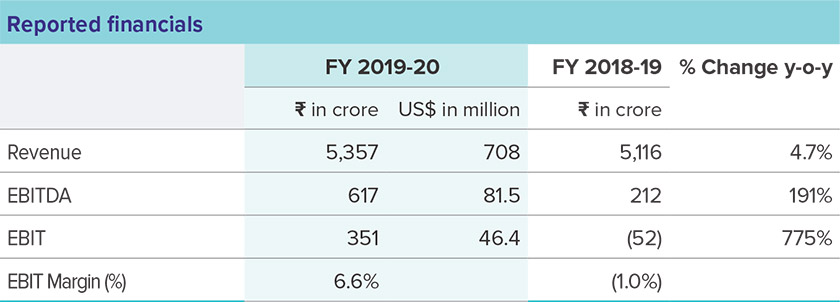
TELEVISION BUSINESS
| NEWS | ENTERTAINMENT |
|---|---|

|
|
|
Business News constitutes CNBC TV18 and CNBC Awaaz, No. 1 in English and Hindi business news genres, respectively, and CNBC Bajar, India’s first Gujarati business news channel. Highlights of the year:Amidst choppy markets, the business news channels continued their dominant leadership in their respective genres. General News includes CNN-News18 and News18 India. Highlights of the year: News18 India was the #2 Hindi News channel in the pay category. News18 Network led by CNN News18 and News18 India provided stellar coverage of the national elections as well as the COVID-19 pandemic amidst challenging circumstances. Regional News includes 13 News18 channels (including the erstwhile ETV channels) and News18 Lokmat. Highlights of the year: The cluster has the highest reach (452 million viewers) and viewership in the country (6.1% share of all News viewership) amongst regional news peers. |
Hindi General Entertainment includes flagship general entertainment channel (GEC) Colors, re-run GEC Colors Rishtey, and Hindi movie channel Colors Cineplex. Highlights of the year: Flagship GEC Colors resurrected its ranking to #2 in Q4, with a 19.6% share amongst pay - GECs; driving revenue growth amidst a tepid ad-environment. Colors Rishtey has climbed to #2 amongst repeat-programming pay - GECs. Colors Cineplex is under ramp-up and viewership share has risen to 5.2% within a year of re-launch as a pay channel. Youth and Music ncludes MTV India, the No. 1 youth brand, and 24x7 Bollywood music channel MTV Beats. Highlights of the year: MTV Beats has raised its viewership share to 13.5% in a crowded category. English Entertainment has VH1, Comedy Central (India’s first 24-hour English comedy channel) and Colors Infinity. Highlights of the year: While Comedy Central is the top-ranked English Entertainment Channel, the English cluster comprising Comedy Central, Colors Infinity and VH1 controls nearly 67% share of the English Entertainment space. Kids Entertainment constitutes of Nickelodeon, Sonic, Nick Jr. /Teen Nick and Nick HD+. Highlights of the year: Nickelodeon has been the No. 1 channel in the Kids category since August 2014 and continues to lead the segment. Regional Entertainment The regional entertainment bouquet comprises Colors Kannada and Colors Super (Kannada), Colors Bangla, Colors Oriya, Colors Gujarati, Colors Tamil and recently launched movie channels Colors Kannada Cinema and Gujarati Cinema. Highlights of the year: Colors Marathi maintained its strong #2 rank in the genre, with viewership share rising to 25.4%. Infotainment has factual entertainment channel History TV18 and lifestyle channel FYI TV18. |
FILM BUSINESS

Film business includes Viacom18 Studios and Jio Studios.
Highlights of the year: Andhadhun broke ground in an untapped market like China, and went on to become the third highest grossing Indian film ever. Web - content production unit Tipping Point delivered three major web - series — Jamtara, Taj Mahal – 1989 and She for Netflix.
DIGITAL BUSINESS

Digital Content includes Moneycontrol.com (leader in the finance category), VOOT (#2 broadcaster–OTT in the country) and News18.com (digital destination for all general news), as well as opinion - portal and digital content studio FIrstPost.
Highlights of the year: Content of OTT video-on-demand platform VOOT is now consumed by 100 million MAUs (Monthly Active Users). Original series ‘Asur’ on VOOT Select was rated 8.5 on IMDB
Digital Commerce includes Bookmyshow
Highlights of the year: BookMyShow scaled up its live entertainment business, managing and executing the iconic Sunburn Live music festivals, worldfamous Irish rock - band U2’s first tour of India, and international touring exhibition titled “Avengers S.T.A.T.I.O.N.” in association and under license with Marvel Entertainment.
PRINT/PUBLICATION BUSINESS

Publication business has a portfolio of highly reputed magazines comprising Forbes India, Overdrive, Better Photography and Better Interiors.
GROWTH AND INNOVATION
Network18 has been striving to improve its portfolio as well as enhance its outreach to segment the market and fill critical whitespaces. Substantial investments continue to be made to create a compelling proposition for viewers. In a tepid ad-environment, the group pushed forth in improving its annuity-style income from subscription revenue and syndication of content.
BROADCASTING
DIGITAL
Pay - propositions were created in flagship properties in News and Entertainment to allow premium customers to benefit from high-end content on an ad-free basis.
RISKS
TRAI’s new tariff order modification (NTO 2.0) aims to reduce the pricing disparity of channels within a bouquet, which in effect shall reduce either channels within the bouquet or the price of the bouquet. This has the potential to impact bouquet reach and channel subscription revenue.
Fragmentation of viewership: With the advent of Digital and a launch of multiple new platforms led by cheaper bandwidth, viewership has expanded significantly, thereby fragmenting the consumer base across platforms. These higher churn rates and lower stickiness provide an opportunity to wean away viewers from traditional dominant players in television, but also is a challenge as monetisation models are still evolving.
Digital monetisation is lagging investments, especially amidst strong competition
Content costs: Spike in demand for content creation/curation is driving up content costs across Digital, Movies and GEC.
OUTLOOK
The COVID-19 pandemic is a major black - swan event, which has dragged the economy and the advertising environment as a result. The immediate impact on ad-driven media industry will be significant; however, an increasing proportion of subscription revenues will help. With economic activity faltering amidst a country-wide lockdown, advertising may remain suppressed for much of H1 FY 2020-21. The cost-optimisation exercise undertaken across verticals during FY 2019-20 will help us in these tough times, and will be furthered aggressively as our preparedness for the uncertain economic scenario. We remain confident that our portfolio of genre-defining brands shall weather this storm and emerge even stronger. The growth in media consumption witnessed augurs well for the future, as some of the increased engagement will stay - on even when the pandemic tapers off. We have stayed the course on our digital impetus and sharp focus on profitability.
BUSINESS STEWARDSHIP
At Network18, Corporate Social Responsibility (CSR) is embedded in the Company’s long-term business strategy. The Company’s community initiatives help elevate the quality of life of millions, especially the disadvantaged sections of the society. Network18 seeks to transform people’s lives by promoting health, education and sports.
The Company undertook some socially relevant programmes during the year:
Reliance Foundation acts as the funnel through which the Network18 Group reaches out to empower people and deepen its social engagements.
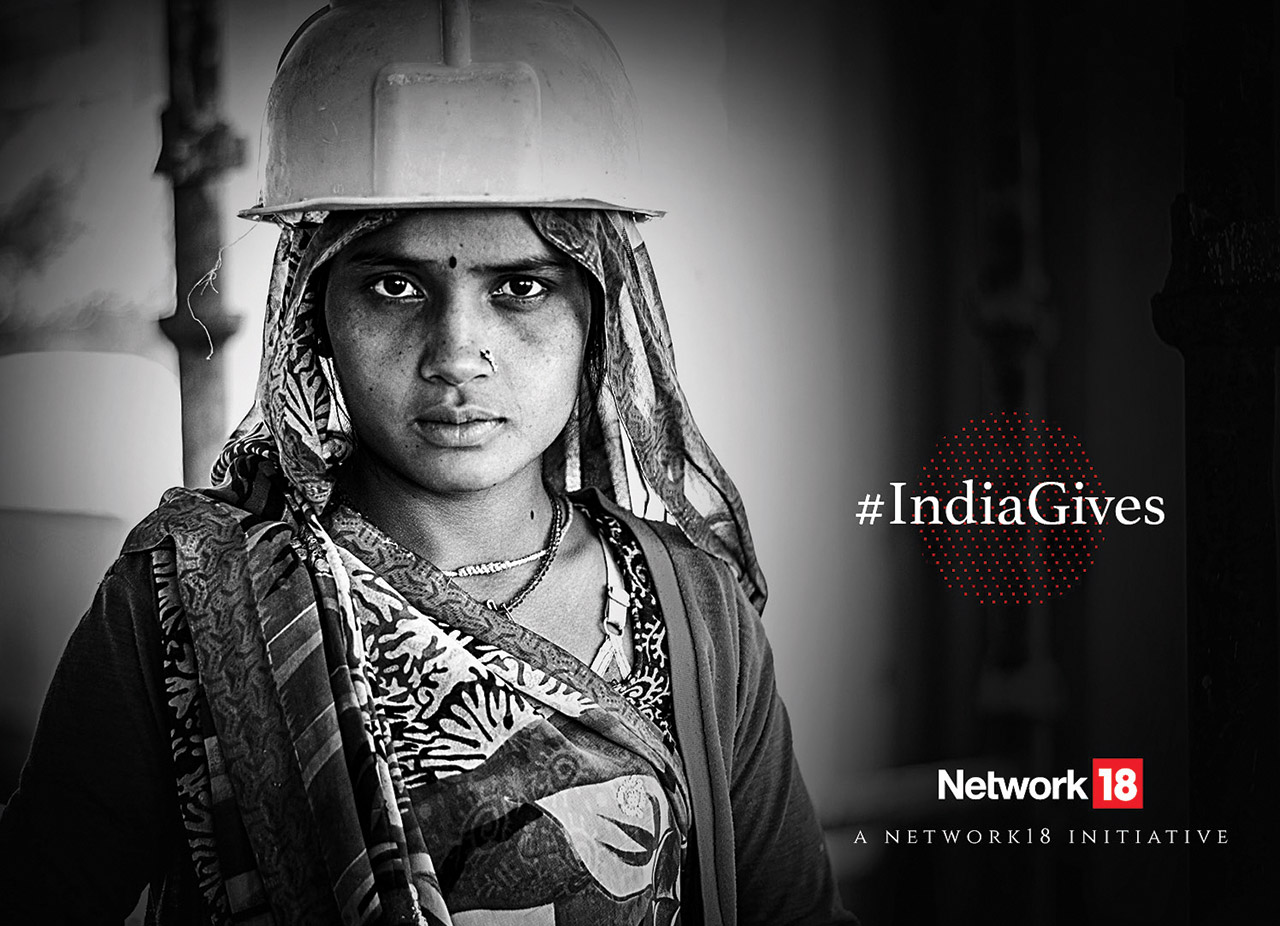
Network18 is creating awareness and mobilising donors to raise money for the poor affected by COVID-19
JIO STUDIOS
Jio Studios was set up in 2018 to complete Jio’s triple-play offering, which includes mobility solutions for voice and data, high-speed home Internet and fixed-line connectivity through fiber-tothe- home (FTTH), and a whole host of digital services and content. Jio Studios invests actively to produce and acquire original content, including films and web series across languages, forge long-term content alliances and aggregate content to power Jio’s distribution platform and expand its reach.
The already profitable film studio business has tasted early success through box office hits such as Stree, Luka Chuppi, Bala and has an interesting slate of films across budgets, languages and formats as well as compelling original web content, all with the promise of “great storytelling” at its heart.
RIL has already created a large portfolio of media and digital properties, integrated closely with new-age technology. Jio Studios is responsible for building and exploring synergies between these businesses and aligning them with Jio’s digital distribution ecosystem with a view to ultimately make Jio’s ‘mobility’ and ‘home’ products and services more attractive to the end consumer.
Jio Studios will now look to leverage the newly announced Facebook partnership to drive synergies using chat and social media to maximise discovery, engagement and commerce of its content apps and drive further growth in consumption. Developing content using Augmented Reality (AR) and mixed reality technology is next on cards. In a post COVID world, Jio Studios will explore disruptive new business models to offer latest content directly to consumers.
Jio Studios will continue to be the catalyst that offers consumer salience and differentiation by complementing the Group’s technological and distribution prowess.

A glimpse into select Jio Studios’ released films
Jamnagar Refinery shall be the refinery icon of the world with best-in-class performance
Ensure the Jamnagar refinery is future-ready with a strategic transformation to optimal oil-to-chemicals
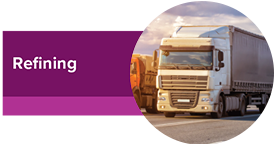
Propylene
Feedstock for polypropylene
LPG
Domestic, commercial and industrial fuel
High Speed Diesel/ Gasoline
Transport fuel
Naphtha
Feedstock for petrochemicals such as ethylene, propylene and fertilisers and as fuel in power plants
Sulphur
Feedstock for fertilisers and pharmaceuticals
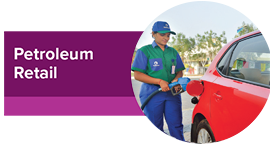

Reliance Gas
Liquefied Petroleum Gas (LPG)
Domestic, commercial and industrial fuel
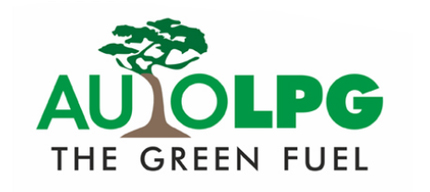
Auto LPG
Auto LPG
Auto fuel outlet
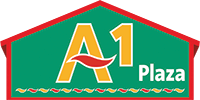
A1 Plaza
Highway Hospitality Services
Highway food plaza

Refresh
Foods
Passenger amenities / food courts on highways
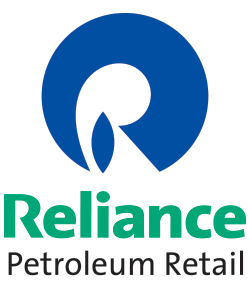
Reliance Petroleum Retail
Transportation Fuels
Retail distribution of fuels

Trans Connect
Fleet Management Services
Fleet management solutions

Qwik Mart
Convenience Shopping
Shopping of beverages, snacks gifts on highways
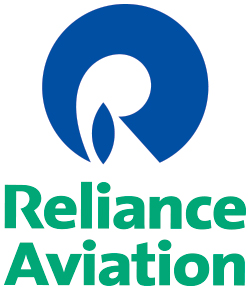
Reliance Aviation
Jet/Aviation Turbine Fuel
Aviation fuel

Relstar
Lubricants
Engine oil and lubricants








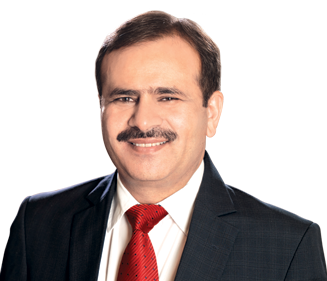


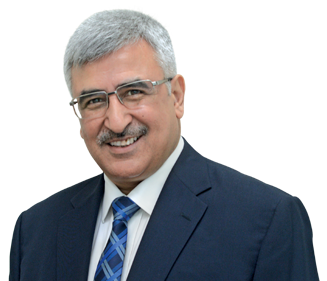
We are witnessing a black swan event. The year was characterised by soft regional refining margins and significant price volatility amidst looming trade wars and tightening oil sanctions on a few crude oil producers. The much-awaited rally in refining margins due to the change to bunker fuel specifications from 1st Jan 2020 did not materialise due to lower than expected boost from marine gasoil demand as Very Low Sulphur Fuel Oil (VLSFO) remained the bunker fuel of choice in the new International Maritime Organisation (IMO) low sulphur regime. The weakness has been accentuated by COVID-19 and associated lockdowns resulting in a downward spiral of global oil demand towards the end of FY 2019- 20. In these difficult times, RIL delivered profitable operations at near normal utilisation levels mainly due to its highly complex and flexible refining assets; nimble crude oil sourcing; agile product evacuation; diverse geographical footprint and proactive oil price risk management. RIL’s efforts to sustain competitive advantage has seen the augmentation of Coking capacity to convert low value residue into high value distillates and full scale commissioning of coke gasification project to reduce energy costs RIL continued to outperform Singapore complex margins with a premium of US$ 5.7/bbl, significantly above its 5-year average. It reflects the robust operational performance, superior configuration and consistent high utilisation of refineries at Jamnagar.
Refining EBITDA for the year was down 6.1% y-o-y at ₹24,461 crore led by lower GRM of US$8.9/bbl. The segment performance was impacted by volatile crude prices and multi-year low light distillate product cracks. Petrochemicals integration has been further enhanced with successful commissioning of High Purity Iso‑Butylene/ Isobutylene Isoprene Rubber (HPIB / IIR) complex. Petcoke Gasification complex operation has been stabilised successfully and is being ramped‑up, paving the way for significant reduction in supplemental energy cost. Petcoke gasification project, is transforming Jamnagar refinery into a unique ‘residuefree refinery’ by converting coke into valuable syngas.
RIL expanded its domestic fuel retailing footprint to 1,398 outlets and maintained industry leading throughput per outlet.
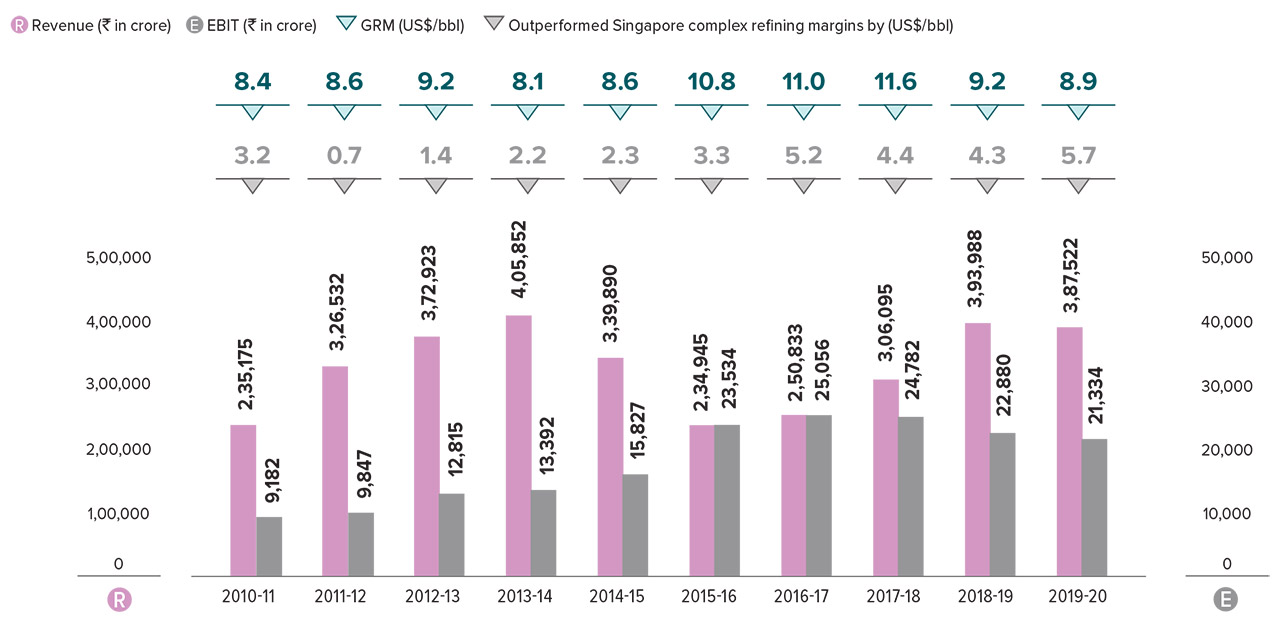
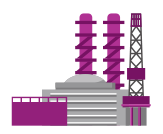
Best-in-class portfolio – Combination of world class scale and asset quality
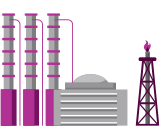
Leveraging the asset linkages
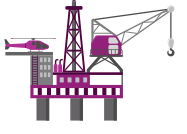
Crude selection and sourcing
CDU (4 Trains)
Coker (2 Trains)
FCCU (2 Trains)
Platformer (2 Trains)
Petchem Plants
Source: Internal estimates/market information

Logistics and supply-chain
Geographical representation of crude grades sourced till date:
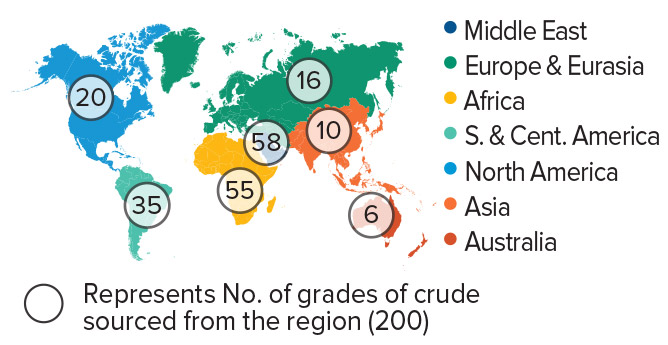
Global oil demand growth at 0.8 mb/d in CY 2019 was the lowest since 2011 as the consumption was affected by global economic uncertainty and trade tensions. Brent crude oil price at US$64.3/bbl in CY 2019 was lower by 9.5% y-o-y.
China accounted for more than threequarters of CY 2019 global oil demand growth. Oil demand growth in China at 0.7 mb/d and in India at 0.2 mb/d was largely structural and broad based, together accounting for almost all of global growth.
Among products, global oil demand growth was led by gasoline and middle distillates.
Chinese oil demand growth was driven largely by transport fuels and petrochemical demand. Despite the slowdown in activity in the manufacturing sector, public support for infrastructure projects is expected to have supported the demand growth, notably for gasoil.
India’s growth rate remained lower than last year due to excessive monsoon and sluggish economic activity.
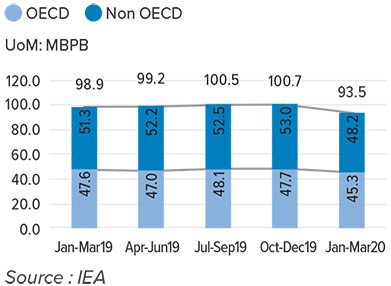

NON-OPEC GAINS MARKET SHARE
Global oil supply grew by 0.2 mb/d in CY 2019. Iran and Venezuela dominated the decline of supply in 2019, while the US once again saw strong growth.
Sanctions and OPEC+ cuts wiped 1.9 mb/d off OPEC supply compared to 2018. Tough US sanctions cut Iran’s crude production by 1.2 mb/d to 2.4 mb/d, the lowest annual rate since 1988. Venezuelan crude supply, hit by sanctions and under investment, fell further in 2019.
Non-OPEC oil supply continued to exceed expectations, posting gains of nearly 2.1 mb/d in CY 2019. Record output from the US, Canada, Brazil along with robust gains from Norway and the start-up of production in Guyana fueled the growth. Increased efforts to stem or reverse declines in some of the more mature producing countries, including China, Mexico and Colombia, also made a contribution.
OIL PRICES
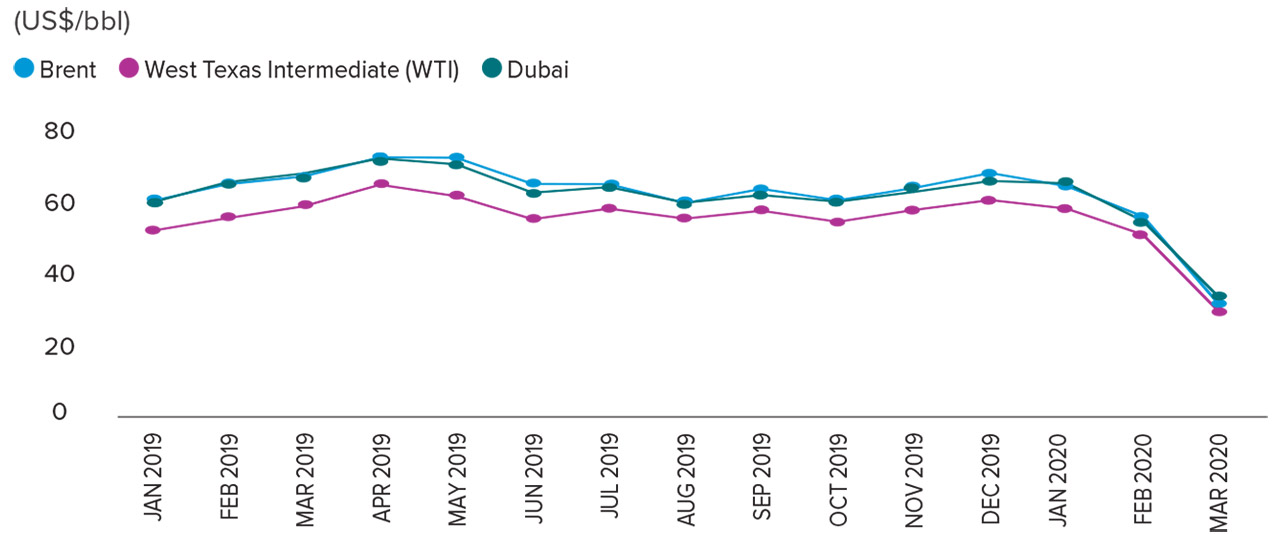
SLOWDOWN IN DEMAND AND OUTBREAK OF COVID-19 PUSHED THE CRUDE PRICES LOWER
Brent crude oil prices averaged US$61.1/bbl in FY 2019-20, lower by 13% y-o-y.
Lower global demand and enough supply kept oil prices in check. Oil prices in Q4 FY 2019-20 was lowest as the demand was hit badly by the outbreak of COVID-19 in China, the major demand hub.
MIDDLE DISTILLATES
Middle distillate cracks in Singapore were lower in FY 2019-20 over the previous year on lower global demand growth. Gasoil demand growth accounted for close to 50% of the oil product demand growth globally. Gasoil demand growth was marred by warmer than usual winters and lower than expected boost from bunker fuel demand as VLSFO remained the bunker fuel of choice to replace HSFO in new IMO low sulphur regime. Supplies from start-up of new refining capacities in China, Brunei and Malaysia also added to the regional surplus, pressurising the cracks. COVID -19 outbreak further deteriorated the demand in Q4 FY 2019-20 amid surplus supplies leading to crack weakening. Jet fuel/ Kero demand moderated amid slowdown in global passenger traffic in 2019 which rose by 4.2% against year CY 2018 growth of 7.3%. ATF demand in India grew by 10.4% y-o-y in CY 2019. Air traffic in India grew by 5.1%, ending a fouryear streak of strong double-digit demand growth. The closure of a major domestic carrier and weakening of economic activity led to slower demand growth.
FUEL OIL
Fuel oil demand declined in CY 2019 as the bunker demand transitioned towards IMO 0.5% marine fuel and suppliers switched their operations towards LSFO and MGO. This has led to crack weakening y-o-y and especially in Q4 CY 2019, when the Singapore HSFO crack averaged US$ (19.7)/bbl.
LIGHT DISTILLATES
Gasoline cracks were slightly higher in US and flat in Europe and lower in Asian market in CY 2019 as compared to last year due to moderation in gasoline demand growth across key markets as well as higher inventory especially in the US during Q4 CY 2019. Growth in China slowed after new car sales declined by 7.4% in CY 2019. Gasoline demand growth in India in CY 19 was strong at 8.9% y-o-y showing high growth in first half of the year and slowdown in car sales impacting growth in second half of the year.
REFINING MARGINS VIS-À-VIS GLOBAL BENCHMARKS


Segment revenue marginally declined due to lower price realisations in domestic as well as export markets due to fall in crude oil prices during the year. RIL’s refining throughput was 70.6 MMT during the year. Refining EBITDA for the year was down 6.1% y-o-y at `24,461 crore led by lower GRM of US$8.9/bbl. The segment performance was impacted by volatile crude prices and multi-year low light distillate product cracks. RIL sustained its profitability in the Refining business by optimising advantaged feedstock sourcing, higher crude throughput and maximising middle distillate pool to capture favourable margins.
MARGINS
Singapore complex margins were lower y-o-y due to lower cracks across products especially the FO cracks which fell significantly in Q4 CY 2019. Freight was also higher for CY 2019 and averaged US$1.1/bbl against CY 2018 average of US$0.8/bbl. Margins in North Western Europe was flat y-o-y but margins in USGC were up y-o-y in CY 2019 due to slightly higher gasoline and middle distillate crack as compared to last year. Global refinery utilisation edged lower in CY 2019 to 81.6% compared to 82.3% in CY 2018. Utilisation in US were lower due to unplanned refinery shutdown and tropical storm. Asian Refinery utilisation were down in CY 2019 due to lower margins.
OUTLOOK
Global oil demand is expected to fall by 8.6 mb/d in CY 2020 because of lockdowns and travel bans in H1 CY 2020 due to COVID-19 outbreak and widespread shutdown of China’s economy in Q1 CY 2020.
US crude supply is expected to decline by 2.8 mb/d y-o-y by Q4 CY2020. Total non-OPEC oil production is set to fall by 3.3 mb/d during 2020.
Demand recovery is expected in second half of the year as the easing of lockdowns and travel bans comes into effect.
CARBON NET ZERO
At Reliance, sustainability is integral to growth in the decades to come. RIL has a vision of carbon net zero at Jamnagar through a host of sustainable long term initiatives such as efficiency improvements; converting carbon intense petroleum products into chemicals; enhanced use of renewable energy in place of conventional fuels; offsetting carbon dioxide by growing algae and capture, utilisation and sequestration of carbon.
DIGITALISATION
Reliance is pursuing digitalisation to gain from its profound power by integrating data across the value chain for seamless working of its entire supply chain as well as Finance, Human Resources, etc. Using a set of cutting-edge solutions, it has automated its systems and improved efficiencies. RIL is at an advanced stage of building platforms on next gen technologies for improved trade execution and efficiencies, planning, faster response time, customer delight and insightful performance management. We are also adopting technologies like Artificial Intelligence / Machine learning for advanced analytics to enable business decision making.
DOMESTIC MARKETING
MARKET ENVIRONMENT
In FY 2019-20, the petroleum product consumption remained stagnant at 214 MMT. COVID-19 and ensuing shutdown had a strong downward pull in the month of March eliminating the overall growth of 2% which the industry had sustained till the penultimate month. While transportation fuels continue to drive the growth, bulk of the growth is driven by the steady rise in gasoline and LPG demand. Improving road network, muted on-boarding of country-wide urban metro network and higher shift to gasoline vehicles with steady decline in gasoline-diesel differential has more than made up for sub optimal growth in disposable income, overall automobile sales and weak economic activity across the country.
With 56% share in the overall energy portfolio, transportation fuels continue to be the major determinant of oil demand growth. Gasoline demand grew by 6.0% to 30 MMT and diesel demand fell by 1.1% to 82.5 MMT. Barring macro-economic and environment factors, demand growth has also been supported by expansion in the retail network. The total number of retail outlets in India has grown to over 69,100 as both state owned oil marketing companies and private players expanded their network presence albeit at a muted pace from previous years.
In the light of ongoing pandemic, the recent downward pull faced by the demand of petroleum products particularly of transportation fuels will be guided by the extent and duration of country-wide lockdown. Continued movement of essential commodities across the country has ensured relatively lower impact on highway fuel demand.
Further, the industry is facing some headwinds from impetus on electric vehicles both in public and private transportation, but this should be more than compensated by the growing spend on infrastructure activities by Government of India (GOI) around their ambitious countrywide road connectivity and port led development. Combination of these projects are expected to enhance both inter and intra-city connectivity which in-turn will sustain demand growth of petroleum products in the near future. Barring the ongoing shutdown related impact both in the domestic and International sector, aviation sector has maintained a steady upward growth.
REFINERY SALES
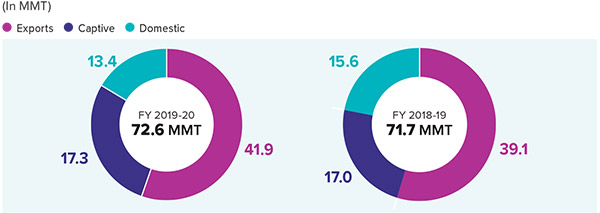
PETROLEUM RETAIL BUSINESS
Having recommissioned the entire network, RIL has focused on improving the quality of sales across the operational countrywide network of 1,398 fuel outlets.
Dual strategy of locking large fleet customers through unique Transconnect propositions and attracting individual customers via dynamic pricing has helped RIL to further strengthen the leadership position in industry throughput. During FY 2019-20, RIL registered over 10% y-o-y growth in average outlet sales volume.
Both the count and volume throughput from active customers enrolled in the marquee fleet programme – Transconnect has grown consistently during FY 2019-20. Driver loyalty program combined with provision of value-added fuel has further strengthened the customer value proposition.
RIL has outperformed across all four quarters in retail diesel and gasoline sales. It registered y-o-y growth of 9.8% in retail diesel and 14.7% in retail gasoline volume compared to (1.5%) and 6.3% for industry, respectively.
Share of fleet (Transconnect) sales in the retail volumes has further grown and continues to be significantly higher than the competitors. Continued sales volume growth in-spite of muted growth in the industry, reflects a strong correlation with RIL’s ‘Desh ka Sacha Pump’ campaign.
Starting mid- March, retail fuel sales across the country were severely impacted by the lockdown. However, on account of strong customer value propositions and strategic presence across highways, RIL fuel outlets had relatively lower impact on sales and should return back to regular sales volumes within a month of the removal of lockdown in their respective geography.
A) OPERATING STRATEGY
RIL serves its family of satisfied customers with a unique Q&Q assured fuelling experience. Being technically equipped, RIL’s refinery migrated to BS VI fuels ahead of the 1st April, 2020 deadline provided by Government.
Building unmatched value proposition, RIL continues to augment its customer value proposition through seamless integration with Reliance Retail and Reliance Jio. Co‑located convenience stores have drawn higher footsteps translating to increased fuel sales. RIL further intends to leverage this with a proposed network-wide rollout of these stores in the future.
Leveraging the high end Jio fiber connectivity, RIL is piloting a gamut of next generation technologies, these would go a long way in adding automation led operational and process efficiency.
With the exponential growth in last mile fuel delivery, RIL is redefining the Indian fuel retailing landscape. Over 1,000 sites are serving diesel through a mix of the packaged containers and mobile dispensing units to the non-transport sector. With all permits in place for in-house production of High Density Polyethylene (HDPE) packs, RIL should be able to bring in significant process synergies. RIL will be the pioneering Indian Oil Marketing Company to launch light weight and tamper proof HDPE packs for doorstep delivery in the country.
Riding on industry-leading pioneering technology, synergies of group companies and proactive focus on customer’s latent needs, RIL will continue taking the fueling experience of Indian customers to even higher levels.
B) DIGITISATION STRATEGY
With the onset of digital media, RIL’s Customer Service is rapidly evolving. In line with the changing times, RIL is gradually increasing its footprint in the digital world.
By adopting the next generation technologies such as AI, Blockchain and Internet of Things (IoT); RIL continues to improve business processes and enhance customer experience.
RIL has rolled out state-of-the-art new age fuel dispensers across the network. Empowering customers to monitor their fleet on the go, offering flexibility of 24X7 fund transfer for loading their fleet account and introduction of virtual card for enabling quicker transactions continue to resonate well with RIL’s key customer segment.
Through its social media channel, RIL endeavours to work closely with the last mile customer for getting service feedback and upgrading the offerings to meet their expectations.
PETROLEUM B2B BUSINESS
A) HSD – DIRECT
Unlike the retail segment, the Bulk Diesel continued the trend of muted y-o-y growth of 0.4% in spite of the impact of shutdowns in March 2020. The industry segment continues to maintain the overall demand inspite of slowing industrialisation and vastly improved electrification. During the year, RIL registered a y-o-y volume growth of 10.8% increasing market share to 8.8% despite expected demand contraction and margin pressure. Non-railway business registered an impressive 16% y-o-y growth.
Building on strong customer connect, RIL has been able to further strengthen relationship with railways reflected in increased volumes and margins. Specific focus on infrastructure, construction and mining segment has provided healthy returns.
Growth in HSD – Direct sales volume would be driven by continued volume growth from railways, sourcing higher volume share in State Transport Units (STUs), designing unique operating models along with strengthening presence in the high potential markets across the country.
B) AVIATION TURBINE FUEL (ATF)
The double-digit growth observed over 52 consecutive months might have been stalled. However, India continues to be one of the fastest growing aviation market in the world for the 5th consecutive year. Air-passenger traffic in India, one of the world’s fastest-growing aviation markets, rose 9% even in February, 2020 after the Indian carriers recouped to full capacity that was lowered following the closure of a major domestic carrier in the first few months of FY 2019-20 as well as disruptions at Mumbai airport owing to construction and maintenance.
Following the COVID-19 pandemic, while travel restrictions were being imposed elsewhere, India was largely unaffected till the end of March, 2020 before the sharp escalation in travel bans globally and lockdowns impacted India’s aviation sector too.
On account of its network strength, cost competitiveness, industry leading technology and best-in-class service standards, RIL improved its volume share in the domestic market. Having the highest market share in 20% of the operating airports continues to reinforce the customer’s trust in Reliance Aviation.
RIL is looking to increase its network to 45 locations as against 30 at the end of FY 2019-20 and is well geared to benefit with the growth in the Indian aviation market.
C) FACILITATING NATION’S ENERGY SECURITY
75% of RIL’s production of transportation fuels from DTA refinery was absorbed in the Indian market during FY 2019-20. While sales through own retail network and, HSD – Direct segment has grown, the volumes through bridging PSU product deficit has also remained at similar levels from previous year.
RIL continues to be the largest supplier of LPG to Public Sector OMCs. Aligned to GOI vision of creating a healthy environment in Indian kitchens, RIL through robust KYC norms and innovative distribution model continues to target improving the quality of life for rural household and migrant labourers.
PROJECT UPDATE
PETCOKE GASIFICATION:
Leveraging Industry 4.0: Next generation initiatives
ACTIONIncreased process compliance and much superior customer experience
On the Lubes growth curve with Relstar: Empowerment driven growth
ACTION33% CAGR in last 3 years against ~1-2% for industry; Rated as “Prestigious Rising Brand 2020”
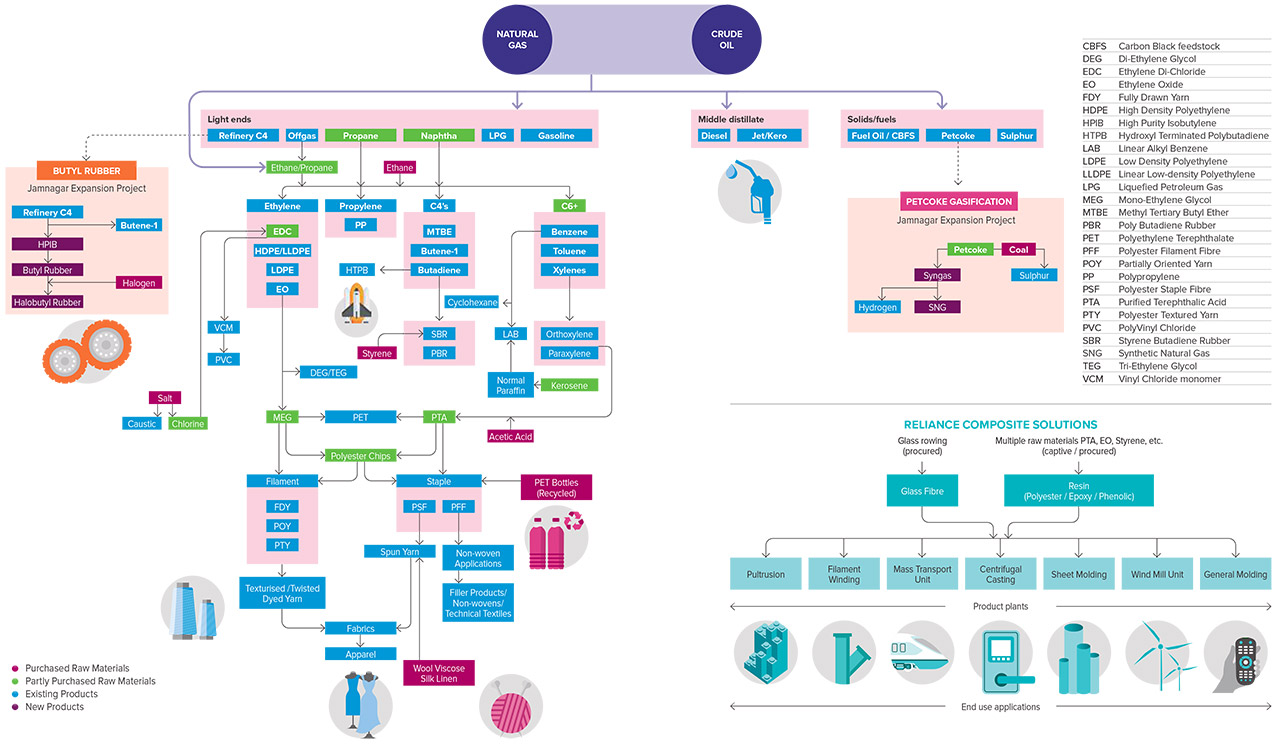
To be among the Top 5 most profitable Petrochemical Companies in the World
Sustainably Enrich Lives and Deliver Smiles by Harnessing the Power of Chemistry
Roads, buildings, windmills, solar panels and telecom poles
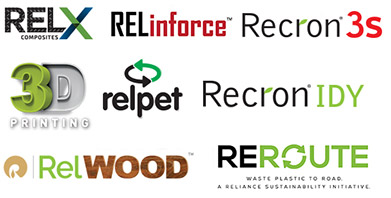
Medicine blister packs, syringes, blood bags, IV packs, bottles, lab coats, masks and PPEs
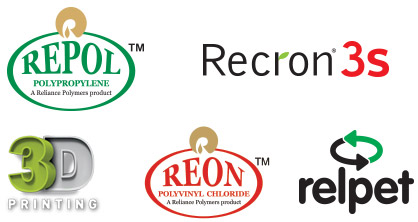
Plastic bottles and disposable packages

Metro, cars, mass transport, tubes and tyres

Golf balls, turf and sportswear
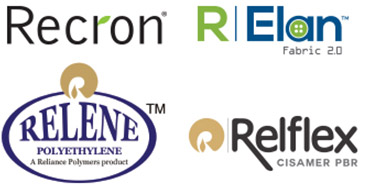
Drip irrigations, pond linings, crop/fruit covers, sprinklers, mulching and silage bags
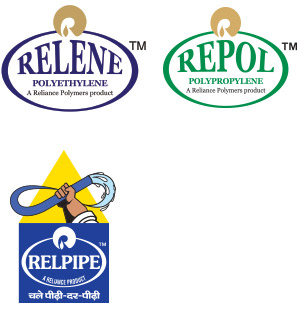
Cables & ducting and reinforcements
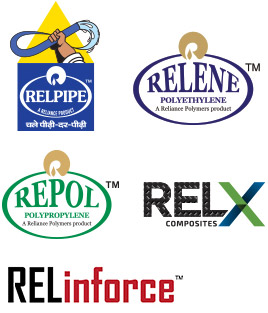
Water storage tanks and PVC pipes
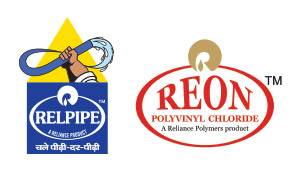
Apparels, beds, sofas, rugs, pillows, wood floors, curtains, consumer durables and FMCG
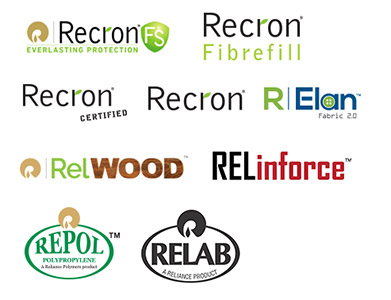







FY 2019-20 was a challenging year for the global petrochemical industry. While on supply side, we witnessed significant capacity additions, on demand side, geo-political issues caused uncertainty and impacted trade flows and consumer demand. An exceptional development - COVID-19, only further disrupted end use demand and caused uncertainty across the globe.
Amidst this unprecedented and volatile business environment, our Petrochemicals business continued to perform, and delivered an EBITDA of `30,933 crore while maintaining a healthy EBITDA margin of 21%. This resilient performance was driven by our broad product portfolio, deep integration coupled with feedstock flexibility that not only diversifies our contribution mix but also significantly reduces earnings volatility across market cycles. As the impact of COVID-19 intensified in India towards the end of the fourth quarter, we responded by adapting our plants and product mix and our customer relationships to ensure a continuous supply of key packaging raw materials into the essential domestic sectors of health and hygiene, food and milk packaging, pharma and medical.
We not only strengthened our B2B2C business model transition through end-consumer initiatives like R|Elan™, but also expanded our advanced material portfolio with value-added, carbon-wrap solutions such as RelInforce™. During the year, we continued to create an enabling ecosystem for widespread adoption of circularity to help position India as a global leader in sustainability and plastic recycling – we recycled more than 2 billion post-consumer PET bottles into high-value fibres. We also launched ReRoute™ – our Waste Plastic to Road Initiative after extensive proof of concept testing with 40 km of inhouse road constructed at our Nagothane Manufacturing Division.

World-class production facilities
PERFORMANCE
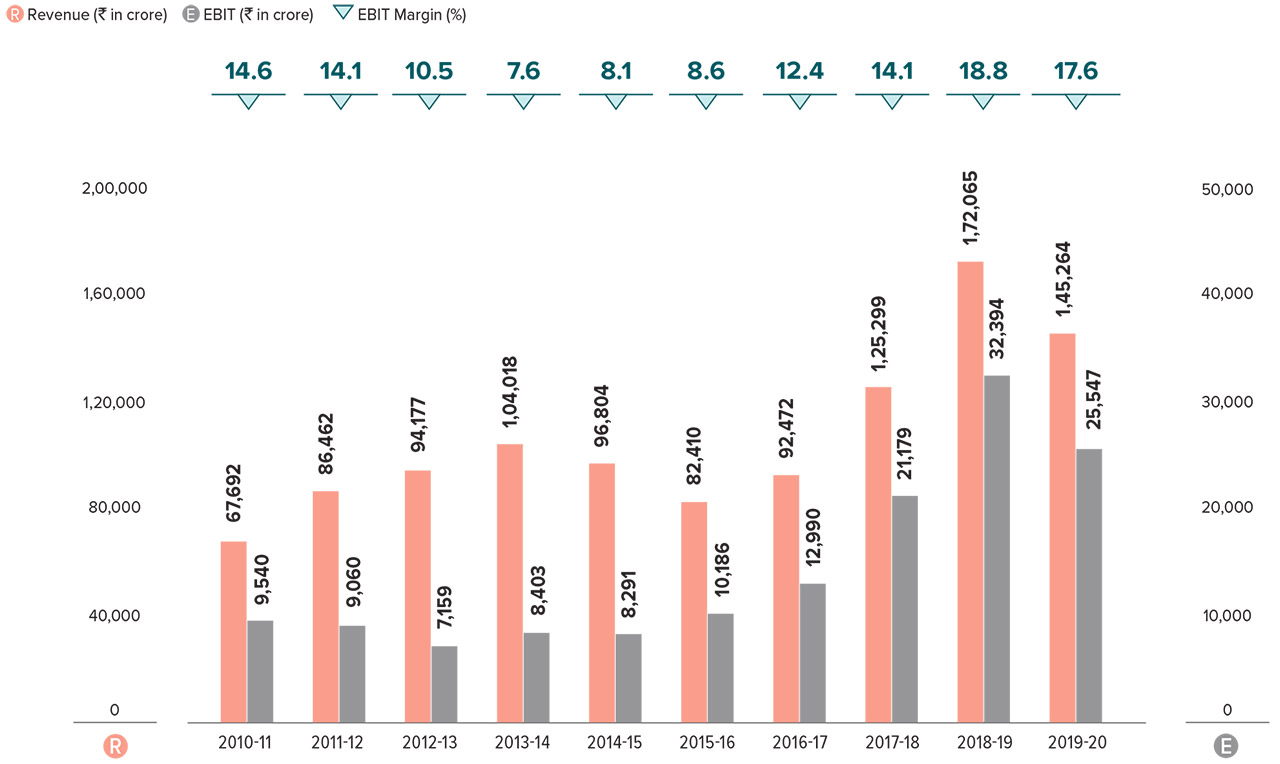

Robust asset profile

Sustaining value creation

Competitive strengths
Reliance is constantly harnessing the power of Chemistry to deliver Smiles to its customers and end consumers.
Chemistry for Smiles: A creative expression that connects science with emotions and conveys how Reliance Petrochemicals, the industrial giant using chemistry, works towards the intangible sweet emotions of life — smiles.
Every business in the Petrochemicals segment uses chemistry to create formulations that are transformed into a diverse range of end products for everyday life – be it polyesters for apparel, home fashion and packaging potable liquids or elastomers for tyres and automotive parts, polymers for healthcare and agriculture or aromatics for detergents and soaps.
The positive attributes of these very products that all consumers use and interact with daily, underlines the necessity and importance of Reliance Petrochemicals in everyone’s lives.
Reliance Petrochemicals in that sense is actually the ‘Industry of Things’ that enable products and services which make the modern life healthy, convenient and enjoyable.
This relentless focus on creating a positive impact and ‘transforming life into quality life’ for our end consumers is what drives our competitive edge and differentiates us.
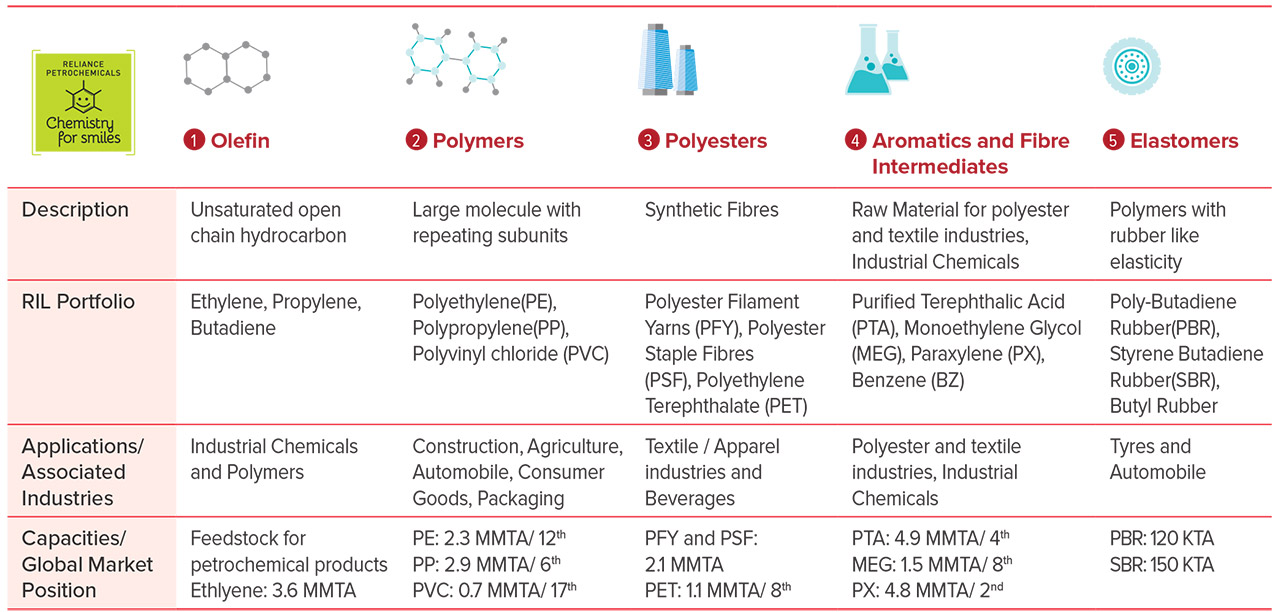
FY 2019-20 witnessed a volatile energy price environment, which echoed in the petrochemical feedstock and product prices. Global macro factors such as trade barriers, excess capacities, Geo-political uncertainties, and regulatory pressure among others, weighed on demand and price, resulting in decline in petrochemical margins across regions.
In face of a weakened macro environment, the Petrochemical business still delivered a resilient operating and financial performance, heading into the COVID-19 crisis. RIL strategically optimised logistics and expanded its exports across both polymers and polyesters to compensate for the slowdown in domestic markets towards the end of the financial year, while fully catering to the essential domestic sectors first.
Global demand for ethylene increased by 4% y-o-y to 167 MMT in 2019, while operating rates remained stable at near 90%. New capacities of 7 MMTA were added during the year, resulting in capacity addition significantly outpacing demand growth.
Global polymer demand (PE, PP and PVC) in 2019 is 232 MMT. Polyethylene (PE) accounted for 46%, Polypropylene (PP) 34% and Polyvinyl Chloride (PVC) 20% of the market. Global polymer demand growth remained subdued during the year amid concerns over economic outlook, trade conflicts between USA and China and several geo-political uncertainties. Outbreak of COVID-19 during Q4 of FY 2019-20 in China and other countries caused slowdown in the industry. The global demand growth of polymers is expected to remain subdued in near term. However, demand growth in Asia is likely to be healthy led by India and China as the economies emerge from the COVID -19 crisis.
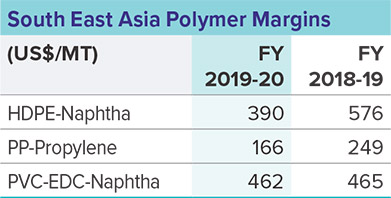
Source: Platts and ICIS
Average naphtha prices in Asia were down by 16% y-o-y in FY 2019-20 amidst softening of crude price and slowdown of demand on economic concerns. Ethylene prices in Asia softened by 30% with pressure from new capacity additions in the USA and weakening downstream PE prices. Propylene prices in Asia also weakened by 11% with falling PP prices and on purpose PDH unit turnarounds in North East Asia.
Overall polymer margins softened due to weakening of prices. On y-o-y basis, PP and PE margins corrected by 33% and 32%, respectively. PVC margins remained largely stable.
Polyester sector during FY 2019-20 was influenced by the USA - China trade war and further impacted by the COVID-19 outbreak in the later part of the year. As the outbreak spread across China and many nations across the globe, governmental restrictions to contain the outbreak were imposed. Consequently, the demand for polyester weakened. Prices during the year declined reflecting the fluctuations in the feedstocks; margins however remained strong for PFY and PSF while PET deltas declined.
COVID-19 in Q4 FY 2019-20 impacted the polyester and downstream rates especially in China, which in turn has had an adverse effect on the upstream demand, thus leading to a build-up of inventories. However, health-care and hygiene sector witnessed a spike in demand due to the COVID-19 crisis with increased usage of medical textiles and non-woven.
During FY 2019-20, PX markets witnessed capacity addition of 12 MMT against an estimated consumption growth of 3 MMT. The start-up of new large PX units in China dampened the market sentiments and concerns, and excess supplies from the new units resulted in squeezed margins.
PTA markets witnessed balanced supply demand scenario with high operating rates until the third quarter. The start-up of new capacities in the later part of the year set in the bearish tone in the markets. To add to the weak market sentiments, the buildup of PTA inventories, due to slower than expected polyester demand before and after the Chinese Lunar New Year holidays, impacted prices and margins. During FY 2019-20, PTA prices decreased 24% and margins dropped 14% y-o-y, but still remained above the 5-year average.
The MEG market witnessed volatility throughout the year. Increased demand in the early part of the year and geo-political tensions in the Middle East reduced port inventories, while supporting price and margins. Start-up of large MEG units in China further weighed down an already oversupplied market resulting in a stock build-up of over 1MMT at year-end. MEG prices slumped 32% y-o-y during FY 2019- 20 and margins weakened 48% y-o-y below the 5-year average.
Global PET prices fluctuated in line with the volatility in feedstock prices as geopolitical tensions dampened the buying sentiments across the regions. Given the essential nature of packaging in the food and beverage sectors, PET business has been much less affected by the COVID-19 crisis than other polyester products, and remains one of the most advantaged polymers so far.
Polyester and fiber intermediates margins
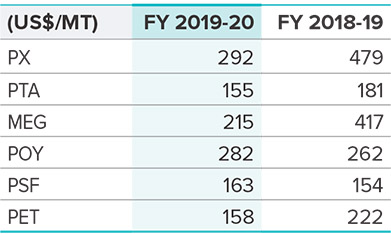
Source: Platts, ICIS, CCF Group
Elastomers
During CY 2019, the global Natural Rubber production decreased by 1% on y-o-y basis (from 13.887 MMT to 13.731 MMT), due to fungal disease in rubber plants in Thailand and Indonesia. Demand growth was flat at 13.5 MMT. Slowdown in economic activities driven by the USA-China trade conflict, effect of COVID-19 and slump in automobile industries weighed on operation and rubber consumption.
Global capacity of Butadiene has increased by 6.6% to 16.23 MMT, with additional capacities getting commissioned up in China and Malaysia. The Operating Rate has come down, from 77% at the earlier part of the year to less than 70% by March due to the COVID-19 pandemic. With the downstream auto sector severely affected, the operating rates of Butadiene is expected to remain at similar levels in the short term.
Global capacity of PBR is 4.5 MMTA in FY 2019-20 with average utilisation rate of 76%, while the global capacity of E-SBR is 4.2 MMTA in FY 2019-20 with average utilisation rate of 78%. The global capacity of IIR is 1.9 MMTA with average utilisation rate of 64%. PBR and SBR demand is directly linked to automobile and tyre sectors.
The Company has built a leading presence across all key product portfolio by building state of the art, highly integrated facilities, driving operational excellence across every facet of the business, and creating Innovative Sustainable Solutions for the industry. With every expansion, Reliance has executed world scale investment projects in record times.
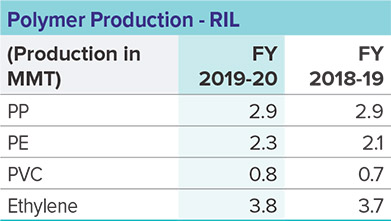
Polymers
The Indian polymer market registered growth of about 4% in FY 2019-20 y-o-y. PE demand growth was healthy at 7% y-o-y driven by policy boost for infrastructure, irrigation and other water management projects and growth in e-commerce sector. PP demand growth was at 2% y-o-y subdued from auto sector and slowdown due to COVID-19. Overall good demand growth has been observed form the health and hygiene sector (PP fiber filament), food and FMCG packaging (BOPP and LLDPE films), rigid packaging for edible oil, hair oil and sanitizers (PP and PE), milk packaging (LDPE), pipes and drip laterals for irrigation (PE and PVC). Increasing awareness and policies against single usage plastic resulted in lower demand growth in the first half of the year.
RIL has achieved highest ever polymer production during the year. RIL is a leading global manufacturer of polymers with six state-of-the-art manufacturing facilities. RIL maintained its leadership position in Indian polymer market with a domestic industry market share of 33%.
RIL’s continuous efforts towards strengthening its supply chain network enabled the Company to place polymers in more than 70 countries globally during the year. RIL exported 1.1 MMT of polymers during the year.
Polyester and Intermediates Production
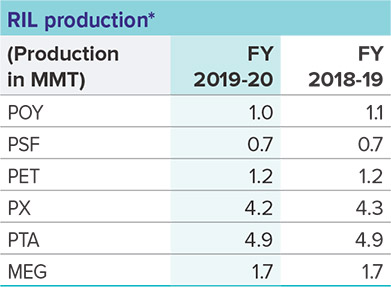
* Malaysia numbers included
During FY 2019-20, Indian polyester filaments market grew by 12% on a y-o-y basis, staple demand weakened marginally by 1% y-o-y, while PET market grew by 10%. Polyester fibre and filament market witnessed weakness at the start of the year due to weak demand and financial crunch with end users which improved later ahead of Diwali and Christmas celebrations.
PET markets remained buoyant amidst strong demand for beverage consumption due to extended summer and national events at the year beginning which continued amidst festivities later in the year.
During fourth quarter, domestic polyester demand remained subdued amidst fluctuations in raw material prices and weak downstream demand, with nationwide lockdown towards quarter-end. In India, with the spread of the virus since early March 2020 and subsequent lockdown, the downstream polyester industry, which is labour oriented, was completely shut down
During FY 2019-20, despite an inclement business environment, RIL has maintained its market share and optimised inventory levels.
Domestic Elastomer Production
Elastomer production
Indian elastomers sector witnessed a weak demand environment during the year, as the automobile industry went through an unprecedented downturn with sales of new vehicles plummeting significantly. Weak consumer sentiments coupled with transition to BS-VI w.e.f April 1, 2020, led to muted demand. During Q4, the COVID-19 pandemic crippled the demand of auto industry further.
Butadiene witnessed production growth of 6% to 482 KT during FY 2019-20. With domestic demand steady at 350 KT, the balance volume is exported. The demand of Butadiene was affected during the lockdown period in the third week of March and the demand is likely to be muted in the next quarter.
Total PBR demand in the industry stood at 0.185 MMT, de-grew by 5%. As for the production front, PBR achieved its highest ever production at 0.13 MMT for FY 2019-20. Even though the entire automobile industry was impacted by overall economic slowdown, RIL was able to maintain market share in PBR.
SBR demand in India in FY 2019-20 is 0.25 MMT. Although industry witnessed de-growth of 4% in FY 2019-20, Reliance increased its SBR production by 6% from 0.12 MMT in FY 2019-20 with wider product portfolio and niche grades. Imports witnessed de-growth of 33% in FY 2019-20.
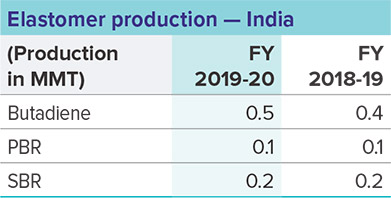
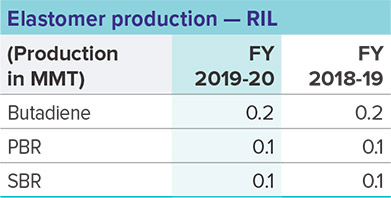
RIL is one of the most vertically integrated petrochemicals producers globally with a leading market position across product categories. World class production facilities and industry leading operating rates across products, helped deliver a sustainable operating leverage across cycles. Refinery off gas cracker, a unique project and expansion of downstream capacity allowed to meet the domestic demand, substitute imports and save foreign exchange for the country. Recent commissioning of High Purity Iso- Butylene (HPIB) unit for C4 value addition is another example of continuous value creation.
Fully integrated operations continue to provide cost competitiveness. Advantaged feedstock supplies provided feedstock security and further enhanced economies of scale. Furthermore, our deep integration (O2C) enables full capacity utilization, while minimising dependence on external feeds. With the recent drop in crude and flattening of the cost curve, RIL regularly optimized sites to take advantage of the feedstock flexibility between Naphtha, Ethane, Off-Gases and C2C3, and enhanced margins.

FY 2019-20 revenue from the Petrochemicals segment decreased by 15.6% to `1,45,264 crore (US$19.2 billion) due to lower price realisations with weaker demand in well-supplied markets. Petrochemicals segment EBITDA was at `30,933 crore (US$4.1 billion), down 18.3% as compared to previous year, due to lower margins in key products — Paraxylene, MEG, PET, Polypropylene and Polyethylene. However, EBITDA was still high at 21.3%, a globally envious position in such volatile markets. The resilient performance of petrochemical segment was led by feedstock flexibility, higher volumes and optimization of product mix to meet changing demand and application trends while leveraging diversified distribution chain.
RIL strategically optimised logistics and expanded its exports across both polymers and polyesters to compensate for the slowdown in domestic markets towards the end of the year, while fully catering to the essential domestic sectors first.
Pan-India supply chain, proximity to key consuming markets and diversified consumer base enabled near real-time product placement amidst a global slowdown.
With the spread of Covid-19 across India, RIL, taking full advantage of its global reach and deep customer connect, quickly shifted towards significant exports mode, and inverted / pivoted business model from 20%/80% (exports/domestic) to 80%/20% in just 10 days.
RIL also switched to multimodal logistics using India’s extensive rail networks, as drivers availability became a challenge, within a week of lockdown to quadruple its multimodal dispatches in April-May in a safe and responsible manner.
Over the course of the year, RIL has significantly enhanced road safety through our vehicle tracking & Emergency Response Center (ERC) – FIRST OF ITS KIND IN INDIA.
At every 100 kms of the hazardous cargo movement route, Reliance has an Emergency Response Centre which analyses tanker movement (24x7) to ensure no accidents take place, however if any unfortunate accident happens, the ERC team quickly provides response within 60-90 minutes.
ERC played a major role during COVID -19 lockdown by guiding drivers (of all trucks) towards safer routes and also helping them with respect to food (by providing location of operational Dhabas). This was highly appreciated by all the transporters and drivers.
Reliance is transforming Petchem’s traditional business to a solutions driven consumer facing organisation. This creates a demand pull, ensures higher margins and will help insulate from market volatilities.
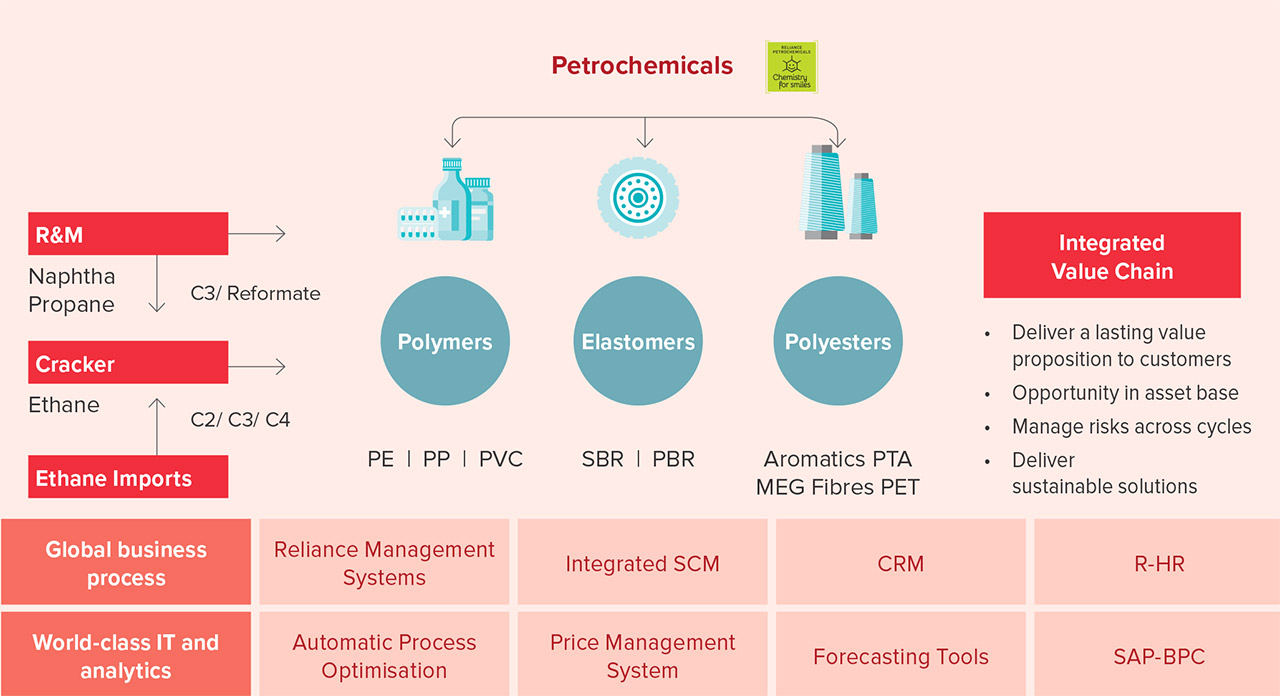
R|Elan™ Fabric 2.0 - the next-generation fabric brand, made with specialty polyester fibres.
R|Elan™ has continued to grow by consolidating its brand partnership with more than 50 brands and extending its value chain globally, resulting in a major jump in exports of R|Elan™ specialty products in the last financial year. Apart from this, R|Elan™ has continued to penetrate new product categories such as ethnic wear, intimate wear, sportswear, etc. and initiated marketing activities that seamlessly sync and showcase the benefits of its growth engines.

R|Elan at Lakme Fashion Week (LFW).
The 2nd edition of Circular Design Challenge (CDC) presented a new winning champion of eco-fashion to the world. Malai Biomaterials Design was selected from a final shortlist of five contenders. This pioneering event promoting circular fashion and incentivising waste-reduction solutions was conducted by R|Elan™ ‘Fashion For Earth’ in association with Lakme Fashion Week (LFW) and the United Nations Environment Programme in LFW 2020.
R|Elan™ has conceptualised and consistently supported this circularity initiative to encourage sustainable solutions in the fashion industry.
This year’s event took place in February 2020 post completion of the year-long engagement that ensured scalability, growth and recognition for the first ever winner of our Circular Design Challenge
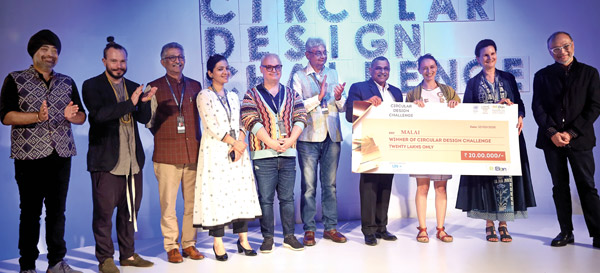
Circular Design Challenge
Extending our value chain to global markets
During the year, RIL joined hands with Turkey’s textile behemoth, Kıvanç Tekstil. They are partnering with Reliance to use R|Elan™ GreenGold — an innovative sustainable fabric — and market it to leading global apparel brands who source their requirements from Turkey to meet the ever-growing demand of environment friendly apparels for consumers across the world. The value chain of R|Elan™ was also expanded to Malaysia and Bangladesh where six new partners were added
Launch of Raymond® Sustainouva powered by R|Elan™ GreenGold
RIL and Raymond Group, India’s leading fashion and textile manufacturer and retailer, launched Sustainouva™ – an eco-friendly and sustainable range of fabrics manufactured using R|Elan™ GreenGold. The Sustainouva™ range redeemed around 1 million PET bottles from landfills. The fabric range is available at 1,500 stores of the Raymond Shop across 700 cities. This was also supported by in-store POS kits made by R|Elan™, which showcased the process of R|Elan™ GreenGold from fibre to Sustainouva fabric.
R|Elan™ Run to make India Litter Free
Sustainability and promoting sustainable practices have been a major focus for R|Elan™. This extends to and has a significant emphasis on all its marketing activities such as the R|Elan™ Run to make India Litter Free – a plogging (combination of jogging with picking up litter) run that began from Kochi culminating in Delhi. The run covered 1,000 km across 50 cities in India and collected tonnes of littered plastic waste. All plastic bottles collected from this activity was sent in for recycling to our PET bottle recycling facility for manufacturing R|Elan™ GreenGold, one of the greenest man-made fibres in the world.
R|Elan™ Fitness Party
During the year, R|Elan™ launched a few fitness events titled R|Elan™ Fitness Parties at major shopping centers in consuming markets such as Chandigarh, Ludhiana, etc. These were conducted in partnership with some of our brand partners involving celebrity fitness enthusiasts to ensure desired levels of consumer engagement.
RelWood™ is a composite made with a proprietary blend of natural fibres and polymers with the look and feel of wood but without the problems associated with wood. The special attributes of RelWood™ — thermoforming, weatherability, water and termite proof, and fire retardancy – enable usage in all applications where wood is used, and in many more where wood cannot be used.
Applications where RelWood™ has already been installed include facades, decking, furniture, pergolas, flooring and paneling. RIL is also developing a suite of solutions – such as pre-finished doors with door frames – which will deliver greater value to our customers.
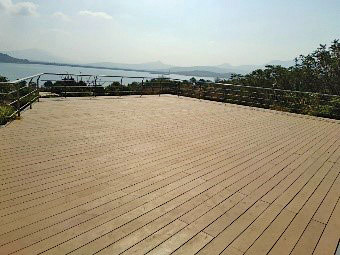
Relwood used for outdoor decks
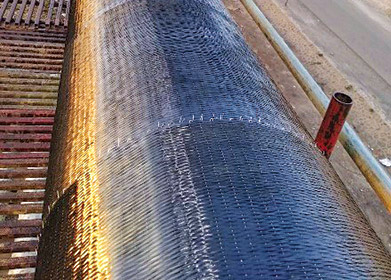
Pipeline rehabilitation
Changing social needs, upgrading of design standards, increased safety requirements and deterioration due to ageing or corrosion result in existing concrete structures such as bridges, jetties, buildings and steel pipelines to be strengthened.
Reliance introduced RELinforce™, a range of Carbon and Glass Fiber reinforced polymer systems for structural strengthening and protection of the structural members and pipes. Setting up the solution involves using guidelines that confirm to international standards and does not just repair degraded structures, it makes them stronger than original and resistant against harmful effects of seismic forces and corrosive mediums.
Establishment of our value chain in domestic markets
Focusing on three major focus areas, i.e. Industrial, Infrastructure and Building, in its maiden year, RELinforce™ served domestic customers and internal Reliance sites by setting up solutions that included design, materials and installation (with partner). To address the specific need of each individual application, RELinforce™ is backed by Application Development Centre (ADC) and Material Engineering Centre (MEC) aligned towards setting up a sustainable solution for our customers.
A Step towards Greener India
Sustainability, longevity and minimum disruption in operations of assets form the basis on which our solutions are developed, making it one of the most preferred type of application for any rehabilitation project. With ample scope for new development, this advanced material will enable lower maintenance cost with increased durability and functionality of the old structure, saving India’s available and valuable resources for building new infrastructure and assets in virgin areas.

>Composite components supply for metro projects
Reliance Composite Solutions (RCS) under the trade mark RELX™, commissioned Unsaturated Polyester resin plant during the year. Besides meeting in-house requirements, the capacity will be utilised to supply other composite manufacturers in India.
RCS has been awarded development order from BEML, Bengaluru to supply composite components of metro train set for the Mumbai Metro project. RCS is also working with other similar metro projects across India. RCS successfully completed development orders of Integral Coach Factory (ICF), Chennai for side panels and toilet modules for local and passenger coaches leading to RCS being awarded vendor status for supply of composite components to Indian Railways. RCS has initiated participation in global markets of Fibre-reinforced Plastic (FRP) components for application in Infrastructure.
Few Other major developments RCS received
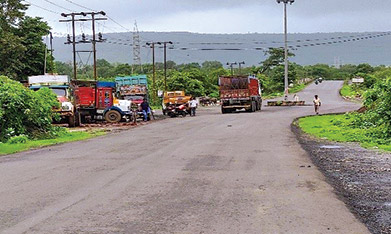
High quality of ReRoute roads even after monsoons
Plastic products have become ubiquitous in our lives. Due to their low cost, ease of manufacturing, versatility and imperviousness to moisture, they are used in a wide range of applications such as in construction, food packaging, healthcare, automotive, electrical appliance, electronics and space science.
However, the prevailing linear economy model of “make-use-dispose” and improper disposal of waste has resulted in low rate of recycling for certain plastics, thereby creating environmental pollution.
Solution
One viable application for such, “end of life-cycle” plastic waste could be in road construction. Road constructed with post-consumer, non-recyclable plastic waste ensures enhanced durability, higher resistance to deformation, increased resistance to water induced damages and improved stability and strength. It also facilitates possible substitution of bitumen, thereby reducing its cost of construction due to the price delta between bitumen and waste plastic.
The plastic waste that is used is, “end of life plastic”, i.e. plastic that has outlived its use/reuse, which is difficult to recycle. The plastic waste acts as a binder when heated to a certain temperature, without emission of toxic gases.
Creating Value from Waste
As part of sustainability and circularity initiatives, RIL formally launched the waste plastic to roads initiative titled ReRoute™. The Company has piloted around 40 km of road in Nagothane, Maharashtra and 1 km inside RIL-RCP campus at Ghansoli, Navi Mumbai, which demonstrated that end-of-life plastics can be utilised in a sustainable manner to enhance quality of our roads and also be beneficial to the environment.
RIL has demonstrated the savings of bitumen and inspected the quality of road after a couple of seasons.It is noteworthy to mention that the quality of road was phenomenal even after a record monsoon rainfall of 3,500 mm. The road has been performing well since then without formation of any potholes.
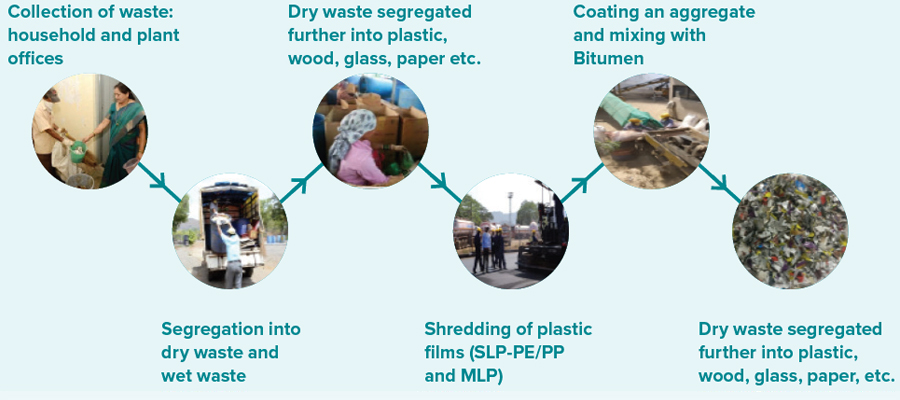
Initiatives by the Indian Government
National Highways Authority of India has mandated use of waste plastics in road construction. The Indian Roads Congress has also amended the existing code for waste plastics by taking valuable inputs from RIL. Several other road construction authorities spanning various states have embarked on a mission to utilise waste plastics in constructing several roads in their respective states.
Path Forward
ReRoute shall create an effective ecosystem for usage of non-recyclable, “end of life” plastic waste and in road construction by advocating better quality of roads and promoting the same to major stakeholders such as governments and private institutions, and road contractors. Given that there is a huge business potential in road construction, this is another such environment friendly initiative that could help the industry convert an adversity into an opportunity and generate wealth from waste.
Using its superior distribution in India and broad product slate, Reliance catered to essential domestic sectors (Milk & Food Packaging) facilitating Agricultural demand for Irrigation and Health & Hygiene ( PPE, Mask). Within a very short span of time, Reliance ramped up special melt blown Polypropylene production to support domestic N95 mask production and eliminated import dependency for a key raw material.
Reliance is working tirelessly to cater to the nation’s requirement of PPE Suits, N95 Masks and Swabs:
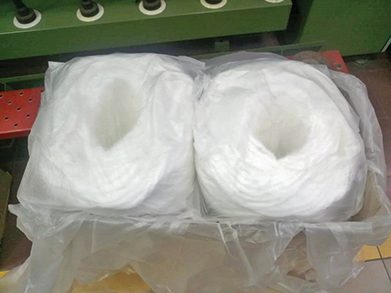
PSF Sliver to be attached to Swab Stem-Rod

PPE Suit
Plastics through their resource saving potential and intrinsic recyclability make a massive contribution to environmental sustainability. Socially, plastics play a vital part by permitting hygienic food and resources for all sections of society.
Plastics have also been at the forefront of relief efforts during natural disasters and catastrophic events. In response to the ongoing COVID-19 outbreak, plastic industry has supplied various essential items such as food and water through fast, clean and hygienic plastic packaging. Plastic supports almost all the Personal Protective Equipment (PPE) such as gloves, masks, aprons, and packaging for hand sanitizers and other personal hygiene products. Plastics are not only playing a crucial role in preventing the spread, but also in medical equipment such as plastic swabs and vials used for testing kits, ventilators, packaging of pharmaceutical drugs made from plastics, which ensure quick and effective treatment of the patients.
RIL’s commitment to environmental sustainability is demonstrated through collaboration efforts, education initiatives, and projects to ensure smooth transition towards a circular economy
Some additional initiatives undertaken at Reliance
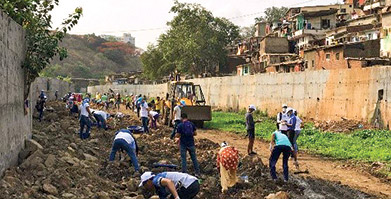
Employee volunteers at the Mithi River clean up
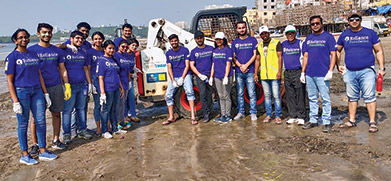
Volunteers with Bobcat at Versova
Closing the loop on plastics and repurposing waste plastics to create innovative products (textile, roads, furniture)
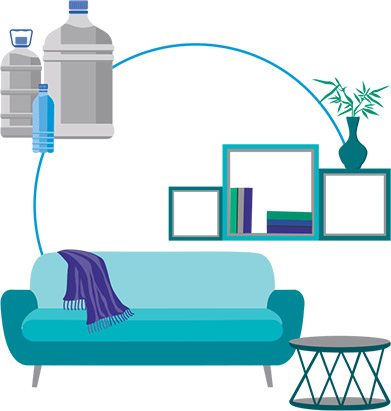
Digitalising our SUPPLY CHAIN via:
Other Key Platform Initiatives to build a digital ecosystem for business and performance management include:
Initial impacts of COVID-19 on the GDP growth in many major economies is likely to be significant in the short term, leading to demand destruction. With gradual opening up of economies and increasing manufacturing activities, demand for most petrochemical products is expected to recover by the second half of 2020. In the near term, demand for polymers and polyester products is likely to be supported by various applications in the healthcare, hygiene & safety and packaging segments.
To be a premier contributor to the India’s Gas Based Economy with production >25% of current domestic production.
Our mission is to maximise stakeholders’ value by finding, producing and marketing hydrocarbons and to provide sustainable growth while catering to the needs of customers, partners, employees and the local communities in which we do business. We will conduct our business in a manner that protects the environment as well as the health and safety of our employees, contractors and the local communities in which we do business.

The Company’s oil and gas assets include KG D6 and two Coal Bed Methane (CBM) blocks.
RIL also has two joint ventures in North American shale plays with Ensign Natural Resources and Chevron.
The Company also holds exploration acreages in NEC25 and KG UDW1 blocks.

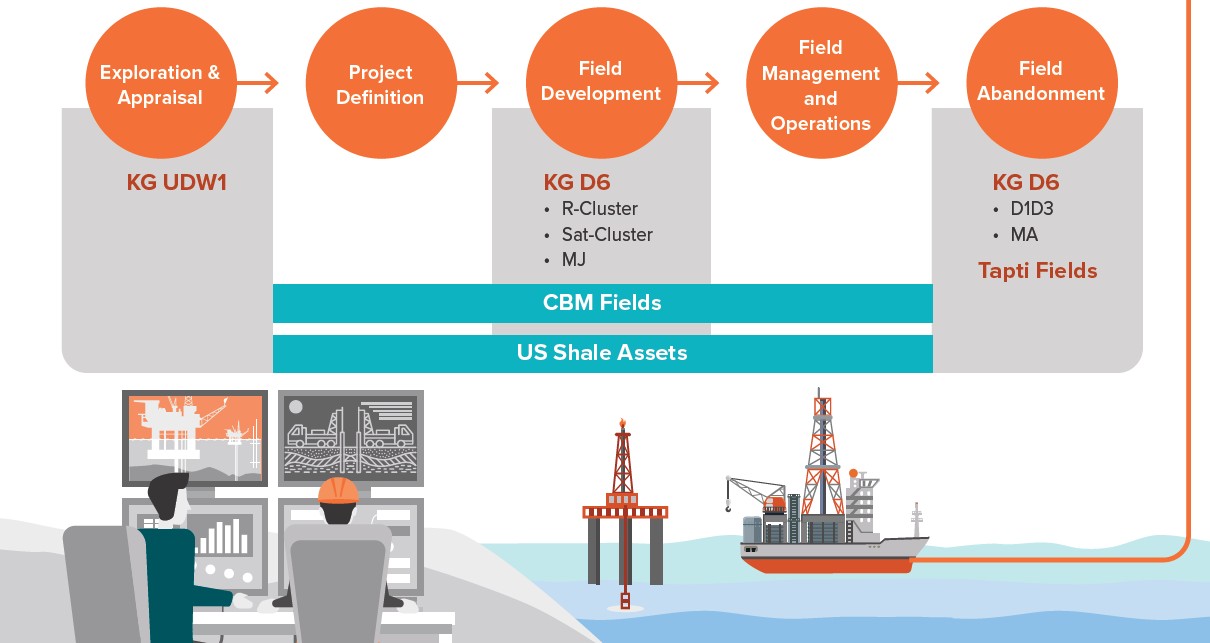
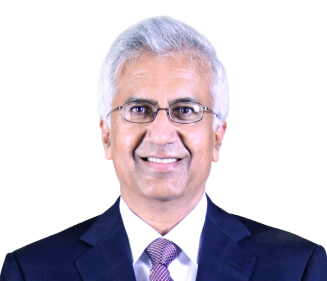




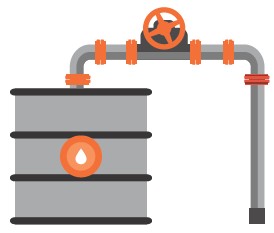
The key focus for FY 2019-20 was to monetise the ~3 TCFE discovered resources in our east coast, KG D6 deepwater asset, while sustaining production and maximising recovery from the existing fields.
Concurrent development of three deep/ultra-deepwater projects, in block KG D6 namely, R-Cluster, Satellite Cluster and MJ fields, is being pursued by leveraging the existing world class hub infrastructure. All contracts have been awarded and projects are in different stages of maturity with commissioning of the first of the three projects i.e. R Cluster, expected this year.
Combined production from these three fields is expected to be 1 BCFe/day (30 MMSCMD) by FY 2024. This would catapult the RIL-BP JV to becoming one of the premier contributors to the Indian Gas economy.
Up until March 2020, all projects have been ahead of schedule. However, outbreak of the COVID-19 pandemic and consequent lockdowns have presented
unprecedented constraints in the execution of these deepwater projects. While safety of people and assets remains our top priority, we are making all efforts to progress these projects and expect to commission the R-Cluster Field in mid FY 2021.
There has been a steady production of about ~1 MMSCMD from the Coal Bed Methane (CBM) fields in Sohagpur, making RIL the largest producer of CBM gas in the country. Further activities are underway to augment production.
Reliance with a significant gas resource base is poised to be a premier contributor to India’s gas-based economy. Within three years, we are aiming to achieve peak production of gas that will be equivalent to nearly 30% of India’s indigenous production. This will translate into substantial multiplier effects for the economy and lead to energy import savings to the tune of nearly US$25 billion over 10-12 years.
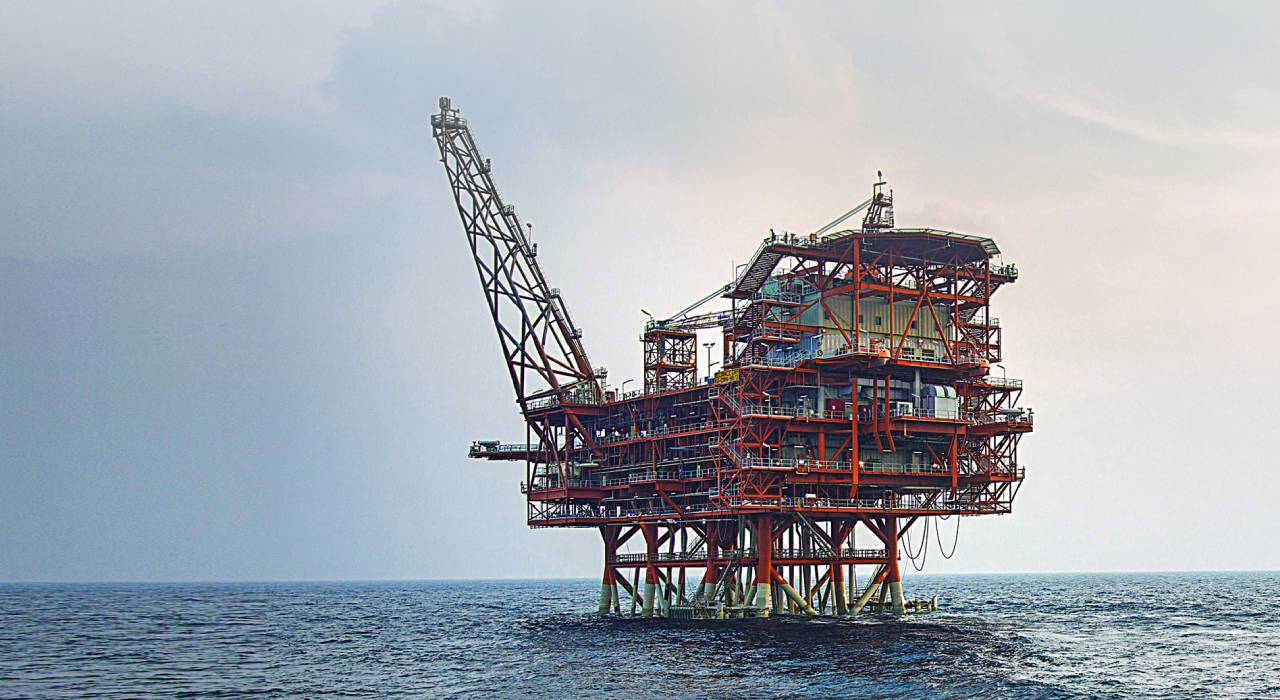
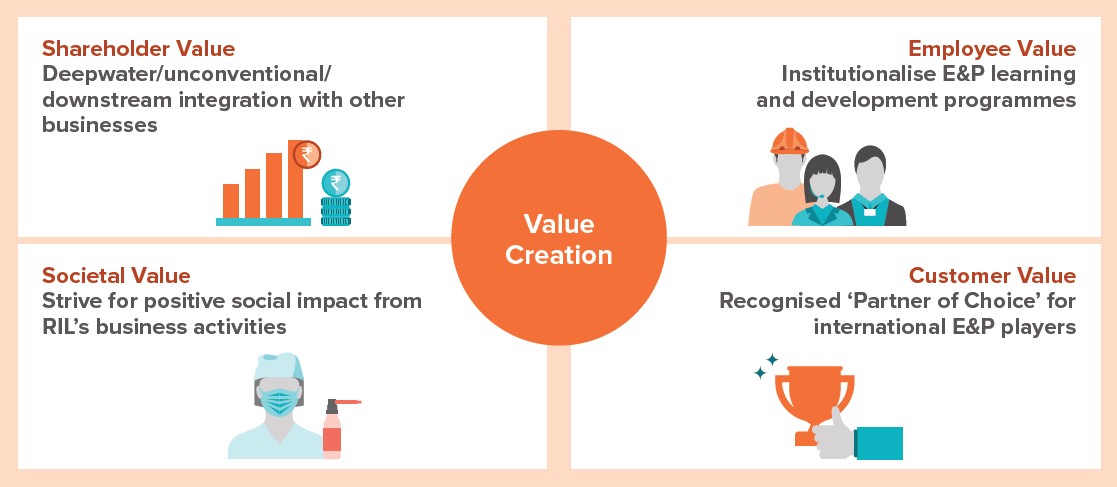
RIL as an integrated E&P Operator is India’s leading Deepwater Operator. Globally, a distinguished leading operator in the execution of complex deepwater projects and operations. Portfolio also encompasses unconventional assets which includes CBM and US Shale assets.
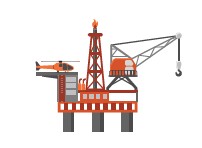
Quality asset base and world class capabilities
Deepwater
Coal Bed Methane

Partnerships

India’s premier gas producer
Will be a major contributor to India’s quest for clean energy as a leading producer of gas
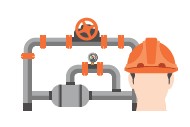
Safety
Over 12 years of safe operation, with safety record among the best in the world since the commencement of production in deepwater block KG D6 and CBM
Nations worldwide are in pursuit of cleaner and greener energy to reduce the carbon footprint. Gas is the ideal transition fuel in the energy mix for the foreseeable future. In India, gas consumption within the energy mix is expected to triple by year 2030 from current levels of 5% to 15% with strong demand from Fertilizer, Power, Refining and other industrial sectors and the rapidly emerging City Gas Distribution sector.
Oil prices softened in 2019 due to oversupply. Brent and West Texas Intermediate (WTI) averaged US$64/bbl and US$57/bbl respectively in 2019, US$7/bbl lower than 2018 averages. Throughout the year, crude oil prices were under pressure due to increase in US production which muted the impact on prices due to, drone attacks on oil production facilities in Saudi Arabia, OPEC+ production cuts, and US sanctions on Iran and Venezuela. However, with COVID-19 destroying demand, coupled with the delay in OPEC+ in agreeing on production cuts, the oil market is in turmoil with prices falling over 70% since October 2019.
Natural gas production in the US set a record in 2019, averaging 92.1 BCF/d leading to reduced gas prices. US Henry Hub gas price averaged at US$2.6/MMBTU compared to US$3.0/MMBTU in 2018.
Given the global demand for gas is projected to grow by 4-5% y-o-y and in absence of investments in LNG projects in the next five years, gas prices are expected to rebound faster and continue its uptrend for most of the decade.
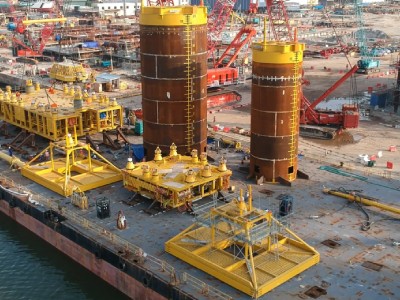
Sub-sea structures
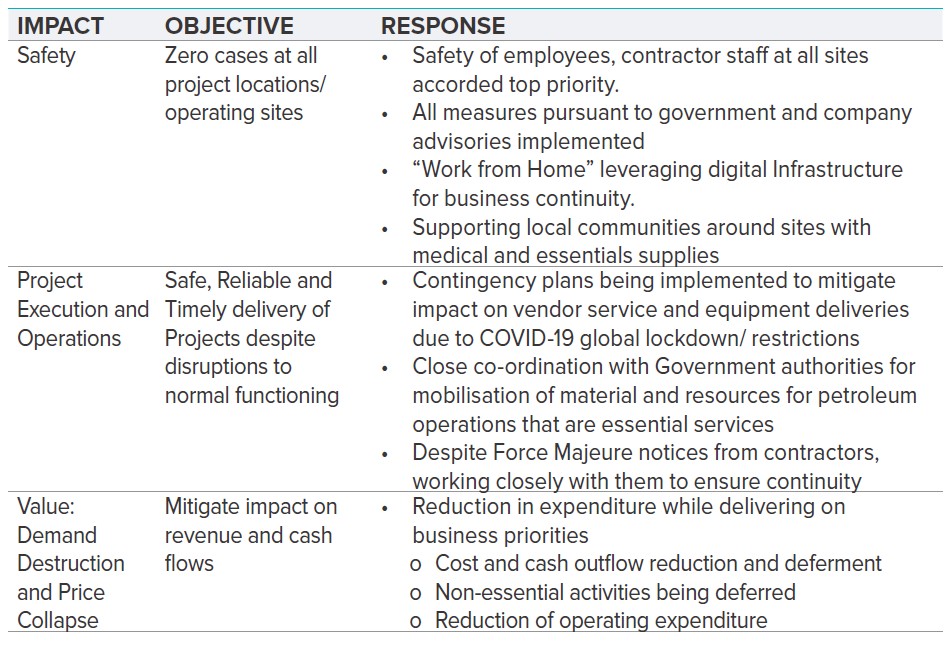
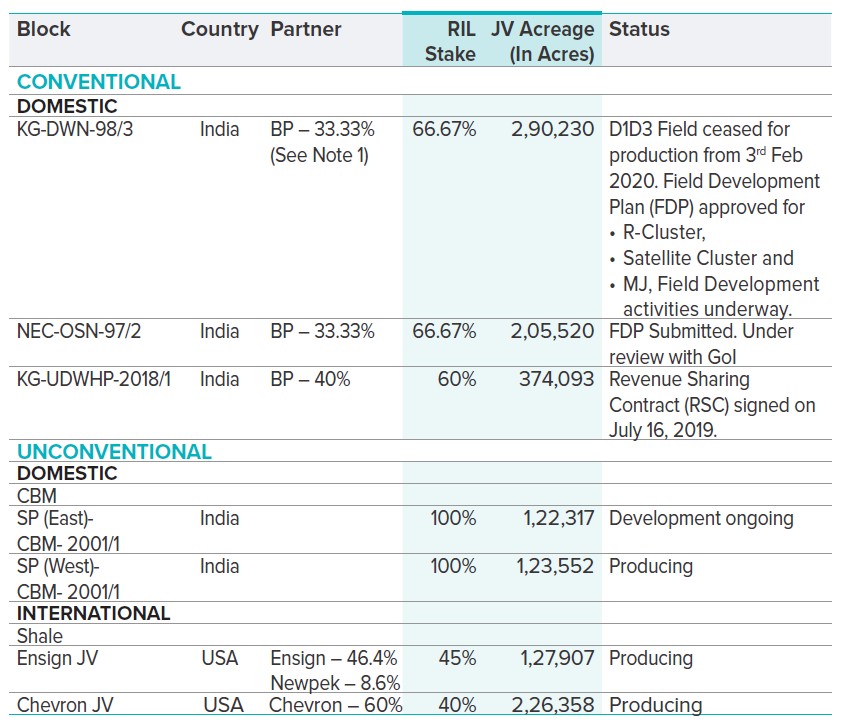
Notes
1. Assignment of 10% of NIKO PI to RIL (66.67%) and BP (33.33%) was approved by Government of India, and PSC amendment is complete.
2. Panna Mukta PSC expired on 21st December 2019 and Field was handed over to GoI nominee ONGC.
3. Mid and South Tapti field PSC also expired on 21st December 2019 and decommissioning activity for facilities underway.
4. GS-OSN-2000/1 was relinquished during the year.
5. Ensign took over from Pioneer as operator

FY 2019-20 revenues for the Oil and Gas segment decreased by 35.8% y-o-y to `3,211 crore. Volumes from domestic upstream fields and US shale were lower because of natural decline and slowdown in development activity. Segment EBITDA was at `353 crore as against `1,642 crore in the previous year. For the year, domestic production (RIL share) was at 38.8 BCFe, down 34.1% y-o-y and in US Shale (RIL share), business was 80.4 BCFe, down 14.9% y-o-y basis.
OPERATIONAL PERFORMANCE
Domestic
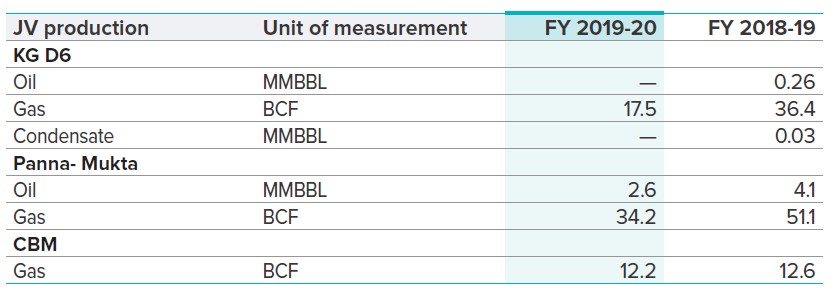
Major Updates/Highlights
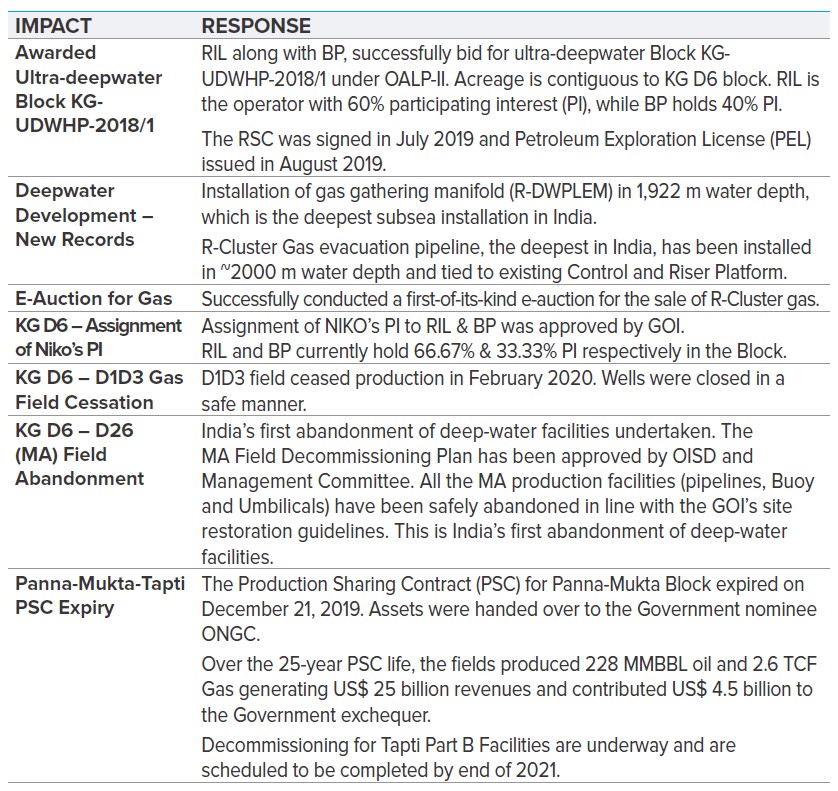
KG D6
D1D3 field was India’s first deepwater gas field to be put on production in April 2009. While there were initial setbacks due to geological surprises, the RIL-BP joint venture through its efforts and further investments extended the field life upto February 2020, maximising recovery from the field.
The KG D6 Block has so far produced an overall 3 TCFe of Gas, Oil and Condensate. The block has established several global benchmarks in terms of operational performance, including 99.9 % uptime and 100% incident-free operations. Majority of the production facilities established for development of the gas fields will be utilised towards development of the three new fields.
KG D6 Deepwater Development Update The development of three deepwater fields, R-Cluster, Satellite Cluster and MJ fields is on track for commencement of production in FY 2020-21. The R-Cluster fields which will come onstream first, will have a peak production of 12.9 MMSCMD, about 10% of India’s current gas production. The combined production from the three fields will ramp up to 30 MMSCMD in 2023 when all the fields are onstream.
R-Cluster
Drilling and completion of six development wells has been successfully completed.
All major sub-sea installation works such as installation of 18” subsea pipeline tie-back to Control and Riser Platform (CRP), subsea structures, in-field pipelines including PLETs, subsea Umbilicals have been completed along with testing. Currently precommissioning work is ongoing.
Existing facilities, including CRP and Onshore Terminal (OT) are being made ready to receive gas from the field.
The field is on track for start of production this year.
Sale of gas, through an open and transparent bidding process, is being pursued.
Satellite Cluster
Fabrication, assembly and testing of subsea production system is on track. 16” Satellite gas evacuation pipeline and suction piles for subsea structures have been installed during the first offshore installation campaign in Q1 2020. The second offshore installation campaign is scheduled to commence in Q3 FY 2021. Drilling and Lower Completion activities of five development wells have also commenced during the year and will get completed this year.
MJ
All contracts have been awarded. Engineering, procurement and manufacturing activities for FPSO, Subsea production system, Risers and Umbilicals are currently underway. Drilling campaign commenced in March 2020 with mobilisation of second drilling rig, ‘West Polaris’.
CBM (Sohagpur East & Sohagpur West)
RIL is currently producing Coal Bed Methane (CBM) from its block SP (West)– CBM–2001/1. Nearly 230 wells are on production with production averaging ~1 MMSCMD in the year.
To sustain production plateau, development activities of phase II of block SP (West)– CBM–2001/1 are being undertaken. Phase II included drilling and completion of 67 wells along with an additional Gas Gathering Station (GGS) and associated water gathering stations for collection and processing of CBM Gas and water respectively.
Reliance Gas Pipeline Limited, a subsidiary of RIL, has commissioned the 302 km Shahdol-Phulpur Pipeline from Shahdol (MP) to Phulpur (UP). This pipeline connects the CBM Gas fields with the National Gas Grid providing access to consumers across the country.
US Shale
In 2019, Reliance focused on preserving long-term value through continued development with strict capital discipline and use of latest technology on completion design.
Chevron focused on their “factory model” on development optimisation and brought two new well pads on stream by year-end with an optimised completion design. Also, the first well in the Utica formation was successfully put into production.
Ensign Natural Resources (ENR) took over operatorship from Pioneer in Q2 CY 2019 and commenced development activity with one rig. 21 new wells were put on stream, 9 of which were for completions only, as wells had been drilled by Pioneer already. Overall results demonstrated lower costs (~20%), improved cycle times (down by ~20%) and improved performance (initial production ~15% higher) when compared to 2017 performance.
Reliance’s aggregate capital investments across JVs increased y-o-y and was US$ 263 million during CY 2019, reflecting development momentum in Chevron during early 2019 and restart of activity in Ensign JV.
For 2020, major focus areas include value maximisation, retaining optionality, improving execution efficiency and cost structure.
Operational Performance
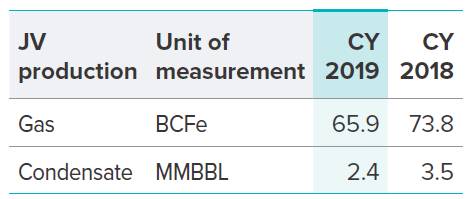
In 2019, the JVs together drilled 62 wells and put 51 wells on production.
Gross JV production was ~0.53 BCFe/d for the 2 JVs, down 14% y-o-y. Reliance’s share of production and sales were at 80.4 BCFe and 70.5 BCFe, respectively in CY 2019, compared to 93.5 BCFe and 84.0 BCFe in CY 2018.
CHEVRON JV
JV operated areas had significant increase in development activity during early 2019 which was followed by slowdown beginning Q4 2019, considering low gas prices. There was 1 rig operating in JV operated area.
Gross JV production declined by 4% to 127 BCFe from 131 BCFe in CY 2018, reflecting slowdown activity. However operational efficiency had improved and well performance remained strong. Reliance share of net Sales volume stood at 43.7 BCFe vis-à-vis 45.2 BCFe in CY 2018.
ENSIGN JV
In 2019, Ensign was focused on bringing the DUC (Drilled Uncompleted) wells online followed by new drills in core CGPs. Development activities commenced in July 2019, with 1 rig and 1 frac crew remaining mobilised for the balance 2019. With zero activity in H1 2019 and natural decline of the existing wells, average Gross JV production was down 29% at 66 BCFe vis-à-vis 93 BCFe in CY 2018 and Reliance share of net sales volume was at 26.9 BCFe vis-à-vis 38.7 BCFe in CY 2018. The share of liquids improved from 66.5% to 67.4% in CY 2019.
RIL’s exploration strategy is focused on catchment areas in proximity to existing KG D6 block to leverage existing infrastructure. RIL won the block KG UDW-1 in the ultradeep waters of KG basin in the OALP round II. The mapped play is in geologically challenging domain and will require stateof- the-art technology in acquisition and processing to preserve amplitude fidelity for ultimate drilling decisions.
RIL is also looking for similar opportunities in the Mahanadi basin where it has discovered resources in the block NEC- 25 from NELP-I.
RIL’s endeavour towards creating E&P digital platforms aims to free up the locked down data structures, workflows and functionalities inside the native architecture of OEM solutions. The objective is to make them more interoperable through “Open Standardised Interfaces”, so that there is a good degree of freedom to innovate solutions to the business problems. This would achieve the “layered modular software architecture” which enables the delivery of products and services to the consumers of the E&P business, in a truly platform ways of working.
SOLUTIONS AS PART OF THE E&P DIGITAL PLATFORM

All these solutions deliver the following value propositions:

I-UDH Installation
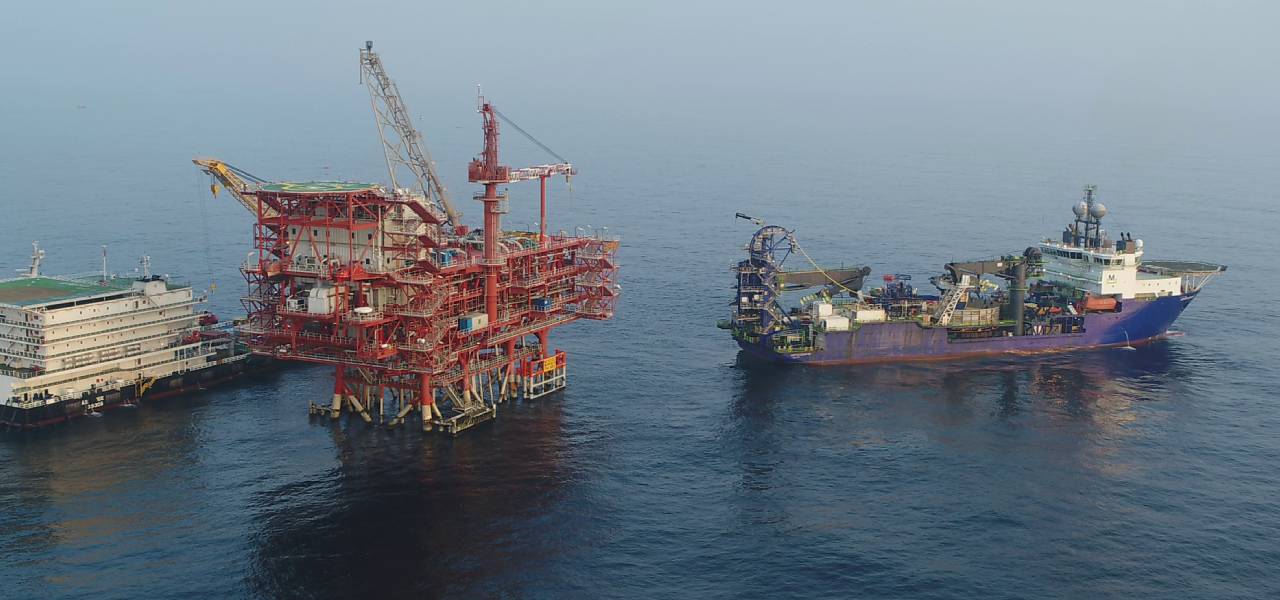
CRP modifications underway
KG D6 COST RECOVERY ARBITRATION
Arbitration claim commenced by the Company in November 2011 seeking declaration that it is entitled to recover 100% of its contract costs under the PSC for the KG D6 Block. Parties have filed their respective pleadings before the Arbitral Tribunal as part of arbitration proceedings.
PUBLIC INTEREST LITIGATIONS (PILS)
Three PILs were filed before the Supreme Court in 2013 against the Company in relation to the KG D6 PSC, seeking reliefs in the nature of disallowance of cost recovery, quashing GOI’s decision to approve certain gas price formula and termination of PSC. The Company has submitted that the underlying issues in the PILs are already subject matter of ongoing arbitrations relating to the KG D6 Block. Matter is still pending in the Supreme Court.
PMT ARBITRATION
Arbitration was initiated by BG Exploration and Production India Limited and RIL (together the Claimants) against the Government on December 16, 2010 under Production Sharing Contracts (‘PSCs’) for Panna – Mukta and Tapti blocks due to difference in interpretation of certain PSC provisions between Claimants and Government. The Arbitral Tribunal by majority issued a final partial award (‘2016 FPA’), and separately, two dissenting opinions in the matter on October 12, 2016. Claimants challenged certain parts of the 2016 FPA before the English Courts, which delivered its judgment on April 16, 2018 and remitted one of the challenged issues back to the Arbitral Tribunal for reconsideration. The Arbitral Tribunal decided in favour of the Claimants in large part vide its final partial award dated October 1, 2018 (‘2018 FPA’). The Government and Claimants filed an appeal before the English Commercial Court against this 2018 FPA. The English Commercial Court has rejected Government’s challenges to 2018 FPA and upheld Claimants’ challenge and has remitted the underlying issue in challenge back to the Arbitration Tribunal for determination. Claimants have filed an application before the Arbitral Tribunal seeking increase in the PSC Cost Recovery Limit and the same is sub judice. Arbitral Tribunal is yet to schedule recomputation of accounts and the quantification phase of the arbitration, which will take place post determination of Claimants’ request for increase in cost recovery limit under the PSCs. The Government has also filed an execution petition before the Hon’ble Delhi High Court under sections 47 and 49 of the Arbitration and Conciliation Act, 1996 and Section 151 of the Civil Procedure Code, 1908 seeking enforcement and execution of the 2016 FPA ignoring the judgements of English High Court and the subsequent Tribunal Awards. The Claimants content that Government’s Execution Petition is not maintainable. Government’s Execution Petition is currently sub judice.
DISPUTE WITH NTPC
NTPC filed suit in 2006 for specific performance of contract for supply of natural gas of 132 trillion BTU annually for a period of 17 years. This suit is still pending adjudication in the Bombay High Court and the Company’s fact witnesses in the suit are to be cross examined by NTPC.
ARBITRATION RELATING TO ALLEGED MIGRATION OF GAS
GOI sent a notice to the KG D6 Contractor on November 4, 2016 asking the Contractor to deposit approximately US$ 1.55 billion on account of alleged gas migration from ONGC’s blocks. RIL, as Operator, for and on behalf of all constituents of the Contractor, initiated arbitration proceedings against the GOI contesting its unfair claim. The Arbitral Tribunal vide its Final Award dated July 24, 2018 upheld Contractor’s claims.
GOI filed an appeal on November 15, 2018 before the Hon’ble Delhi High Court, under section 34 of the Arbitration Act, against the Final Award of the Arbitral Tribunal and the appeal is currently pending adjudication before the Hon’ble Delhi High Court.
WRIT PETITION FILED AGAINST FIR IN ANTI-CORRUPTION BUREAU
In 2014, four individuals filed a complaint to the Chief Minister of the Government of National Capital Territory of Delhi alleging collusion between the then Ministers of the Central Government and the Company in relation to increasing the price of gas produced by the Company from the KG D6 Block. The Chief Minister of Delhi had ordered the ACB to register the FIR and investigate the matter.
The Company has filed a Writ Petition before the Hon’ble Delhi High Court questioning the jurisdiction of the ACB in registering the case against the Company. The Company has contended that the ACB lacks jurisdiction to file the case. The matter is currently pending before the Hon’ble Delhi High Court.
Health
ACTION
The health outreach programs at CBM are implemented through Mobile Medical Unit (MMU) services, targeted multispecialty health camps, model Aanganwadi programs, awareness drives and rejuvenating health infrastructure with support from District Health Administration, to tackle anaemia screening, eye ailments, dental problems, gynae issues, sanitation, cleanliness, menstrual health and preventive care. Special occasions like Girl Child week was observed, felicitating mothers of new born girl child and planting saplings in their names.
IMPACT
More than 1 lakh consultations were provided, and over 3,000 individuals have benefitted through specialised health camps.
OUTCOME
Enhanced health infrastructure and awareness
Food and nutritional security
ACTION
Farmers are supported for practicing resource optimisation, enriching productivity, technology, timely support of quality farm inputs, promotion of cash crops, and work with government agencies to leverage their schemes for enhanced farmers’ income.
IMPACT
1,280 acres supported with System of Rice Intensification (SRI), more than 200 acres supported for vegetable cultivation as cash crops and 50 acres converted to orchards as models of agro-horticulture and multi-layered cropping system.
OUTCOME
Enhanced yield and farm income
Education
ACTION
21 digital classrooms installed in government schools with mini science centres in selected schools to promote science and math. Ensured safe and convenient journey of over 400 girl students to and from their schools and colleges through designated buses. 5 coaching centres being run for students preparing for competitive exams.
IMPACT
More than 3,000 students have access to digital education, over 1,000 students benefited from science and math centres, over 30 students have been successful in getting admissions to prestigious schools, more than 4,500 students have been supported with educational materials.
OUTCOME
Reduced dropout rate and absenteeism
Water and sanitation
ACTION
Over 50 water bodies and over 30 low cost water harvesting bodies, Bori bandhan, collectively developed with nearby communities are built to harvest rain water and ensure ground water recharge, RO water filter and iron removal plant to ensure quality drinking water to households. 8 solar toilets are installed in schools.
IMPACT
Over 2 lakh m3 of water harvesting capacity developed and over 15 villages have been ensured improved access and availability of drinking and irrigation water.
OUTCOME
Accessible and affordable water availability, clean and hygienic facilities
Skilling and livelihood
ACTION
In partnership with various skilling agencies, youth and women were skilled in bike repairing, JCB operations, stitching, handicrafts making and capacity building in alternative off farm livelihoods such as poultry, goatry and pisciculture.
IMPACT
More than 3,000 households supported through continuous inputs, training and capacity building.
OUTCOME
Enhanced income for households and employment opportunities




Managing Liquidity and Capital resources for Reliance and all its group companies continue to remain a key focus area within Treasury. Reliance continued to tap new liquidity pools to diversify its sources of debt financing. Treasury retained its focus on providing liquidity to the businesses at the optimal risk adjusted cost by accessing financing from different markets and using different instruments and currencies. There were multiple shocks in the financial markets during the year emanating from sharp moves in crude oil price, changing sentiment on account of US-China trade war, credit events in the domestic financial
markets in India and the COVID-19 crisis. The company was successfully able to navigate all such dislocations in the market, continued to manage its financial market risks prudently and deliver a consistent return on its investment portfolio by staying invested in low risk, liquid instruments. RIL, in partnership with banks continued to innovate and deploy new technologies in banking and payment operations. Reliance continues to enjoy a strong credit rating and continues to be rated two notches above sovereign by S&P and is one notch above sovereign by Moody’s.
Reliance Treasury is focused on securing liquidity and capital for all its businesses. It makes sure that the capital is made available at the optimum risk adjusted cost and is made available at the time when businesses require it. It also ensures maintaining a prudent mix of funding sources across instrument classes, financing products, geographical markets and investor classes. Reliance Treasury continuously assesses markets in order to identify and spot the right financing and investment opportunities.
Reliance enjoys a strong reputation of being a trendsetter in financing, both in Asian as well as global financial markets. It has many ‘first-in-market’ financing solutions to its credit. It has, over the years, built and nurtured strong relationships with more than 100 banks and financial institutions as well as 14 Export Credit Agencies (ECAs) globally – the highest number for any corporate entity in the world. These strong relationships, coupled with the strength of its balance sheet, the strength of its business cash flows, exceptional credit profile and high-quality credit rating ensure that Reliance continues to have access to financing at the most competitive rates at all times and even during tight liquidity conditions.
Whenever required, the company has been able to refinance its debt by aligning its maturity profile with the requirements of the businesses, at an optimised cost. During FY 2019-20, Reliance tied-up financing for $5.9 billion, by raising some new debt and by refinancing some of its existing loans as part of its on-going liability management exercise.
Reliance was awarded as Best Issuer (Corporate) – South Asia by The Asset, Asia’s leading financial publication for issuers and investor.
NEW FINANCING
Some of the key new financings raised by Reliance during FY 2019-20 are listed below:
REFINANCING
As part of its liability management exercise, during FY 2019-20, Reliance successfully tied up long-term financing via US$1.1 billion syndicated term loan facility. The facility will be used to refinance the equivalent debt maturing in FY 2020-21. Reliance will lengthen the maturity of its long-term debt portfolio through this refinancing exercise.
FINANCING IN SUBSIDIARIES
During FY 2019-20, Reliance Jio Infocomm Limited (RJIL) successfully tied up US$600 million and JPY 15.90 billion Korea Trade Insurance Corporation (K-Sure) supported ECA financing with door to door tenor of over ten years. This transaction was guaranteed by RIL and was awarded ‘Best ECA-backed Telecoms Finance Deals of the Year’ by Trade and Export Finance (TXF).
TRANSFER OF LIABILITIES
To align RJIL’s capital structure with that of global technology peers and to have significant financial strength to address the Digital Services opportunity in India, a scheme of arrangement was entered into by RJIL with certain classes of its creditors to transfer certain identified liabilities to RIL.
In March 2020, pursuant to the approval of Hon. National Company Law Tribunal, Ahmedabad Bench, the identified liabilities of RJIL have been transferred to RIL with effect from the Appointed Date mentioned therein.
During FY 2019-20, Reliance and its subsidiaries tied up facilities across various financing products and maturities. The table below shows debt levels for the year ended March 2020 and March 2019 for Reliance on a consolidated basis.

Reliance maintains a strong focus on liquidity to ensure that the group always has adequate cover to face any potential short term market disruptions. Cash from operating activities is strong. Investments in the form of cash and cash equivalents provides an additional liquidity buffer.
Reliance’s liquidity management and investment plans are created within the context of its annual financial and strategic planning processes and reviewed on an ongoing basis.
Reliance believes that the Group has sufficient working capital resources for running all its businesses smoothly. We continuously monitor and optimise our working capital requirements by leveraging diverse trade financing solutions covering receivable and payment products and executing innovative structured trade products.
Our investment portfolio has been created to achieve twin objectives of optimal returns and assurance of liquidity when needed. The investment portfolio is well diversified and is operated under a prudent risk management framework.
The risk management and investment process is regularly reviewed to refine the processes and incorporate evolving best practices.
Reliance’s financial discipline and prudence is reflected in the strong credit ratings ascribed by rating agencies. The table below depicts the credit rating profile:

RATINGS DEFINITIONS
S&P BBB+: An obligation rated BBB+ exhibits adequate protection parameters. However, adverse economic conditions or changing circumstances are more likely to lead to a weakened capacity of the obligor to meet its financial commitment on the obligation.
Moody’s Baa2: Obligations rated Baa are judged to be medium-grade and subject to moderate credit risk and as such may possess certain speculative characteristics.
CRISIL AAA: Instruments with this rating are considered to have the highest degree of safety regarding timely servicing of financial obligations. Such instruments carry the lowest credit risk.
CARE AAA: Instruments with this rating are considered to have the highest degree of safety regarding timely servicing of financial obligations. Such instruments carry the lowest credit risk.
ICRA AAA: Instruments with this rating are considered to have the highest degree of safety regarding timely servicing of financial obligations. Such instruments carry the lowest credit risk.
During FY 2019-20, based on an internal reorganisation of its business segments and increased focus during business reviews carried out by the management, RIL identified ‘Financial services’ as a separate business segment.
The anchor ecosystem of Jio (387.5 million customers), and Reliance Retail (11,784 stores) provides a strong distribution channel for financial products. The strategy of the Financial Services business centres around creating tailor-made financial products and offering them as extensions of other products that are being offered to customers in the anchor ecosystem of Reliance’s consumer businesses. This synergistic relationship will benefit both the financial services and the anchor ecosystem businesses.
FINANCIAL AND OPERATIONAL PERFORMANCE
This financial services segment achieved a turnover of `1,271 crore and an EBIT of `473 crore in FY 2019-20.
Reliance was one of the first companies in India to integrate sustainability into its core business. This has helped the Company pioneer change at the technological, behavioural as well as the policy level. In its business strategy, the Company has
gone much beyond risk management to inculcate a future growth-oriented management philosophy, which draws from four key enablers that reinforce the Company’s fundamental philosophy – ‘Growth is Life’.

A prudent financial framework, a robust risk management framework and the Company’s short- and long-term objectives linked to value creation define Reliance’s strategic framework. It also outlines the expectations and boundaries within which each of the Company’s businesses must operate. The intent is to also provide guidance to established as well as evolving businesses in the Group by setting effective business objectives for each. The entire framework is underpinned by the core belief that value creation and preservation are paramount. This cuts across the entire set of internal and external stakeholders and leverages a strong knowledge and asset base as well as by investment in strategic opportunities.
Reliance’s strategic framework can be divided into three pillars:
Reliance, by design, creates positive value across its value chain for all of its stakeholders, both in tangible and intangible form. The Company has respected the six capitals postulated by the International Integrated Reporting Council’s (IIRC) Integrated Reporting <IR> framework to aptly delineate its value creation story:
By capitalising on additional opportunities such as efficient use of natural resources, which leads to cost reduction, and maintaining strong relations with stakeholders, Reliance is able to further augment its triple bottom line. Reliance’s growth ambitions are fuelled by its efforts to constantly upskill its employees and bring them up to speed with the use of latest technologies. This enables the Company to adopt emerging technologies quickly and bring in more efficiency, which also leads to safer and environment-friendly operations. RIL also leverages digital technology and smart manufacturing applications to create innovative solutions for business functions.
Risk management at Reliance is reviewed based on the ever-changing external and internal environment to ensure decision-making is aligned with the organisation’s business strategy, improving the resilience of the organisation to generate sustainable value. The Company recognises that effective risk management and robust governance structures are fundamental to continue leading the phygital revolution. The infrastructure for risk and governance activities at Reliance comprise the Enterprise Risk Management (ERM) framework. The ERM framework identifies, evaluates, manages and reports risks arising from the Company’s operations. ERM enables Reliance to manage its risks within acceptable limits by using risk mitigation techniques and allocating the necessary resources, thereby being resilient through volatile environments.
The move to digital platforms enables the Group to evolve the Reliance Management System (RMS) and build an agile and future-ready organisation. This strategic digital platforms journey reflects in its business performance. Reliance has built the best access to Indian consumers by creating the physical-digital bridge. By capitalising on the current platforms, Reliance has built a world-class business today with a clear vision for the future.
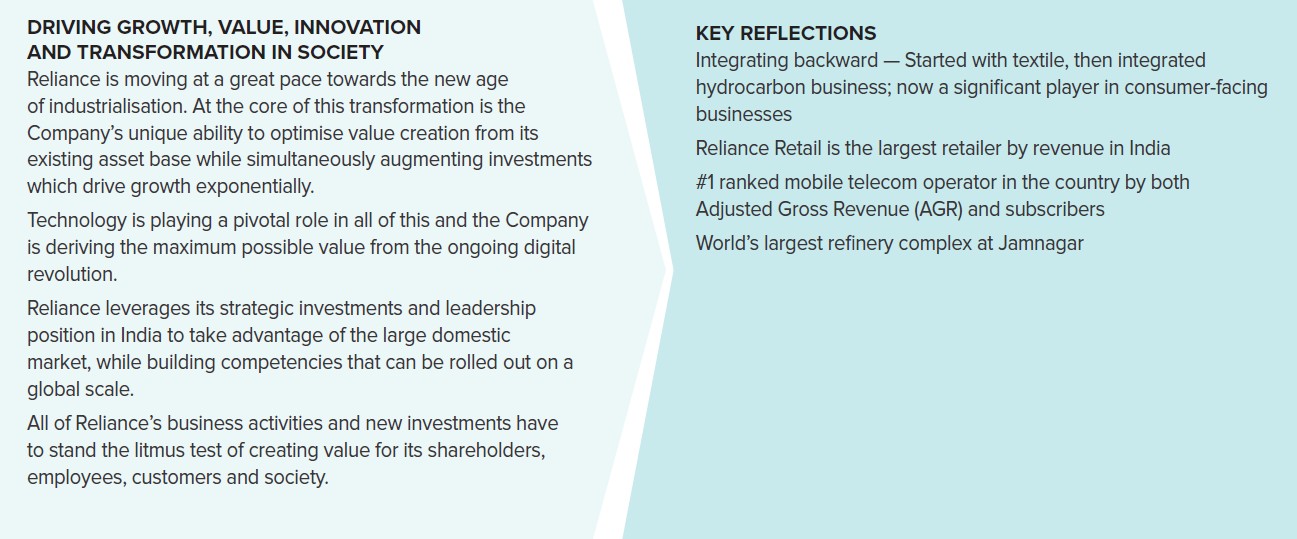
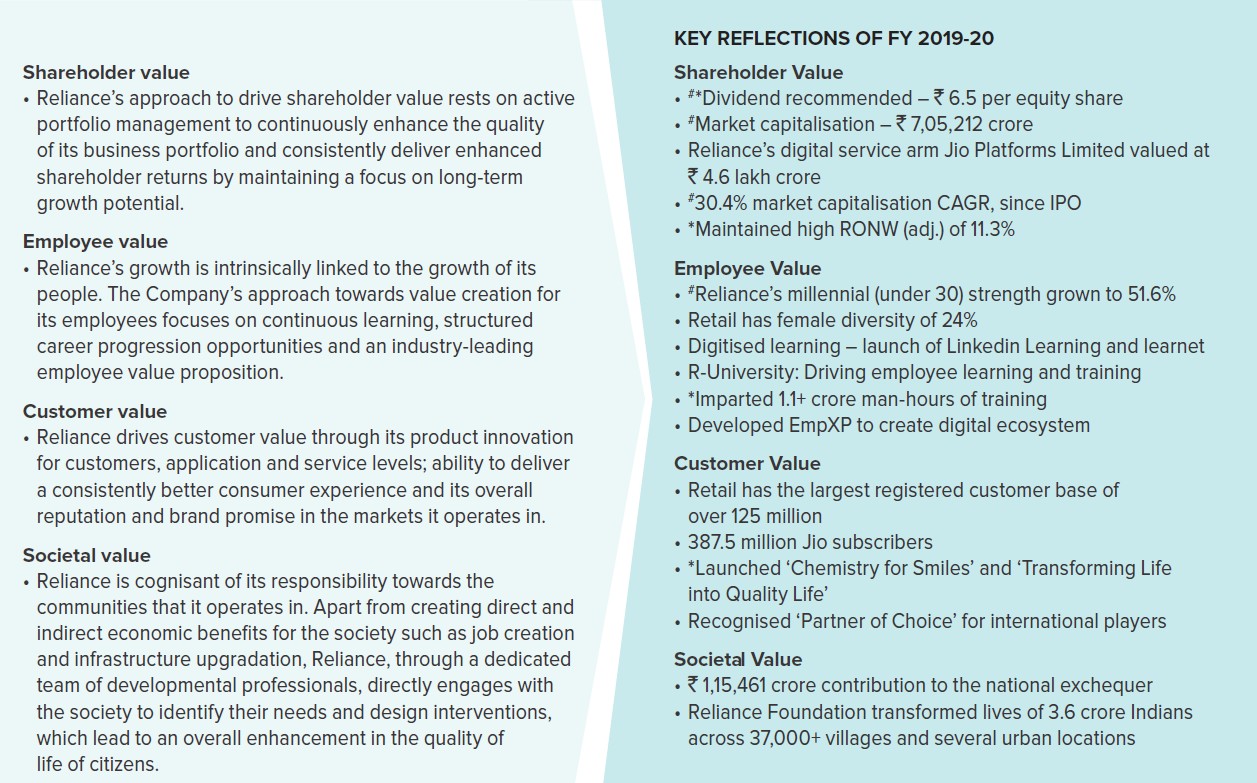
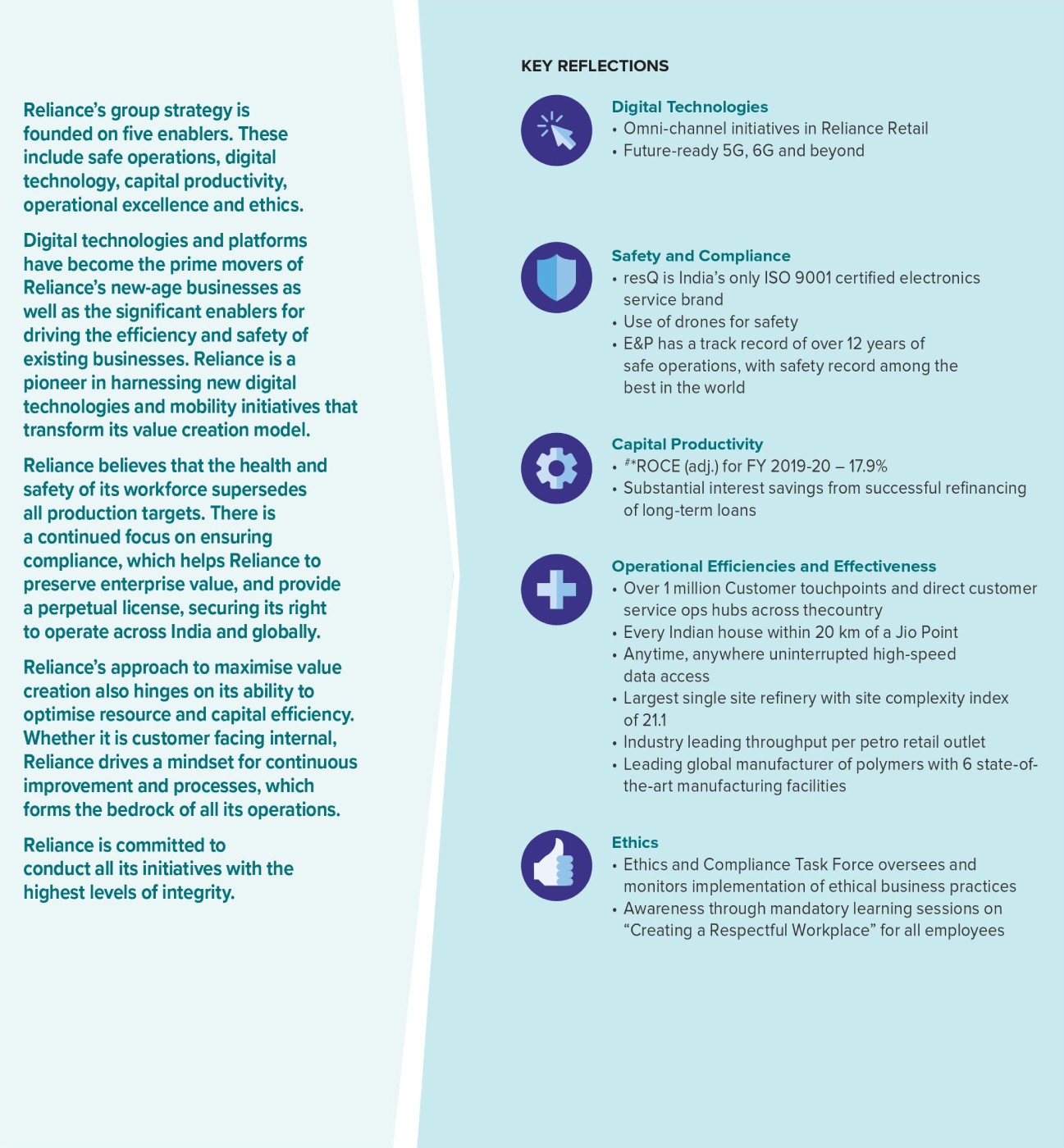
Reliance aspires to be nature neutral and has taken a holistic and climate conscious approach to development.
Reliance is integrating climate related aspects into its overall decision-making process across different levels, including risk management, governance, performance management and the overall business strategy. The consumer businesses, have utilised leading technologies thus minimising waste and maximising resource efficiency. Digital Services has proactively implemented energy efficiency measures such as the use of Lithium Ion batteries, HVAC systems and renewable energy sources across sites and through its indirect impacts, enabling a low carbon future. Across consumption baskets, Retail has deployed responsible waste management and reduction strategies. Retail’s efforts in e-waste management have enabled it to receive Extended Producer Responsibility (EPR) authorisation from CPCB.
Reliance supersite, Jamnagar is a beacon that exemplifies the tenet of eco-innovation, and demonstrates how processes can consume less water. It is also making big strides in contributing to India’s clean energy transition and enabling a circular economy. Utilising bottom-of-the-barrel crude to generate non-conventional energy options is enabling conservation of natural resource and minimising the emission intensity. Reliance state-of-theart supersite is designed to generate less waste and emissions. Reliance is also India’s largest PET recycler, recycling two billion bottle every year, and creating high-value products from waste such as roads, apparel and more.
Through products that are eco-efficient, Reliance has helped its consumers reap the benefits of its technological prowess.
UN’s Sustainable
Development Goals
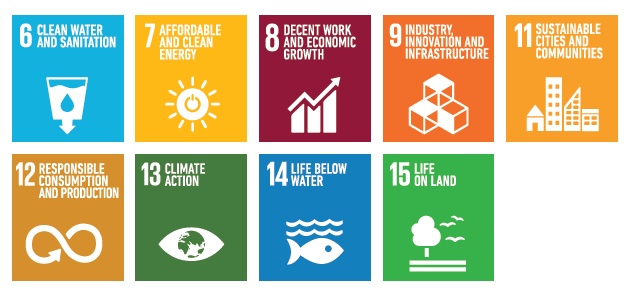
Material Topics
Other frameworks referenced
API/IPIECA, UNGC, WBCSD,
GHG Protocol, TCFD, Natural
Capital protocol, UNGP,
NVG-SEE, NGRBC, TPI
National Missions

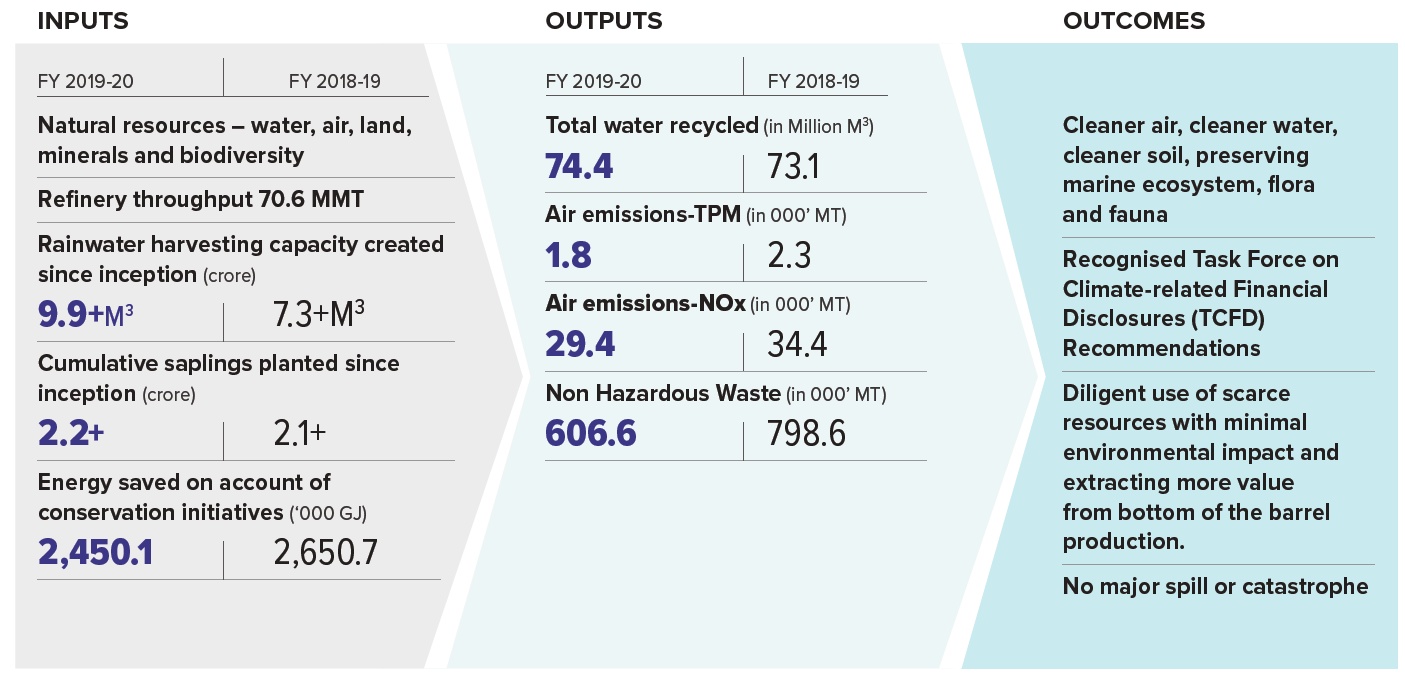
As a responsible organisation, Reliance believes in creating value for the society it operates in. Throughout the years Reliance has made conscious efforts to improve its performance on energy and water footprint and created value for society.
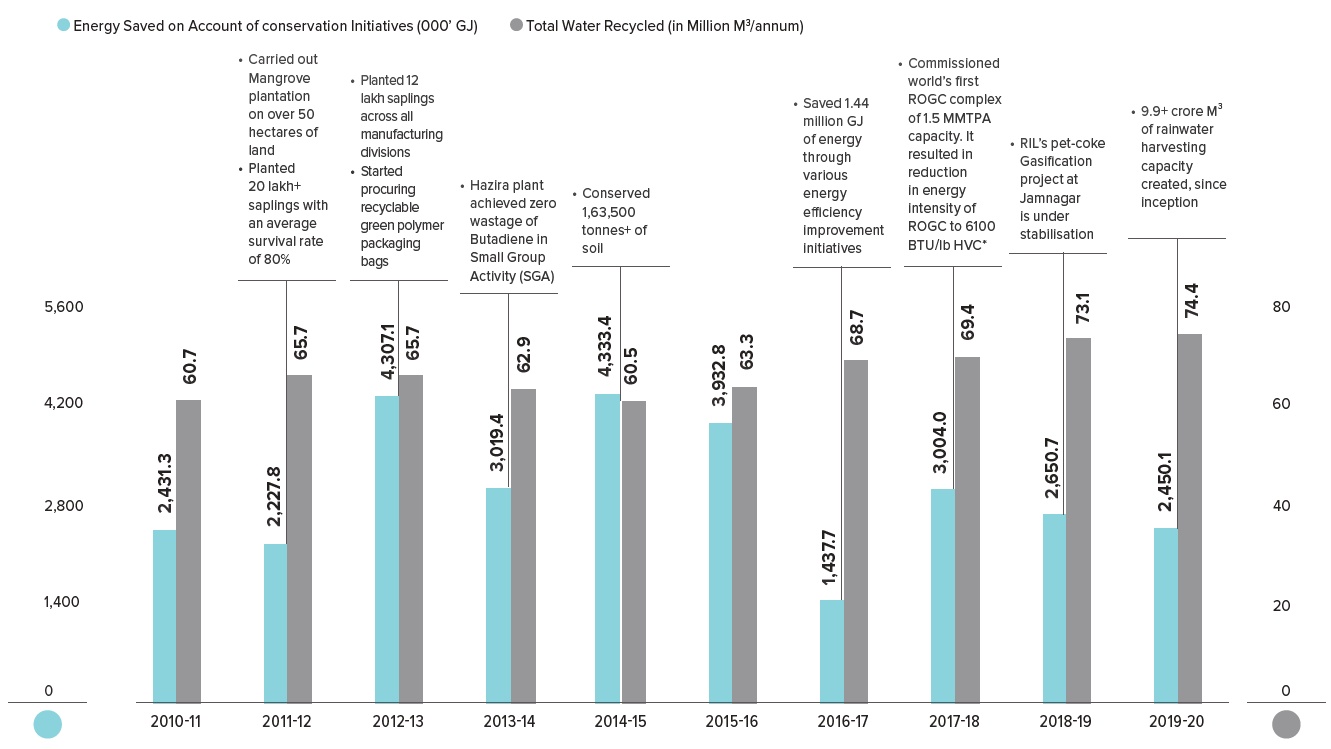
| Goals | Highlights of FY 2019-20 |
|---|---|
|
CLEAN ENERGY |
|
|
MANAGING ENVIRONMENTAL IMPACTS |
|
|
WASTE MANAGEMENT |
|
|
WATER MANAGEMENT |
|
GOVERNANCE OF NATURAL CAPITAL MANAGEMENT AT RELIANCE
Manufacturing locations prepare environmental and sustainability action plans, as part of their Annual Operating Plan. The progress of implementation of such plans are regularly reviewed at site level and by the ‘Environmental Compliance Review Committees’, every quarter. These plans and their status of implementation are further reviewed and assessed by the group Safety and Operation Risk (S&OR) team. The S&OR team present the performance and initiatives to the Board every quarter. Health, Safety & Environment (HSE) Board Committee monitors and ensures the highest level of environmental, health and safety norms within the company.
Reliance strives to improve its environmental performance continuously with enhancement in its current practices and implementation of management systems across all locations. The Company’s aim is to promote ‘Nature Neutral’ practices across its operations and value chain
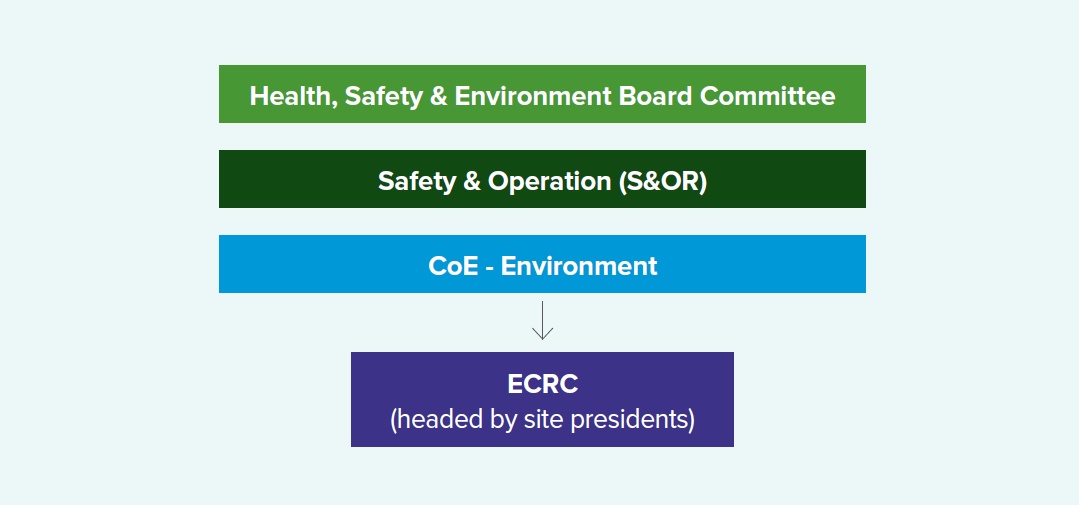
MANAGING NATURAL CAPITAL – towards a better planet
| Focus Area | Aspect | ||
|---|---|---|---|
| Philosophy adopted | RIL stewardship | Impact created | |
| CLEAN AIR |
|
|
|
| CLEAN WATER |
|
|
|
| PREVENTING SOIL CONTAMINATION |
|
|
|
| PRESERVING BIODIVERSITY |
|
|
|
| DILIGENT USE OF SCARCE RESOURCES |
|
|
|
| DIGITISATION |
|
|
|
Reliance remains focused on its main objectives of furthering statutory compliances and improving the organisation’s environmental performances through sustainability initiatives. The compliance systems and processes continue to be strengthened with rigorous internal and external audit processes and review by Environmental Compliance Review Committees. Reliance’s initiatives have been recognised by various domestic and international agencies. Reliance aligns the organisational level environmental performance with UN Sustainable Development Goals and prepare environmental sustainability plans to achieve these objectives. The thrust areas in the sustainability drive are reduction of freshwater consumption, resource conservation, GHG emission reduction and increase in green cover.
During the year, these efforts were rewarded when
ENERGY EFFICIENCY
At RIL, energy management encompasses energy related technologies, systems, tools, standards, best practices and procedures and also the supporting business processes and organisational structures. Cost-optimal investment into energy efficient technologies, coupled with supporting organisational and governance practices meets the challenge of energy savings and reduced production costs while maintaining product quality, safety and desired production volumes. At Reliance, the consideration towards cleaner air is built into each stage of business operations viz; (a) strategic decision making, (b) process design and later (c) continuously improving efficiency through its operational life.
STRATEGIC INVESTMENTS
DESIGN STAGE
The Company’s initiatives on clean technology, energy efficiency and renewable energy include:
OPERATIONS STAGE
RIL incentivises and celebrates ideas pertaining to energy conservation in company wide forums like Mission Kurukshetra and focused annual event like energy conservation week.
PERFORM ACHIEVE AND TRADE TARGETS
Seven manufacturing locations of RIL have been given specific energy consumption targets under Perform, Achieve and Trade scheme by Government of India. These include, chlor-alkali unit at Dahej, Jamnagar refinery and petrochemical units at Dahej, Nagothane, Hazira and Vadodara and textile unit at Naroda. RIL is currently working with Bureau of Energy Efficiency (BEE), Ministry of Power, for closure of Perform, Achieve and Trade Cycle II.
Energy conservation / Resource Conservation
OBJECTIVE
Energy conservation by reducing the load on chillers
CHALLENGE/SITUATION
For Reliance Jio Infocomm Limited site operations, Heating, Ventilation and Air Conditioning (HVAC) system plays major role in total energy consumption. Precision Air conditioners and Chiller system along with air handling units are installed in server rooms to maintain the desired temperatures and ventilation.
Details: Hot Air Aisle containment inside the server rooms are installed for achieving more efficiency for Precision Air Handling Unit (PAHU).
IMPACTS
Faster cooling, improved ventilation
By implementing hot aisle containment, hot air in the server room moved in upward direction and provided clear separation between cold and hot air. This has improved overall thermal performance.
This has improved overall thermal performance by reduction in numbers of PAHUs and lowering carbon emission.
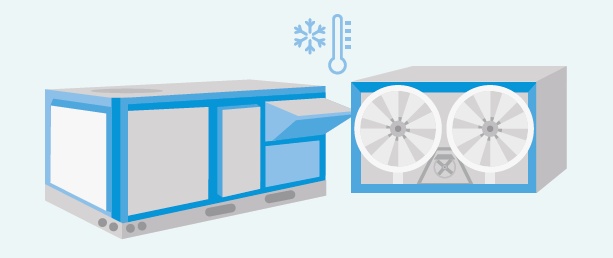
To set organisational boundaries for consolidated GHG emissions, RIL has utilised the operational control approach for the various entities covered under the Report. Accounting of GHG emission at RIL is based on its group level internal standard which is based on standards and guidelines issued by GRI, WRI/WBCSD, IPIECA and ISO 14064.
RIL has registered eight Clean Development Mechanism (CDM) projects with the United Nations Framework Convention on Climate Change (UNFCCC). These projects are related to energy efficiency, use of renewable energy and cleaner fuels. RIL has built in-house capacity to develop CDM projects and obtain the registration and issuance of the same in the form of Certified Emission Reductions (CERs) from the UNFCCC.
GHG EMISSION REDUCTION
The climate change mitigation strategy and energy conservation initiatives implemented by the RIL team help reduce GHG emission of the organisation’s operations. RIL endeavors to adopt the best available technology and equipment in its operations, entailing least energy consumption. The dedicated energy teams across the manufacturing locations continuously work towards reducing specific energy consumption. These initiatives result in reduction of GHG emission from RIL’s operations. Additionally, the renewable energy projects also help achieve significant GHG emission reduction. During the year, the Company installed 52kW roof top solar panels at Patalganga manufacturing division. A total GHG reduction of 351.4 ktCO2e was achieved due to various energy conservation and renewable energy initiatives by the Company.
REDUCTION IN FUGITIVE EMISSION
RIL practices ‘Leak Detection and Repair’ programme across all its major sites to prevent and reduce fugitive emission. The good preventive maintenance practices at RIL’s manufacturing divisions also help prevent fugitive emissions eg.installing of double mechanical seals in pumps and valves to reduce fugitive emission (PMD).
RIL continues to encourage inclusivity by celebrating environmental occasions and spread awareness on environment and conservation, within site and beyond the fence. During the year ‘World Water Day’, ‘World Environment Day’ and ‘Energy Conservation Day’ were observed with befitting programmes within site and in neighborhood areas.
AIR EMISSIONS
RIL regularly monitors emissions as a part of its environmental management plan. At RIL, stack emissions are regularly monitored at all manufacturing locations, for all the parameters stipulated in the ‘Consent to Operate’ including Total Particulate Matter (TPM), Oxides of Sulphur (SOX) and Oxides of Nitrogen (NOX). The continuous emission and effluent monitoring systems (CEMS) for emissions and discharges, installed at the refinery and petrochemical units, are now fully operational and real time data is being continuously transmitted to Central Pollution Control Board (CPCB). Due to RIL’s perpetual efforts to reduce air emissions from its operations, in FY 2019-20, absolute PM emissions decreased by 21.7% while NOx emissions decreased 14.6% compared to FY 2018-19.
RIL’s refinery and all manufacturing units are in compliance with the prescribed permissible limits given by CPCB/SPCB for air emissions, effluent quality and discharge. All manufacturing units are ISO-14001 compliant and have robust systems in place to monitor environmental performance. The Company regularly submits environmental monitoring reports to SPCB, and annually discloses environmental performance in its sustainability report. No show cause or legal notices were received from CPCB/ SPCB during the year FY 2019-20.
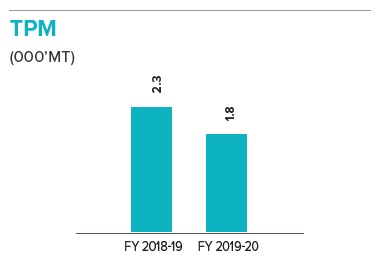
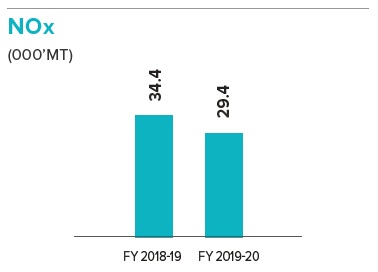
Water remains one of the most precious resources on the planet. In addition to minimising the use of freshwater, Reliance continues to widen its use of recycled water and treated effluent.
RIL continues to reuse treated effluent from the manufacturing plants for other application, besides horticulture purpose. Over the years, the treated effluent is increasingly being reused for cooling tower make-up and for firewater requirement. Water losses are being minimised and rainwater harvesting capacities are being augmented.
During FY 2019-20, Reliance took several steps across multiple manufacturing locations to reduce its water related impacts. In Vadodara Manufacturing Division (VMD), treated sanitary effluent streams are diverted as make-up water for cooling tower. In Nagothane Manufacturing Division (NMD) treated effluent is increasingly being used in fire water network and horticulture. In Patalganga Manufacturing Division (PMD) efforts have been taken to reduce steam and water losses in system. In Silvassa Manufacturing Division (SMD) AHU condensate is being collected and treated for reuse in the process. In Hoshiarpur Manufacturing Division (HoMD) multiple initiatives were taken this year like, installation of water efficient faucets and taps, reuse of treated wastewater for plant and domestic usage, among others. Overall rainwater harvesting capacity was increased in NMD, SMD and HoMD.
As a result of these efforts, in FY 2019-20 the total water recycled across all manufacturing plants was 74.4 million m3 as compared to 73.1 million m3 in FY 2018-19. Total water recycled has increased by 1.8% compared to previous year. RIL ensures that all wastewater generated is treated and meets all state and central regulatory requirements.
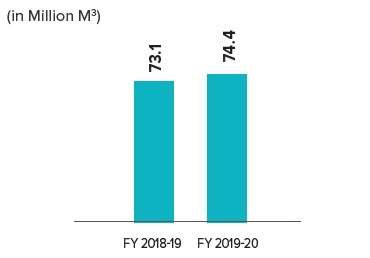
RIL focuses on using resources as efficiently as possible and simultaneously works towards minimising emissions and waste generated. The Company ensures that all waste is sent to government-authorised disposal agencies. Effluents generated are treated to meet the most stringent state and central regulatory requirements. RIL has undertaken initiatives such as converting the organic waste into ‘bio-manure by vermi-composting method, thereby reducing the waste disposed. RIL also undertakes stringent monitoring measures to prevent spills during storage, handling, and transportation of materials. During FY 2019-20 the hazardous and non-hazardous waste disposed from RIL’s hydrocarbons operations were 92.4 kT and 606.6 kT respectively.
RIL sends its hazardous waste generated in its manufacturing units for co-processing as alternate fuels and raw material (AFR) in cement industries. Manufacturing locations, namely HMD, DMD and VMD, continue to utilise the waste generated at the locations, for co-processing in cement industries. The main projects undertaken during the year include; utilisation of plastic waste in 40 km road resurfacing project (NMD), installation of anaerobic digester for disposal of degradable waste (DMD), installation of volute machine to reduce quantity of ETP sludge (HoMD), and usages of new modified adsorbent to NGCT to get higher life with consequent reduction in waste disposal frequency (PMD).
RIL regularly monitors impact of its operations on the surrounding ecosystem by conducting periodic environment impact studies through external experts. It also carries out environment impact assessments for all greenfield and brownfield projects to understand and mitigate their impacts on the surrounding environment and ecosystem.
Reliance has initiated an evaluation of its environmental aspects using the Natural Capital Protocol published by the Natural Capital Coalition.
RIL’s efforts for in-situ preservation of ecosystems prompts the organisation to improve green cover at its locations. To promote biodiversity, more than 2.2 crore saplings have been planted across all RIL sites till date. Apart from this 2,600 acres of green belt has been added across all manufacturing divisions since inception.
Marine litter clean-up at Versova beach and volunteering program
OBJECTIVE
Reduce and remove plastic littered into the oceans, which creates risks for marine ecosystems and life under water.
ACTION
RIL is working with Afroz Shah’s team to clean up the Versova beach in Mumbai. RIL sponsored BobCat to expedite retrieval of solid waste off the beaches and from the oceans. This one-of a kind solution has replaced the need for manual clean-up. The machine clocks 4,000 man-hours of work in an eight-hour shift and can work in both dry and wet weather. RIL encouraged employee volunteers, contributing 1200+ hours in regular clean-up activities on clean of Versova beach.
IMPACTS
More efficient and systematic clean-up recovering about 8500 MT of solid waste in 12 months.
OUTCOME
Beach cleaned of non-biodegradable waste from the ocean and saw return of a thriving ecosystem including seeing Olive Ridley turtles on the beach after a gap of 20 years.
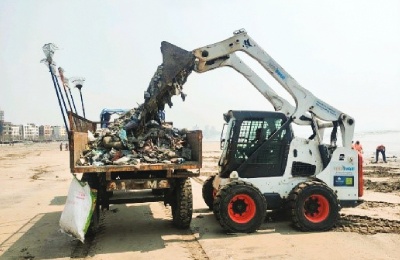
Given the many ecosystem services that nature provides, the organisation is committed to factor in its environmental impacts on wider societal wellbeing.
The concept of natural capital and measuring, valuing and accounting for it – is evolving, hence Reliance have taken various initiatives to develop understanding about Natural Capital, including methods for its measurement, valuation and to learn about its applications. Natural capital assessments provide extra insights which enable Reliance to understand RIL’s impact and dependency on the environment to help us manage it in a suitable way and take informed decisions.
Reliance is making conscious efforts to adopt the elements of Transition Pathway Initiative (TPI) into its business strategy. The company uses its three line of defense model for continuous and real-time assessment of climate related risks. As part of these efforts, the Company measures and monitors its GHG emissions, identifies emission hotspots and develops strategies to mitigate its GHG emission footprint. Through, its Research and Development efforts Reliance is driving development of climate friendly technology solutions such as, alternate energy sources like Fuel cells, bio fuels etc. Reliance is also consciously investing in renewable energy and energy efficiency technologies to mitigate the GHG emissions at an organization level. These include many ingenious solutions developed by employees at plant level. One example of which was to utilize methane in waste water in PTA plant at Dahej which reduced the dependency of the plant on conventional fuel.
Monitoring Environmental Footprint
ACTION
In the last assessment carried out in FY 2017-18, Hazira plant conducted impact assessment on biodiversity and marine ecosystem to determine ecological sensitivities, a total of 108 plant species were observed in the study area comprising 47 species of trees, 27 species of shrubs, 31 species of herbs and grass and 3 species of climbers Among the faunal species, herpetofauna were represented by 26 species, avifauna by 140 species and mammals by 8 species. A MoEFCC approved laboratory is also engaged in marine environmental monitoring assessment, which comprised a total of 12 water quality parameters and 5 biological parameters at 23 sub-tidal sampling locations. Additionally, 9 sediment quality parameters were tested at 8 inter-tidal sampling locations.
OUTCOME
The results of the study were compared with data sets since 1983 to create an overall assessment of the ecological status. The balance within biodiversity and marine ecosystems was maintained with minimal environmental impact. RIL also develops green belts which enhances flora & fauna
RIL’s refineries are among the top quartile performance, according to the Solomon’s energy intensity index. RIL’s key strength identified as per Solomon study are energy efficiency, operational availability and utilised processing complexity. Since the installation of the gasification, paraxylene and Refinery Off-Gas Cracker (ROGC) plants, the Jamnagar refinery is pegged to be amongst the highest conversion global refineries with no products that can be classified as ‘bottom-of-the-barrel’.
To improve its raw material productivity, RIL has taken various measures such as recycling of slop oil and oily sludge, conversion of organic waste into organic manure and bio gas, recycle of spent catalysts through authorised re-processors. In last few years, Reliance has put conscious efforts to utilise more and more recycled PET bottles as raw material for its petrochemical operation and emerged as the single largest recycler of PET bottles in India. With R&D teams the business has also launched innovative products like R|Elan and ReRoute made from waste plastics. Raw material supply in bulk tankers leading to reduced packing material, handling, contamination and savings to customers.
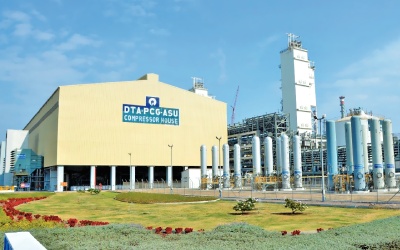
Jamanagar petcoke gasification – one of the largest ‘Clean Fuel’ projects in world
Reliance continually explores new ways to make its operations more efficient by putting technology to use for direct energy savings, increasing renewable energy sources and establishing a culture of digital collaboration that lessens the need for travel.
Jio has created a massive digital ecosystem for a millions of Indians. By connecting the unconnected, the platform company doesn’t just provide world class fixedmobile converged connectivity, but also digital solutions across the customer life cycle. Digital solutions that enable seamless video conferencing like facilities thereby reducing the need to travel and avoiding travel emissions. Advanced technologies and the digital economy enable a reduced footprint.
Enabling Work from home, Learn from home & Health at Home for Indians, Jio has launched JioMeet, an integrated connectivity solution.
Moved from Physical to Digital
Be better connected with Jio and reduce the need for travel
Enhancing the quality of life through digital commerce facilities
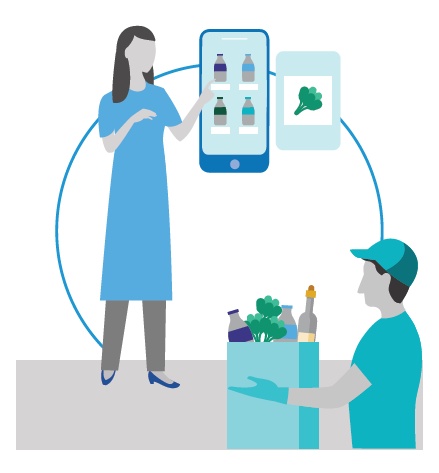
Reliance believes the highest act of value-creation lies in saving human life, ensuring human health, and enhancing human wellbeing and happiness. The drive to solve societal challenges, the passion to perform and the dedication demonstrated every day by our people has made Reliance one of the largest conglomerates in India. The scale of Reliance’s operations lead to creation of indirect employment - over 50 lakh people.
While the world grapples with COVID-19 pandemic, we at Reliance have brought together all our strengths across Reliance Foundation, Retail, Digital Services and Hydrocarbons to do more for our country. To ensure our employees and families are protected through the crisis, we have set out several health and hygiene measures including national emergency response, JioHealth Hub for virtual doctor consults, guidance resources on mental, emotional, psychological and nutritional health, to name a few. Most of these services extend beyond our employees and are for the nation. Additionally, we truly appreciate our employees on the frontline – Reliance Foundation Hospital’s doctors & nurses, Retail store managers and employees, telecom infrastructure teams and all other essential services’ employees who have served our nation in times of need.
With unity in diversity of skill, ability, gender and generations, we have built industry leaders across Retail, Digital Services, RIL, Media and Foundation. Our work culture revolves around our values, and the themes of innovation, diversity & inclusion, human centricity and embracing the future with boldness. This is bolstered by our approach to exponential learning opportunities which is augmented by a digitally connected ecosystem.
We believe in empowering our people with the best available facilities and developing them through the best-in-class learning opportunities to build a workforce ready for the future.
UN’s Sustainable
Development Goals
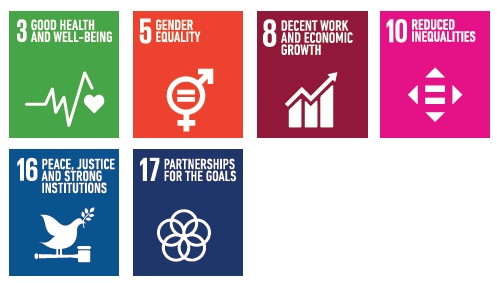
Material Topics
Other frameworks referenced
API/IPIECA, UNGC,
NVG-SEE, NGRBC, UNGP
National Missions

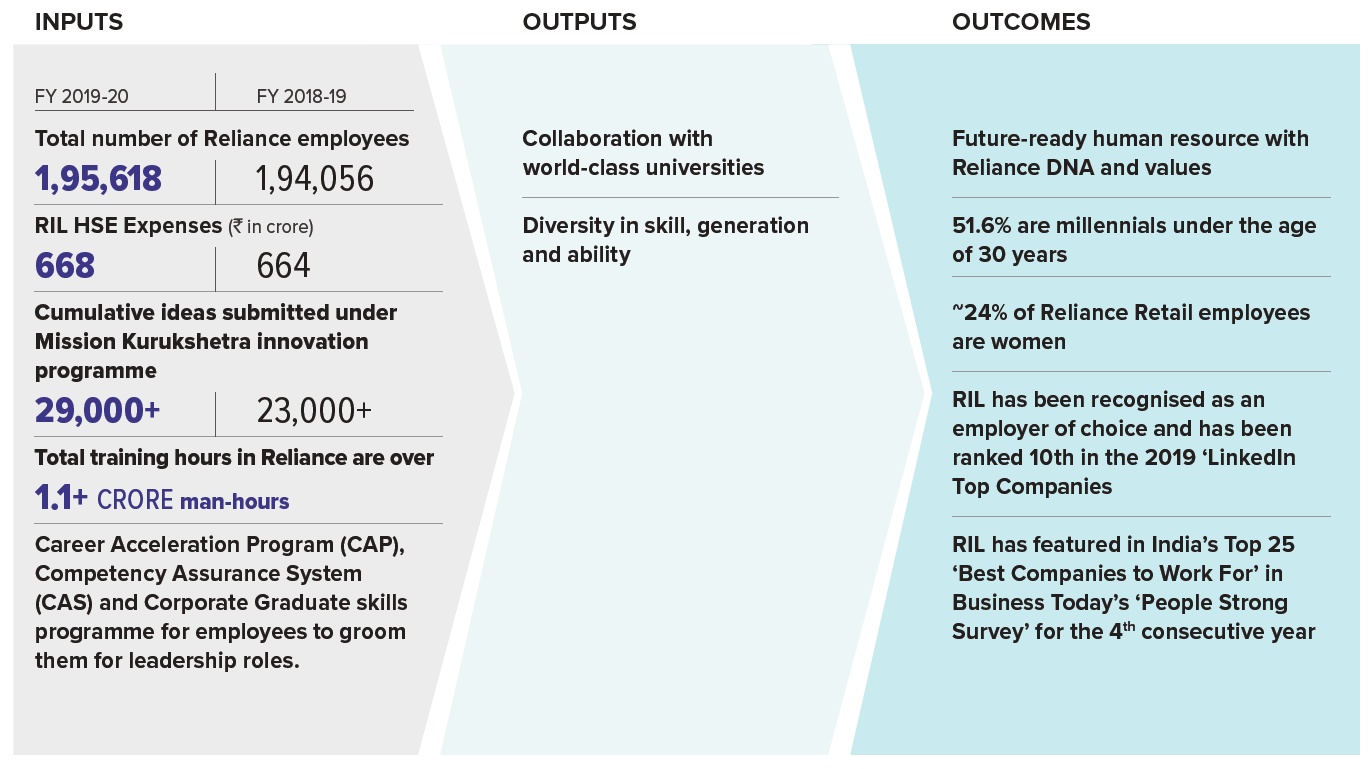
Whether it is in the form of employment opportunities or in the form of wellbeing of its employees, Reliance has put conscious efforts to deliver increasing value.
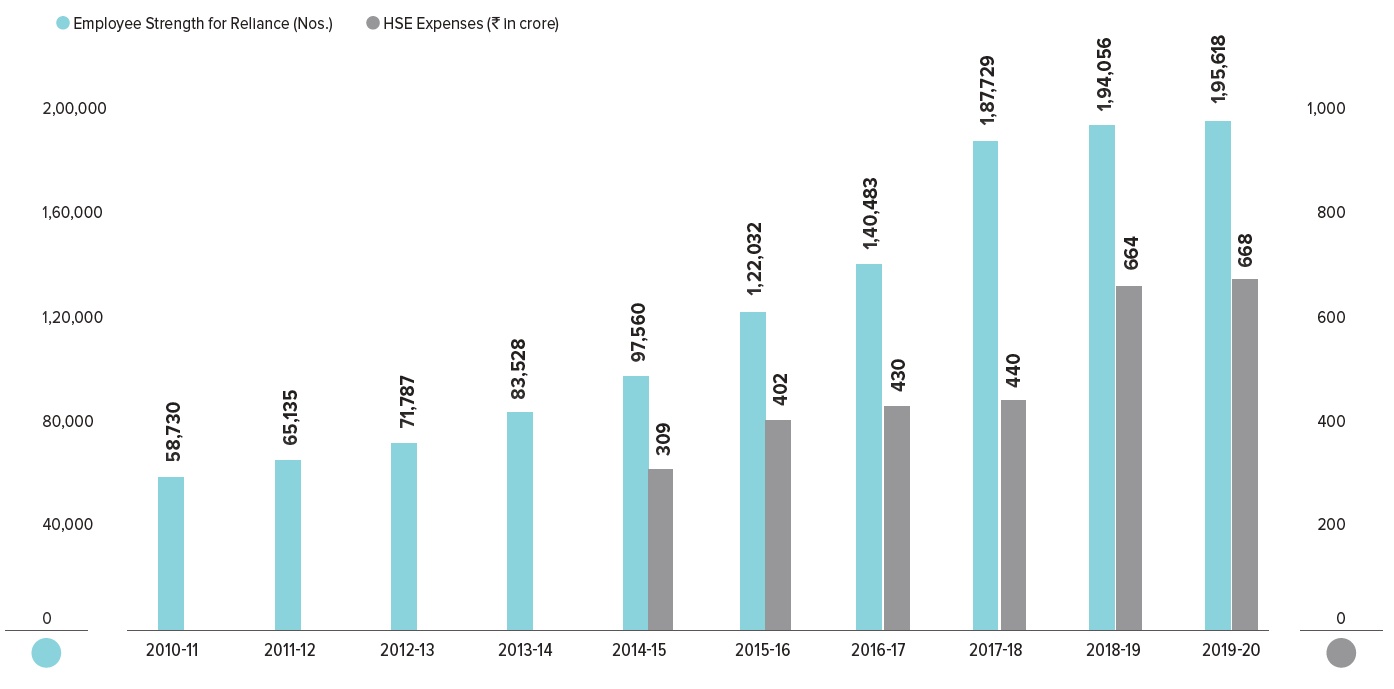
| Goals | Highlights of FY 2019-20 |
|---|---|
|
SAFETY |
|
|
OPPORTUNITY AND DIVERSITY |
|
|
HEALTH |
|
Reliance, is committed to attracting the best talent, empowering them with opportunities for continuous learning and, developing an organisational culture wherein every individual personifies the 3Ps – Purpose, Passion and Perseverance. The benefits of competitive advantages and the synergies that exist between them are only realised through the 3Ps. The result is a workforce with unmatched capabilities, anchored in a culture of grit and excellence.
“Pursue your goals even in the face of difficulties and convert adversities into opportunities”
Shri Dhirubhai H. Ambani
Staying true to vision of the Founder Chairman, Reliance employees are encouraged to be entrepreneurs and architects of their own destiny and embody the “Founder-Owner” mentality. “Ownership Mindset” is also enshrined as one of Reliance’s six core values. The Company ensures the right conditions for its people to grow and flourish while living the core values and behaviours.
RIL’s objective is to assess and continuously improve the state of employee engagement across hiring, onboarding, performance, development and retention in an ongoing manner to enable continuous feedback and improvement of employee’s experience.
BRING YOUR FAMILY TO WORK
Bring Your Family to Work (BYFW) is an initiative for employees to showcase their workplace to their family members. The fourth edition of the BYFW witnessed participation from over 21,400 employees and family members, a 50% jump from the third edition of the event. BYFW 2019 showcased how. The “New Reliance for a New India” theme was incorporated across stalls and displays. 3,000 saplings were given away as souvenirs by Reliance Foundation to raise awareness on sustainability. The event also garnered 25.23 lakh impressions.
RELIANCE FAMILY DAY
Reliance Family Day (RFD) commemorates the birth anniversary of RIL’s visionary Founder Chairman, Shri Dhirubhai Ambani, through many activities. This year, RIL Chairman and Managing Director Sh. Mukesh Ambani said, “We have to always remember the values of our Founder, Sh. Dhirubhai Ambani. For him, purpose was most important. We always say that for all of us at Reliance, it is India first; Reliance, second; and self, last. I am sure that many generations of Reliance will carry this tradition forward.” In 2019, over 3 lakh people attended the celebrations across various locations.
RECOGNITION
The Company has received several awards and accolades in recognition of its people practices:
Rankings:
LinkedIn WIWTW – Top 10: RIL has been recognsed as an employer of choice and has been ranked 10th in the 2019 ‘LinkedIn Top Companies: Where India Wants to Work Now’ list, the only non-tech / non-IT company to make it to the top 10 companies in the list.
BT Best Places to Work For – Top 25: RIL has featured in India’s Top 25 ‘Best Companies to Work For’ in Business Today’s ‘People Strong Survey’ for the 4th consecutive year.
EMPLOYEE ENGAGEMENT DURING COVID-19
As India’s largest private company with almost all of its businesses in the “essential services” sectors, Reliance recognised the special responsibility it bore to support the nation and fellow citizens through the COVID-19 crisis.
The evolving situation around COVID-19 was monitored closely and the resulting safety, social, and economic risks posed by the crisis were evaluated on an ongoing basis. Right from the beginning, the leadership pushed towards extensive safety protocols and mandatory practices across India to ensure all efforts were made to keep Reliance COVID-free.
Employee and Family Wellbeing
New ways of working
Crisis Communication Practices
The Company issued advisories, guidelines, and guidance documents regularly to encourage early adoption of safety measures and enable business continuity. Communications were timely, accurate, consistent and prioritised the physical and mental wellbeing of all employees, contractors and family members.
The Company also developed a comprehensive compendium “RIL Info Pack on COVID-19” and published on the internal employee portals including topics such as:
RIL endeavors to meet all internal talent requirements. It focuses on developing high potential talent pools by providing accelerated learning and growth opportunities. There are various initiatives taken by the organisation to achieve this, including on-the-job trainings, digital learning, coaching and workshops.
Some prominent Talent Management practices are:
DRONACHARYA – FE SKILL SCHOOL
Panel officer (PO) is a critical job role in the asset facing team. Hence it is imperative to create a strong talent pipeline of PO for continued business operations. The Dronacharya scheme trains Field Executive (FE) talent pool for the PO role and their entire competency assessment and assurance is completed during their FE job tenure.
WOMEN IN NIGHT SHIFT
For the first time in the history of Reliance, JMD has acquired permission that allow women employees to work in night shifts. This calls for multiple levels of preparation to create an enabling environment which was done seamlessly.
MDP PROGRAM IN COLLABORATION WITH IIM B
JMD has collaborated with IIM B in creating a customised Management Development Program (MDP) for identified future leaders with high potential. It’s a combination of classroom and action learning project with strong evaluation process through simulation and case studies. All the leaders who complete the course will be given higher responsibility to ensure maximum utilisation of the acquired competency.
The Employee Experience Platform (EmpXP) is an endeavor to create the dedicated digital ecosystem required to build human relationships and drive productivity. EmpXP facilitates continuous improvements by regularly soliciting employee feedback and uses advanced analytics to systemically generate insights that help leaders rethink the vision for the organisation.
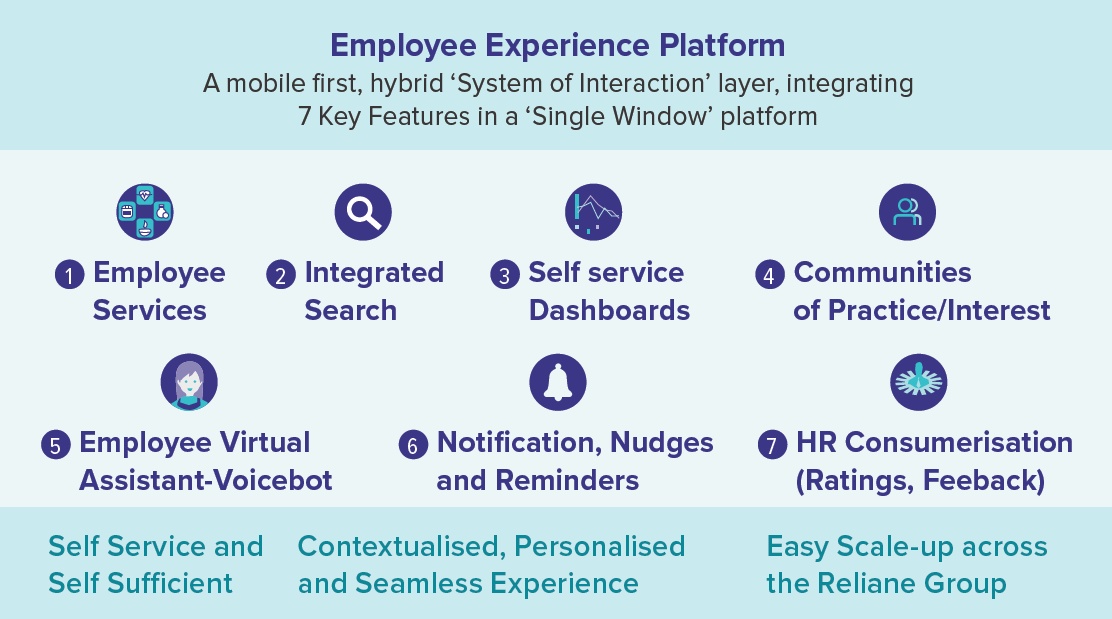
Roll-out across Reliance:
EmpXP has over 96,000 users across Hydrocarbons and Retail, and with the planned scale up in Jio, will cater to over 2 lakh active employees by the end of August 2020.
The Platform’s services have customised features based on differences in the business environments, deliverables and employee needs.
The platform continues to evolve and improve in an agile manner by collecting and incorporating the user feedback on every micro-service used by employees on a real-time basis. As of today, the average app rating stands at 4.53 (out of 5) from over 23,000 employee reviews.
Learning Platform
The EmpXP features an Integrated Learning Management and Delivery Platform that is augmented by an open source content authoring tool to enable businesses, teams, and subject matter experts to create their own content. It is powered by a search engine and an AI-enabled assistant for personalised recommendations based on demographics, history and preferences of learners in line with the content library.
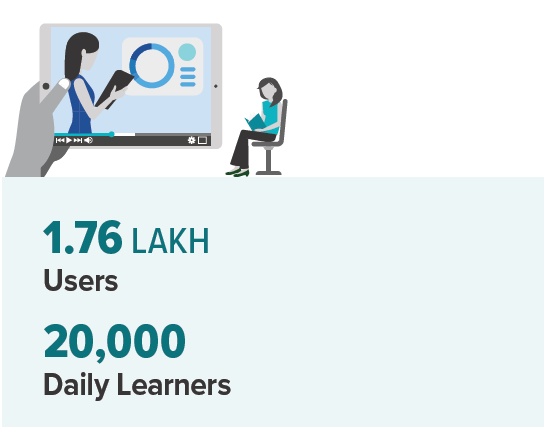
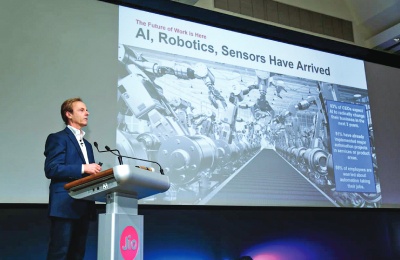
Global Thought Leadership with Josh Bersin
“Reliance and Reliance Jio have created a world-class work experience for their employees. Through careful design, innovative technologies, and an amazing culture, Reliance Industries sets a standard for other organisations around the world.” - Josh Bersin, Author and HR thought leader, mentioned at Global Learning and Talent summit hosted by RIL.
Diversity and Inclusion (D&I) at Reliance broadly focuses on three areas – Gender, Ability and Generation. RIL recognises the intersection among these three areas and others such as work and life experiences and socio-economic context. Under the guidance of Ms. Isha Ambani, RIL has developed a Group Diversity & Inclusion Charter which follows a 5E framework to support a more inclusive workplace for all employees.
RIL has developed a maternity support programme with reasonable adjustments such as reserved parking for pregnant women employees and employees with disability, specific learning sessions and Employee Resource Group (ERG) for new parents. The leave policies include 182 days of Maternity Leave followed by 6 months of half day leave policy for new mothers, 84 days leave policy for adoptive parents and commissioning mothers respectively. RIL also provides 5 days of Paternity Leave. Reliance undertakes pro-active measures such as 24*7 toll free helpline for women, child care facility and self-defense workshops on a regular basis.

International Women’s Day (IWD) 2020 was celebrated across RIL’s sites and offices through a host of events. The day culminated with Ms. Isha Ambani launching the coffee table book, The Women of Reliance – 101 Perspectives, featuring a hundred and one reallife stories authored by women from across Reliance. Addressing the audience at the event, Ms Ambani said, “I am proud of and grateful to the women at Reliance who have fueled the growth of this organisation. In our offices and plants, on shop floors and in stores, leading from the front and working behind the scenes – the women of Reliance have shown that diversity is not just a business imperative, but also a huge business advantage.”
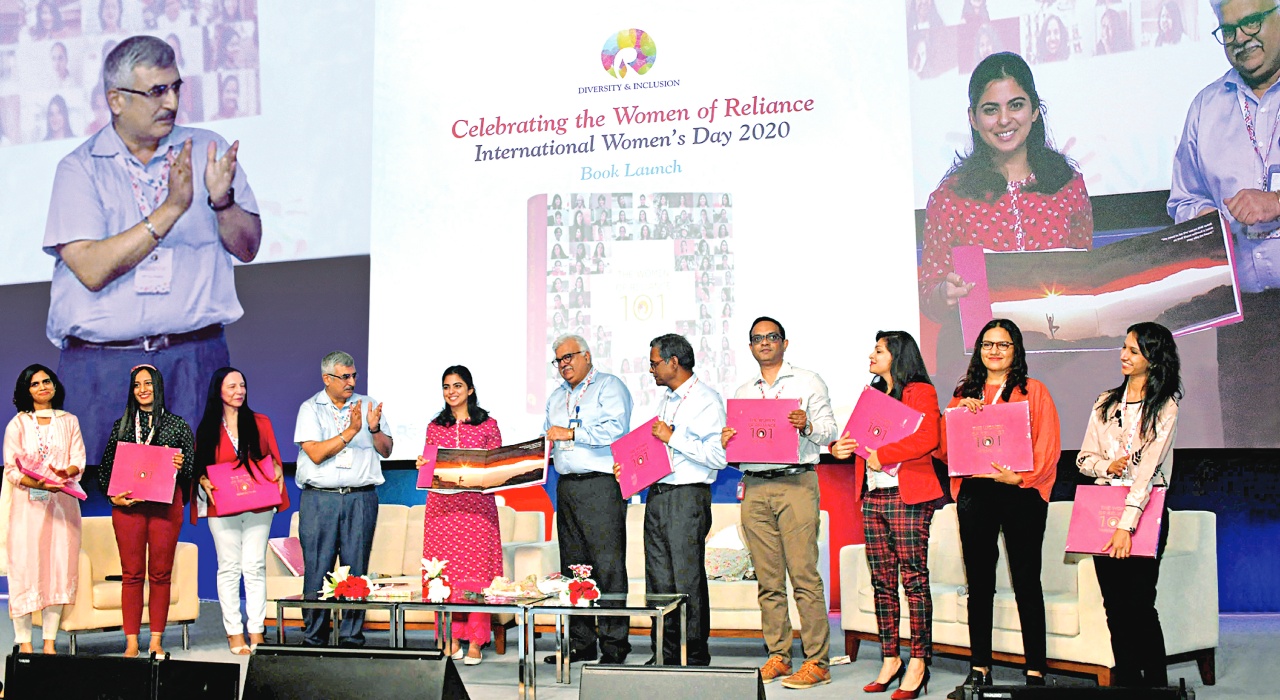
Ms. Isha Ambani launching the coffee table book, ‘The Women of Reliance – 101 Perspectives’
NEW-AGE RETAIL INITIATIVES
Reliance Retail, believes in echoing the ideology of being a diverse yet inclusive organisation. The customer base is diverse and a diverse team is needed to penetrate to the mind-set of a diverse customer base. A top-down approach was adopted to demonstrate the spirit of inclusion and diversity. As a starting point, around 200+ senior leaders, have been sensitised on “Unconscious Biases” as biases often serves as blockages to an inclusive workplace. As a supporter of mindful leadership, Reliance Retail developed the “WE Women Leaders” Program which focuses on mentoring women. In Reliance Retail, there has been focus on several women initiatives to foster culture of gender equality and inclusion.
There is a format-wise charter for stores and corporate with specified targets around gender equality. An increase of 3% and 6% in the women headcount percentage at corporate and stores respectively is being targeted.
Dialogue with Senior Women Leaders
ACTION
Ms. Isha Ambani hosted a Networking meet “D&I Dialogue with Senior Women Leaders” across the Reliance Group. The purpose of meeting was to meet the senior women leaders and onboard them on the gender inclusion efforts.
OUTCOME
The women leaders volunteered to support the inclusion agenda and help drive it within their roles, businesses and organisation at large
Panel Discussion with external experts
ACTION
Panel discussion with external D&I experts to create awareness on inclusion, leading to questioning biases, thereby creating a safe workplace.
OUTCOME
The session generated positive feedback and also resulted in more employees wanting to contribute to the inclusion agenda.
Saksham
The “Saksham” program believes in capabilities of the differently-abled and provides them a platform with equal opportunity at Reliance Retail grocery stores.
ACTION
Identifying Sourcing Channels: The right people with basic understanding of work culture and ability to adjust to the workplace were on-boarded through avenues such as tie-ups with NGOs, referral programs and employee ambassadors.
Role Identification and Training Process: Suitable roles for the differently-abled staff were identified through initial shortlisting, completion of On the Job Training (OJT) program and completion of ‘digital work’ training modules.
Sensitisation: Employees and customers were sensitised through a variety of training materials.
OUTCOME
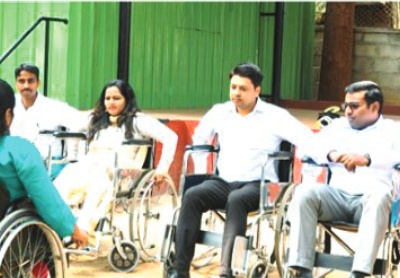
RIL’s expansion into diversified segments requires specialised skill sets requiring a learning environment that is accessible and automated. During FY 2019-20, Reliance imparted 1.1+ crore man-hours of training to its people across the Group.
The organisation focusses on building two distinct set of capabilities, namely:
A comprehensive exercise to identify business and function-specific skill requirements has been conducted in partnership with respective apex leadership teams. Across 3 businesses and 8 functions, 251 current and 148 future skills were identified to be incorporated into learning curricula for FY 2020-21.
BEHAVIOURAL AND LEADERSHIP CAPABILITY BUILDING
Through the ‘One Reliance’ approach to behavioral and leadership capability building, a comprehensive framework called as ‘Learning Trek’ was introduced in FY 2018-19.
In FY 2019-20, Learning Trek delivered substantial results in the four focus areas that were chosen – Base Camp for new hires (Learning by Mandate), Ascender for soft skill capability building (Learning by Choice), Great People Skills for people manager capability building (Learning by Role), STAR Trek for leadership development (Learning by Invitation). It also expanded its scope to include 2 additional areas – R-Aadya (Diversity and Inclusion related Learning) and Digital Capability (Enhance our Digital Journey).
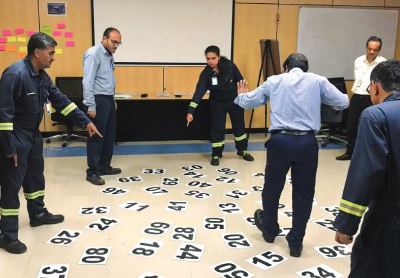
Innovative sessions as part of the R-Manager
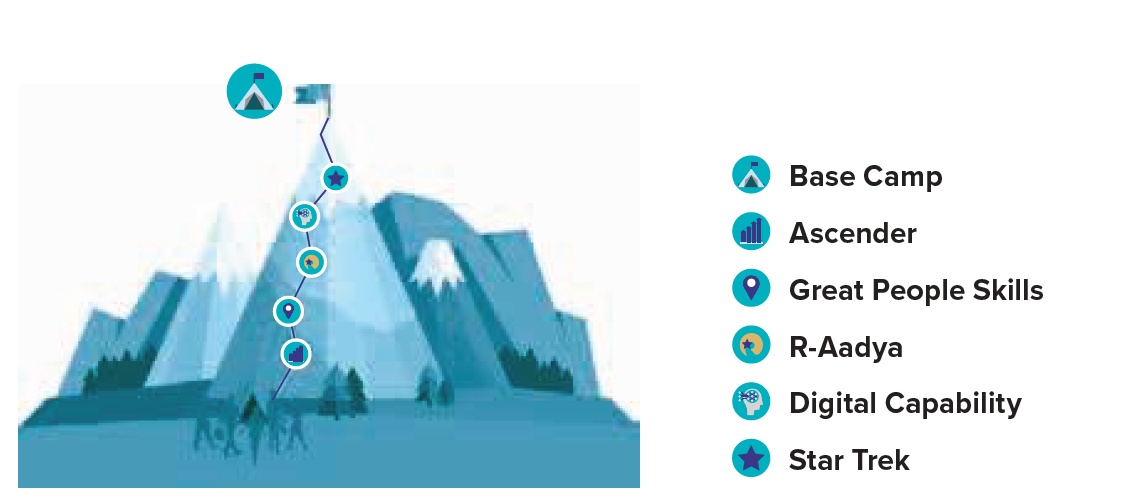
 BASE CAMP
BASE CAMP
Base Camp aims to strengthen alignment of new hires with organisational culture, processes and practices, thereby accelerating their productivity and time to job-readiness.
 ASCENDER
ASCENDER
It’s a buffet of interventions focusing on behavioural and soft skills development to facilitate ‘ascent’ towards career excellence.
 GREAT PEOPLE SKILLS
GREAT PEOPLE SKILLS
People manager capability building targets all 5000+ people managers across the organisation in line with the role requirements across the hierarchy of people managers.
 R-AADYA
R-AADYA
Reliance’s effort to build and foster talent across diverse employee groups is strengthened via D&I-focused interventions, such as R-Aadya (to develop women leadership in RIL), Inclusive Leadership (to generate awareness about unconscious bias), among others.
 DIGITAL CAPABILITY
DIGITAL CAPABILITY
This initiative aims at enabling platform way of working. It is planned as a comprehensive Organisation Development process that taps into all relevant elements like processes and practices, structure, metrics, rewards, and talent.
 STAR TREK
STAR TREK
STAR (Select Talent At Reliance) Trek offers leadership developmental opportunities to high caliber talent at Reliance. It also focusses on launching and institutionalising experience and exposure-based learning approaches.
DIGITAL LEARNING
Anytime, Anywhere Learning: RIL endeavors to enable learners to learn anytime, anywhere and on any device. On a continuous basis, the learning function invests efforts towards developing ‘Best-in-Class’ learning solutions in partnership with the ‘Learn and Grow’ Platform. In FY 2019-20, employees in Hydrocarbons accessed over 2 lakh hours of digital learning content.
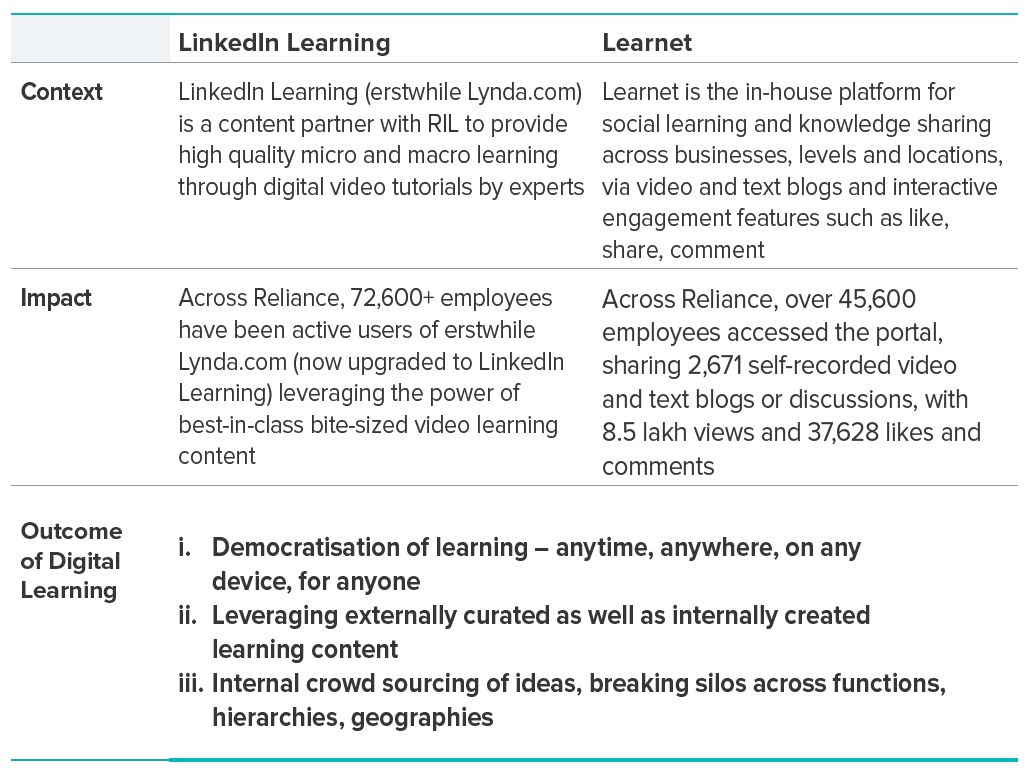
SPECTRUM 2019
Spectrum, RIL’s annual dedication to the culture of continuous learning and development, expanded as a learning and career week in its fourth year. The initiative witnessed around 25,800+ employees participating in a plethora of learning and development activities, all centered around the event theme: I’M IN – Involved, Invested, In-charge. It was a pan-RIL event that was held across all sites and locations. Some key events include interactive Experience Zones showcasing next-gen technologies, immersive sessions leveraging VR-based simulations, Speed-Mentoring sessions, Fire-Side Chat with Apex Leaders, an all-Reliance Quiz competition, Panel Discussions, IDP Workshops, Blog-sharing, among others. The key highlights were:
TRAINING & COMPETENCY ASSURANCE FOR SAFE & RELIABLE OPERATIONS
To ensure reliable operation delivery and safety competence amongst frontline staff, RIL has deployed a Competency Assurance System (CAS). Employees go through structured learning followed by a series of assessments and on-field tests. To ensure robustness of competency process, two lines of defense have been institutionalised for competency verification and process auditing by internally trained verifiers and auditors.
Manufacturing learning and competency teams have defined over 15,000 customised learning content, quizzes and task tests for different asset facing job roles and specific work areas. Over 7,000 asset facing employees including young graduate and diploma engineer trainees (GETs & DETs) have been enrolled into CAS program in last 2 years and over 5,800 employees have been fully certified for at least one role-area specific competencies and many more are in advanced stages of the assurance process.
L&D – Behavior Based Safety Program in E&P
OBJECTIVES
The program “Behavioral Based Safety” was designed to improve the organisation’s safety performance by addressing factors that are critical to building an incident free culture, where individuals take personal responsibility for safety.
ACTION
The training programs provided opportunities for participants to practice safety conversations and to give feedback to crewmembers on how their actions impact team safety.
OUTCOME
The flagship training program has helped E&P to enhance the safety culture and achieve critical milestone of zero incident for recent drilling projects and is geared up to ensure the same for all upcoming projects.
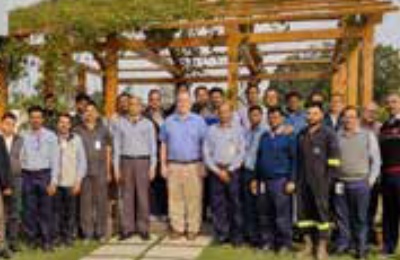
L&D – Workshop for Petro-Marketing
OBJECTIVES
The program “Behavioral Based Safety” was designed to improve the organisation’s safety performance by addressing factors that are critical to building an incident free culture, where individuals take personal responsibility for safety.
ACTION
The training programs provided opportunities for participants to practice safety conversations and to give feedback to crewmembers on how their actions impact team safety.
OUTCOME
The flagship training program has helped E&P to enhance the safety culture and achieve critical milestone of zero incident for recent drilling projects and is geared up to ensure the same for all upcoming projects.
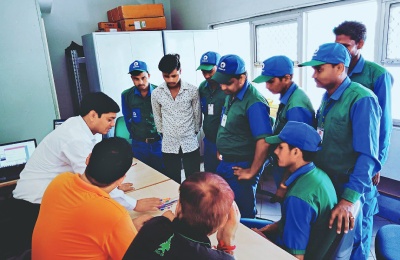
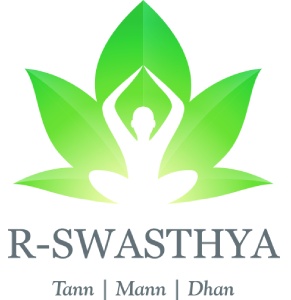
R-Swasthya was established with the objective to Endeavour, Encourage and Enhance holistic wellness in an engaging manner encompassing the physical, mental, social, spiritual and financial wellbeing of the employees and family members.
INITIATIVES IN FY 2019-20
Additionally initiatives such as Reliance Employee and Family Emergency Response Services (REFERS), Task Based Health Risk Assessment (TBHRA) and Change Agents of Safety Health and Environment (CASHE) continue to provide emergency services, ensuring occupational safety and promoting healthier lifestyles for all employees.
Reliance’s Health, Safety and Environment Policy reflects the importance of Human value, Safety & Operational Risk Management Principle and the Company’s Ambition to be a leader in the field of management of Health, Safety and Environment. To achieve safety and operational excellence, and to continuously improve the quality of Operating activities, Operating Management System (OMS) has been implemented across organisation.
The OMS defines a set of operating requirements and outlines a systematic way for businesses to deliver them. The OMS framework spells out “What” is expected and also provides “How” to meet these expectations in the form of practices, processes and procedures.
Risk management is at the heart of the OMS and implementation of standardised Risk Management process has brought in enhanced risk understanding right from Board to the Asset facing employees. An engrained process of learning from incident supports the identification of risk and barriers.
To provide necessary governance, documentation and HSE assurance, a fully equipped and well-qualified HSE and Process Safety organisation is in place at all locations. Safety and Operational Risk (S&OR) function is in place at the Corporate to bring in technical expertise and to give independent assurance. S&OR facilitates aligning the requirements of OMS with the Global standards like OSHA, API, NFPA.

R-Swasthya - 3 billion by Founder’s Day. Cumulatively achieved 3.2 billion steps and beat the target.
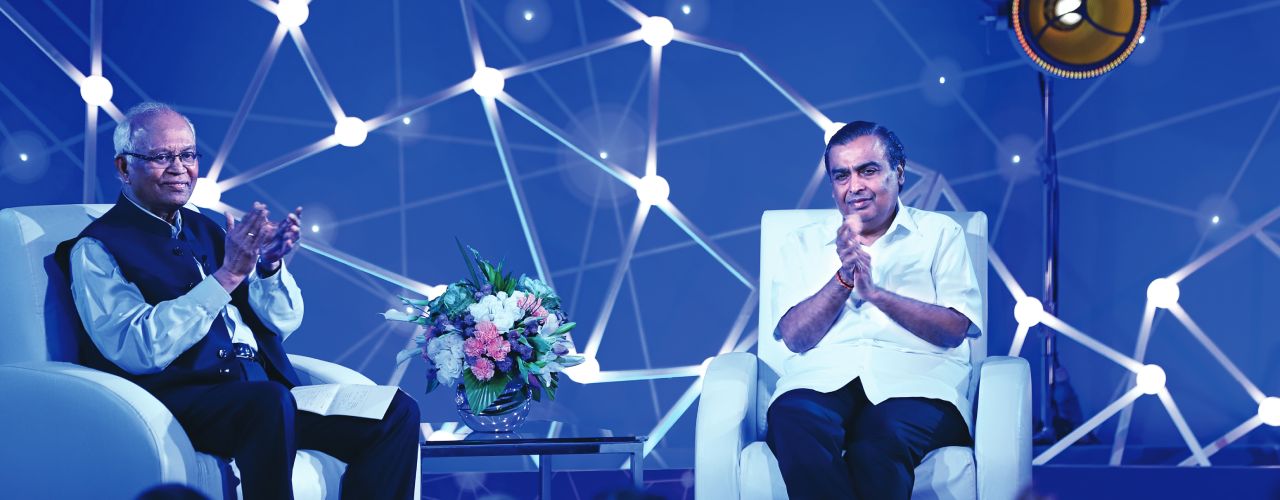
50th LEAP Chairman and Dr. Mashelkar
Reliance has implemented a “Three lines of Defense” approach to keep an independent check on the operating and maintenance activities. To support this initiative S&OR has rolled out the assurance process and conducted planned assurance at Terminals and Petrochemical business.
Fostering on the founder Chairman’s vision of ‘Ushering in a digital revolution to create a magical lifestyle’, the HSE digital tools for OMS, Risk management, Incident management, Change Management and Competency development are being continuously upgraded to align business requirements and global standards.
Innovation in Reliance is sharply focused on ‘Integrated innovation-led exponential growth’. Reliance develops and deploys relevant programmes leveraging digital technology and harnessing expertise aimed at creating value and a culture of innovation.
JIO LEAP
Jio LEAP was born with the aim of providing people at Reliance access to global thought and innovation leaders through interactive sessions. Since inception, 50 Jio LEAP events have been organised, including starring 3 Nobel Laureates, 2 Olympians and 19 CEOs. It is their purpose, passion, and perseverance that gets translated into inspiration.
The 50th Jio LEAP session featured a special fireside chat between Dr. RA Mashelkar and Sh. Mukesh D Ambani, attended by 500 leaders. Sh. Mukesh D Ambani expounded on Reliance’s role in creating a prosperous India and laid out the vision, values and forward path for the next decade.
Key Messages from Chairman
Sh. Mukesh Ambani on 50th LEAP
“Embrace the future with boldness and empower successive generations to take more risks, to do things that nobody has done, and to innovate.”
“Adaptability is key – we cannot control situations, but we can adapt to them faster than anybody else.”
“It is important to learn, unlearn and relearn – it makes you clear-headed.”
MISSION KURUKSHETRA (MK)
MK aims at democratising creativity and innovation by empowering everyone to innovate. It is a digital platform via which all ideas are submitted, brought to logical conclusion and executed for impact. Through MK, employees put creative problem-solving into practice and reskill themselves in ideation. MK was relaunched in a new avatar in 2019 with the following features:
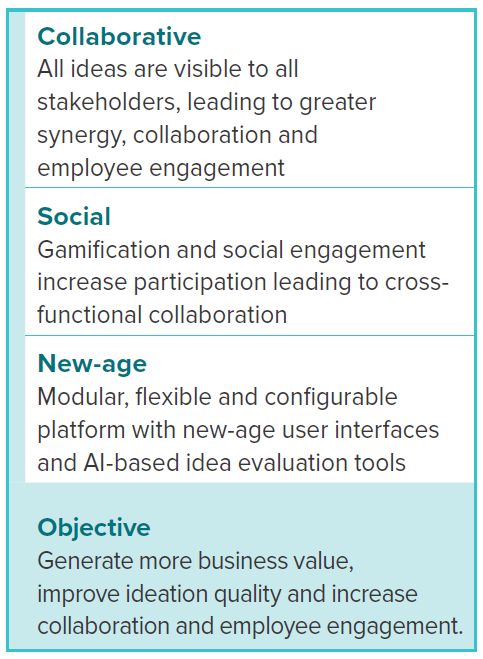
“I would like to take this opportunity to invite you to wholeheartedly participate in this innovation movement at Reliance. With your innovative ideas and the new and upgraded MK, Reliance will undoubtedly be on the path to becoming the most innovative company in the world!”
Chairman Sh. Mukesh D.
Ambani, MK relaunch
In response, around 500 ideas were submitted on day 1 and 1000+ ideas within first week. MK is now a treasure trove of more than 29,000 employee ideas that have a combined potential to create significant value for the organisation.
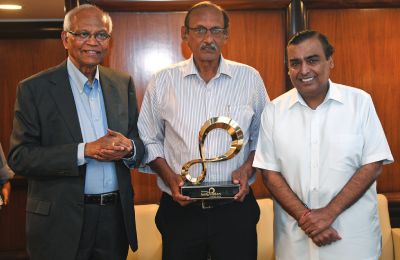
RIA Lifetime award Sanjay Mashruwala
RELIANCE INNOVATION AWARDS (RIA)
Reliance Innovation Awards recognise the innovation spirit of Reliance – to set quantum goals, be bolder than others, persevere and make the impossible possible. The infinity symbol depicts Reliance’s infinite aspirations, infinite innovation, and infinite growth. In 2019, about 1,000 applications and nominations were received of which 43 people were recognised across three award categories:
Game Changer Award - given to the most innovative, high impact projects in Reliance.
Pathbreaker Award - given to innovation leaders who demonstrate outstanding leadership and innovation through a portfolio of innovation projects that create significant value
Lifetime Innovation Leadership Award – recognises a senior leader who demonstrates long-term commitment to the cause of innovation at Reliance.
Reliance’s Code of Conduct provides the guidance and support needed to conduct business ethically and to comply with the relevant laws. Failure to follow this Code could result in disciplinary action and even dismissal. The Code lays down responsibility and expectations from employees and stakeholders. It also ensures that all employees, suppliers and vendors are required to respect human rights of not only each other, but also of the communities in which they operate.
RIL has developed a set of policies, codes, and guidelines to govern its directors, senior executives, officers, all employees and third parties, including suppliers and business partners. The Company takes into account global standards and endeavours to comply with all global norms on ethical conduct of business and human rights, including the principles outlined in the United Nations’ Universal Declaration of Human Rights.
Employees and other stakeholders are required to report actual or suspected violations of applicable laws and regulations and the Code of Conduct.
As part of new employee on-boarding into Reliance, an extensive induction session is conducted covering essence of the Code of Conduct and related guidelines. To ensure continued awareness about the prevalent policies and guidelines, every employee must undergo the annual mandatory training on ‘Code of Conduct’ and ‘Creating a Respectful Workplace’. As part of annual appraisal cycle, all employees submit a mandatory self-declaration of understanding and adherence of the Reliance Code of Conduct.
An Ethics and Compliance Task Force (ECTF) comprising the Reliance Group’s Executive Director, General Counsel, Group Controller and Group Company Secretary has been established which oversees and monitors implementation of ethical business practices within Reliance. The task force meets once in three months to review the complaints and incidents and reports them to the Audit committee. The Company has established a vigil mechanism and a whistle blower policy for employees and directors to deal with issues related to ethics, noncompliance and violations of the Code. The whistle-blower can make a protected disclosure either to the ECTF or directly to the Audit committee via email, telephone or through a letter.
Reliance recognises the ‘corporate responsibility to respect human rights’, as outlined in the framework of United Nations Guiding Principles on Business and Human Rights (UNGP).
An internal complaints committee has been set up at all operations locations where employees can register their complaint against sexual harassment. This is supported by the Anti-Sexual Harassment Policy, which ensures a free and fair enquiry process with clear timelines for resolution. There is also a mandatory learning program in place on “Creating a Respectful Workplace” for all employees. Reliance continues to report its progress against the 10 principles of UNGC in the Sustainability report. The 10 principles cover the topics of human rights, labour, anti-corruption and environment. During the reporting period, there were no cases of child labour, forced labour, involuntary labour, sexual harassment and discriminatory employment.
At various sites, Reliance has registered employee unions and associations. Employees are encouraged to participate in open and constructive dialogue with the management, without fear of reprisal, discrimination, intimidation or harassment. Almost 100% of the non-supervisory permanent employees at its manufacturing locations are covered under the collective bargaining agreements with trade unions, which also comply with the local and national laws.
The HR function continues to raise the bar of excellence in people policies, practices, systems and data. This has been accelerated by a transformation team specifically focused on strategically driving key people-focused transformational initiatives across Reliance along with adoption of progressive HR policies.
The function is managed through a mature Human Resources – Governance, Integration and Assurance process in place with periodic reviews across various teams in the organisation.
Reliance is leading India’s technological quantum leap and ushering in the fourth industrial revolution across its Retail, Digital Services and Hydrocarbon businesses.
Our next generation digital infrastructure, unprecedented scale of network and key partnerships differentiate our each business and deliver compelling customer experiences. The Company’s retail footprint is ever expanding, adding more stores year-on-year and increasing penetration to more rural as well as urban areas. The Jamnagar supersite is one of the world’s most complex and highly integrated site that has re-defined refining and petrochemicals integration. From developing infrastructure to reach the masses and service consumers in remotest areas to rolling out new or customised products and services like Project Eve or Fiber-to-thehome to serve all segments, Reliance has truly made global local.
Technological advances such as remote sensing and predictive analysis using AI, ML, IIoT, robotic process and automation are well integrated within our operations to ensure asset health is maintained and performance is optimised. Such solutions are not only integrated within our refinery and plants but are also offered seamlessly through the physical and digital ecosystem.
Reliance is also making significant contributions to enhancing the circularity of the Indian economy, while we continue to build up significant technological capabilities to deliver world class operational performance. From developing bioplastics to recycling plastics for road constructions, Reliance is creating more opportunities to generate wealth from waste. From developing products which have the lowest carbon footprint in their segment to advanced material that present sustainable alternatives to conventional materials, Reliance has demonstrated Product Stewardship and Innovation.
Reliance, has been instrumental in creating significant societal value by leveraging its manufacturing strengths. During the pandemic when the country needed such strength the most, Reliance ramped up the production of PPEs to manufacture 1 lakh PPEs per day in very short time.
UN’s Sustainable
Development Goals

Material Topics
Other frameworks referenced
NVG-SEE and NGRBC
National Missions

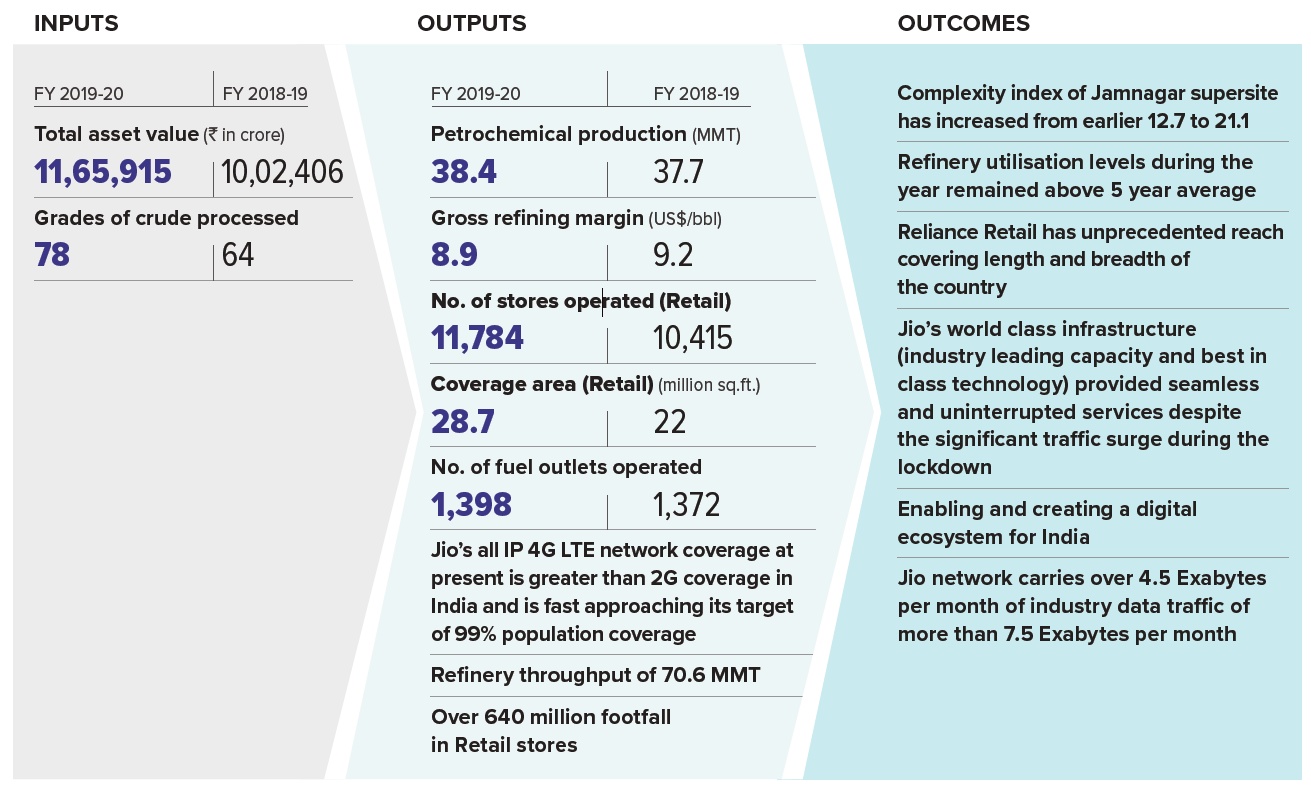
Through its manufacturing excellence, Reliance has created value for all its stakeholders. The timeline below shows a glimpse of Reliance’s effort towards manufacturing excellence:
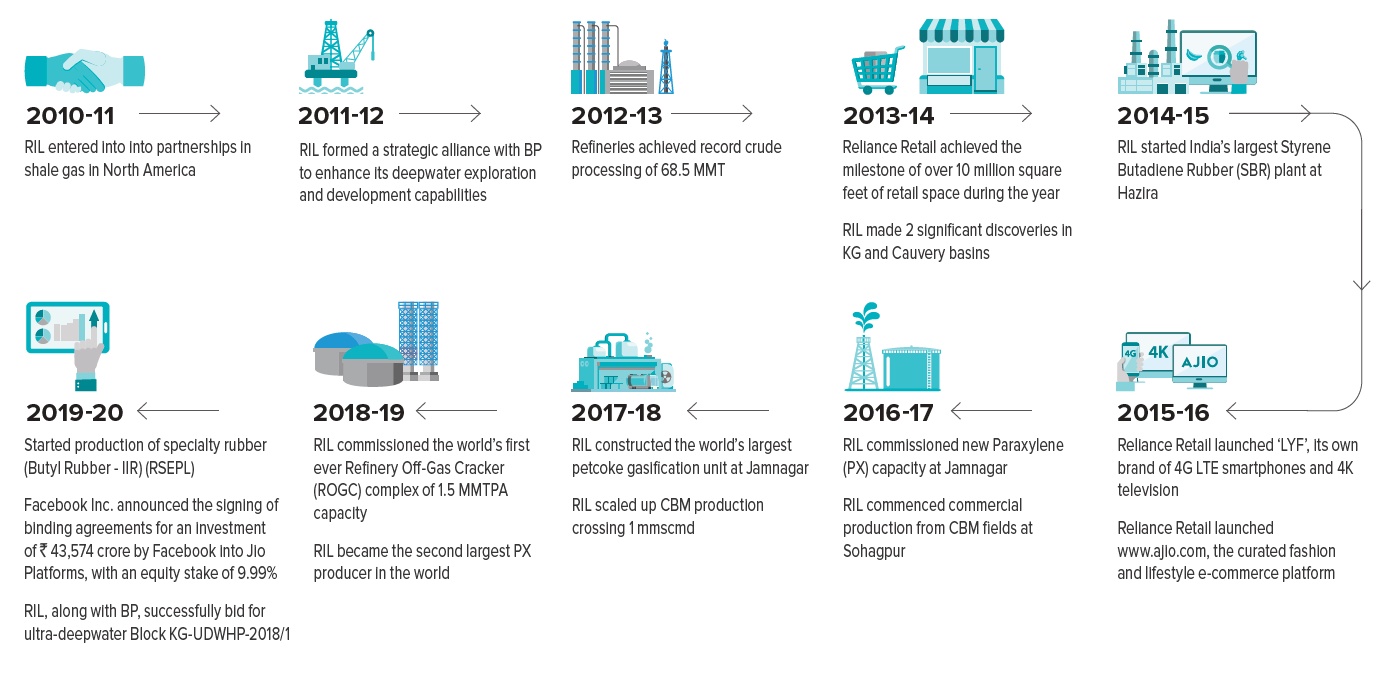
| Goals | Highlights of FY 2019-20 |
|---|---|
|
ASSET UTILISATION |
|
|
PRODUCT STEWARDSHIP |
|
Reliance promotes smart manufacturing processes in its value chain. Smart manufacturing integrates data from various systems with process expertise, enabling proactive and intelligent manufacturing decisions in dynamic environments. These technologies became more relevant to operate RIL’s manufacturing operations when all are continuing to fight against COVID-19.
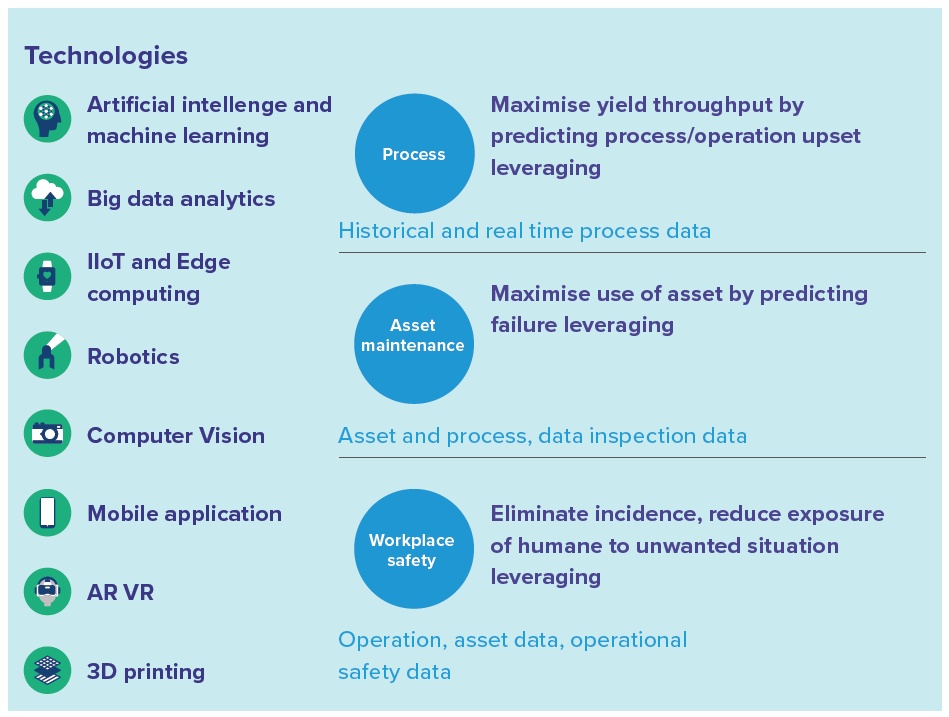
Reliance’s smart manufacturing adoption strategy includes:
Technologies that leverage smart manufacturing include:
The application of acquired skilled sets of analytical platforms, computer vision, ML, AI algorithms and programming languages, with domain expertise, aids in prescribing solutions. The Operator Training Simulator (OTS) deployed at critical plants is used extensively to improve competency, to train for start-up, shutdown and handle plant and process safety related emergencies. Reliance is also experimenting with Virtual Reality (VR) based technology for employee training.
Reliance is developing an ecosystem to integrate smart manufacturing solutions along with technology partners with the support of infrastructure available through Jio network and Jio cloud. With this initiative, Reliance is not only optimising its own process, but also contributing towards the inclusion of other Small and Medium Enterprises (SMEs) in the journey.
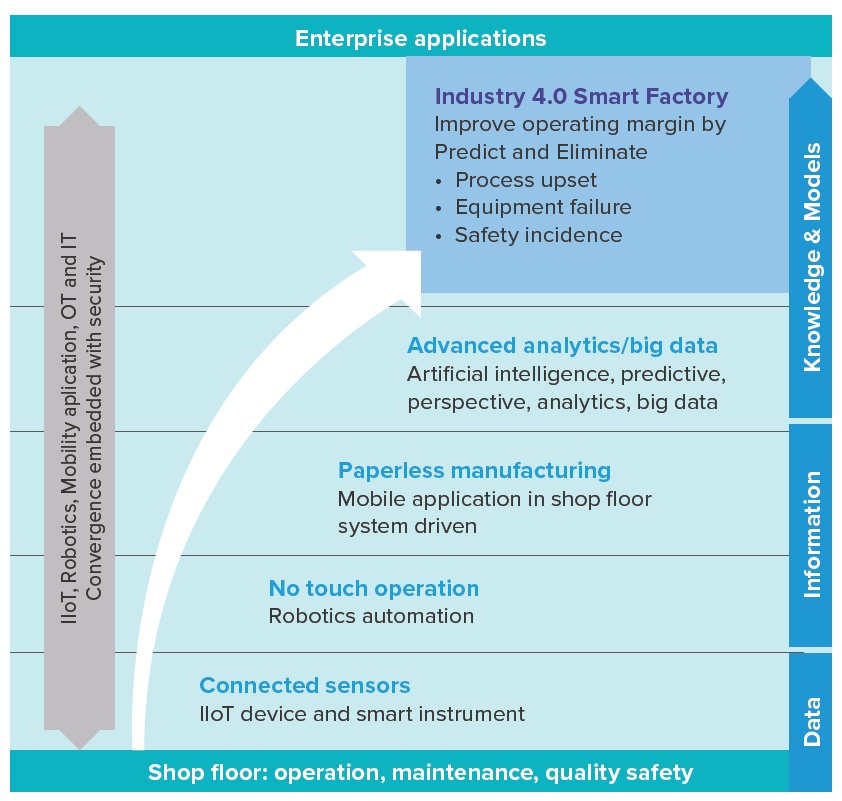
Replacement of Lithium ion batteries instead of the traditional Valve- Regulated Lead-Acid (VRLA) batteries
OBJECTIVE
Reduction of DG set Run-Hours in the event of SEB power failure through use of fast charging / discharging type Lithium Ion (Li-Ion) Batteries instead of the traditional VRLA Batteries for fast charging.
CHALLENGES
For reliable operation of Tower sites, continuous power supply is required. Normally received from the Electricity supply company. In the event of failure of SEB supply, back-up power is taken from batteries. In case of power interruption for longer periods, DG power is used.
Details: Lithium Ion batteries occupy less space due to higher power density. By deploying Li-Ion Batteries, which can re-charge at fast rate of 33% (as against 10% for VRLA Battery) DG Run-Hours has been drastically reduced. This has been done by cyclic charging / discharging of Batteries. The watt efficiency (95%) of Li-ion is more than VRLA Batteries (85%).
Moreover, VRLA Battery need controlled environment whereas Li-Ion Batteries can be operated in ambient conditions. Hence, they are more suitable for tower application.
IMPACTS
Installation of Li-Ion Batteries resulted in reduction of DG Run-Hours leading to reduction in energy consumption and emissions.
As part of its Digital Transformation, RIL has set out the objective of developing the underlying manufacturing digital capabilities and technologies as part of its digital enterprise, manufacturing and operational platforms. This has included leveraging the Jio network, the Hydrocarbons cloud and datalake infrastructure.
The adoption of innovative digital technologies has focused on driving strategic business objectives and outcomes. With these platforms, RIL is now providing near real-time business insights to its end users, allowing the various stakeholders to take fast and effective business decisions through a common and intuitive User Interface (UI). RIL’s digitisation strategy has therefore, focused on two main themes:
ELEMENTS OF RIL SECURED CONNECTED SYSTEM
RIL has developed and effectively implemented a real-time analytics system known as RIL Secured Connected System (RILSCS). By virtue of this system, the Company can analyse the operations on an instantaneous basis for predicting future challenges. The elements of RILSCS are described in the diagram below:
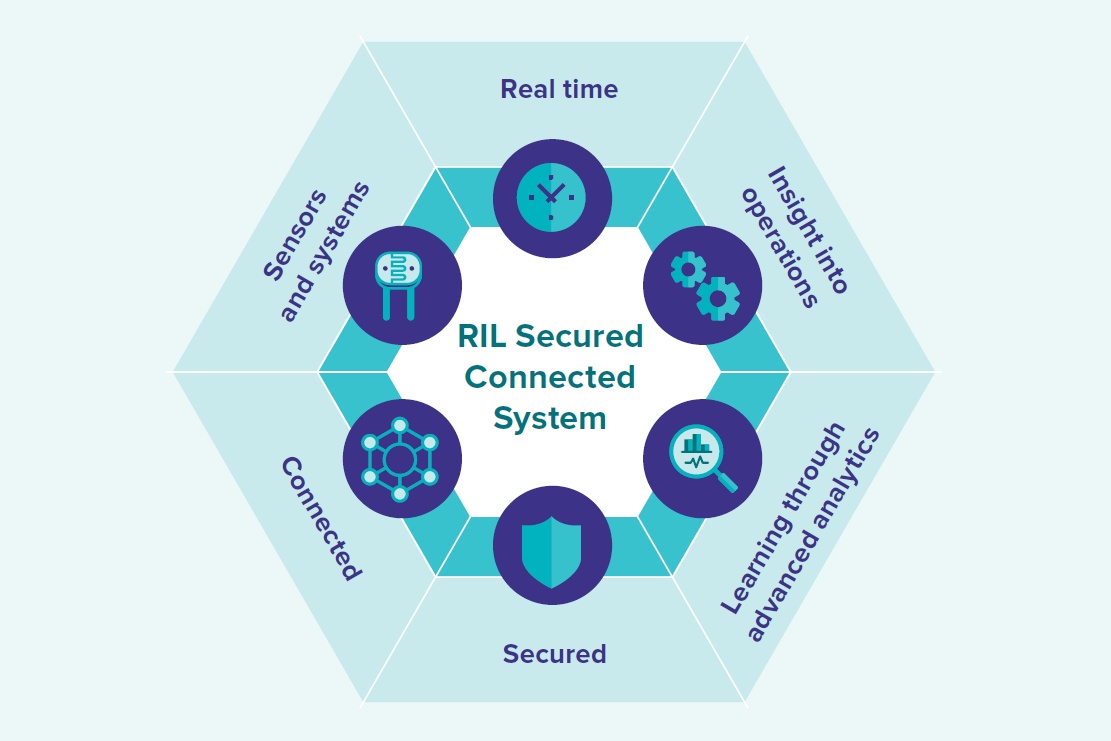
AUGMENTED CUSTOMER EXPERIENCE
To enhance the customer experience, RIL has rolled out the Augmented Customer Experience (ACE) programme with the objective of enhancing customer experience based on the voice of customers, improving supply chain processes and enabling value-added services. This initiative integrates business planning through advanced analytics, better supply planning and execution, to drive higher customer service levels.
Reliance proactively ensures that its products positively impact the environment and society at large. The three key categories of products that the Company manufactures are – transportation fuels, polymers and polyester fibres. RIL sets a uniformly high standard for product development, which goes beyond regulatory requirements.
Product stewardship initiatives undertaken in FY 2019-20 are listed below:
RETAIL
Reliance Retail launched a new store concept ‘Trends Junior’, a destination store for kids aged 0-14 years and offers apparel, footwear and accessories in a differentiated store environment.
During the year, Reliance Retail launched SMART Point, a one-stop multi-purpose store concept, offering grocery, pharmacy and assisted e-commerce. The entire process from concept to execution took less than 45 days during which 18 stores were launched across Thane, Navi Mumbai and Kalyan in Maharashtra.
DIGITAL SERVICES
MEDIA
REFINING & MARKETING
RIL has focused on debottlenecking, capacity enhancement, energy conservation and product quality improvement to enhance its competitive strengths. Some efforts inter alia include:
PETROCHEMICALS
Polymers
Polyesters
Composites
Reliance Composite Solutions using composites and carbon fibre under its trademark RelX™ has successfully developed the following:
Other Brands
RIL formally launched the waste plastic to roads initiative titled ReRouteTM. The Company has piloted around 40 km of road in Nagothane, Maharashtra and 1 km inside RIL-RCP campus at Ghansoli, Navi Mumbai
OIL AND GAS EXPLORATION AND PRODUCTION
CIRCULAR DESIGN CHALLENGE 2.0
R|ElanTM ‘Fashion For Earth’ partnered with the United Nations Environment Program (UNEP) for the 2nd edition of India’s biggest sustainable fashion award - circular design challenge — a design philosophy that promotes reusing and recycling of raw materials and end products with a view to reduce the environmental footprint of Indian fashion industry.
400 qualified registrations were received from 40 cities across the country. 86 final applications were shortlisted and further distilled to five qualifiers by the Final Selection Group (FSG).
The finalists comprised a diverse group of active and environment conscious young individuals. Gauri Gopal, the founder of Skilled Samaritan, impressed jury by showing how her label employed the rope-making skills of rural women to create commercial products. Varsha Rani Solanki, the founder of Off-grain, intrigued everyone by showing how her label converted waste products to beautiful, fashionable products. Esha Agarwal explained how her label Chambray & Co. helped consume less material and upskilled local artisans. Susmit Chempodil and Zuzanaa Gombosova, co-founders of ‘Malai’, innovated a biocomposite material from coconut waste that decomposes within 90-120 days. Finally, Mallika Reddy from Cancelled Plans, took waste materials from industrial process destined for oceans and landfills and made fashionable goods.
Susmith Chempodil and Zuzanaa Gombosova were declared as the winners of Circular Design Challenge 2.0 by the jury. They were presented the grand prize of `20 lakh to support them scale their innovation to a marketable collection and make a discernible impact to waste reduction and environment betterment. They would also have a chance to showcase their scaled-up collection at the next Lakme Fashion Week in August 2020.
Global Corporate Security (GCS) is a distinct function of Reliance mandated to secure, safeguard and de-risk India’s largest private sector company. Round-the-clock, GCS officers are engaged for safeguarding RIL’s people, assets and operations, ensuring business continuity at all times, and reducing the cost of doing business.
GCS apex leadership comprises a multidimensional and diverse range of experts, including veterans from the military, central police organisations, paramilitary forces, law enforcement and intelligence agencies and other subject matter experts from the industry.
GCS operates the Reliance Security and Risk Management Academy (RSRMA), a first-of-its-kind training institution in India, dedicated to producing world-class security professionals. The academy has trained more than 900 security officers thus far.
GCS proactively engages with public & private enterprises, academia, think-tanks and sovereign security forces to develop security doctrines, industry best practices and policy frameworks. This helps to address the entire spectrum of existing and evolving strategic and operational security risks.
In response to the COVID-19 crisis, GCS teams across the enterprise, covering all the locations, handled the crisis in an exemplary manner on a 24/7 basis. Their contribution has been critical in saving lives, providing security and protection of assets and ensuring business continuity in the most optimal manner.

At Reliance, we have the unique opportunity to develop pathbreaking technologies that operate at the fusion of physical, digital and biological worlds. Several of our breakthrough technologies are first to the world and are catering to growth of existing and future businesses.
Each of our business segments started with the vision to solve a societal challenge. With our passion, determination and will to innovate, we have ushered in a new era of revolution - a phygital future for our country. Our people, our technologies, our research, our intellectual capital, have enabled us to create next-gen products and platforms.
Our R&D teams are working on Bio-innovations to use our expertise in algae, mixed with AI and ML to increase agricultural productivity. We see value in waste and have demonstrated that by converting waste plastic to roads, developing bio-plastics and through processes such as catalytic gasification. While R&D is working on growth opportunities for business, it is also looking to solve for themes such as climate action or affordable and clean energy. Our technology developments have also won us many national and international awards and accolades.
In these unprecedented times, all our strengths from R&D are being utilised to help our nation fight this pandemic. These innovations range from our synthetic biology team working to identify novel ways to detect, protect and treat the COVID-19 infected patients, to our ability to design and fabricate simple ventilator prototypes for mass production using 3D printing skills, make PPEs (Personal Protective Equipment) with our range of polymer products, using our knowledge of synthetic chemistry to make low cost sanitizers or utilising our understanding in adsorbents to make enriched oxygen from air.
UN’s Sustainable Development Goals
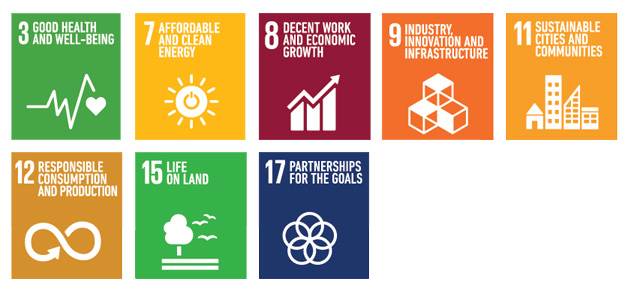
Material Topics
Other frameworks referenced
WBCSD
National Missions
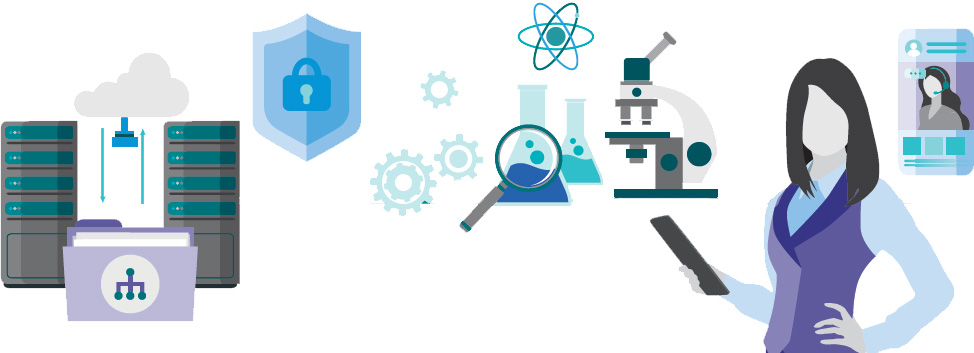
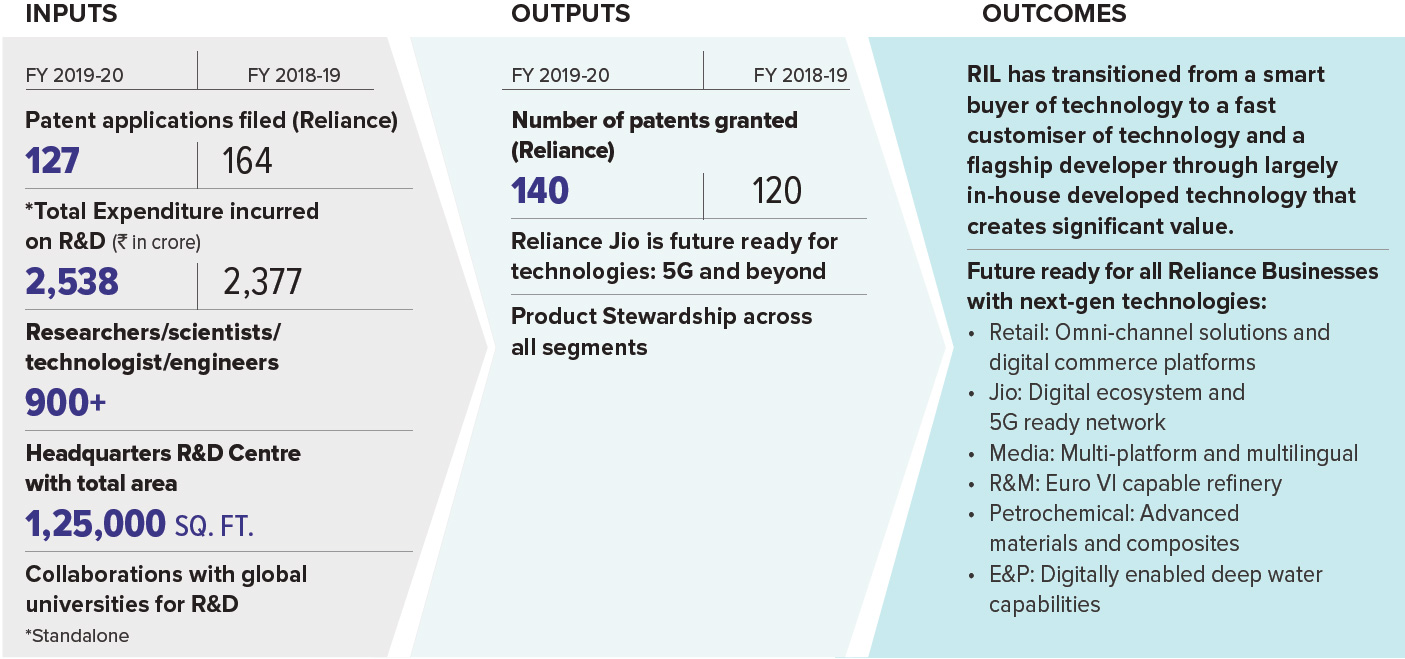
Through its innovation and R&D initiatives, Reliance has contributed towards nation’s intellectual capital as well as created products and services that deliver positive value to its customers. A snapshot, of that is below;
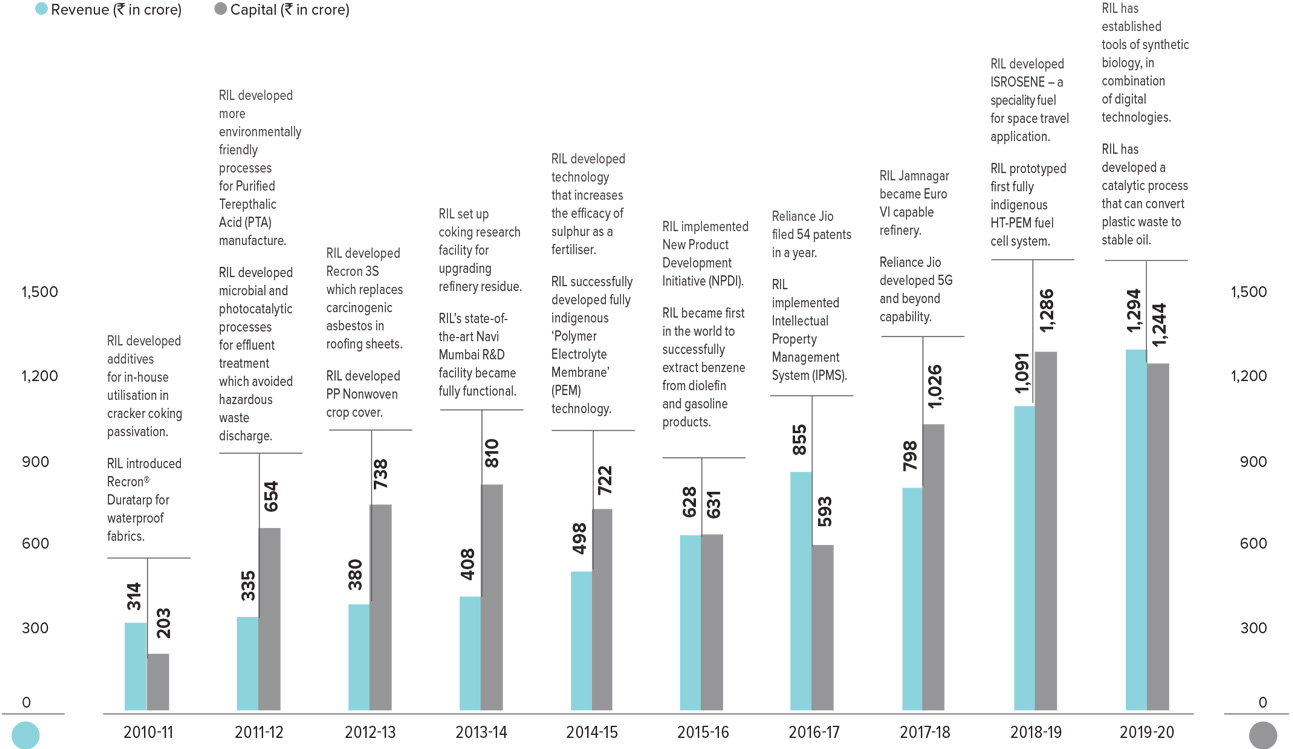
| Goals | Highlights of FY 2019-20 |
|---|---|
|
PRODUCT STEWARDSHIP |
|
|
CLEAN ENERGY |
|
|
MANAGING ENVIRONMENTAL IMPACTS |
|
VISION
R&T will develop innovative products, processes and catalysts to increase and sustain the profitability and growth of Reliance.
Role of R&T in Reliance’s journey of value creation for its stakeholders:
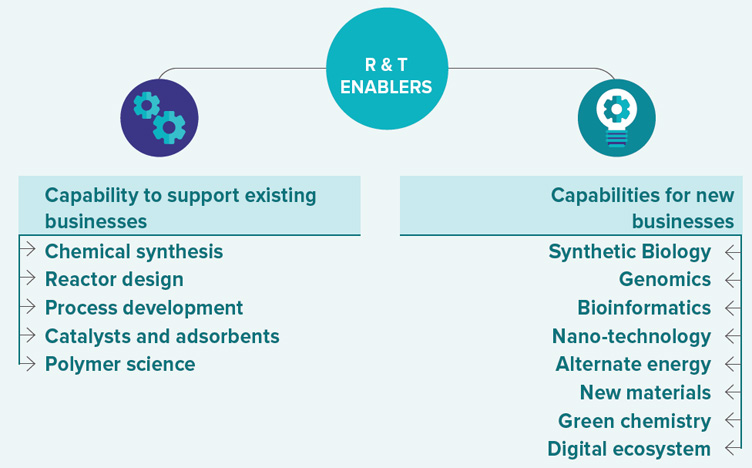

RIL-Biology
RIL – biology platform has more than
75 scientists and engineers hired from
world’s top-class research institutes and
universities. Integration of deep-learning
in biology, especially synthetic biology
has enabled the team with next-gen
technologies and processes to work on
some of the important global challenges.
Synthetic Biology led innovation for next-gen biomaterials and food ingredients Synthetic biology is widely envisioned as an epitome of innovation led growth. With disciplines in genetic engineering, omics, big-data analytics, and robotics, among others, the synthetic biology division embraces, state-of-the-art technologies to achieve highest productivity outcomes for novel products creating new business opportunities.
RIL R&D has pioneered zero to one innovation to develop most productive, robust and scalable year-round outdoor algal cultivation (continuously for more than three years). Thus, RIL’s algae cultivation and downstream cutting-edge technology can economically transform conventional production practices, be it traditional agriculture or modern synthetic bio-chemistry approaches to develop new materials, food ingredients in a more sustainable way.
Over the last few years RIL has rapidly established tools of synthetic biology, on algal technology platform, further combining Reliance’s strong capabilities in digital technologies, it is poised to create tangible opportunities in food, materials, agriculture and health.
Functional competencies - to
enable next-gen products
The integration of omics through AI
and ML algorithms equipped with bigdata
processing has helped streamline RIL’s genome engineering efforts
using Clustered Regularly Interspaced
Short Palindromic Repeats (CRISPR) –
technology to improve photosynthetic
efficiency, biomass productivity, and
many other complex traits. To rapidly
evaluate outcomes and establish proof-ofconcept
(POC) for RIL’s synthetic biology
endeavours, a high-throughput screening
pipeline, indoor and outdoor cultivation
evaluation, and Quality Assurance/ Quality
Control (QA/ QC) monitoring capability
have been established. To further achieve
optimised algae productivity targets, RIL
utilised end-to-end process engineering
from process scale-up, photo bioreactor
designs, large scale product extraction,
robotics, and high-throughput analytics
platforms to develop food and feed
ingredients from algae-biomass.
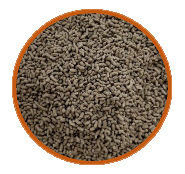
Fish Feed
Food and feed:
With its algae based synthetic biology
platform, RIL developed alternatives for
conventional food and feed ingredients that
have the lowest carbon footprint of currentday
conventional crop.
Advanced biomaterials
Using synthetic biology-enabled
technologies, RIL plans to provide
sustainable biomaterials and polymers
which can be produced in an algae platform
using CO2. A commercialisation plan for
biomaterials (such as nanocellulose, nonanimal
leather, spider silk, among others)
and their composites is underway. These products will be introduced initially in the
high-end specialised market catering to biomedical,
wound care and personal care.
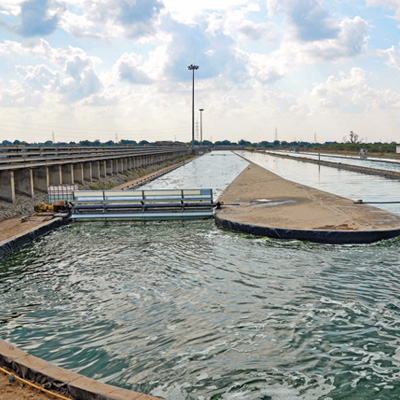
Algal pond at Gagwa
Integration of algal knowledge
with AI and ML tools to boost
agricultural productivity:
RIL’s R&D envisages to use its core
strength in photosynthesis research, AI-ML
platform, CRISPR, genomics and a stateof-
the-art biology laboratory to accelerate
innovations in modern agriculture. It seeks
to deploy smart applications of CRISPR
technologies, microbiome, and Genome-
Wide-Association-Studies (GWAS) using
sequenced genomes of crops, and genome
sequencing projects of non-conventional/
orphan crops to specifically address food
and nutrition gaps of the country. RIL’s R&D
efforts in modern agricultural hybridisation
and selection has delivered high-yielding
elite seeds under rain-fed conditions for
Jatropha as biofuels.
Bio Coal Bed Methane (Bio-CBM)
- converting unminable coal to
methane
RIL’s Bio-CBM process is targeted at
converting unminable coal to methane,
a fuel that can improve the country’s
energy security. Methane thus produced
not only meets energy need, but also
reduces GHG emissions.

Functional elastomer technology
development
New technology has been developed for
functionalisation of elastomer through
an emulsion polymerisation process.
Reactive silica and graphite composites
prepared with this material have superior
rolling resistance and longer life reducing
auto emissions.
High performance elastomeric
products and applications
New class of ionic cross-linked
elastomeric material has been developed.
The presence of ionic groups provides
these materials excellent adhesion
to rubber, metal, plastic and wood
substrates. New range of adhesives have
been developed for automobile and other
household applications.
Polymer composites for
lightweight vehicle and body
armour
RIL has developed disentangled high
molecular weight polyethylene (DPE) that
has been used to prepare high strength
tapes and fibre that is used in body and
vehicle armour.
Carbon fibres
Carbon fibre composites can be used
to make light-weight automotive body
parts of electric vehicles. However, they
need to be developed at a cost-effective
price point. RIL R&D is developing
technologies for carbon fibres using
various raw materials and different
process approaches.
Graphene composites
RIL R&D is developing novel intercalating
agents for exfoliating graphite into layered
graphene using industrially practiced
polymer/elastomer processing operations.
Niche composites
RIL’s R&D and Business Development have
developed thermoset composite solutions
that can be coated on surfaces to provide
adequate protection from mild to harsh
corrosive environments.
Internally Plasticised PVC (IP-PVC)
for specialised applications
RIL has developed internally plasticised-
PVC (IP-PVC) that does not need any
external plasticizers. IP-PVC retains its
inherent properties, has better extrudability,
transparency and does not deteriorate over
the life cycle of the product.
High performance elastomeric
products
New elastomeric materials have been
developed by RIL based on endo-rich
bromobutyl rubber. These elastomeric
ionomers have self-healing characteristics
and potential applications for high
performance pharmaceutical stopper, high
impact polyolefin materials for automobile
and elastomeric fibres.
Ionic liquids replacing
hydrofluoric acid
RIL R&D has developed a non-hazardous
ionic liquid-based catalyst and process
technology to replace hazardous
hydrofluoric acid catalyst for manufacturing
of Linear Alkyl Benzenes (LAB).


Algae to Oil (A2O)
RIL R&D has been operating a large pilot
facility at Gagwa near Jamnagar, where
it converts sunlight, CO2 and sea water
to renewable bio-crude. R&D has been
running these ponds continuously without
crashes for more than three years, a world
record. Promise of algae has been known
for some time; however, no one in the
world has been able to cultivate algae
without crashes and significant downtime.
R&D has developed all components of
the technology value chain. This will be a
critical technology for converting CO2 to
useful products to combat climate change.
Catalytic gasification -
converting waste to value
RIL has developed a catalyst that can
gasify feed like pet-coke, coal, biomass,
among others at temperatures below
750⁰C. The catalytic process can be
used to convert high-ash Indian coal
to high-value syngas. The process is
demonstrated at pilot scale. The reaction
mechanism of catalytic gasification and
subsequent results are published in
the ‘Energy and Fuels’ journal, by the
American Chemical Society. Work is
underway to scale-up the technology.
Fuel Cells for distributed
energy supply
The first fully indigenous prototype of a
High Temperature-Polymer Electrolyte
Membrane (HT-PEM) fuel cell system
comprising fuel cell stack, methanol
reformer, balance of plant and control
system has been built and is presently
being tested on simulated Jio towers. In
the long-term fuel cells will be supplied
by renewable hydrogen and replace
current methanol reforming to produce
in-situ hydrogen.

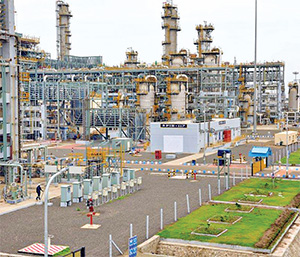
Di-sulfide oil (DSOO) utilised at ROGC
Multizone Catalytic
Cracking (MCC)
For transforming fuel refinery to
high value petrochemicals, R&D has
developed a new Multizone Catalytic
Cracking (MCC) process, which converts
a wide range of distressed hydrocarbon
feedstock, and or neat crude to high
value propylene, ethylene and BTX
(Benzene, Toluene and Xylene) without
producing any fuels. This platform
technology is a foundation for RIL’s Oil
to Chemicals (O2C) plan. A 5 KBPSD
MCC demonstration plant design is
in progress. RIL has also developed
a unique technology to separate the
aromatics BTX component from olefinic
MCC gasoline and recycle the raffinate
stream to MCC riser for maximising
petrochemicals production.

Low Cost Anti-Coking and
Sulfiding Additive – import
substitution of specialty additive
RIL has developed and started
commercial production of low-cost anticoking
and sulfiding additive (Di-sulfide
oil- DSO) from refinery waste stream.
This is a cost-effective alternative to
imported commercial additive Di-methyl
Di-sulphide (DMDS) for steam cracker
and hydro-processing applications. This
indigenous product is being utilised
in the world’s largest refinery off-gas
cracker (ROGC) unit of RIL Jamnagar
manufacturing complex. The application is
being extended to RIL’s hydro-processing
units. RIL has received several awards,
e.g., Golden Peacock (innovative
product), FICCI (innovative process) and
Centre for High Technology, Govt. of
India (best R&D Development) for this
patented technology. Several external
companies have shown interest in RIL’s
product and it is exploring licensing
opportunity for Indian refineries and
petrochemical cracker units, as per the
directions of Ministry of Petroleum and
Natural Gas (MOP&NG).
In-house FCC Catalyst
Development
R&D has developed in-house inexpensive
selective catalyst for Fluid Catalytic
Cracking Unit (FCCU), to improve
conversion and propylene yield. This
catalyst is scaled-up and performance
being demonstrated at pilot plant scale.
This catalyst will be toll manufactured for
commercial trials in Reliance FCC units.
Specialty PP Products and
Catalyst Development for High
Performance Materials –
R&D has
developed catalysts for high performance
ultra-high molecular weight specialty
polypropylene.
Bimodal HDPE Technology
Development for Blow Molding
and Pipe Grades HDPE -
A slurry
ethylene polymerisation process has been
developed using dual reactors to produce
bimodal pipe and blow molding grade
HDPE. The high-performance supported
titanium catalyst is jointly developed with
supplier to tune the catalyst specific for
RIL’s commercial application.
Metallocene LLDPE (mLLDPE) products and catalyst technology- Metallocene based LLDPE product is in greater demand due to excellent mechanical properties compared to conventional LLDPE product. Today these catalysts are imported. R&D has developed metallocene catalysts at bench scale for gas phase mLLDPE production for packaging film applications. The RIL produced mLLDPE resin has good balance of mechanical, thermal, morphological and rheological properties.
Catalyst for linear high productive
Polybutadiene Rubber (PBR)
products-
Novel cobalt-based catalyst
has been developed for linear PBR grade.
This R&D developed catalyst and process
has higher cis content equivalent to
expensive imported Neodymium Butadiene
Rubber (Nd-BR) catalyst and resulting
product.

Waste Plastics to Road
New solutions for sustainable use of these
plastic products is the need of the hour. RIL
R&D has helped the Sustainability Solutions
team in RIL-Petchem business in launching
ReRouteTM, the only product of its kind in
the market today that can be used to make
bituminous concrete road surfacing using
the ‘dry mix’ process.
Catalytic pyrolysis of mixed plastic
to stable oil
RIL has developed a catalytic process
that can convert plastic waste including
multi-layer plastics without requiring
feed segregation or clean up to stable
oil that can be processed in refineries or
petrochemical plants to produce plastics
again, thus closing the loop. This process
gives higher yield of very stable oil.
Overall circularity is highest for the RIL process compared to several competing
technologies.
Bioplastic Development
At RIL, a new biodegradable plastic is being
developed for packaging and agricultural
applications. The developed polymer has
high resilience and toughness and can be
used in flexible as well as rigid packaging,
agriculture mulch films, among others.
This can also be compounded with various
fillers for ease of downstream processing
and enhancing product properties.
Waste to Wealth
Reliance Catalytic Hydrothermal
Liquefaction technology (RCAT-HTL)
converts any biomass and organic waste
into ‘drop-in’ renewable crude that can be
processed to produce transportation fuels.
Conventional refinery processes such as
Hydrotreatment have been successfully
used to upgrade the crude from RCAT HTL
to transportation fuels. These upgraded
fuels replicate the specifications of
conventional transportation fuels, such as
diesel, jet fuel, among others.
RIL has developed a low temperature, lowcost hybrid process to extract vanadium and nickel from gasifier slag. After demonstration of a successful pilot, efforts are being made to scale-up this process.
PET-based fabric recycling To recycle PET in all its forms, RIL is targeting to separate PET from mixed fabric blends and convert it back to fibres and to fabric. This will be an important step towards fostering the circular economy and addressing the environmental burden caused by the discarded PET based fabrics.
Recycling of Waste Polyester
RIL is developing an in-house technology
to convert waste recyclable polyester
material into valuable chemicals to make
polyurethane with improved physical
properties. It will help to strengthen circular
economy and reduce environmental impact.

Direct conversion of CO2 to
Dimethyl Carbonate (DMC) – for
CO2 monetisation
R&D has developed a mixed oxide
stable catalyst to directly convert
methanol and CO2 to a high value Dimethyl
carbonate (DMC) product used
as solvent and specialty chemical.
Currently, DMC production is done by an
expensive hazardous phosgene process.
If inexpensive DMC is available, it’s high
value polycarbonates could be produced.
Furthermore, DMC could also be blended
in transportation fuels as an oxygenate
additive instead of ethanol or methanol.
This year RIL has achieved substantial
improvement in DMC yield and methanol conversion by modifying the catalyst and
by optimising the process conditions. The
process and the catalyst have successfully
been scaled up to a pilot stage with
continuous operation. The long term
stability studies of the catalyst have also
been completed. In addition, RIL has also
developed the solid heterogeneous catalyst
for the regeneration of the dehydrating
agent used in this novel DMC process.
Process for CO2 capturing from
refinery and power plant flue gas
R&D has developed and demonstrated at
a pilot scale a sorbent based circulating
fluidised bed process for concentrating CO2
from dilute refinery and power plant flue
gases. This process is protected by several
patents in India and abroad. The estimated
cost of CO2 capture is less than 18 US$/
tonne as compared to 35 US$/ tonne for
amine-based process.
This venture targets the reduction of the amount of Benzene and other hazardous air pollutants in the gasoline pool – a cause for health and environmental concerns. This novel processing operation represents the only extractive distillation unit setup in the world that can process FCC gasoline heart cut fraction for the dual purpose of producing high purity benzene and benzene lean gasoline.
Significantly lower particulate emissions as the gasoline processed will contain 30% less benzene.
R&T PRODUCT STEWARDSHIP
Retail
AJIO onboarded over 200 brands on
JIT (Just-in-time) inventory model which
reduced time to market for new styles. AJIO
continues to strengthen its O2O (offlineto-
online) capabilities. ‘Drop at Store with
Cash Refund’ and ‘Pick at Store’ is now
live in Bengaluru. Endless aisle kiosks
across 750 Trends stores contributed 33%
to O2O business.
Digital Services
Media and Entertainment:
Refining and Marketing:
Petrochemicals
Oil & Gas Exploration and Production
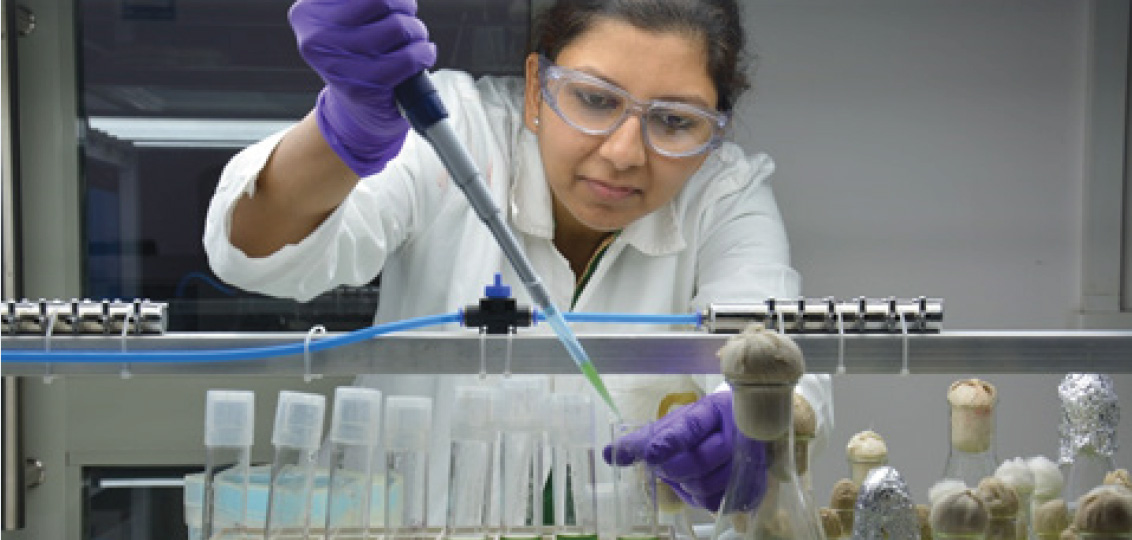
RIL scientist working on synthetic biology
R&D teams are trying various ways to help RIL and the nation to fight this pandemic. Broadly the R&D efforts can be classified into three categories: Prevention - Detection - Treatment


Synthetic Biology R&D team is working with CSIR-IIIM to develop highthroughput assay for detection of COVID-19 using RT – LAMP technology. This technology has tremendous potential for early detection of infection without any cost intensive infrastructure (RT – PCR). Population screening using super-high-throughput technologies are needed to screen spread of the virus in slums and amongst migrant-workers. The teams are also working with nextgen sequencing companies in Mumbai to develop method and protocols for community analysis. The team has also proposed multi-layer imaging technologies for COVID-19 community screening based on facial temperature profile and coarse voice symptoms using an Intelligent API.

R&D EXPENDITURE

R&T ENABLERS
Collaboration
Reliance collaborates with high-ranked
universities and institutes such as
University of Helsinki (Finland), Pacific
Northwest National Laboratory, ICGEB
(New Delhi), Ben-Gurion University of the
Negev (Israel), IIP Dehradun, IIT Bombay,
IIT Kharagpur, IIT Chennai, NCL Pune,
Florida State University, University of
Massachusetts Amherst, University of
Delaware, Penn State University, Kansas
State University, IIIM Jammu, Gujrat State
Forensic University, Institute of Chemical
Technology, IEC Frieberg, Germany and
Clemson University among others.
R&D Personnel
Researchers/scientists/ technologists/
engineers: 900+
RIL runs campus recruitment drives to attract talent from the best universities. RIL has a pool of scientists and engineers (900+) from reputed Indian and international institutes as listed below:
Indian institutes:
International institutes:
Some of RIL’s scientists have membership/ fellowship in reputed bodies such as The Indian Institute of Chemical Engineers (IICHE), National Botanical Research Institute (NBRI) and Fellowship Criteria - Indian National Academy of Engineering (FNAE).
Intellectual Property At RIL, continuous R&T efforts have resulted in the creation of diverse technological solutions and corresponding patent portfolio spread across various geographies. A robust internal Intellectual Property (IP) governance framework ensures these patents are in close alignment with the organisation’s business objectives. In FY 2019-20, RIL filed 127 patent applications and 140 patents were granted.
For the last few years, Reliance has been consistently featuring among the ‘Asia IP Elite’, a select club of companies from the Asia Pacific region having best IP systems and processes with emphasis on integrating intellectual property with commercial decision-making.
1. Intellectual Property Management System (IPMS)
R&D has implemented an enterprisewide intellectual property portfolio management application for centralisation of patent filing. It enables focused patent filing and helps in having a centralised repository.
2. Implemented Industry 4.0 Technologies
Emerging digital technologies are being applied in discovery research. Capabilities include advanced data science and analytics, cloud computing, artificial intelligence, machine learning, industrial IoT, process control automation and cyber security. Reliance has established state-ofthe- art infrastructure and facilities with high performance computing clusters for advanced computational research; scientific big data ecosystem for laboratory informatics and data science; Azure cloud computing platform for scalable computing, storage and scientific application deployment; and secured remote access to CSIR national and university labs for open collaborative research.
3. Electronic Laboratory Notebook (ELN)
R&D has implemented best-in-class ELN which is seamlessly integrated with the Laboratory Information Management System (LIMS). ELN is a procedure-driven application designed to give scientists a robust platform to capture and store both structured and unstructured data as they conduct experiments or execute laboratory procedures. The ELN user interface can be modified by creating experimental templates. This will allow scientists to easily enter information as well as directly capture results from analytical instruments and barcode systems for sample lifecycle management.

R&D center, Navi Mumbai campus
The Reliance digital transformation strategy is reformulating the Company’s value proposition by integrating products and digital services that respond to current and future customer needs. This has led to the deployment of a variety of mobile and cloud native capabilities to create or enhance value propositions for the businesses and markets in which Reliance operates. By the year end, Reliance has fully operationalised and enabled:
Moving to digital services platform strategy has therefore been a strategic investment in building integrated, difficult-to-replicate capabilities that deliver and sustain Reliance’s long term strategy in a digital future.


Reliance is focussed on optimising shareholder return by maintaining an optimum capital structure, liability profile and leverage ratio. The current low interest rate environment will enable Reliance to optimise on its interest cost. All its businesses generate strong operating cashflows. This year, our annual EBITDA crossed the `1,00,000 crore mark for the first time. Our consumer businesses recorded a robust growth on all operating and financial parameters and they now contribute to 35% of our consolidated segment EBITDA. Investments in the form of cash and cash equivalents has served as a liquidity buffer against macro shock and volatility. With a strong emphasis on risk management, the Company continues to secure its cash-flow and earnings risks.
Reliance retained its domestic credit ratings of AAA from CRISIL, CARE and ICRA and investment grade rating for its international debt from Moody’s as Baa2 and BBB+ from S&P. The ratings are a testimony to Reliance’s strong balance sheet and the reliable growth trajectory of its business earnings.
UN’s Sustainable
Development Goals
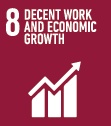
Material Topics
Economic performance
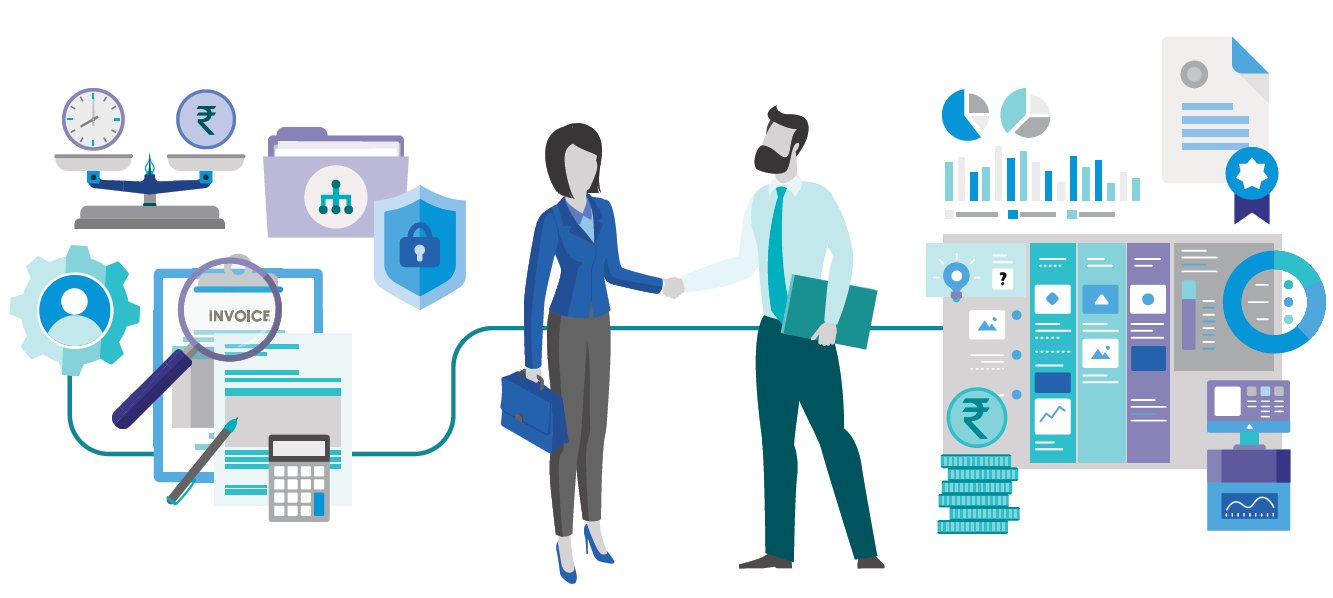
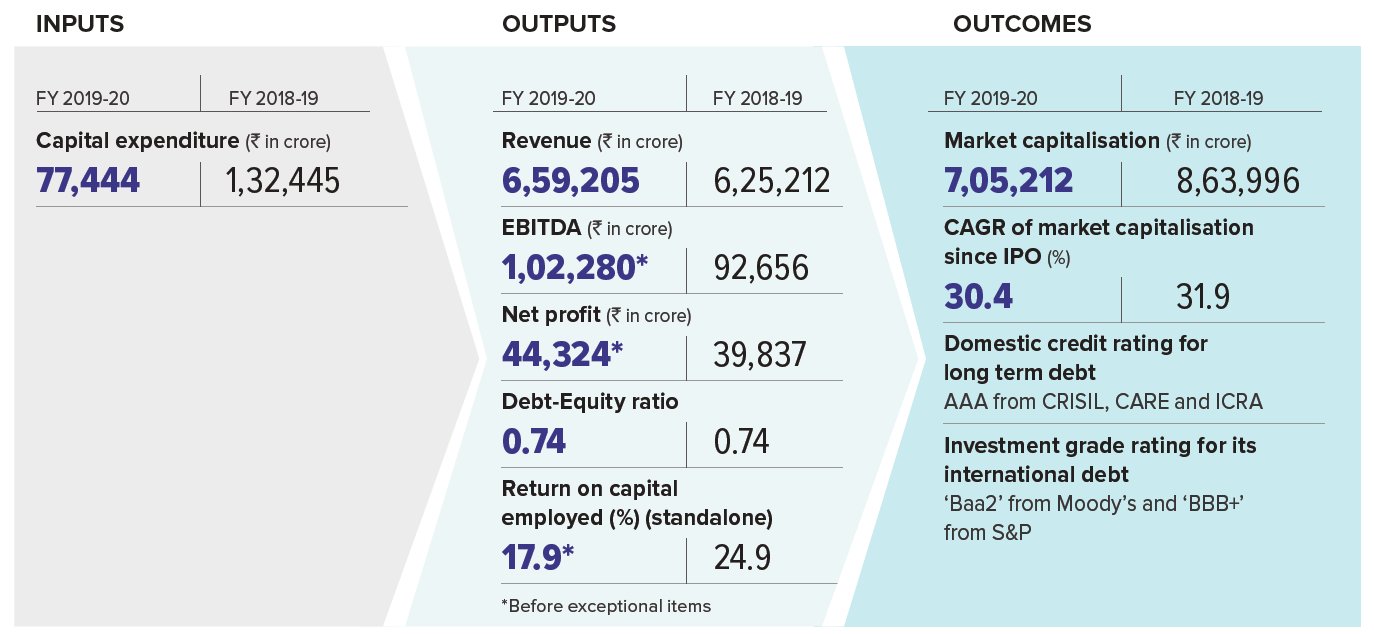
Since its inception, Reliance has been a profit making enterprise with a focus on creating wealth for its investors. Below is the snapshot of Reliance’s financial performance.
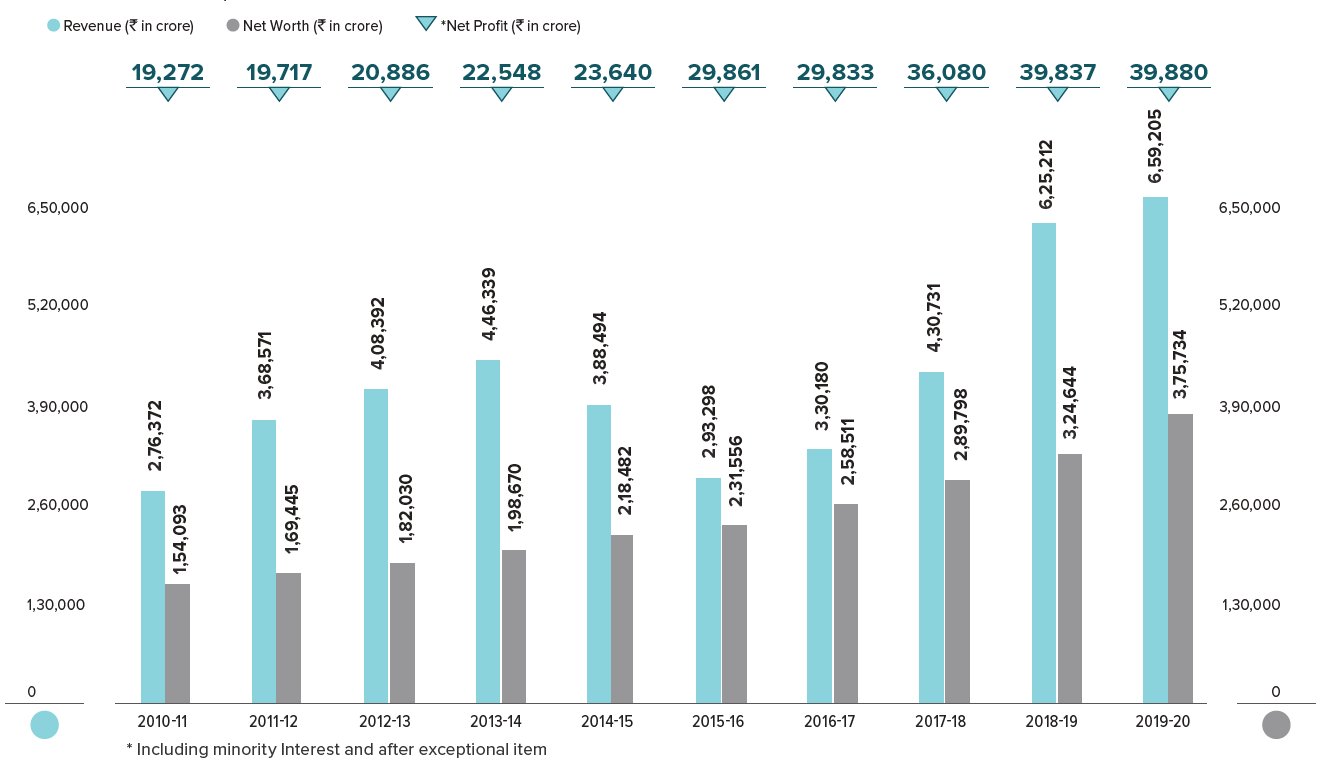
Reliance has been testifying its sustainability journey since FY 2004-05 through annually publishing its sustainability report based on the Global Reporting Initiative’s (GRI) reporting guidelines. Reliance was among the primary companies that implemented the G4 guidelines and later the GRI Standards. Reports published until FY 2013-14 have been GRI checked with an ‘A+’ application level. The Sustainability Report for FY 2018-19 was prepared in accordance with the “Comprehensive” option of the new Standards (including the Oil and Gas sector disclosures). As per the reasonable assurance requirements of the ISAE 3000 standard and Type II-High level assurance, the reports are externally assured, using AA1000AS standards. Reliance is also associated with World Business Council of Sustainable Development (WBCSD) and Global Reporting Initiative (GRI). WBCSD’s “Reporting matters” 2015 and 2017 have recognised Reliance’s sustainability report as a leading example of the best practices.
The Report respects 17 global and national frameworks which include:
As per Reasonable Assurance requirements of the ISAE 3000 (Revised) Assurance Standard, the Report has been externally assured by KPMG India for chosen sustainability related disclosures in the report. Read More
Sustainability is decisive to the delivery of the Group’s strategy as a fundamental strategic focus area and is incorporated past all regions of business. The scale of sustainability reporting was protracted to Reliance Retail and Digital Services since FY 2017-18. Till then the scope of reporting was limited to RIL and Reliance Foundation.
To distinguish and prioritise the critical sustainability topics, set KPIs and targets for further development, Reliance conducts a formal materiality assessment in correspondence with GRI Standards. The Sustainability council advises on development measures and actions plans in the monthly review of KPIs and management approach for classified material topics. Furthermore, an annual review is conducted by the Board-level CSR and Governance committee.
MATERIALITY ASSESSMENT
Reliance conducts materiality assessment that includes the practice of distinguishing and evaluating several economic, environmental and social matters that could influence its establishment and stakeholders and arrange them into potential material topics. The classification of material concerns has been fundamentally aligned to the Company’s risk management framework and its strategic approach established across the four areas: Strategic and Commercial risks; Safety and Operations; Compliance and Control; and Financial risks. Reliance regularly intends to develop solid and enduring interactions with its stakeholders by means of organised discussions. For more information on Materiality refer to the Sustainability Report.
Capital and Material Topics
Natural Capital and
Climate Change 
Human Capital and
People Connect 
Intellectual Capital
and Innovation 
Manufactured Capital
and Product Stewardship 
Financial Capital
and Credit Rating 
Social and Relationship Capital
and Value Creation 







Reliance Group’s Enterprise Risk Management framework with its consistent and systematic approach for identifying and managing risk, both at the strategic and operational levels enabled your organisation to continue on its growth path. Deep culture of Risk Management that the organisation has achieved over the past years,
based on clear accountabilities of risk and control and continuous control monitoring enabled by technology across the three Lines of Defense and backed by ongoing management processes including oversight by Board of Directors has enabled Reliance to mitigate risks including the risk triggered by the black swan event – the COVID-19.
Reliance Risk Management Framework was stress tested by the black swan event and the outcomes are encouraging. Over a number of years, Reliance has matured its Risk Management Framework which identifies, manages, monitor and reports both, the key risks and also the newly emerged risks - that can impact achievement of its strategic objectives. Reliance’s Risk Management Framework is founded on sound organisation design principles and is enabled by effective use of technology. The Company’s risk management is customised for business segments and functions and has three layered organisational structure to enable effective management and governance of key risks and emerging risks.
Reliance’s Risk Management Framework is designed to avoid incidents and maximise business outcomes by enabling the management to:
The Risk Management Framework covers risk management activities at three levels:
The organisation structure at Reliance specific to risk management is fortified with three Lines of Defense (LOD) and three layers of governance. The company has implemented a three LOD model who are collectively responsible to exercise risk management activities. They are as follows:
The Board provides oversight through various risk and executive committees listed below:
Leveraging Technology for Risk
Management and Assurance
Reliance leverages technological
advancements to support the Risk
Management Framework and it has
significantly matured across all 3 major
business segments. New businesses
also adopt leading risk management
technologies, processes and the
experience available in the Group to
manage the risks better. Reliance uses a
Group level Management System (RMS),
thus creating a common risk language to
facilitate risk awareness across all in the
organisation. A robust ERP system, data
analytics capabilities and Governance, Risk,
Compliance and Audit (GRCA) tools are
used for risk management process.
The key risks discussed below, separately or in combination, could have a material adverse effect on the implementation of our strategy, our business, financial performance, results of operations, cash flows, liquidity, prospects, shareholder value and returns and reputation.
1) STRATEGIC AND COMMERCIAL RISKS
Commodity prices and markets:
Risk: Companies are experiencing significant demand destruction due to the cessation of business activities on account of lockdown due to COVID-19.
Further, external market conditions, especially, prices of crude oil, natural gas and downstream products have a direct impact on Reliance’s financial performance. These prices are affected by supply and demand, both globally and regionally. Factors that influence fluctuations in crude prices and crude availability include operational issues, natural disasters, and political instability including geopolitical risks, economic conditions and Government pricing policy of petroleum products among others.
Risk Response: Reliance exports its products to diverse geographical locations so that the risk of non-evacuation is mitigated with minimal adverse effect.
Since Reliance operates an integrated hydrocarbon business, some of these risks are offset by gains in other parts of the Group’s integrated hydrocarbon business.
The risk of non-availability of crude and feedstock is actively managed by sourcing crude from multiple geographies (Asia, the Middle East, West Africa, Latin/ South America, North America and North Africa) using short-term and long-term purchase contracts and locking prices.
In order to hedge the exposures arising from commodity price fluctuations, Reliance has a robust Commodity Risk Management Policy and Framework that ensures the risk remains within manageable levels.
Cybersecurity risk
Risk: COVID-19 has forced organisations across the board to embrace practices such as social distancing, remote working and increase the adoption of new technologies. These factors have created an ideal situation for cyber criminals to attack IT infrastructure and launch a range of hacking strategies like malware, ransomware, phishing emails among others.
Further, Reliance continues to focus on large scale digital transformation and hence it also exposes it to increased cyber risks. A digital security breach or disruption to digital infrastructure, due to intentional or unintentional actions, such as cyber-attacks, data breaches or human error could have a serious impact on business. This impact could include loss of process control, impact on business continuity or damage to assets and services, harm, to the environment, the loss of sensitive data or information, legal and regulatory noncompliance, reputational damage as well as revenue loss.
Risk Response: Reliance has strengthened and continues to strengthen its capabilities to defend itself against existing and emerging cyber security threats like phishing attacks, DDOS attacks and malware, combining detection tools with cyber threat intelligence to protect the systems.
It uses Continuous Improvement Programs which ensures that digital transformation takes into consideration Next Generation Cyber Security Architecture which is based on Defense-in-depth (DiD) strategy having enhanced prevention, detection and correction capabilities to mitigate cybersecurity threats at every layer of the IT landscape.
Also, Reliance has implemented strong and intelligent monitoring and response capabilities to protect Reliance’s Information and Information Assets. To mitigate this risk further, Reliance has conducted extensive awareness sessions about cybersecurity threats, increased use of big-data, machine learning and digital forensic capabilities to monitor these threats.
In order to ensure and demonstrate preparedness, Reliance has obtained external global certifications like ISO 27001, PCI DSS 3.2 (Payment Card Industry Data Security Standard).
Data Privacy Risk
Risk: The Government introduced the Personal Data Protection Bill, 2019, in the Parliament, which would create the first crosssectoral legal framework for data protection in India. While currently in India, the data privacy requirements are governed by the Information Technology Act 2000, amendment 2008.
Due to COVID-19, regulations will require companies to put in place processes, policies and infrastructure for collecting personal information about medical condition of employees, vendors visiting our premises and other visitors. Significant cost and effort will be expended in complying with statutory, regulatory or contractual restrictions with respect to collection of data, its storage, its security and dissemination to manage data privacy risk.
Thus, data privacy laws are increasing the imperatives to protect personal information of individuals. Citizens and Governments across the globe continue to face data scandals and data breaches. This has transformed the way that citizens, governments and organisations think about data privacy globally.
Risk Response: Reliance is constantly evolving its Data Protection Policy which are not only compliant with Indian regulations but are based on global best practices and standards to allay any personal data privacy concerns. Reliance group continues to upgrade its Data Privacy Framework and has adopted the ‘Privacy by default’ principles in its approach to data privacy i.e., privacy of data and information is upheld first by default and embedded across the entire data lifecycle. Employees’ consent management process is established, and explicit consent is being taken for services provided to a third party. Enhanced practices are in place to ensure protection of personal data while sharing it with third parties. Identified applications which store personal data are adequately secured. Besides, data privacy awareness campaigns are conducted on an ongoing basis.
Customer Experience and Retention
Risk: Digital Services has now 387.5 million customers on the back of an innovative customer acquisition strategy. Along with expansion of its current customer base, customer retention and experience are of utmost importance for Digital Services to generate sustainable business performance and return on its investments. Digital Services is committed to deliver on a differentiated customer experience and constant endeavour is to proactively mitigate any such risks that may weaken it’s value propositions, brand and customer loyalty.
Risk Response: With onset of COVID-19, Digital Services adopted Work from Home (WFH) policy for most of its staffs and proactively engaged with local authorities for smooth passage of resources to provide uninterrupted services to its customer base. Other steps taken were: deployment of JioPOS Lite for mobile recharges, limited hours store operations in few rural and semi urban areas, shift to virtual call center for customer support, enhancing network capacity for better indoor coverage in residential areas and above all continuous drive for improvement in quality of service resulting in better customer experiences.
Further, to ensure sustained customer value proposition, Digital Services’ strategic and risk framework encapsulates the following mitigations/plans to deliver next generation digital services:
2) SAFETY AND OPERATIONAL RISKS
Health, Safety and Environmental (HSE) risks in Operations
Risk: HSE risks include the effects of natural disasters (floods, earthquakes, among others and safety lapses on human capital. The nature of our operations especially in the hydrocarbon sector exposes us, our employees and the society, to a wide range of health, safety, security and environment risks due to the geographic location and technical complexity of operations.
Various HSE regulations across geographies regulate Reliance’s business of Exploration & Production of oil and gas, and their further refining and processing. A major HSE incident, such as fire, oil spill and security breach, can result in loss of life, environmental degradation and overall disruption in business activities.
Risk Response: Reliance’s HSE policy reiterates our value that ‘Safety of persons overrides all production targets’ and that we believe that all injuries, occupational illnesses as well as safety and environmental incidents are preventable.
Reliance has a state-of-the-art dedicated Safety and Operational Risk (S&OR) function which provides oversight on safety and operational risk exposures, periodically conducts risk assessments and reviews through competent multidisciplinary team, to provide independent assurance on the conformance to the Operating Management System. These risks across Reliance’s wide spectrum of businesses in the hydrocarbon sector are managed through various embedded controls at multiple levels of the hydrocarbon value chain.
The safety operational risk process has matured across hydrocarbon entities and the entity risk registers are periodically reviewed and updated. Risk understanding is cascaded through regular risk communication to stakeholders at both leadership and asset facing levels. It ensures that all employees strive for excellence in their own personal safety and the safety of others including employees, contractors, customers and the communities within which Reliance operates with no harm to environment.
Safety and Environmental risks during Transportation
Risk: With most crude being supplied to Reliance by sea vessel, road and pipeline and the overwhelming majority of refined products being exported by sea, Reliance faces the risk of HSE incidents, oil spills leading disruption to business activities.
Events like technical integrity failure, natural disasters, extreme weather, human error and other adverse events or conditions could lead to loss of containment of hydrocarbons or other hazardous materials, as well as fires, explosions or other personal and process safety incidents during transportation by road, sea or pipeline.
Thus, Reliance is exposed to a complex and diverse range of marine risks, including exploration vessels, oil tankers, chemical tankers, gas tankers, dry cargo vessels and Reliance is operating a fleet of tugs port service vessels and operations of port and terminal infrastructure.
Risk Response: Reliance has a strong vessel vetting and incident monitoring and emergency response system.
Using an augmented ship vetting program, all vessels contracted to carry Reliance cargo are screened based on risk rating prior to its induction. For incident response in shipping, formal documentation and cascading have been completed.
Reliance has an improved and advanced controls framework for road transportation which is efficiently run in collaboration with Reliance’s contractors. Reliance supports the contractors in accessing quality training for their drivers and risk mitigation measures during the journey. Reliance has supported capacity building in the key areas impacting transportation safety, like: defensive driving training, route hazard mapping and real-time tracking. A dedicated state-of-the-art emergency response center can provide emergency response to transporters in the country including transportation through contractors. Reliance’s contractors can use these in an integrated way to deliver safe operations while on contract with Reliance.
Physical Security and Natural Calamity risks
Due to the geographical presence and nature of its business operations, Reliance is susceptible to hostile acts such as terrorism or piracy which could harm the Company’s people and disrupt its operations. Some of Reliance’s sites are subject to natural calamities such as floods, cyclones, lightning and earthquakes.
Failure to respond quickly or to be perceived as not responding fast enough, in an appropriate manner to either an external or internal crisis, could disrupt its business and operations severely and also damage reputation. The impact of such disruption can be prolonged and severely impact Reliance’s business and operations if it is unable to restore or replace critical capacity to the required level within an agreed timeframe.
Another natural calamity, the coronavirus pandemic (COVID-19), is an unprecedented event in the history of the world and has created humongous challenges for mankind and enterprises. The emerging risk arising out of social distancing, national lockdown, uncertainty in environment, demand contraction, government intervention (ranging from encouraging certain business to indirect stoppage of goods and services) – has overshadowed the last couple of week out of the entire year.
Risk Response: Global Corporate Security (GCS) is a distinct function of Reliance mandated to de-risk, safeguard and secure the Company by harnessing expertise from across the spectrum and help Reliance maintain a proactive posture by continuously monitoring and assessing emerging threats, vulnerabilities and risks to manage its physical security. Further, Reliance maintains a best in class detailed disaster recovery, crisis and business continuity management plans to respond to natural calamities, any disruption or incident.
The businesses are provided assurance on an ongoing basis by GCS with respect to the management of security risks affecting its people, assets and operations. It actively monitors the threat landscape to prevent or mitigate risks using a ‘de-risking’ framework, ensuring safe operations and business continuity.
Continuous application of pre-emptive mitigation measures, proactive engagement with concerned stakeholders and sustained relationships with sovereign agencies continue.
Reliance Foundation has been actively involved in India’s war against COVID-19. The health of our employees and their family is of utmost priority and we have throughout the pandemic supported our employees through different means including provision of emergency medical response. Company ensured the availability of essentials by swiftly enhancing its capability to deliver beyond stores and ensured adequate supplies to partner Kirana Stores along with direct pickup from farmers.
3) COMPLIANCE AND CONTROL RISKS
Regulatory compliance risks
Risk: COVID-19 has led the government to announce a range of notifications which companies needs to adopt swiftly and effectively.
The evolution of the regulatory environment globally and at home, the Government of India’s ambition for reforms and transparency have resulted in increased regulatory scrutiny that has raised the bar with regards to regulatory compliance. This requires the alignment of corporate performance objectives, while ensuring compliance with regulatory requirements.
“Governance” has been expanded to cover more laws, that companies would be expected to comply with such as SEBI changes to Governance policy, Ministry of Corporate Affairs National Guidelines on Responsible Business Conduct.
Risk Response: While Reliance recognises that meeting all applicable regulatory requirements can be challenging, it has a comprehensive and digitally enabled compliance management framework which is enhanced on an ongoing basis to:
Understand changes to regulatory standards, in a timely manner and integrate these changes in the business strategy, risks, compliance processes, controls;
Assign single point of accountability with appropriate responsibility matrix cascading till the lowest level of organisation with oversight linked back to the committee of the Board of Directors.
To reduce risks associated with fraud, bribery and corruption, further controls have been put in place, awareness has been enhanced and training for all employees has been made mandatory.
COVID-19 instigated regulatory changes across legislative bodies were also tracked and integrated within reliance compliance management system by a dedicated team of multidisciplinary competent people including lawyers, Company Secretaries, Chartered Accountants with zero tolerance tone from the Board of Directors.
4) FINANCIAL RISKS
Treasury risks
Risk: Treasury risks include, among others, exposure to movements in interest rates and foreign exchange rates. Reliance also maintains sufficient liquidity, buffer to be able to meet all its financial commitments on due dates and is not forced to obtain funds at higher interest rates. It has access to markets worldwide and uses a range of products and currencies to ensure that its funding is efficient and well diversified across markets and investor types.
Interest Rate risk
Reliance borrows funds from domestic and international markets to
meet its long-term and short-term funding requirements. It is subject to
risks arising from fluctuations in interest rates.
Foreign Exchange risk
Reliance prepares its financial statements in Indian Rupee, but most
of the payables and receivables of hydrocarbon business are in US
Dollars, minimising the cash flow risk on account of fluctuations in
foreign exchange rates. Reliance avails long-term foreign currency
liabilities (primarily in USD, EURO and JPY) to fund its capital
investments. Reliance also avails short-term foreign currency liabilities to
fund its working capital.
Risk Response: All long term liabilities which are due for maturity in FY 21 have already been refinanced and the company continues to maintain enough liquidity buffer to meet additional demands that may emerge on account of COVID-19 crisis.
The interest rate risk is managed through financial instruments available to convert floating rate liabilities into fixed rate liabilities or vice versa and is aimed at reducing the cost of borrowings.
Foreign exchange risk arising from mismatch of foreign currency assets, liabilities and earnings is tracked and managed within the Risk Management Framework. The foreign exchange market is highly regulated and Reliance ensures compliance with all the regulations.
Reliance’s ability to withstand the impact of the risks was bolstered by its robust Risk Management Framework. It helped us to preempt scenarios, respond in time and is providing us with the fortitude to withstand pressure. As we go through the VUCA (Volatile, Uncertain, Complex and Ambiguous) world, we have an enhanced risk refresh cycle both in terms of its periodicity and intensity. Teams are being trained to be future-ready, harnessing technological support and match with emerging domain knowledge. The GRCA team has also demonstrated its capability to deliver through technology tools, in remote working scenario. Process mining tools are being deployed to help enhanced real-time monitoring of process, controls and compliances. We shall now perform what-if analysis, predictive scenario building, use of external risk proxies and indices in data analytics and machine learning with more periodicity and intensity in the risk management process for key risks and emerging risks.
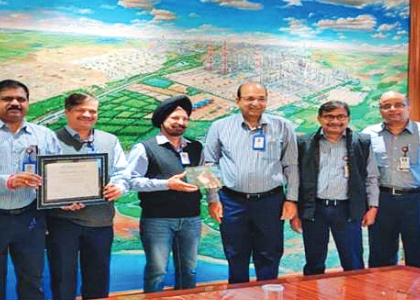
Winner of Future Ready Factory Award by
Frost and Sullivan
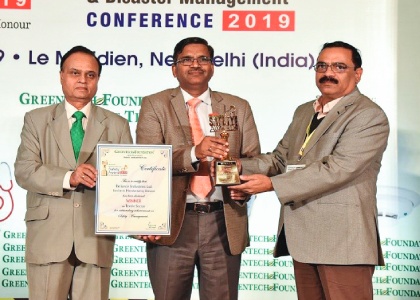
Winner at 18th Annual Greentech
Safety Award
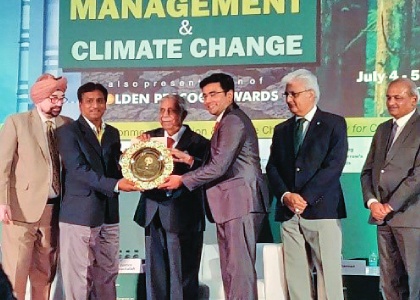
Winner of Golden Peacock Environment
Management Award
Reliance Digital received:
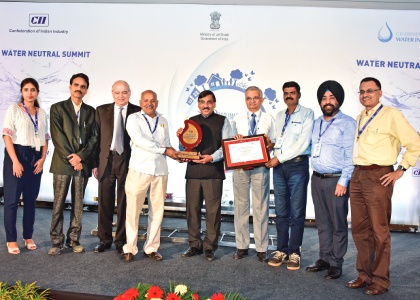
Reliance Foundation Winners at
CII National Award
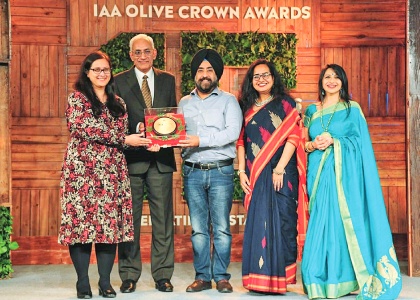
Reliance Foundation Winners at
Olive Crown Awards
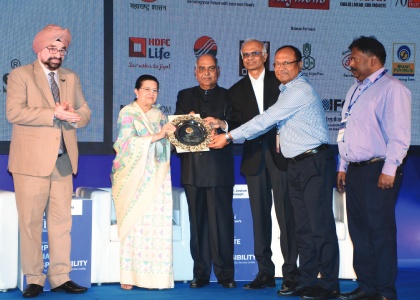
RIL Winning Golden Peacock
Award for CSR
| Sr. No |
Term | Meaning |
|---|---|---|
| 1 | Big-box retail chain | A big-box store is a physically large retail establishment, usually part of a chain of stores. The term sometimes also refers, by extension, to the company that operates the store. |
| 2 | Phygital | Phygital marketing is a blended customer experience where digital applications relate to the physical world and actual space of the customer journey. Most often, phygital experiences are immersive, interactive realtime experiences that offer immediate transactions and/or engagement. |
| 3 | Glocalised | Reflecting or characterised by both local and global considerations. |
| 4 | Omni-channel | Omni-channel is a cross-channel content strategy that organisations use to improve their user experience and drive better relationships with their audience across points of contact. It is a multi-channel approach that provides the customer with an integrated customer experience. |
| 5 | FTTH | Fiber-to-the-home (FTTH) is the delivery of a communications signal over optical fiber from the operator's switching equipment to a home. |
| 6 | Edge computing | Edge computing is a distributed computing system that brings computation and data storage closer to the location where it is needed, to improve response times and save bandwidth. |
| 7 | Over-The-Top (OTT) | An over-the-top media service is a streaming media service offered directly to viewers via the Internet. |
| 8 | Downstream | The downstream commonly refers to the refining of petroleum crude oil and the processing and purifying of raw natural gas, as well as the marketing and distribution of products derived from crude oil and natural gas. |
| 9 | Upstream | The upstream includes searching for potential underground or underwater crude oil and natural gas fields, drilling exploratory wells, and subsequently drilling and operating the wells that recover and bring the crude oil and/or raw natural gas to the surface. |
| 10 | Complexity index | The Complexity index is a measure to compare the secondary conversion capacity of a petroleum refinery with the primary distillation capacity. The index provides an easy metric for quantifying and ranking the complexity of various refineries and units. |
| 11 | Gross Refining Margin (GRM | GRM is the difference between crude oil price and total value of petroleum products produced by the refinery. |
| 12 | Crude throughput | Crude throughput is the total amount of crude that is processed in the refinery. |
| 13 | Refinery Off-Gas Cracker (ROGC) |
ROGC is a petrochemical unit that uses the gas generated as a byproduct of refining operations. |
| 14 | Petcoke gasification | A process for converting petroleum coke (petcoke) and other refinery waste streams and residuals into power, steam, and hydrogen for use in the production of cleaner transportation fuels. |
| 15 | HVAC systems | A Heating, Ventilation and Air Conditioning (HVAC) system is a heating and cooling system that uses dampers or valves to heat or cool only the designated areas. |
| 16 | HSE Compliance Standards | Health, Safety, Environment (HSE) Compliance Standards establish the minimum requirements to meet corporate expectations for the management of Health, Safety and Environmental aspects. |
| 17 | LCA studies | Life Cycle Assessment (LCA) is the systematic analysis of the environmental impact of products during their entire life cycle. |
| 18 | ETP | Effluent Treatment Plant (ETP) is a process design for treating industrial waste water for its reuse or safe disposal to the environment. |